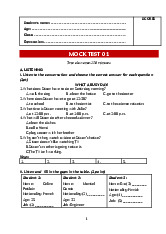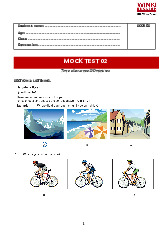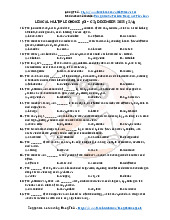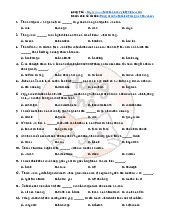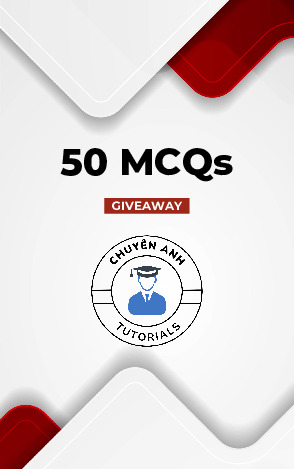
1

CHUYÊN ĐỀ 1: CÁC THÌ CỦA ĐỘNG TỪ (TENSES OF VERB)
CHUYÊN ĐỀ 2: CÁC CỤM TỪ VÀ MỆNH ĐỀ (PHRASES AND
CLAUSES)
CHUYÊN ĐỀ 3: CÁC DẠNG SO SÁNH CỦA TÍNH TỪ VÀ TRẠNG TỪ
(COMPARISONS OF ADJECTIVE AND ADVERB)
CHUYÊN ĐỀ 4: CÂU TƯỜNG THUẬT (REPORTED SPEECH)
CHUYÊN ĐỀ 5: CÂU AO ƯỚC (WISH AND IF ONLY)
CHUYÊN ĐỀ 6: USED TO; BE/ GET USED TO + V-ING
CHUYÊN ĐỀ 7: CÁC KlỂU CÂU ĐỀ NGHỊ (SUGGESTIONS)
CHUYÊN ĐỀ 8: ADJ + TO V và ADJ + THAT + CLAUSE.
CHUYÊN ĐỀ 9: TỪ ĐỊNH LƯỢNG (QUANTIFIER)
CHUYÊN ĐỀ 10: CÁC LOẠI CÂU ĐIÊU KIỆN (TYPES OF
CONDITIONAL)
CHUYÊN ĐỀ 11: MẠO TỪ: A, AN, THE (ARTICLE: A, AN, THE)
CHUYÊN ĐỀ 12: MỆNH ĐỀ QUAN HỆ (RELATIVE CLAUSES)
CHUYÊN ĐỀ 13: V-ING VÀ V INFINITIVE (GERUND AND
INFINITIVE)
CHUYÊN ĐỀ 14: CÁC ĐỘNG TỪ KHUYẾT THIẾU (MODAL VERBS)
CHUYÊN ĐỀ 15: CÂU HỎI ĐUÔI (TAG QUESTION)
CHUYÊN ĐỀ 16: TÍNH TỪ VÀ TRẠNG TỪ (ADJECTIVE AND
ADVERB)
CHUYÊN ĐỀ 17: CÁC TỪ NỐI (CONNECTIVES)
CHUYÊN ĐỀ 18: CỤM ĐỘNG TỪ (PHRASAL VERB)
CHUYÊN ĐỀ 19 : WORD FORMS
CHUYÊN ĐỀ 20: SENTENCE BUILDING+ REWRITE
2

CHUYÊN ĐỀ 1: CÁC THÌ CỦA ĐỘNG TỪ (TENSES OF VERB)
1. Thì hiện tại đơn (Present Simple)
a. Cấu trúc (form)
Động từ thường To be
(+) I/ you/ we/ they + V
He/ she/ it + V(s/es)
(-) I /we /you/ they + don’t + V
He /she / it + doesn’t + V
(?) Do + I/ you/ we/ they + V?
Does + he/ she/ it + V?
(+) I + am ...
You/ we/ they + are ...
He/ she/ it + is ...
(-) I + am not ...
You/ we/ they + aren’t ...
He/ she/ it + isn’t...
(?) Am I ...?
Are we/you/they ... ?
Is he/ she/ it ...?
Chú ý: are not = aren’t is not = isn’t
do not = don’t does not = doesn’t
b. Cách sử dụng (Usage)
- Diễn đạt một hành động mang tính thường xuyên, một thói quen, hoặc hành động lặp đi lặp lại có tính
quy luật.
Ví dụ: Linda goes to school every day.
My mother usually has breakfast at 7 a.m.
- Diễn tả một sự thật hiển nhiên
Ví dụ: The earth goes around the sun.
Water boils at 100 degrees C.
- Diễn tả một thời gian biểu hoặc một lịch trình Ví
dụ: The plane arrives at 8 p.m. tonight.
The news programme starts at 7 p.m.
c. Các trạng ngữ thường dùng
Trong câu thường có các trạng từ chỉ tần suất như:
always (luôn luôn) sometimes (thi thoảng)
often (thường xuyên) seldom (hiếm khi)
usually (thường xuyên) never (không bao giờ)
Every: every day/ week/ month/ year (hàng ngày/ hàng tuần/ hàng tháng/ hàng năm) In
the morning/ afternoon/ evening (Vào buổi sáng/ chiều/ tối)
d. Cách thêm đuôi s/es
Sau ngôi thứ 3 số ít, động từ được thêm đuôi “s” hoặc “es”
- Thông thường, ta thêm đuôi s vào sau hầu hết các động từ.
- Khi động từ có tận cùng bằng các âm: o, ch, sh, ss, x thì ta thêm đuôi es
Ví dụ: goes, watches, finishes, misses
Chú ý: Những động từ có tận cùng bằng “y” và trước đó là 1 phụ âm, ta phải đổi “y” thành “i” trước khi
thêm “es’
Ví dụ: fly - flies; carry – carries
3
Giaoandethitienganh.info

2. Thì hiện tại tiếp diễn (Present Continuous)
a. Cấu trúc (form)
Khẳng định Phủ định Nghi vấn
I + am + V-ing
You/ we/ they + are + V-ing
I + am not + V-ing
You/ we/ they + aren’t + V-ing
Am + I + V-ing?
Are + you/ we/ they + V-ing?
He/ she/ it + is + V-ing He/she/it + isn’t + V-ing Is + he/ she/ it + V-ing?
b. Cách sử dụng (Usage)
- Diễn tả hành động đang xảy ra tại thời điểm nói (ví dụ a, b) hoặc hành động xảy ra xung quanh thời điểm
nói (ví dụ c).
Ví dụ: a. Please don’t make so much noise. I’m studying.
b. Look at the sun, it is shining brightly.
c. We learn maths every Monday afternoon, but this afternoon we are learning English.
c. Các trạng ngữ thường dùng
- Now, at present, at the moment, right now etc.
- Hoặc một số động từ như: look!, listen! Watch out! etc.
d. Các động từ thường không được dùng ở thời tiếp diễn
Các động từ trạng thái ở bảng sau không được chia ở thì hiện tại tiếp diễn khi chúng là những động từ tĩnh
diễn đạt trạng thái, giác quan hoặc tình cảm.
know (biết) understand (hiểu) have (có)
believe (tin tưởng) hate (ghét) need (cần)
hear (nghe) love (yêu) appear (xuất hiện)
see (nhìn) like (thích) seem (dường như)
smell (ngửi) want (muốn) taste (nếm)
wish (ước) sound (nghe có vẻ) own (sở hữu)
Nhưng khi chúng là động từ hành động thì chúng lại được phép dùng ở thể tiếp diễn.
Ví dụ: He has a lot of books. (KHÔNG DÙNG: He is having a lot of books)
Tuy nhiên, có thể:
Ví dụ: He is having his dinner. (Anh ay ĐANG ăn tối - hành động ăn đang diễn ra)
e. Cách thêm “ing” vào sau động từ
- Thông thường ta thêm “ing” trực tiếp vào ngay sau động từ:
Ví dụ: learn - learning; play - playing; study - studying.
- Khi động từ có tận cùng là “e”, ta bỏ “e” ở cuối từ và thêm “ing”
Ví dụ: shine - shining; live - living;
Ngoại lệ: see - seeing; agree - agreeing; dye - dyeing.
- Nếu động từ có một âm tiết hoặc động từ có 2 âm tiết nhưng trọng âm rơi vào âm tiết thứ 2 và kết thúc bằng
một phụ âm nhưng đằng trước nó là một nguyên âm (e, o, i, u, a) thì phải nhân đôi phụ âm trước khi thêm
“ing”
Ví dụ: run - running; sit - sitting; admit - admitting,
f. Chú ý: Thì hiện tại tiếp diễn đạt ý nghĩa trong tương lai
Khi chúng ta đang nói về những gì chúng ta đã thu xếp rồi, hãy sử dụng thì hiện tại tiếp diễn.
Ví dụ:
4
Giaoandethitienganh.info

A: Ann is coming tomorrow morning? B:
What time is she arriving?
A: At 10.30
B: Are you meeting her at the station?
B: I can’t. I’m working tomorrow morning.
3. Thì hiện tai hoàn thành (Present Perfect)
a. Cấu trúc (form)
Khẳng định
I/ you/ we/ they + have + P
II
He/ she/ it + has + P
II
Phủ định I/ you/ we/ they + haven’t + P
II
He/ she/ it + hasn’t + P
II
Nghi vấn
Have + I/ you/ we/ they + P
II
?
Has + he/ she/ it + + P
II
?
b. Cách sử dụng (Usage)
- Diễn tả hành động bắt đầu từ quá khứ, đã hoàn thành và có kết quả ở hiện tại (ví dụ a, b) hoặc còn tiếp diễn
ở hiện tại (ví dụ c, d).
Ví dụ:
a. The teacher has just cleaned the board. (He started cleaning it some minutes ago and now the board is
clean.)
b. We have already corrected all the homework. (We started correcting the homework some minutes ago
and now it is all corrected.)
c. We have learned English for a year. (We started learning English a year ago and now we are still
learning it.)
d. I have lived in Ha Noi since 1990. (I started living in Hanoi and now we are still living in Ha Noi.)
c. Các trạng ngữ của thì hiện tại hoàn thành.
- just (vừa mới): thường được đặt giữa have/has và P
II
.
- already (đã): thường được đặt giữa have/has và P
II
và thường dùng trong câu phủ định
- recently = lately (gần đây): thường đặt cuối câu.
- yet (chưa, vẫn chưa): thường được dùng trong câu phủ định
- yet (đã, từng): đặt ở cuối câu
- never (chưa bao giờ): thường được đặt giữa have/has và P
II
.
- for + khoảng thời gian: for 2 years, for a month
- since + mốc thời gian: since 2 o’clock, since yesterday, since last week, since 1990, etc
d. Quá khứ phân từ
Đối với động từ có quy tắc, ta chỉ cần thêm “ed” vào sau động từ (nếu động từ kết thúc với “e”, chỉ cần thêm
“d” là đủ.)
Ví dụ: learn - learned; work - worked; live - lived.
5

Đối với động từ bất quy tắc: ta xem trong bảng động từ bất quy tắc.
Ví dụ: go - gone; see - seen; cut - cut; meet - met.
4. Thì hiện tại hoàn thành tiếp diễn (Present Perfect Progressive)
a. Cấu trúc (form)
Khẳng định
I/ you/ we/ they + have + been + V-ing
He/ she/ it + has +been +V-ing
Phủ định
I/ you/ we/ they + haven’t + been + V-ing
He/ she/ it + hasn't + been + V-ing
Nghi vấn
Have + I/ you/ we/ they + been + V-ing?
Has + he/ she/ it + been + V-ing?
b. Cách sử dụng (Usage)
- Diễn tả hành động kéo dài bắt đầu từ quá khứ, đã hoàn thành ở hiện tại hoặc còn tiếp diễn ở hiện tại.
Ví dụ:
a. The ground is wet. It has been raining.
b. My friend has been teaching English since 1980.
c. My hands are dirty. I have been working in the garage.
d. You’re out of breath. Have you been running?
e. George hasn’t been feeling well recently.
c. So sánh hiện tại hoàn thành tiếp diễn và hiện tại hoàn thành
Present Perfect Present Perfect Progressive
I am tired. I have written 10 letters.
(Nhấn mạnh đến kết quả của hành động.)
I am tired. I have been writing letters for 5 hours.
(Nhấn mạnh đến tính kéo dài của hành động.)
5. Thì quá khứ đơn (Past simple)
a. Cấu trúc (form)
Động từ thường To be
(+) S + Ved/ V2.
(-) S + didn’t + V.
(?) Did + S + V?
(+) You/ We/ they + were.
I/ he/ she/ it + was.
(-) We/you/they + weren't.
I/ he/ she/ it + wasn’t.
(?) Were + you/ we/ they?
Was + I/ he/ she/ it?
Chú ý:
- Đa số động từ ở thì quá khứ tận cùng bằng -ed, nhưng một số động từ quan trọng lại là động từ bất quy tắc.
(Ta xem trong bảng động từ bất quy tắc đế hiểu rõ hơn)
- Dạng viết tắt: Was not = wasn’t; were not = weren’t; did not = didn’t.
b. Cách sử dụng (Usage)
- Diễn tả hành động xảy ra và kết thúc tại một thời điểm trong quá khứ.
Ví dụ:
a. My brother learned English 10 years ago.
6
Giaoandethitienganh.info

b. I lived and worked in Hanoi in 1990.
c. Their parents went to Ho Chi Minh city last summer.
- Diễn tả một loạt các hoạt động liên tiếp trong quá khứ.
When she went home, she ate a cake, drank a glass of water then she went to bed.
c. Các trạng ngữ thường gặp trong thì quá khứ đơn
- ago (trước đây)
- yesterday (hôm qua)
- last month, last week, last year (tháng trước, tuần trước, năm trước)
- in + thời gian: in 1980, in 2000
d. Cách thêm đuôi ed
- Thêm -d vào sau các động từ tận cùng bằng -ee hoặc -e Ví
dụ: live lived; love loved; agree agreed.
- Đối với các động từ một âm tiết, tận cùng bằng một nguyên âm + một phụ âm (trừ h, w, x) chúng ta
phải gấp đôi phụ âm trước khi thêm -ed:
Ví dụ: fit fitted; stop stopped; fix fixed.
- Động từ tận cùng bằng -y, ta chia ra làm 2 trường hợp:
Trước y là một phụ âm, ta biến y thành i trước khi thêm -ed: study studied
Trước y là một nguyên âm, ta thêm -ed bình thường: play played
Với các động từ còn lại, ta thêm -ed
Ví dụ: work worked; learn learned
e. Đối với các động từ bất quy tắc. Ta xem thêm phụ lục bảng động từ bất quy tắc ở cuối sách.
Verb Quá khứ đơn Nghĩa
Go
Do
Went
Did
đi
làm
Make Made tạo ra
Give Gave đưa cho
have Had có
come Came đến
bring Brought mang theo
get Got được, lấy
be Was/ were thì, là, được
6. Thì quá khứ tiếp diễn (Past Progressive)
a. Cấu trúc (form)
Khẳng định
I/ he/ she/ it + was + V-ing
You/ we/ they + were + V-ing
Phủ định
I/ he/ she/ it + wasn't + V-ing
You/ we/ they + weren’t + V-ing
Nghi vấn
Was + I/ he/ she/ it + V-ing?
Were + we/ you/ they + V-ing?
b. Cách sử dụng (Usage)
7
Giaoandethitienganh.info

- Dùng để diễn tả một hành động đang xảy ra tại một thời điểm xác định trong quá khứ
Ví dụ:
At 12 o’clock yesterday, we were having lunch.
At this time 2 days ago, I was travelling in America.
- Dùng để diễn tả một hành động đang xảy ra thì một hành động khác xen vào. (Hành động đang xảy ra chia
thì quá khứ tiếp diễn, hành động xen vào chia thì quá khứ đơn.)
Ví dụ:
He was chatting with his friend when his mother came into the room.
They were working when we got there.
- Diễn tả hai hành động đồng thời xảy ra tại cùng một thời điểm trong quá khứ, trong câu thường có từ
“while”.
Ví dụ:
My mother was cooking lunch while my father was cleaning the floor at 10 am yesterday. I
was studying English while my brother was listening to music last night.
7. Thì quá khứ hoàn thành (Past Perfect)
a. Cấu trúc (form)
Khẳng định S + had + P
II
Phủ định S + hadn’t + P
II
Nghi vấn Had + S + P
II
Chú ý: had not = hadn’t
b. Cách sử dụng (Usage)
- Diễn tả một hành động xảy ra và kết thúc trước một hành động khác trong quá khứ.
Ví dụ:
a. Before I moved here in 1990, I had lived in Hanoi.
b. After they had seen the film, they went home.
c. When we arrived at the station, the train had left.
Chú ý:
Thì quá khứ hoàn thành thường dùng kèm với thì quá khứ đơn để diễn tả hành động xảy ra và kết thúc trước
khi hành động khác bắt đầu.
9. Thì tương lai đơn (Future Simple)
a. Cấu trúc (form)
Khẳng định S + will + V
Phủ định S + won’t + V
Nghi vấn Will + S + V?
Chú ý: will not = won’t
b. Cách sử dụng (Usage)
- Diễn tả hành động sẽ được thực hiện trong tương lai.
Ví dụ: I will go to work by bus tomorrow.
- Để diễn tả một quyết định ngay tại thời điểm nói. A:
It’s hot.
B: Yes. I will turn on the air-conditioner.
8
Giaoandethitienganh.info

- Diễn tả một lời hứa.
Thank you for lending me the money. I’ll pay you back on Friday.
c. Các trạng ngữ thường gặp
- tomorrow (ngày mai)
- next week, next month, next year (tuần tới, tháng tới, năm tới)
- later (sau này)
- in + mốc thời gian trong tương lai: in 2020
- Sau một vài cụm từ quen thuộc như
I’m sure ...
I think ...
I hope ...
I believe ...
Ví dụ: I think he will come next week I believe she will pass the exam.
10. Thì tương lai tiếp diễn (Future Progressive)
a. Cấu trúc
Khẳng định S + will + be + V-ing.
Phủ định S + won’t + be + V-ing.
Nghi vấn Will + S + be + V-ing?
b. Cách sử dụng (Usage)
- Diễn tả hành động đang diễn ra tại một thời điểm xác định trong tương lai.
Ví dụ: I will be working hard at 10 a.m tomorrow.
He will be reading a book this time tomorrow.
- Diễn tả một hành động đang diễn ra thì có một hành động khác xen vào trong tương lai.
Ví dụ: When I get back at eleven, they will be sleeping.
c. Các trạng ngữ thường gặp
- this time + thời gian trong tương lai
- at + giờ + danh từ chỉ thời gian trong tương lai: at 5 p.m tomorrow....
11. Thì tương lai hoàn thành (Future Perfect)
a. Cấu trúc
Khẳng định S + will + have + P
II
.
Phủ định S + won't + have + P
II
.
Nghi vấn Will + S + have + P
II
.
b. Cách sử dụng (Usage)
- Diễn tả một hành động sẽ kết thúc trước một thời điểm hoặc một hành động khác ở tương lai.
Ví dụ: He will have finished his work by 9 o’clock.
Taxi will have arrived by the time you finish dressing.
By next Sunday, you will have stayed with us for 3 weeks.
12. Thì tương lai hoàn thành tiếp diễn (Future Perfect Continuous)
a. Cấu trúc
9

Khẳng định S + will + have been + V-ing.
Phủ định S + won’t + have been + V-ing.
Nghi vấn Will + S + have been + V-ing.
b. Cách sử dụng (Usage)
Dùng để diễn tả một hành động xảy ra trong quá khứ tiếp diễn liên tục đến một thời điểm cho trước trong tương
lai.
Ví dụ: I will have been studying English for 10 year by the end of next month.
13. Thì tương lai gần (near future)
a. Cấu trúc
Khẳng định
I + am going to + V.
You/ we/ they + are going to + V.
He/ she/ it + is going to + V.
Phủ định
I + am not going to + V.
You/ we/ they + are not going to + V.
He/ she/ it + is not going to + V.
Nghi vấn
Am + I going to + V?
Are + you/ we/ they going to + V?
Is + he/ she/ it + going to + V?
b. Cách sử dụng (Usage)
- Dùng để diễn tả một dự định, kế hoạch trong tương lai.
Ví dụ: He is going to get married this year.
We are going to take a trip to HCM city this weekend.
- Dùng để diễn đạt một dự đoán có căn cứ, có dẫn chứng cụ thể.
Ví dụ: Look at those dark clouds! It is going to rain.
Are you going to cook dinner? I have seen a lot of vegetables on the table.
BÀI TẬP
CHUYÊN ĐỀ 1: CÁC THÌ CỦA ĐỘNG TỪ (TENSES OF VERB)
Exercise 1: Put the verbs in brackets: simple present or present continuous.
1. Where's John? He (listen) to a new CD in his room.
2. Don't forget to take your umbrella with you to London. You know it always (rain) in
England.
3. Jean (work) hard all day but she (not work) at the moment.
4. Look! That boy (run) after the bus. He (want) to catch it.
5. He (speak) German so well because he (come) from Germany.
6. Shh! The boss (come) We (meet) him in an hour and nothing is ready!
7. Oh no! Look! It (snow) again. It always (snow) in this country.
8. Mary (swim) very well, but she (not run) very fast.
9. Sorry I can't help you. I (not know) where she keeps her files.
10

10. I (think) your new hat (look) nice on you.
Exercise 2: Put the verbs in brackets: simple present or present continuous.
1. I (live) with my parents but right now I (stay) with some friends for a few days.
2. I can't talk on the phone now. I (drive) home.
3. Where are the children? They (lie) on the beach over there.
4. He (not understand) what you (talk) about. He's foreign.
5. How much your suitcase (weigh) ? It (look) really heavy.
6. Normally I (start) work at eight o'clock but I (start) at 7 this week. We are busy just
now.
7. What's that smell? Something (burn) in the kitchen.
8. I (work) overtime this month because I (save up) to buy a car.
9. He (smoke) thirty cigarettes a day but at the moment he (try) very hard to cut
down.
10. We usually (read) books, (listen) to music or (watch) TV.
Exercise 3: Put the verbs in brackets: simple present or present continuous.
1. What (do) now?
2. He (water) flowers in the garden.
3. At the moment, my sisters (play) volleyball and my brother (play) soccer.
4. It is 9.00; my family (watch) TV.
5. In the summer, I usually (go) to the park with my friends, and in the spring, we (have)
Tet Holiday; I (be) happy because I always (visit) my grandparents.
6. Her favourite subject (be) English.
7. Keep silent! I (listen) to the radio.
8. Every morning, I (watch) TV at 10.00, but today I (listen) to music at 10.00.
9. At the moment, I (read) a book and my brother (watch) TV.
10. They usually (get up) at 6.00 in the morning.
Exercise 4: Put the verbs in brackets: past simple or present perfect.
1. I (receive) a letter just a few minutes ago.
2. They (live) in London since 1980.
3. Linda is working in this department. She (work) here for two years.
4. Up to present, John (do) good work in the class.
5. (they/ put) their book on my desk last night?
11

6. He (study) English at this school for six weeks up to now.
7. Nobody lives in those houses. They (be) empty for many years.
8. Cindy is in her office. She (be) there since 7 o’clock.
9. My sister (come) to see me last night.
10. My friend George is learning Japanese. He (learn) it for six months.
Exercise 5: Put the verbs in brackets: past simple or present perfect.
1. I (not/learn) very much when I was at school.
2. I (have) this bike since I was a teenager and I still use it.
3. John, I’m furious with you. I (wait) in this rain for half an hour.
4. They (not eat) meat since they (see) that film about farm animals.
5. Up to now, we (write) almost every lesson in the book.
6. Last year we (go) to Finland for a holiday.
7. I (play) tennis yesterday afternoon.
8. (you/ ever/ be) to United State?
9. When I (be) a child, I (not like) sports.
10. Kathy loves travelling. She (visit) many countries in Europe and Asia.
Exercise 6: Put the verbs in brackets: present perfect or present perfect continuous
1. I (buy) a new pair of shoes.
2. (you/ finish) reading that book yet? I
(read) but I am still at chapter 10.
3. There is only a little cake left because your dad (eat) it in the past 3 days.
4. I (not/ see) you for ages, how have you been?
5. I (drive) for over eight hours now. I am extremely tired.
6. Sarah (lose) a lot of weight lately, I hope she doesn't get sick.
7. Bryan (write) seven books and they are all published.
8. Bryan (write) all night and he's got 30 pages so far.
9. Gorge (find) an amazing job at the local pharmacist.
10. We are out of money because your mother (spend) it all.
Exercise 7: Put the verbs in brackets: past simple or past continuous.
1. I (go) down the street when it began to rain.
2. At this time last year, I (attend) an English course.
12
Giaoandethitienganh.info

3. Jim (stand) under the tree when he heard an explosion.
4. The boy fell and hurt himself while he (ride) a bicycle.
5. When we met them last year, they (live) in Santiago.
6. The tourist lost his camera while he (walk) around the city.
7. The lorry (go) very fast when it hit our car.
8. While I (study) in my room, my roommate (have) a party in the other room.
9. We (sit) in the café when they saw us.
10. I (call) Mr. Wilson at 9 last night, but he (not be) at home. He
(study) at the library.
Exercise 8: Put the verbs in brackets: past simple or past continuous.
1. I (not hear) the thunder during the storm last night because I (sleep)
2. It (be) beautiful yesterday when we (go) for a walk in the park. The sun (shine)
The birds (sing) .
3. My brother and sister (talk) about something when I (walk) into the room.
4. Tom (go) to his friend’s house, but the boys (not be) there.
They (play) soccer in the vacant lot down the street.
5. The little boy (fall) asleep while his mother (read) him a story.
6. I really (enjoy) my holiday last January. While it (snow) in Iowa, the sun (shine)
in Florida.
7. While Ted (shovel) snow from his driveway yesterday, his wife (bring) him a cup of
hot chocolate.
8. John (have) a car accident last week. He (drive) down the street when suddenly a
lorry (hit) his car from behind.
9. Ten years ago, the government (decide) to begin a food programme. At that time, many
people in the rural area (starve) due to several years of drought.
10. They (wait) for me when I (arrive) at the station.
Exercise 9: Put the verbs in brackets: present perfect or present perfect continuous or past perfect.
1. I never get up from the table before others (finish) .
2. It is already 9:30 pm and I (wait) here for over an hour. If John does not get here in the next five
minutes, I am going to leave.
3. Did you hear that Ben was fired last month? He (work) for that import company for more than
ten years and he (work) in almost every department.
4. I (see) many pictures of the pyramids before I went to Egypt last summer. Pictures of the
monuments are very misleading. The pyramids are actually quite small.
13
.info

5. Sarah (climb) Mount Everest, (sail) around the world, and (go) on
safari in Kenya. She is such an adventurous person.
6. Susan (climb) Mount Everest, (sail) around the world, and (go) on safari in Kenya by
the time she was twenty-five. She (experience) more by that age than most people do in their
entire lives.
7. Before my trip to Paris two years ago, I (never be) to France.
8. When we finally stopped him, the squirrel (already eat) five cookies.
9. Ben (try) to open his own restaurant for the last few years. He (just finish) the
painting, but he (not do) the decorating yet.
10. You look tired. How long (run) ?
Exercise 10: Put the verbs in brackets: past perfect or past perfect continuous.
1. By 9 o'clock, we (finish) our homework.
2. By the end of the month I (live) in this town for ten years.
3. By the end of this week we (work) on the project for a month.
4. They (leave) the classroom by the end of the hour.
5. By July the fifth they (study) English for 3 years.
6. By 10 o'clock she (watch) TV for 4 hours.
7. She (sleep) for 10 hours by 11 o’clock.
8. We (go) home by next week.
9. We (look for) him for 40 days by next Saturday.
10. She (return) from the excursion by 6 o’clock.
11. (buy/ he) the new house by October?
12. They (wait) for the president for 5 hours.
13. The sun (not/ rise) by 4 o’clock.
14. (you/ do) the shopping by 3 o’clock?
15. By 2018 we (live) in Madrid for 20 years.
Exercise 11: Put the verbs in brackets: present simple or future simple or future continuous.
1. Right now, I am watching TV. Tomorrow at this time, I (watch) TV as well.
2. When you (get) off the plane, I (wait) for you.
3. I am sick of rain and bad weather! Hopefully, when we (wake) up tomorrow morning, the sun
(shine)
4. When I (get) to the party, Sally and Doug (dance) , John (make) drinks,
and Sue and Frank (discuss) something controversial.
14

5. Sandra: Where is Tim going to meet us?
Marcus: He (wait) for us when our train arrives. I (be) sure he (stand)
on the platform when we pull into the station.
6. Doug: If you (need) to contact me next week, I (stay) at the Hoffman Hotel.
Nancy: I (call) you if there are any problems.
Doug: This is the first time I have ever been away from the kids.
Nancy: Don't worry, they (be) be fine.
7. Samantha: Just think, next week at this time, I (lie) on a tropical beach in Maui drinking Mai
Tais and eating pineapple.
Darren: While you are luxuriating on the beach, I (stress) out over this marketing
project. How are you going to enjoy yourself knowing that I am working so hard?
Samantha: I'll manage somehow.
Darren: You're terrible. Can't you take me with you?
Samantha: No. But I (send) you a postcard of a beautiful, white sand beach.
Darren: Great, that (make) me feel much better.
Exercise 12: Put the verbs in brackets: future simple or near future.
1. A: I have got a terrible headache.
B: Have you? Wait there and I (get) an aspirin for you.
2. A: Why are you filing that bucket with water? B:
I (wash) the car.
3. A: I've decided to repaint this room.
B: Oh, have you? What color (paint) paint it?
4. A: Look! There is smoke coming out of the house. It's on fire!
B: Good Heavens! I (call) the fire-brigade immediately.
5. A: The ceiling in this room doesn't look very safe, does it? B:
No, it looks as if it (fall) down.
6. A: Where are you going? Are you going shopping? B:
Yes, I (buy) something for the dinner.
7. A: I can't work out how to use this camera.
B: It's quite easy. I (show) show you.
8. A: What would you like to drink - tea or coffee? B:
I (have) tea please.
9. A: Has Greg decided on what to do when he leaves school?
B: Oh yes. Everything is planned. He (have) a holiday for a few weeks and then he (start)
a computer programming course.
10. A: Did you buy chicken?
B: Oh, no! I forgot to buy it. I (remember) to buy some tomorrow.
Exercise 13: Put the verbs in brackets: future simple or near future.
1. A: Why are you putting on your coat?
B: I (take) my dog out for a walk.
15

2. I bought a new book this morning. I (stay) at home and start reading my favorite chapter.
3. What (happen) to Daniel's family if he still doesn't find a job?
4. A: Why are you waking up at 2 a.m.?
B: I (watch) the match between Liverpool and Manchester United.
5. A: I can’t hear the television!
B: I (turn) it up so that you can hear it.
6. A: Aw. I'm about to fall asleep. I had very little sleep last night.
B: Oh, dear? I (get) you a cup of coffee. That will wake you up.
7. They are going to deliver the sofas to my flat this afternoon. I just can't handle them on my own. (you/
come) to give me a hand?
8. As soon as the weather's fine again, we (walk) down to the beach and you can take a lot of
photos there.
9. A: What do you want to study after graduation?
B: I (study) Environmental Economics. I've always been interested since I read a book about
it.
10. Eler husband found a new job in Birmingham last month. They (go) to the city next week.
Exercise 14: Put the verbs in brackets: future simple or near future.
1. I love London. I (probably/ go) there next year.
2. What (wear/ you) at the party tonight?
3. I haven't made up my mind yet. But I think I (find) something nice in my mum's wardrobe.
4. I completely forget about this. Give me a moment, I (do) it now.
5. Tonight, I (stay) home. I've rented a video.
6. I feel dreadful. I (be) sick.
7. If you have any problem, I (help) you.
8. The weather forecast says it (not/ snow) tomorrow
9. I promise that I (not/ come) late.
10. Look at those clouds. It (rain) now.
Exercise 15: Put the verbs in brackets: future perfect or future continuous.
1. The plane (land) by the time we arrive at the airport in this slow traffic.
2. Don't worry. You and I (cover) most of the distance by noon.
3. Hopefully we (finish) the construction work before the end of this month.
4. Erine and Brooke are planning to set off in the afternoon. I hope the weather conditions (improve)
by then.
5. My parents are going to London, so I (stay) with my grandma for the next 2 weeks.
16

6. I (play) tennis all day long tomorrow.
7. The band (play) when the President enters.
8. This time tomorrow Anna (fly) to Japan. Her friends (wait) for her at Tokyo
airport.
9. At this time next year, I (study) in Singapore.
10. I (go out) with friend while my husband (watch) the football match tomorrow.
Exercise 16: Put the verbs in brackets: future perfect or future perfect continuous.
1. By this time next week, my wife (fast) for exactly 24 days.
2. By this time tomorrow, he (work) at his job for one week.
3. I don't know what I (do) when you come tomorrow, so give me a call if you cannot find me.
4. Dennis and I (be) walking around a little later tonight.
5. (you/ drive) to Canada tomorrow around 5 o'clock?
6. By the time they decide, I (be) taking care of their kids for centuries.
7. This summer, Nadine (reside) in Detroit for 25 years.
8. By the time you come back, Jenna (sing) for commercials for the whole summer.
9. My mother (probably/ be) cooking when we get home.
10. By next week, I (see) my girlfriend for 1 year.
ANSWER KEY
Exercise 1: Put the verbs in brackets: simple present or present continuous.
1. is listening 6. is coming; are meeting
2. is always raining 7. is snowing; snows
3. works; is not working 8. swims; doesn’t run
4. is running; wants 9. don’t know
5. speaks; comes 10. think; looks
Exercise 2: Put the verbs in brackets: simple present or present continuous.
1. live; am staying 6. start; am starting
2. am driving 7. is burning
3. are lying 8. am working; am saving up
4. doesn’t understand; are talking 9. smokes; is trying
5. does your suitcase weigh; looks 10. read; listen; watch
Exercise 3: Put the verbs in brackets: simple present or present continuous.
1. is he doing 6. is
17

2. is watering 7. am listening
3. is playing; is playing 8. watch; am listening
4. is watching 9. am reading; is watching
5. go; have; am; visit 10. get up
Exercise 4: Put the verbs in brackets: past simple or present perfect.
1. have just received 6. has studied
2. have lived 7. have been
3. has worked 8. has been
4. has done 9. came
5. Did they put 10. has learnt
Exercise 5: Put the verbs in brackets: past simple or present perfect.
1. have not learnt 6. went
2. have had 7. played
3. have been waiting 8. Have you ever been
4. have not eaten; saw 9. was; did not like
5. have written 10. has visited
Exercise 6: Put the verbs in brackets: present perfect or present perfect continuous
1. have bought 6. has lost
2. Have you finished; have been reading 7. has written
3. has been eating 8. has been writing
4. haven’t seen 9. has found
5. have been driving 10. has spent
Exercise 7: Put the verbs in brackets: past simple or past continuous.
1. was going 6. was walking
2. was attending 7. was going
3. was standing 8. was studying; had
4. was riding 9. were sitting
5. was living 10. called; was not; was studying
Exercise 8: Put the verbs in brackets: past simple or past continuous.
1. did not hear; was sleeping 6. enjoyed; was snowing; was shining
2. was; went; was shining; was singing 7. was shoveling; brought
3. were talking; walked 8. had; was driving; hit
18

4. went; were not; were playing 9. decided; were starving
5. fell; was reading 10. were waiting; arrived
Exercise 9: Put the verbs in brackets: present perfect or present perfect continuous or past perfect.
1. have finished 7. had never been
2. have been waiting 8. had already eaten
3. had been working; had worked 9. has been trying; has just finished; hasn't done
4. had seen 10. have you been running
5. has climbed; has sailed; has gone
6. had climbed; had sailed; had gone: had experienced
Exercise 10: Put the verbs in brackets: past perfect or past perfect continuous.
1. will have finished 9. will have been looking
2. will have been living 10. will have bought
3. will have been working 11. Will he have bought
4. will have left 12. will have been waiting
5. will have been studying 13. will have not risen
6. will have been watching 14. Will you have done
7. will have been sleeping 15. will have been living
8. will have gone
Exercise 11: Put the verbs in brackets: present simple or future simple or future continuous.
1. will be watching
2. get; will be waiting
3. wake; will be shining
4. get; will be dancing; will be making; will be discussing
5. will be waiting; am; will be standing
6. need; will be staying; will call; will be
7. will be lying; will be stressing; will send; will make
Exercise 12: Put the verbs in brackets: future simple or near future.
1. will get 6. am going to buy
2. am going to wash 7. will show
3. are you painting 8. will have
4. will call 9. is going to have; is going to start
19

In spite of/ Despite + Noun/ Noun phrase/ V-ing
5. is going to fall 10. will remember
Exercise 13: Put the verbs in brackets: future simple or near future.
1. am going to take 6. will get
2. am going to stay 7. will you come
3. will happen 8. will walk
4. am going to watch 9. am going to study
5. will turn 10. are going to
Exercise 14: Put the verbs in brackets: future simple or near future.
1. will probably go 6. am going to be
2. are you going to wear 7. will help
3. will find 8. will not snow
4. will do 9. will not come
5. am going to stay 10. is going to rain
Exercise 15: Put the verbs in brackets: future perfect or future continuous.
1. will have landed 6. will be playing
2. will have covered 7. will be playing
3. will have finished 8. will be flying; will be waiting
4. will have improved 9. will be studying
5. will be staying 10. will be going out; will be watching
Exercise 16: Put the verbs in brackets: future perfect or future perfect continuous.
1. will have been fasting 6. will have been
2. will have been working 7. will have been residing
3. will be doing 8. will have been singing
4. will be 9. will probably be
5. Will you be driving 10. will have been seeing
……………………………………………………
CHUYÊN ĐỀ 2: CÁC CỤM TỪ VÀ MỆNH ĐỀ
(PHRASES AND CLAUSES)
1. Cụm từ và mệnh đề chỉ sự nhượng bộ (Phrase and clause of concession)
a. Cụm từ
Cụm từ chỉ sự nhượng bộ thường được bắt đầu bằng giới từ ‘In spite of’ hoặc ‘Despite’
Cấu trúc:
20

Although/ though/ even though + S + V
Ví dụ:
Despite the bad weather, they enjoyed the picnic. In
spite of his old age, he leads an active life.
Chú ý:
Cụm từ có ‘Despite’ hoặc ‘In spite of’ có thể được đặt trước hoặc sau mệnh đề chính. Nếu đứng trước mệnh
đề chính, ta phải thêm dấu phẩy vào trước mệnh đề chính, nếu đứng sau mệnh đề chính, ta không cần thêm
dấu phẩy.
Ví dụ:
She couldn’t pass the exam despite studying hard.
Despite studying hard, she couldn’t pass the exam.
b. Mệnh đề
Mệnh đề trạng ngữ chỉ sự nhượng bộ là mệnh đề phụ chỉ sự tương phản của 2 hành động trong câu. Mệnh đề
này thường bắt đầu với những từ nối: although, though, even though, no matter, whatever (dù, cho dù)
❖
Although, though, even though
Cấu trúc:
Ví dụ:
Although he is intelligent, he can’t do this puzzle.
She couldn’t win the beauty contest even though she was beautiful.
Chú ý:
- Đăng sau 3 cụm từ này phải là một mệnh đề hoàn chỉnh (có cả chủ ngữ và động từ).
- Các mệnh đề này có thể đứng trước hoặc sau mệnh đề chính. Nếu đứng trước mệnh đề chính, ta phải thêm
dấu phấy vào trước mệnh đề chính, nếu đứng sau mệnh đề chính, ta không cần thêm dấu phẩy.
Ví dụ:
Although the weather was cold, they enjoyed the picnic.
Jane will be admitted to the university even though she has bad grades.
Anna was fond of Jim though he often annoyed her.
No matter, whatever
Cấu trúc:
No matter + who/ what/ when/ where/ why/ how (adj, adv) + S + V
= Whoever/ Whatever (+N)/ whenever/ whereever/ whyever/ however (adj/ adv) + S + V,
Ví dụ:
No matter who you are, I love you.
= Whoever you are, I still love you.
Whatever he says, I don’t believe him
= No matter what he say, I don’t believe him.
Chú ý:
Mệnh đề bắt đầu bằng No matter hoặc Whatever thường được đặt trước mệnh đề chính, mang nghĩa ‘dù ... đi
nữa’
2. Phrase and clause of reason (Cụm từ và mệnh đề chỉ lý do)
a. Cụm từ
Cụm từ chỉ lý do thường được bắt đầu bằng: because of, owing to, due to, as a result of, on account of, Because
of
21

S + be/ V + too + adj/ adv + to V
Cấu trúc:
because of
owing to
due to + Noun/ Noun phrase/ V-ing on
account of
as a result of
Chú ý:
- Cụm từ thường được sử dụng nhất là because of.
- Các cụm từ này có thể đứng trước hoặc sau mệnh đề chính, mang nghĩa là ‘vì, do’. Nếu đứng trước mệnh
đề chính, ta phải thêm dấu phẩy vào trước mệnh đề chính, nếu đứng sau mệnh đề chính, ta không cần thêm
dấu phấy.
Ví dụ:
Jane was late because of the rain.
= Because of the rain, Jane was late.
Because of the traffic jam, the students arrived late.
The project has to be abandoned due to a lack of government funding.
Owing to his illness, he could not continue with his studies.
She dies as a result of her injuries.
b. Mệnh đề
Mệnh đề trạng ngữ chỉ lý do là một mệnh đề phụ chỉ lý do hoặc nguyên nhân của hành động được nêu trong
mệnh đề chính. Mệnh đề trạng ngữ chỉ lý do thường được nối với mệnh đề chính nhờ các từ nối như:
because, since, as.
Chú ý:
- since và as thường đặt ở đầu câu khi người nghe đã biết rõ nguyên nhân hoặc nguyên nhân không quá quan
trọng.
- because là từ nối được sử dụng phổ biến nhất
Cấu trúc:
Because/ Since/ As + S + V
Ví dụ:
He came ten minutes late because he missed the first bus. As
the weather was bad, they didn’t take part in the trip.
3. Cụm từ và mệnh đề chỉ kết quả
a. Cụm từ chỉ kết quả
❖
too ... to V (quá... không thể làm điều gì).
Cấu trúc:
Ví dụ:
He is too short to play basketball.
22
Giaoandethitienganh.info

Với danh từ đếm được số nhiều:
S + V + so + many/ few + plural countable noun + that + S + V
Với danh từ không đếm đưọc:
S + V + so + much/ little + uncountable noun + that + S + V
S + V + so + adj + a + singular countable noun + that...
S + V + such + (a/an) + adj + N + that + S + V
Tom ran too slowly to become the winner of the race.
This book is too dull for you to read.
Lưu ý: Cấu trúc này thường dùng với nghĩa phủ định.
enough ... to V (đủ....để có thể làm điều gì đó)
Cấu trúc:
Ví dụ:
Marry isn't old enough to drive a car.
She speaks Spanish well enough to be an interpreter. It
is cold enough to wear a heavy jacket.
b. Mệnh đề chỉ kết quả
Mệnh đề chỉ kết quả là mệnh đề phụ được dùng đề chỉ kết quả do hành động của mệnh đề chính gây ra:
❖
so ... that (quá ... đến nỗi)
Ví dụ:
It was so dark that I couldn't see anything.
The student had behaved so badly that he was dismissed from the class.
Chú ý: Nếu động từ trong mệnh đề chính là các động từ chỉ tri giác như look, appear, seem, feel, taste,
smell, sound,... ta dùng công thức với động từ to be.
Ví dụ:
The little girl looks so unhappy that we all feel sorry for her.
The soup tastes so good that everyone will ask for more.
Nếu trong câu có many, much, few, little thì ta có cấu trúc:
Ví dụ:
The Smiths had so many children that they formed their own baseball team. I
had so few ion offers that is wasn't difficult to select one.
There are so many people in the room that I feel tired.
Ví dụ:
He has invested so much money in the project that he can't abandon it now.
The grass received so little water that it turned brown in the heat.
Chú ý: Một cấu trúc khác của so ... that
Ví dụ:
It was so hot a day that we decided to stay indoors.
It was so interesting a book that he couldn't put it down.
such ... that (quá ... đến nỗi)
Ví dụ:
It was such a hot day that we decided to stay at home.
23
S + be/ V + adj/ adv + enough + to V
S + be/ V + so + adj/ adv + that + S + V

She has such exceptional abilities that everyone is jealous of her.
There are such beautiful pictures that everybody will want one. It is
such an intelligent boy that we all admire him.
This is such difficult homework that I will never finish it.
4. Cụm từ và mệnh đề chỉ mục đích
a. Cụm từ
Khẳng định S + V + to/ in order to/ so as to + V
Phủ định S + V + in order not to/ so as not to + V
Ví dụ:
He went to France to study French.
He does morning exercises in order to improve his health.
She is hurrying so as not to miss the bus.
Chú ý: Giới từ for cũng dùng để chỉ mục đích
- For + Noun: cũng có thể được dùng để nói đến mục đích của ai khi làm việc gì đó.
Ví dụ: I went to the store for some bread.
- For + O + to-inf. dùng để nói đến mục đích liên quan hành động của người khác
Ví dụ: I gave him my address. I wanted him to write to me.
I gave him my address for him to write to me.
b. Mệnh đề
Khẳng định S + V + so that/ in order that + S + will/ can/ would/ could + V
Phủ định S + V + so that/ in order that + S + will/ can/ would/ could + not + V
Ví dụ:
I’ll try my best to study English so that I can find a better job. I
put the milk in the fridge in order that it won’t spoil.
BÀI TẬP VẬN DỤNG
Exercise 1: Change from in spite of/ despite although/though/even though.
1. Despite my warning, they went ahead with their plan.
2. They went swimming in spite of the coldness of the water.
3. In spite of being bad at pool, she beat him three times in a row.
4. She decided to go abroad for a year despite loving her boyfriend very much.
5. He went on holiday to Thailand in spite of the expensive airfare.
6. Socrates never had much money despite being very famous in his own day.
7. His career did not really take off despite his ambitions.
24

8. They managed to work together despite their differences of opinion.
9. Despite my headache I enjoyed the film.
10. Despite having enough money, he refused to buy a new car.
Exercise 2: Change from although/ though/ even though in spite of/ despite, starting as available.
1. Although he was tired, he walked to the station.
Despite
2. Although it was noisy, the children slept well.
The children
3. Though Linda earned a low salary, she gave money to her parents. In
spite of
4. Tom went to work even though he didn’t feel very well.
Tom
5. Their new product turned out to be a success though the market studies were pessimistic.
Their
6. Julie failed the exam though she worked very hard.
Julie
7. Although John got the highest result in the class, he still had problems with the teacher. In
spite of
8. Although it was difficult, they managed to climb to the top of the mountain. In
spite of
9. Even though he is a little overweight, he is actually quite fit.
Despite
10. Although politicians are necessary for democracy, they are still liars and thieves. In
spite of
Exercise 3: Circle the correct answers.
1. Valencia is a fantastic place although/ despite being too hot in July and August
2. Cars are very useful in the city though/ in spite of they are expensive.
3. She’s a great person in spite of/ even though getting jealous over stupid things sometimes
4. In spite of/ despite of getting the highest result in the class, John still had problems with the teacher
5. The best things in life are free though/ even though love is often very expensive
6. I phone my brother in Thailand using Skype nearly every day despite/ though the time difference.
7. In spite/ In spite of losing her way twice, she arrived safely.
25
Giaoandethitienganh.info

8. Although/ in spite of the fact the sun was shining, the water was cold.
9. Despite/ although he being hard working, Kevin failed the examination.
10. We stayed up late, in spite of/ although we were tired.
Exercise 4: Choose the correct answers.
1. Tom wakes his parents up playing the guitar very softly.
A. because B. in spite of C. because of D. although
2. Many people believe him he often tells a lie.
A. because B. in spite of C. although D. because of
3. she was very hard working; she hardly earned enough to feed her family.
A. In spite of B. Because C. Because of D. Although
4. her poorness, she feels happy.
A. Although B. Because C. If D. In spite of
5. I went to the club last Saturday the heavy rain.
A. because of B. because C. in spite of D. though
6. In spite of his hard work, he could not finish the job.
A. As hard as he work B. Despite he worked hard
C. Though he worked hard D. Although hard work
7. Despite the fact that it rained, we enjoyed our trip.
A. Because of the rain B. Though it is raining
C. Despite of the heavy rain D. Though it rained
8. Tom went to work although he didn’t feel very well.
A. that he did not feel very well B. despite of the fact not feeling well
C. because he did not feel very well D. despite not feeling very well
9. Although he is very old, he can walk to the station.
A. In spite of his old age B. Despite his old age
C. Despite the fact that he is old D. All are correct
10. I have tried hard but I can’t earn enough money.
A. Although I have tried hard, but I can’t earn enough money.
B. Although I have tried hard, I can’t earn enough money.
C. In spite of I have tried hard, I can’t earn enough money.
D. Despite I have tried hard, but I can’t earn enough money.
11. She stayed at home because her mother was sick.
26

A. Despite her sick mother, she stayed at home.
B. Because of her sick mother, she stayed at home.
C. In spite of her sick mother, she stayed at home.
D. A & C are correct.
12. Although he took a taxi, Bill arrived late for the concert.
A. Bill arrived late for the concert because he takes a taxi.
B. Bill arrived late for the concert because of the taxi.
C. In spite of taking a taxi, Bill arrived late for the concert.
D. Although Bill took a taxi, he can’t come to the concert in time.
13. In spite of his suffering from a bad cold, William went to school.
A. Although William suffers from a bad cold, he went to school.
B. Although William suffered from a bad cold, he went to school.
C. William went to school although he is suffering from a bad cold.
D. William went to school; he suffered from a bad cold although.
14. Despite the fact that it was snowing, I felt warm.
A. In spite snowing, I felt warm. B. In spite of feeling warm, it was snowing.
C. Although it was snowing, I felt warm. D. Although I felt warm, it was snowing.
15. Though he tried hard, he didn’t succeed.
A. Despite he tried hard, he didn’t succeed.
B. In spite of he tried hard, he didn’t succeed.
C. In spite of trying hard, he didn’t succeed.
D. Even though he tried hard, but he didn’t succeed.
Exercise 5: Rewrite the sentences keeping the same meaning.
1. Although she didn’t want to see The Lord of the Rings, she enjoyed it in the end.
2. They visited Madrid although they didn’t have time to visit El Prado.
3. Although it was raining, we decided to go anyway.
4. The English actor Oliver Reed was often rude to people although he was always kind to animals.
5. Although he behaved badly, he wasn’t punished.
27
Giaoandethitienganh.info

6. Although he had a good salary, he was unhappy in his job.
7. Although it was raining heavily, we played the match as planned.
8. Although my doctor had told me to stay in bed I went to work.
9. Although he takes a lot of exercises, he’s fat.
10. Although I had practiced for hours on end, my first golf ball ended up in the trees.
Exercise 6: Rewrite the sentences with no matter + wh-question word or wh- question word + ever.
1.
2.
3.
4.
5.
6.
7.
8.
9.
10.
makes you disappointed, please let it go. she is, he still loves her.
you are tired, you can sleep immediately. you told lies, I still cannot
forgive you.
beautiful you are, I still consider you as my sister. you need, I will stand by
you.
you go, you must be home before 10.
you have done, he still does not believe you. tired I was, I didn’t sleep.
you come from, I still consider you as my family.
2.2: PHRASE AND CLAUSE OF REASON
Exercise 1: Choose the correct answers.
1. He got wet he forgot his umbrella.
A. because of B. because C. but D. and
2. He stops working heavy raining.
A. in spite of B. although C. despite D. because of
3. They have a lot of difficulties in their life their poverty.
A. in spite of B. although C. because D. because of
4. Jill and Jolly were happy it was their both birthday party that day.
28

A. because B. even though C. spite of D. Despite
5. Nobody could hear her she spoke too quietly.
A. although B. because C. because of D. in spite of
6. We decided to leave early the party was boring.
A. although B. despite C. because D. because of
7. We all feel sad the bad news
A. because B. because of C. though D. despite
8. John lost his job his laziness.
A. because of B. because C. in spite of D. though
9. We can't go to Julia's party we're going away that weekend.
A. because B. because of C. although D. in spite of
10. Nam was absent from class yesterday he felt sick.
A. so B. because C. although D. but
Exercise 2: Choose the correct answers.
1. The boy can’t reach the shelf he’s not tall enough.
A. because B. although C. even though D. and
2. She couldn’t unlock it she had the wrong key.
A. while B. but C. though D. because
3. Nam failed the final exam he was lazy.
A. while B. though C. because D. but
4. We watched TV the whole evening we had nothing better to do.
A. because B. though C. so D. but
5. We didn’t go for a walk it was very cold.
A. though B. because C. but D. so
6. They decided not to go out for a meal they were too tired.
A. so B. because C. but D. if
7. I’m learning English I want to get a better job.
A. or B. because C. therefore D. but
8. Last night we came to the show late the traffic was terrible.
A. although B. despite C. and D. because
29

9. Lan couldn’t pass the exam she is too lazy.
A. because B. because of C. although D. in spite of
10. his broken leg, he didn’t come to class yesterday.
A. because B. because of C. despite D. so
Exercise 3: Complete the sentences with because/ because of.
1. We delayed our trip the bad weather.
2. Sue’s eyes were red she had been crying.
3. My mother is always complaining the untidiness of my room.
4. The water in most river is unsafe to drink it’s polluted.
5. The trees were bend over the wind.
6. You can’t enter this secure areas you don’t have an official permit.
7. It’s unsafe to travel in that country the ongoing civil war.
8. Several people in the crowd became ill and fainted the extreme heat.
9. Mark didn’t go to work yesterday he didn’t feel well.
10. We couldn’t get into the disco the enormous crowd.
Exercise 4: Complete the sentences with because/ because of.
1. I went home early I was feeling unwell.
2. We decided not to go out for a meal we were simply too tired.
3. I couldn’t get to sleep the noise.
4. He only accepted the job the salary, which was very high.
5. Sarah can’t climb up the tree her fear of heights.
6. his age, John was not hired he had the necessary qualifications.
7. Mary came to class late her motorbike had a puncture.
8. Sandy didn’t go to school yesterday she was sick.
9. She went to bed early her tiredness.
10. I couldn’t do the test it was too difficult.
Exercise 5: Rewrite the sentences, using because/because of
1. He didn’t come because of his sickness.
2. The train was late because the fog was thick.
30

3. The plane couldn’t take off because of the bad weather.
4. He left the school because his family was poor.
5. We couldn’t study because of the noise.
6. I didn’t go swimming because it was cold.
7. These students arrive late because of the bad traffic.
8. Mary can’t sleep because she has drunk a cup of strong coffee.
9. Because of getting up early, he wasn’t late for the first train.
10. He was accepted for the job because he had much experience.
Exercise 6: Rewrite the sentences, using because/because of
1. Kevin has failed many times, so he disappointed.
2. I had not eaten for 24 hours. I was very hungry.
3. He ate all the fruits. The fruits were ripe.
4. He hadn’t finished the letter. He didn’t go to sleep.
5. He is dismissed. He was late for the work very often.
6. He drove too fast. He caused a serious accident.
7. The streets are narrow, so there are not many people driving cars in this city.
8. The test was so difficult that I couldn’t do it.
9. I don’t know Russian. I have to have my document translated into Russian.
10. The children had an accident. They went to school late.
31

2.3 : PHRASE AND CLAUSE OF RESULT
2.3.1 : ENOUGH AND TOO
Exercise 1: Complete the second sentence with (not) too/ enough + adj/adv so that it has the same
meaning as the first one.
1. The weather is fine. Mary and her little brother can go to school.
The weather is for Mary and her little brother to go to school.
2. The sun is not warm. We can’t live on it.
The sun is for us to live on.
3. The water is quite warm. I can drink it.
The water is for me to drink.
4. The weather is so bad that we can’t go out.
The weather is for us to go out.
5. The film was so boring that we couldn’t go on seeing it.
The film was for us to go on seeing it.
6. He was so old that he couldn’t run fast. He
was to run fast.
7. You speak so fast that I can’t catch up with your words. You
speak for us me to catch up with your words.
8. It is so early that we can’t go out. It
is for us to go out.
9. The film was very boring. We left before the end.
The film was for us to leave before the end.
10.The water is so hot that I can’t drink it. The
water is for me to drink.
Exercise 2: Rewrite the sentences using too.
1. This soup is very hot. We can’t eat it.
2. This morning is very cold. We couldn’t go swimming.
3. She can’t carry the box; it’s very heavy.
4. The room was very dirty. Nobody can learn it.
5. It was very late. She couldn’t go home.
6. The class was very tired. The teacher couldn’t explain the lesson.
7. She couldn’t see the film because it was very boring.
32
Giaoandethitienganh.info

8. You can’t catch any taxi to the airport because it is very early.
9. It was very cold. They couldn’t keep working in the field.
10. The fair was very noisy. We couldn’t hear each other.
Exercise 3: Rewrite the sentences using enough.
1. These oranges are ripe. You can eat them.
2. They can’t sleep. They aren’t tired.
3. She is old, so she can drive a car.
4. All students had to stay at home because it rained heavily.
5. The truck can go through the gate because it is very wide.
6. Tom was very brave boy, so all his friends admired him.
7. The room was very comfortable. We all fell asleep easily.
8. He spoke slowly. We could understand him.
9. The soup is very excellent. We will have some.
10. They were very tired, so they stopped working?
Exercise 4: Tick to the correct sentences and correct the wrong sentences.
1. He studied so badly that he couldn’t pass the exam.
2. It is very cold. We can’t bathe.
3. Would you be very kind and answer this letter by return?
4. The story was very funny. We couldn’t stop laughing.
5. The floor wasn’t strong. We couldn’t dance on it.
33

6. There were so many exercises that I couldn’t finish them in a short time.
7. He spoke so fast that we couldn’t understand him.
8. The restaurant is so expensive that we can’t eat in that restaurant.
9. The price of the house is very high. We can’t buy it.
10. I am very unhappy, so I cannot go out with him.
11. They sang very well. I could invite them to the party.
12. You are very young. You can’t have a front-door key.
13. I am rather old. I can’t wear that kind of hat.
14. The ladder wasn’t very long. It didn’t reach the window.
15. He hadn’t much money. He couldn’t live on it.
16. He was furious. He couldn’t speak.
17. The fire isn’t very hot. It won’t boil a kettle.
18. You are quite thin. You could slip between the bars.
19. He is very ill. He can’t eat anything.
20. Our new car is very wide. It won’t get through those gates.
Exercise 5: Rewrite the sentences using too or enough.
1. The question was very hard. We couldn’t answer it.
2. You’re very young. You can’t drive that car.
3. She was tired. She didn’t go anywhere.
4. These shoes are very small. I can’t wear them.
34

5. He is so weak. He can’t run.
6. The TV programmer is very exciting. The children won’t miss it.
7. The coffee was very hot. I could drink it.
8. He has a lot of money. He can buy a car.
9. He is very intelligent. He can do it.
10. Tom is strong. He can lift the box.
2.3.2 : SO THAT AND SUCH THAT
Exercise 1: Rewrite the sentences with such ... that.
1. The room is so untidy that it took us one hour to clean it.
2. The man is so fool that no one took any notice of him.
3. The film is so long that they can't broadcast it on one night.
4. The books are so interesting that we have read them many times.
5. The news was so bad that she burst into tears on hearing it.
6. The food was so hot that it turned my tongue.
7. The boy is so fat that everyone calls him Stuffy.
8. The milk is so excellent that all the children want some more.
9. The weather was so warm that they had a walk in the garden.
10. The match was so exciting that all the fans shouted loudly.
Exercise 2: Rewrite the sentences with so... that.
1. The coffee is extremely hot. The children can’t drink it.
2. My brother is very strong. He can lift this heavy table.
35

3. That play is very interesting. You should see it.
4. The suitcase is very heavy. Nobody can carry it upstairs.
5. My brother is very intelligent. He can do this difficult exercise.
6. The man is extremely poor. He can’t buy a new bike for his wife.
7. This coat is very short. He can’t wear it.
8. The tests were quite difficult. We couldn’t do them.
9. The boy is very lazy. Everybody hates him.
10. The girl is very intelligent. She can do this difficult exercise.
Exercise 3: Rewrite the sentences, beginning as available.
1. The woman was so poor that she needs everyone’s help. It
2. Mary is a good swimmer. She has won two gold medals.
Mary
3. He drank strong coffee. He couldn’t go to sleep. He
4. It was a long walk. The children got tired. It
5. He had a difficult exercise. He couldn’t do it. It
6. The speaker gave a long talk. Most of the audience felt sleepy.
The talk
7. We watched an exciting competition. We didn’t want to go home.
The competition
8. It was an excellent show. We all enjoyed it.
The show
9. His letter was rude. I didn’t know what to think.
His letter
10. The train was so slow. It would have been faster to walk.
It.....
Exercise 4: Complete the sentences with so/such/such a.
1. It’s difficult to understand him because he speaks quietly.
36
Giaoandethitienganh.info

2. I like Liz and Joe. They’re nice people.
3. It was a great holiday. We had good time.
4. I was surprised that he looked well after his recent illness.
5. Everything is expensive these days, isn’t it?
6. The weather is beautiful, isn’t it? I didn’t expect it to be nice day.
7. I have to go. I didn’t realise it was late.
8. He always looks good. He wears nice clothes.
9. It was boring film that I felt asleep while I was watching it.
10. I couldn’t believe the news. It was shock.
11. I think she works too hard. She looks tired all the time.
12. The food at the hotel was awful. I’ve never eaten awful food.
13. They’ve got much money they don’t know what to do with it.
14. I didn’t realise you lived long way from the city centre.
15. The party was really great. It was pity you couldn’t come.
Exercise 5: Choose the correct answer.
1. He was so/such shy that he didn’t want to go to the party.
2. The dress was so/such small that I couldn’t wear it.
3. It was so/such a lovely night that we stayed outside until late.
4. It was so/such a long journey that we feel asleep.
5. She was so/such busy that she couldn’t have lunch.
6. The cat is so/such fat that it can’t walk.
7. She is so/such a good teacher that all the students like her.
8. I had so/such a terrible headache that I spent the whole day in bed.
9. It was so/such a boring book that I couldn’t finish reading it.
10. The weather was so/such hot that we couldn’t sleep at night.
Exercise 6: Tick to the correct sentences and Underline the mistake in each sentence.
1. I didn’t know you had so a big house.
2. I’ve never met such a kind people as your family.
3. It’s been such terrible weather that the farmers haven’t been able to grow anything.
4. If you weren’t such impatient, things would be better for you.
37
Giaoandethitienganh.info

5. He always makes so fool of himself as nobody wants to make friends with him.
6. He always makes such a stupid mistakes.
7. He had such a fast car that he travelled everywhere in no time.
8. It’s so late and I won’t be able to catch my usual train.
9. He speaks so fast that I can understand nothing he says.
10. I have such much work that I can’t go out.
11. Why are you making so many noise?
12. He works so a hard that he looks exhausted most of the time.
13. There were so many people on the bus that I couldn’t find an empty seat.
14. If you keep on practicing so much, you’ll make a lot of progress.
15. He is so an idiot that everybody ignores him.
2.4 : PHASE AND CLAUSE OF PURPOSE
Exercise 1: Match the sentences, using in order to/ so as to/ to.
1. The boys stood on the desks. They wanted to get a better view.
2. We learn English. We want to have better communication with other people.
3. We lower the volume. We don’t want to bother our neighbors.
4. I will write to you. I want you to know my decision soon.
5. These girls were talking whispers. They didn’t want anyone to hear their conversation.
6. I spoke loudly. I wanted everybody could hear me clearly.
7. You must take your umbrella. You won’t get wet.
8. Tom gets up early. He doesn’t want to be late for school.
9. I’m studying hard. I want to keep pace with my classmates.
10. Alice prepares her lessons carefully. She wants to get high marks in class.
Exercise 2: Match the sentences, using so that/in order that.
1. Mary often goes home as soon as the class is over. She doesn’t want her mother to wait for her.
38

2. I took my camera. I wanted to take some photos.
3. He studied really hard. He wanted to get better marks.
4. Jason learns Chinese. His aim is to work in China.
5. I’ve collected money. I will buy a new car.
6. Many people left Turkey in 1960s. They wanted to find jobs in Germany.
7. She attends to a course. She wants to learn chess.
8. Linda turned on the lights. She wanted to see better.
9. I will come with you. I want to help you.
10. We are going to cinema. We will watch a horror film.
Exercise 3: Change from phrase into clause.
1. We hurried to school so as not to be late.
2. He climbed the tree in order to get a better view.
3. Some young people like to earn their own living in order to be independent of their parents.
4. We should do morning exercises so as to improve our health.
5. We should take advantage of the scientific achievements of the world so as to develop our national
economy.
6. Every people in the world must unite their efforts to maintain and protect peace.
7. She put on warm clothes so as not to catch the cold.
8. He hurried to the station so as not to miss the train.
9. She locked the door in order not to be disturbed.
39
Giaoandethitienganh.info

10. I tried to be on time so as not to make our teacher said.
Exercise 4: Change from clause into phrase, suing phrase in the parentheses.
1. People use money so that they can buy things they need. (in order to)
2. Banks are developed so that they can keep people’s money safe. (in order to)
3. I need to buy some laundry detergent so that I will wash my clothes. (in order to)
4. I came to this school so that I could learn English, (in order to)
5. Tom was playing very softly so that he wouldn’t disturb anyone. (in order not to)
6. They rushed into the burning house so that they could save the child. (in order to)
7. Lan often attends English speaking club so that she can practice speaking English. (so as to)
8. He stood on the chair so that she can see better. (in order to)
9. Please shut the gate so that the cows can’t get out of the cowshed. (in order to)
10. The boy tiptoed into the room because he didn’t want to wake up everybody up. (so as not to)
Exercise 5: Choose the correct answers.
1. I moved to the front of the room I could see better.
A. so as to . B. in order to C. to D. so that
2. He opened the window let fresh air in.
A. for B. to C. in order for D. so as
3. He turned out the light waste electricity.
A. not B. without C. so that not D. in order not to
4. I am lighting the fire so that the house be warm when they return.
A. would B. wouldn’t C. will D. won’t
5. Mary worked hard pass the examination.
A. as so to B. so as to C. so that to D. in order not to
6. She is taking science course at school order to choose science for her profession.
40

A. so B. on C. in D. at
7. She weighed herself know the pull of the earth exerting on her.
A. for B. so that C. in order D. to
8. He hurried so that he miss the train.
A. won’t B. doesn’t C. didn’t D. wouldn’t
9. He does morning exercises regularly to improve his health.
A. not B. without C. so that not D. in order
10. Mary took her brother to school for him English.
A. to learn B. learning C. learns D. learned
Exercise 6: Choose the correct answers.
1. We have to start early we won’t be late.
A. so that B. so as to C. because D. although
2. The school boys are in hurry they will not be late for school.
A. so as to B. to C. in order that D. for
3. We set off early we wouldn’t get stuck in the traffic.
A. although B. so that C. because D. in case
4. My mother went to London see my aunt’s family.
A. in order to B. so that C. not to D. not
5. Julie saves money buy a new motorbike.
A. not in order to B. as so to C. so that D. so that she can
6. Sarah went to the photocopy shop print out her research report.
A. so that B. for C. to D. in order for
7. He studies very hard
A. in order to fail the examination B. so that to get knowledge
C. so as not to pass examination D. in order that he could be illiterate
8. “I spoke slowly. The foreigner could understand me.” Means:
A. I spoke slowly so that the foreigner could understand me.
B. I spoke slowly in order to the foreigner could understand me.
C. I spoke slowly that the foreigner could understand me.
D. I spoke slowly to make the foreigner could understand me.
9. He had to explain the lesson very clearly .
41
Giaoandethitienganh.info

A. in order that his students to understand it B. so that his students could understand it
C. so as his students to understand it D. so that his students to understand it.
10. He hurried to the station. He didn’t want to miss the train.
A. He hurried to the station so that he couldn’t miss the train.
B. He hurried to the station in order that he couldn’t miss the train.
C. He hurried to the station not to miss the train.
D. All are correct.
ANSWER KEY
2.1 : PHRASE AND CLAUSE OF CONCESSION
Exercise 1: Change from in spite of/ despite although/though/even though.
1. Although I warned them, they went ahead with their plan.
2. They went swimming although the water was cold.
3. Although she was bad at pool, she beat him three times in a row.
4. She decided to go abroad for a year although she loved her boyfriend very much.
5. He went on holiday to Thailand although the airfare was expensive.
6. Socrates never had much money although he was very famous in his own day.
7. His career did not really take off although he was ambitious.
8. They managed to work together although their opinion was different.
9. Although I had a headache, I enjoyed the film.
10. Although he had enough money, he refused to buy a new car.
Exercise 2: Change from although/ though/ even though in spite of/ despite, starting as available.
1. Despite being tired, he walked to the station.
2. The children slept well despite the noise.
3. In spite of earning a low salary, Linda gave money to her parents.
4. Tom went to work in spite of not feeling very well.
5. Their new product turned out to be a success despite pessimistic market studies.
6. Julie failed the exam in spite of working very hard.
7. In spite of getting the highest result in the class, John still had problems with the teacher.
8. In spite of the difficulty, they managed to climb to the top of the mountain.
9. Despite being a little overweight, he is actually quite fit.
10. In spite of being necessary for democracy, politicians are still liars and thieves.
42

Exercise 3: Circle the correct answers.
1. despite 2. though 3. in spite of 4. In spite of 5. though
6. though 7. In spite of 8. Although 9. Despite 10. although
Exercise 4: Choose the correct answers.
1. B 2. C 3. D 4. D 5. C 11. D 13. B 6. C
7. D 8. D 9. D 10. B 12. C 14. C 7. D 15. C
Exercise 5: Rewrite the sentences keeping the same meaning.
1. In spite of not wanting to see The Lord of the Rings, she enjoyed it in the end.
2. They visited Madrid despite not having time to visit El Prado.
3. In spite of the fact that it was raining, we decided to go anyway.
4. The English actor Oliver Reed was often rude to people in spite of she was always being kind to animals.
5. Despite behaving badly, he wasn’t punished.
6. In spite of having a good salary, he was unhappy in his job.
7. In spite of the heavy rain, we played the match as planned.
8. In spite of the doctor’s being told to stay in bed by my doctor, I went to work.
9. Despite taking a lot of exercises, he’s fat.
10. In spite of having practicing for hours on end, my first golf ball ended up in the trees.
Exercise 6: Rewrite the sentences with no matter + wh-question word or wh- question word + ever.
1. No matter what/ Whatever 6. No matter when/ Whenever
2. No matter who/ Whoever 7. No matter where/ Wherever
3. No matter when/ Whenever 8. No matter what/ Whatever
4. No matter why/ Whyever 9. No matter how/ However
5. No matter how/ However 10. No matter where/ Wherever
2.2 : PHRASE AND CLAUSE OE REASON
Exercise 1: Choose the correct answers.
1. B 2. D 3. D 4. A 5. B
6. C 7. B 8. A 9. A 10. B
Exercise 2: Choose the correct answers.
1. A 2. D 3. C 4. A 5. B
6. B 7. B 8. D 9. A 10. B
Exercise 3: Complete the sentences with because/because of.
1. because of 2. because 3. because of 4. because 5. because of
6. because 7. because of 8. because of 9. because 10. because of
Exercise 4: Complete the sentences with because/ because of
43
Giaoandethitienganh.info

1. because 2. because 3. because of 4. because of 5. because of
6. because 7. because 8. because 9. because of 10. because
Exercise 5: Rewrite the sentences, using because/because of.
1. He didn’t come because he was sick.
2. The train was late because of the thick fog.
3. The plane couldn’t take off because the weather was bad.
4. He left the school because of his poor family.
5. We couldn’t study because it was noisy.
6. I didn’t go swimming because of the cold weather.
7. These students arrive late because the traffic was bad.
8. Mary can’t sleep because of having drunk a cup of strong coffee.
9. Because he got up early, he wasn’t late for the first train.
10. He was accepted for the job because of his experience.
Exercise 6: Rewrite the sentences, using because/because of
1. Because Kevin has failed many times, he disappointed.
2. Because I had not eaten for 24 hours, I was very hungry.
3. He ate all the fruits because they were ripe.
4. Because he hadn’t finished the letter, he didn’t go to sleep.
5. He is dismissed because he was late for the work very often.
6. Because he drove too fast, he caused a serious accident.
7. Because the streets are narrow, there are not many people driving cars in this city.
8. Because the test was so difficult, 1 couldn’t do it.
9. Because I don’t know Russian, I have to have my document translated into Russian.
10. Because the children went to school late, they had an accident.
2.3 : PHRASE AND CLAUSE OF RESULT
2.3.1 : ENOUGH AND TOO
Exercise 1: Complete the second sentence with (not) too/ enough + adj/adv so that it has the same
meaning as the first one.
1. fine enough 6. too old
2. not enough warm 7. too fast
3. warm enough 8. too early
44
Giaoandethitienganh.info

4. too bad 9. enough boring
5. too boring 10. too hot
Exercise 2: Rewrite the sentences using too.
1. This soup is hot too hot for me to eat.
2. This morning is too cold for us to go swimming.
3. The box is too heavy for her to carry.
4. The room was too dirty for anyone to learn.
5. It was too late for her to go home.
6. The class was too tired for the teacher to explain the lesson.
7. The film was too boring for her to see.
8. It is too early for you to catch any taxi.
9. It was too cold for them to keep working in the field.
10. The fair was too noisy for us to hear each other.
Exercise 3: Rewrite the sentences using enough.
1. These oranges are ripe enough for you to eat.
2. They are not tired enough to sleep.
3. She is old enough to drive a car.
4. It rained heavily enough for all students to stay at home.
5. The gate is wide enough for the truck to go through.
6. Tom was brave enough for all his friends to admire.
7. The room was comfortable enough for us all to fell asleep easily.
8. He spoke slowly enough for us to understand.
9. The soup is excellent enough for us to have some.
10. They were tired enough to stop working.
Exercise 4: Tick to the correct sentences and correct the wrong sentences.
1. pass fail 6. short long
2. too cold enough too cold 7. to not understand to understand
3. and to 8.
4. stop keep 9. low high
5. weak strong 10. unhappy enough too unhappy
45

11. 16. furious enough too furious
12. were are 17. too hot hot enough
13. to not wear to wear 18. thick thin
14. 19.
15. 20. wide enough too wide
Exercise 5: Rewrite the sentences using too or enough.
1. The question was too hard for us to answer.
2. You’re too young to drive that car.
3. She was too tired to go somewhere.
4. These shoes are too small for me to wear.
5. He is too weak to run.
6. The TV programmer is exciting enough for the children to miss.
7. The coffee was hot enough for me to drink.
8. He has enough money to buy a car.
9. He is intelligent enough for him to do it.
10. Tom is strong enough to lift the box.
2.3.2 : SO THAT AND SUCH THAT
Exercise 1: Rewrite the sentences with such ... that
1. It is such an untidy room that it took us one hour to clean it.
2. He is such a fool man that no one took any notice of him.
3. It is such a long film that they can’t broadcast it on one night.
4. They are such interesting books that we have read them many times.
5. It was such bad news that she burst into tears on hearing it.
6. It was such hot food that it turned my tongue.
7. He is such a fat boy that everyone calls him Stuffy.
8. It is such excellent milk that all the children want some more.
9. It was such warm weather that they had a walk in the garden.
10. It was such an exciting match that all the fans shouted loudly.
Exercise 2: Rewrite the sentences with so... that.
1. The coffee is so hot that the children can’t drink it.
2. My brother is so strong that he can lift this heavy table.
46

3. That play is so interesting that you should see it.
4. The suitcase is so heavy that nobody can carry it upstairs.
5. My brother is so intelligent that he can do this difficult exercise.
6. The man is so poor that he can’t buy a new bike for his wife.
7. This coat is so short that he can’t wear it.
8. The tests were so difficult that we couldn't do them.
9. The boy is so lazy that everybody hates him.
10. The girl is so intelligent that she can do this difficult exercise.
Exercise 3: Rewrite the sentences, beginning as available.
1. It was such a poor woman that she needs everyone’s help.
2. Mary is such a good swimmer that she has won two gold medals.
3. He drank so much coffee that he couldn’t go to sleep.
4. It was such a long walk that the children got tired.
5. It was such a difficult exercise that he couldn’t do it.
6. The talk that the speaker gave was so long that most of the audience felt sleepy.
7. The competition that we watched was so exciting that we didn’t want to go home.
8. The show was excellent that we all enjoyed it.
9. His letter was so rude that I didn’t know what to think.
10. It was such a slow train that it would have been faster to walk.
Exercise 4: Complete the sentences with so/ such/ such a.
1. so 2. such 3. such a 4. so 5. so
6. such a 7. so 8. such 9. such a 10. such a
11. so 12. so; such 13. so 14. such a 15. such a
Exercise 5: Choose the correct answer.
1. so 2. so 3. such 4. such 5. so
6. so 7. such 8. such 9. such 10. so
Exercise 6: Tick to the correct sentences and Underline the mistakes in wrong sentences.
1. so 2. a
3.
4. such 5. as
6. a
7.
8. and
9.
10. such
11. many 12. a
13. 14.
15. so
2.4 : PHASE AND CLAUSE OF PURPOSE
Exercise 1: Match the sentences, using in order to/ so as to/ to.
1. The boys stood on the desks to get a better view.
47

2. We learn English to have better communication with other people.
3. We lower the volume so as not to bother our neighbors.
4. I will write to you for you to know my decision soon.
5. These girls were talking whispers for no one to hear their conversation.
6. I spoke loudly for everybody to hear me clearly.
7. You must take your umbrella to not get wet.
8. Tom gets up early so as not to be late for school.
9. I’m studying hard to keep pace with my classmates.
10. Alice prepares her lessons carefully to get high marks in class.
Exercise 2: Match the sentences, using so that/in order that.
1. Mary often goes home as soon as the class is over so that her mother does not wait for her.
2. I took my camera so that I could take some photos.
3. He studied really hard so that he could get better marks.
4. Jason learns Chinese so that he can work in China.
5. I’ve collected money so that I can buy a new car.
6. Many people left Turkey in 1960s. So that they could find jobs in Germany.
7. She attends to a course so that she can learn chess.
8. Linda turned on the lights so that she can see better.
9. I will come with you so that I can help you.
10. We are going to cinema so that we can watch a horror film.
Exercise 3: Change from phrase into clause.
1. We hurried to school so that I wouldn’t be late.
2. He climbed the tree so that 1 could get a better view.
3. Some young people like to earn their own living so that they are independent of their parents.
4. We should do morning exercises so that we can improve our health.
5. We should take advantage of the scientific achievements of the world so that we can develop our national
economy.
6. Every people in the world must unite their efforts so that they can maintain and protect peace.
7. She put on warm clothes so that they will not catch the cold.
8. He hurried to the station so that they wouldn't miss the train.
48
Giaoandethitienganh.info

S + V + as + adj/adv + as + ...
S + be/ V + adj/ adv-er + than + ...
9. She locked the door so that she wouldn’t be disturbed.
10. I tried to be on time so that 1 wouldn’t make our teacher said.
Exercise 4: Change from clause into phrase, suing phrase in the parentheses.
1. People use money in order to buy things they need.
2. Banks are developed in order to keep people’s money safe.
3. I need to buy some laundry detergent in order to wash my clothes.
4. I came to this school in order to learn English.
5. Tom was playing very softly in order not to disturb anyone.
6. They rushed into the burning house in order to save the child.
7. Lan often attends English speaking club so as to practice speaking English.
8. He stood on the chair in order to see better.
9. Please shut the gate in order for the cows not to get out of the cowshed.
10. The boy tiptoed into the room so as not to wake up every body up.
Exercise 5: Choose the correct answers.
1. D 2. B 3. D 4. C 5. B
6. C 7. D 8. D 9. D 10. A
Exercise 6: Choose the correct answers.
1. A 2. C 3. B 4. A 5. D
6. C 7. D 8. A 9. B 10. D
CHUYÊN ĐỀ 3: CÁC DẠNG SO SÁNH CỦA TÍNH TỪ VÀ TRẠNG TỪ
(COMPARISONS OF ADJECTIVE AND ADVERB)
1. So sánh bằng với tính từ và trạng từ
ü Cấu trúc:
Ví dụ:
- She is as tall as I am = She is as tall as me. (Cô ấy cao bằng tôi.)
- He runs as quickly as I do = He runs as quickly as me. (Anh ấy chạy nhanh như tôi.)
- Your dress is as long as my dress = Your dress is as long as mine. (Váy của bạn dài bằng váy của tôi.)
2. So sánh hơn với tính từ và trạng từ.
a. So sánh hon với tính từ ngắn và trạng từ ngắn:
ü Cấu trúc:
Ví dụ:
- This book is thicker than that one. (Cuốn sách này dày hơn cuốn sách kia.)
49
Giaoandethitienganh.info

S1 + more + adj/ adv + than + ...
S + V + the + adj-est/ adv-est
S + V + the most + adj/ adv
- They work harder than I do. = They work harder than me. (Họ làm việc chăm chỉ hơn tôi.)
b. So sánh hơn với tính từ dài và trạng từ dài:
ü Cấu trúc:
Ví dụ:
- He is more intelligent than I am. = He is more intelligent than me. (Anh ấy thông minh hơn tôi.)
- My friend did the test more carefully than I did. = My friend did the test more carefully than me. (Bạn
tôi làm bài kiểm tra cẩn thận hơn tôi.)
3. So sánh nhất với tính từ và trạng từ.
+ So sánh hơn nhất với tính từ ngắn và trạng từ ngắn:
ü Cấu trúc:
Ví dụ:
- It is the darkest time in my life. (Đó là khoảng thời gian tăm tối nhất trong cuộc đời tôi.)
- He runs the fastest in my class. (Anh ấy chạy nhanh nhất lớp tôi.)
+ So sánh hơn nhất đối với tính từ dài và trạng từ dài:
ü Cấu trúc:
Ví dụ:
- She is the most beautiful girl I’ve ever met. (Cô ấy là cô gái xinh nhất mà tôi từng gặp.)
- He drives the most carelessly among US. (Anh ấy lái xe ẩu nhất trong số chúng tôi.)
Ø Chú ý:
+ Một số tính từ có 2 âm tiết nhưng có tận cùng là “y, le, ow, er” khi sử dụng ở so sánh hơn hay so sánh hơn
nhất ta áp dụng cấu trúc so sánh hơn của tính từ ngắn.
Tính từ So sánh hơn So sánh hơn nhất
happy happier the happiest
simple simpler the simplest
narrow narrower the narrowest
clever cleverer the cleverest
Ví dụ:
- Now they are happier than they were before. (Bây giờ họ hạnh phúc hơn trước kia.)
Ta thấy “happy” là một tính từ có 2 âm tiết nhưng khi sử dụng so sánh hơn, ta sử dụng cấu trúc so sánh hơn
của tính từ ngắn.
+ Một số tính từ và trạng từ bất quy tắc.
Tính từ/ Trạng từ So sánh hơn So sánh hơn nhất
50

good/well
bad/ badly
much/ many
a little/ little
far
better
worse
more
less
farther/ further
the best
the worst
the most
the least
the farthest/ furthest
BÀI TẬP VẬN DỤNG
Exercise 1: Give the correct form of the adjectives and adverbs in brackets.
1. This chair is (comfortable) than that one.
2. You flat is (large) than mine.
3. The weather today is (hot) than it was yesterday.
4. The Nile is (long) river in the world.
5. Chinese bicycles are (bad) than Japanese ones.
6. Mathematics is (difficult) than English.
7. Ho Chi Minh is (big) city in Vietnam.
8. He drives (carefully) than his friend.
9. She sings (beautifully) in this school.
10. I read (slow) than my sister.
Exercise 2: Give the correct form of the adjectives and adverbs in brackets.
1. Grace is (old) girl in our class.
2. This exercise is (easy) than that one.
3. He is twice (fat) you.
4. Nam is (noisy) student of all.
5. My cold is (good) today than it was yesterday.
6. A new house is (expensive) . than an old one.
7. Of the four ties, I like the red one (well) .
8. Nobody is (happy) than Miss Snow.
9. Today English is (international) of languages.
10. John is (strong) as I thought.
Exercise 3: Choose the correct answers.
1. Hotels have developed restaurants.
A. as rapidly as B. so rapidly as C. as rapid as D. more rapid
2. Can Tho bridge is the one in the South of Vietnam.
A. long B. shortest C. longest D. longer
51
Giaoandethitienganh.info

3. Albert Einstein’s contributions to scientific theory were those of Gelileo and Newton.
A. important than B. more important C. the most important D. as important as
4. Impalas cannot move as cheetahs but they are more efficient runners.
A. faster than B. fast as C. fast D. are fast as
5. Of the two shirts, this one is .
A. the prettiest B. the most pretty C. prettier D. the prettier
6. The test is not .
A. as difficult as it was last month B. so difficult as it was last month
C. more difficult as it was last month D. Both A and B are correct.
7. Peter cannot earn his wife.
A. as many money as B. as much money as
C. as many more than D. as much money than
8. Of the five students, Mary is .
A. more intelligent B. the more intelligent
C. most intelligent D. the most intelligent
9. Steel is than wood.
A. more heavy B. as heavy C. heavier D. more heavier
10. A supermarket is a shopping center.
A. less convenient as B. less convenient than
C. not so convenient than D. the most convenient as
Exercise 4: Choose the correct answers.
1. Tim's grades are than John.
A. worse B. worst C. as bad D. so bad
2. Ms. Jones isn’t as nice Ms. Smith.
A. as B. for C. like D. to
3. The rooms in Graduate Towers are Patterson Hall.
A. larger than B. larger than that of
C. larger than those in D. larger than in
4. Tuition at an American university runs six thousand dollars a semester.
A. so high as B. as high to C. as high as D. as high than
5. Everyone looks much today than they did yesterday.
A. happy B. happily C. more happily D. happier
52

6. Mr. Brown receives a salary than anyone else in the company.
A. big B. more bigger C. bigger D. the bigger
7. The Boeing 747 is twice the Boeing 707.
A. bigger than B. as bigger as C. as big as D. more bigger than
8. “Do you know that beautiful lady over there?” “Yes, that’s Maria. She’s in her group.”
A. more beautiful than any girl B. more beautiful than any other girl
C. so beautiful as other girl D. beautiful more than another girl
9. My young brother grew very quickly and soon he was my mother.
A. more big than B. so big than C. as big as D. too big than
10. Dianna is the of the three sisters.
A. more short B. shorter C. shortest D. more short
Exercise 5: Rewrite the sentences keeping the same meaning, beginning as available.
1. My kitchen is smaller than yours.
Your kitchen
2. No one in the class is taller than Dave.
Dave is
3. Mum doesn’t speak English as well as Dad.
Dad
4. Lan is better cook than Hoa.
Hoa can’t
5. No restaurant in the city is better than that one.
That restaurant is
6. This watch is worse than that one.
That watch
7. My sister writes more carefully than she did.
My sister
8. This story is more interesting than any other story that I have ever read.
This is the
9. She is the most beautiful girl I have ever known.
I’ve never
10. Peter does not drive so carefully as Tom.
Tom
Exercise 6: Rewrite the sentences keeping the same meaning, beginning as available.
1. Yesterday the temperature was nine degrees. Today it’s only six degrees. It
is
53

2. The journey takes four hours by car and five hours by train. It
takes
3. We were very busy at work today. We are not as busy as that every day.
We
4. Jane cooks better than her sister.
Jane’s
5. Tom is the best football player in this team.
Nobody in this team
6. They understand more than we do.
We
7. It is much more difficult to speak English than to speak French. To
speak
8. My interview lasted longer than yours.
Your interview
9. When I was younger, I used to go climbing more than 1 do now.
Now
10. Your coffee is not as good as mine.
My coffee
Exercise 7: Underline the mistake in each sentence.
1. Richard feels good than several days ago.
2. Mary and Daisy are both intelligent students. Mary is so intelligent as Daisy.
3. I found the conversation as most interesting and I was glad to practice my English.
4. The Caspian Sea, a salt lake, is largest than any other lakes in the world.
5. He drives the car more dangerous than his brother does.
6. It was the most biggest building that I had ever seen.
7. I wish my house were so large as John’s.
8. The Mekong is one of the longer rivers in the world.
9. She can play the piano more good than her sister.
10. Many people believe that New York is the most great city in America.
Exercise 8: Underline the mistake in each sentence.
1. Jessica is only an amateur, but she sings well than most professionals.
2. This house is more spacious as that white house I bought in Rapid City, South Dakota last year.
3. Lan is the more capable of the three girls who have tried out for the part in the play.
4. This telephone isn’t as cheap so the other one, but it work much better.
54
Giaoandethitienganh.info

5. Stories are the most good way of teaching moral lessons to young people.
6. This exercise is much more easier than the others.
7. London is much more exciting as I expected.
8. That brown chair is most comfortable than this one.
9. Lan is the most pretty of all the girls.
10. Does your country have worse weather as this?
ANSWER KEY
Exercise 1: Give the correct form of the adjectives and adverbs in brackets.
1. more comfortable 6. more difficult
2. larger 7. the biggest
3. hotter 8. more carefully
4. the longest 9. the most beautifully
5. worse 10. slower
Exercise 2: Give the correct form of the adjectives and adverbs in brackets.
1. the oldest 6. more expensive
2. easier 7. the most
3. as fat as 8. happier
4. the noisiest 9. the most international
5. better 10. as strong
Exercise 3: Choose the correct answers.
1. A 2. B 3. D 4. B 5. D
6. D 7. B 8. D 9. C 10. B
Exercise 4: Choose the correct answers.
1. A 2. A 3. C 4. C 5. D
6. C 7. C 8. B 9. C 10. C
Exercise 5: Rewrite the sentences keeping the same meaning, beginning as available.
1. Your kitchen is bigger than mine.
2. Dave is the tallest in the class.
55

3. Dad speaks English better than Mum.
4. Hoa can’t cook as well as Lan.
5. That restaurant is the best in this city.
6. That watch is better than this one.
7. My sister used to write less carefully than she does.
8. This is the most interesting story that I have ever read.
9. I’ve never known a more beautiful girl than her.
10. Tom drives carefully than Peter.
Exercise 6: Rewrite the sentences keeping the same meaning, beginning as available.
1. It is colder today than it was yesterday.
2. It takes longer to travel by train than by car / shorter to travel by car than by train.
3. We were busier at work today than usual.
4. Jane’s sister cooks worse than she.
5. Nobody in this team plays football better than Tom.
6. We don’t understand as much as they do.
7. To speak English is more difficult than to speak French.
8. Your interview was shorter than mine.
9. Now I don’t go climbing as much as I did.
10. My coffee is better than yours.
Exercise 7: Underline the mistake in each sentence.
1. good 2. so 3. as 4. largest 5. dangerous
6. most 7. so 8. longer 9. more good 10. most great
Exercise 8: Underline the mistake in each sentence.
1. well 2. as 3. more 4. so 5. most good
6. more 7. as 8. most 9. most pretty 10. as
CHUYÊN ĐỀ 4: CÂU TƯỜNG THUẬT (REPORTED SPEECH)
Câu tường thuật được dùng để tường thuật lại một lời nói của ai đó.
1. Một số lưu ý khi chuyển từ câu trực tiếp sang câu gián tiếp
- Sự chuyển đổi về thì.
Câu trực tiếp Câu gián tiếp
hiện tại đơn quá khứ đơn
hiện tại tiếp diễn quá khứ tiếp diễn
hiện tại hoàn thành quá khứ hoàn thành
quá khứ đơn quá khứ hoàn thành
quá khứ tiếp diễn quá khứ hoàn thành tiếp diễn
56
Giaoandethitienganh.info

quá khứ hoàn thành quá khứ hoàn thành
can could
will would
shall should
may might
must had to
- Sự chuyển đổi của các trạng ngữ chỉ thời gian và nơi chốn.
Câu trực tiếp Câu gián tiếp
Today that day
Tonight that night
Now then
Ago before
Yesterday the day before
last week the week before next week/ the week after
tomorrow the day after
this that
these those
here there
Chú ý: Đa phần các động từ tường thuật đều ở quá khứ. Tuy vậy, đôi khi động từ tường thuật có thể ở thì
hiện tại. Khi động từ tường thuật ở thì hiện tại thì ta không lùi thì. Ngoài ra ta phải chuyển đổi ngôi sao cho
phù hợp với từng tình huống.
Ví dụ: Tom said “I will go to England tomorrow”.
Tom said (that) he would go to England the next day.
Ví dụ: Mary says ‘I am from England”.
Mary says (that) she is from England
2. Các dạng câu tường thuật.
a. Câu khẳng định và phủ định
Động từ tường thuật thường là said/told.
Ví dụ: He said, “I have seen her today.”
He said (that) he had seen her that day.
Ví dụ: The teacher said to Peter, “The prize was not given to you.”
The teacher told Peter (that) the prize had not been given to him.
Chú ý: said to told
b. Câu hỏi
Động từ tường thuật thường là asked/ wondered/ wanted to know
- Với dạng câu Yes/ No question.
Ví dụ: She asked me, “Do you like reading books?”
She asked me if I liked reading books.
Ví dụ: He said, “Can you speak English, Mary?”
He asked Mary whether she could speak English.
- Với dạng câu Wh question.
Ví dụ: He said, “What is her name?”
He asked what her name was.
57

Ví dụ: She said to him, “Where do you live?”
She asked him where he lived.
c. Câu mệnh lệnh, yêu cầu, đề nghị, lời khuyên ...:
Động từ tường thuật thường là told/ asked/ ordered/ commanded, requested
Khẳng định: S + asked/ told + O + to V-inf
Phủ định: S + asked/ told + O + not to V-inf
Ví dụ: The teacher said, “Answer the question, Nam.”
The teacher told Nam to answer the question.
Ví dụ: Nam said to his friend, “Don’t shut the door.”
Nam asked his friend not to shut the door.
d. Câu cảm thán (Exclamation)
Câu cảm thán bắt đầu bằng What + (a/an) .../ hoặc How + ...! thường được thuật lại bằng động từ exlaim/ say
that.
Ví dụ: What a lovely garden!
She exclaimed/ said that it was a lovely garden. Or
She exclaimed/ said that the garden was lovely.
BÀI TẬP VẬN DỤNG
Exercise 1: Change into reported speech: normal type.
1. Nam said, “I was at school after 7 o’clock last night.”
2. Thu said, “All the students will have a meeting next week.”
3. Phong said, “My parents are very proud of my good marks”
4. The teacher said, “All the homework must be done carefully”
5. Her brother said to her “You can go to the movie with your friend”
6. Hoa said, “I may visit my parents in the summer”
7. The teacher said, “We can collect old books for the poor students”
8. She said, “My mother doesn’t buy this book”
9. The boys said, “We have to try our best to win the match”
10. Her classmate said “Lan is the most intelligent girl in our class”
Exercise 2: Change into reported speech: normal type.
1. They told us “Our friends will get the award for their highest scores”
58
Giaoandethitienganh.info

2. He said “I will go to school by bus tomorrow”
3. Phong said “I need to learn more vocabulary”
4. His brother told him “You can use my computer today”
5. Mai said “I cannot go to the movies with you, Nam”
6. Tom said “I have already had breakfast, so I am not hungry”
7. I said to Nick “You don’t have to do it right now. You can do it tomorrow”
8. He said to them “Your supervisor will be here in five minutes.”
9. She said to me “I want to lend you my bike, but my brother has broken it yesterday. I’m so sorry.”
10. Mother said to me “The sun rises in the East.”
Exercise 3: Change into reported speech: question: yes/no question.
1. “Do you enjoy reading?” Phong asked Peter
2. “Does she like sports?” Hoa asked Lan
3. “Do your sister and brother go to the same school?” She asked Nam
4. “Are there some oranges in the fridge?” She asked her mom
5. “Will it rain tomorrow morning?” He asked his friend
6. “Did you go to Hue three years ago?” Tam asked Peter
7. “Are Tam and Hoa late for class?” Tuan asked Lan
8. She said to me, “Can you speak Chinese?”
9. “Will she be here for five days?” Tam asked Thu
10. “Were you reading this book at 8 o’clock last Sunday?” She asked Ba
59

Exercise 4: Change into reported speech: question: wh-question.
1. “Where does your father work?” The teacher asked me
2. “How many people are there in your family?” She asked Lan
3. Tam’s friend asked him “How long will you stay in England?”
4. “How many oranges are there in the fridge?” Tam asked Lien
5. The teacher said to Lien, “What is your hobby?”
6. “How do you go to the airport?” His friend asked him
7. “How much does this dress cost?” Lan asked Mai
8. Ba asked Tam, “How often do you wash your clothes?”
9. “When will your father leave Vietnam for USA?” Phong asked Thu
10. “How many books do the students need?” The librarian asked my teacher
Exercise 5: Change into reported speech: request.
1. Teacher to John “Write that exercise carefully”
Teachers requested
2. Mrs. Green said “Please sing at our party, Mary” Mrs.
Green invited
3. Teacher to John “Be careful. Think before you answer”
Teachers requested
4. Tom “Read my exercise, John, and tell me if it is correct” Tom
requested
5. She said to him, “Give me another glass of wine” She
requested
6. “It is cold here, is the window open?” He asked me. He
requested
7. The pupil said “Teacher, give us better marks, please” The
pupil requested
8. “What a dirty face you have!” Ann said to her son. Ann
requested
60
Giaoandethitienganh.info

9. “Don’t come back before one o’clock” advised my brother My
brother advised
10. “Can you tell me where the bus station is” she said to me She
asked
Exercise 6: Change into reported speech: request.
1. “It is a very nice evening. Why don’t we go out for a walk?” Mrs. Brown suggested
2. “Why don’t we come to visit our teacher today?” he said (suggest)
3. “My advice to you is to do morning exercises” she said (advise)
4. “Be modest if you are a good pupil” said my father
5. “Don’t forget to send your parents my regards” she said to me.
6. “Have you got shampoo, Alice? I must wash my hair.” Johnny asked
7. “Do as I tell you or you will be punished. I will teach you who the master in this house is,” he said.
8. “I shouldn’t do that if I were you. Isn’t it very dangerous” he said
9. Mary said, “I cannot go to the movie with you, John”
10. “Shut the door but don’t lock it” she said to us.
ANSWER KEY
Exercise 1: Change into reported speech: normal type.
1. Nam said he was at school after 7 o’clock the last night.
2. Thu said all the students would have a meeting the following week.
3. Phong said his parents were very proud of his good marks.
4. The teacher said all the homework must be done carefully.
5. Her brother told her that she can go to the movie with her friend.
6. Hoa said she may visit her parents in the summer.
7. The teacher said they could collect old books for the poor students.
8. She said her mother didn’t buy that book.
9. The boys said they had to try their best to win the match.
61

10. Her classmate said Lan was the most intelligent girl in her class.
Exercise 2: Change into reported speech: normal type.
1. They told us their friends would get the award for their highest scores.
2. He said he would go to school by bus the following day.
3. Phong said he needed to learn more vocabulary.
4. His brother told him he could use his computer that day.
5. Mai said she could not go to the movies with Nam.
6. Tom said he had already had breakfast, so he was not hungry.
7. I told Nick that he didn’t have to do it right then. He could do it the next day.
8. He told them that their supervisor would be there in five minutes.
9. She told me that she wanted to lend me her bike, but her brother had broken it the day before. She was so
sorry.
10. My mother told me the sun rises in the East.
Exercise 3: Change into reported speech: question: yes/no question.
1. Phong asked if Peter enjoyed reading.
2. Hoa asked Lan if she liked sports.
3. She asked Nam if his sister and brother went to the same school.
4. She asked her mom if there were some oranges in the fridge.
5. He asked his friend if it rained the following day morning.
6. Tam asked if Peter had gone to Hue three years ago.
7. Tuan asked Lan if Tam and Hoa were late for class.
8. She asked me if I could speak Chinese.
9. Tam asked Thu if she would be there for five days.
10. She asked Ba if he was reading this book at 8 o’clock the last Sunday.
Exercise 4: Change into reported speech: question: wh-question.
1. The teacher asked me where my father worked.
2. She asked Lan how many people there were in her family.
3. Tam’s friend asked him how long he would stay in England.
4. Tam asked Lien how many oranges there were in the fridge.
5. The teacher asked Lien what her hobby was.
6. His friend asked him how he went to the airport.
62

S + wish + S + would/ could + V
7. Lan asked Mai how much that dress cost
8. Ba asked Tam how often she washed her clothes.
9. Phong asked Thu when her father would leave Vietnam for USA.
10. The librarian asked my teacher how many books the students needed.
Exercise 5: Change into reported speech: request.
1. Teachers requested John to write that exercise carefully.
2. Mrs. Green invited Mary to sing at her party.
3. Teachers requested John to be careful and think before he answered.
4. Tom requested John to read his exercise and tell him if it was correct.
5. She requested him to give her another glass of wine.
6. He requested me to close the window.
7. The pupil requested teacher to give them better marks.
8. Ann requested her son to wash his face.
9. My brother advised me not to come back before one o’clock.
10. She asked me to tell her where the bus station was.
Exercise 6: Change into reported speech: request.
1. Mrs. Brown suggested going out for a walk.
2. He suggested coming to visit their teacher that day.
3. She advised me to do morning exercises.
4. My father required me to be modest.
5. She reminded me of sending my parents her regards.
6. Johnny asked Alice for shampoo.
7. He asked me to do as he told me or I would be punished. He would teach me who the master in that house
was.
8. He advised me not to that.
9. Mary refused to go to the movie with John.
10. She asked us to shut the door but don’t lock it.
CHUYÊN ĐỀ 5: CÂU AO ƯỚC (WISH AND IF ONLY)
Mệnh đề sau wish và if only diễn tả một điều không có thật, cấu trúc của wish và if only như sau
1. Diễn tả điều ước không có thật ở tương lai.
Ví dụ: She wishes Tom would be here tomorrow.
63

S + wish + S + Ved/ V2
(be were)
S + wish + S + had + P
II
If only Tom would be here tomorrow.
2. Diễn tả điều ước không có thật ở hiện tại.
Ví dụ: I wish Mary were here now. (Mary isn’t here now.) If
only I had more money. (I don't have money.)
3. Diễn tả điều ước không có thật ở quá khứ.
Ví dụ: We wish he had passed her exam last year. (He didn’t pass the exam last year) If
only you hadn’t told her about our plan. (You told her about our plan)
BÀI TẬP VẬN DỤNG
Exercise 1: Put the verbs in brackets into the correct forms.
1. I wish I (live) near my school.
2. If only I (know) her address.
3. I wish I (be) taller.
4. I wish I (meet) her now.
5. If only he (not leave) here.
6. She wishes she (finish) her homework last night.
7. I wish they (come) here last Sunday .
8. I wish they (visit) us last week.
9. She wishes she (spend) her holiday at the seaside last weekend.
10. I wish the weather (be not) hot yesterday.
Exercise 2: Put the verbs in brackets into the correct forms.
1. I wish I (be) a doctor when I grow up
2. They wish it (not rain) tomorrow
3. If only we (not have) a test next Tuesday.
4. I wish it (be) fine on the party next week.
5. I wish tomorrow (be) a beautiful day.
6. I wish I (have) a lot of interesting book.
7. I wish I (meet) her tomorrow.
8. She wishes she (come) here to visit us next month.
9. I am too busy. I wish I (have) more time to take care of my family.
10. If only Miss Hoa (come) here and stay with us next week.
Exercise 3: Rewrite the sentences keeping the same meaning, beginning as available.
64
Giaoandethitienganh.info

1. I have to study.
I
2. We had a lot of homework yesterday. If
3. It was very cold last night. I
4. They work slowly.
If
5. She doesn’t join in the trip.
She
6. I am not good at English. If
7. He doesn’t like playing sports. He
8. I don’t have a computer.
If
9. Today isn’t a holiday.
I
10. I can’t sing this song.
If
Exercise 4: Rewrite the sentences with wish or if only.
1. He was punished by his mother.
®
2. They won’t come here again.
®
3. I may not go on a camping trip.
®
4. I can’t play basketball.
®
5. I would like to have a bigger house.
®
6. I would like them to keep quiet.
®
7. You have to clean the floor after meals.
®
8. I’m sorry that I didn’t do homework last night.
®
9. It’s a pity that you didn’t tell me about that.
®
10. I regret staying up late last night.
65

®
Exercise 5: Correct the incorrect part of each sentence.
1. She wish she could speak English well.
®
2. If only it didn’t rained.
®
3. I wish I was a doctor to save people.
®
4. I wish I have more time to work.
®
5. He wishes it didn’t rain two days ago.
®
6. If only my father gives up smoking.
®
7. I wish I studied very well last year.
®
8. I wish you will come to my party next week.
®
9. I wish it stops raining now.
®
10. She wishes she is the most beautiful girl in the world.
®
Exercise 6: Correct the incorrect part of each sentence.
1. I wish I am at home with my family now.
®
2. If only I could been there with you in those days.
®
3. She wishes she could go home now.
®
4. I wish I take more care of my skin when I was younger.
®
5. If only I have more money for plastic surgery, I could do so much.
®
6. The doctor wishes he didn’t work so many shifts last week.
®
7. The doctor wishes the patient stops complaining.
®
8. I have never permitted to stay outside after 10 p.m. If only I have more freedom.
®
66

9. Look at those children. If only you don’t have that many children.
®
10. I wish I will be famous one day.
®
Exercise 7: Choose the correct answers.
1. She wishes her father here now to help her.
A. are B. were C. was D. would be
2. I wish they us when they were in town.
A. visit B. visited C. will visit D. had visited
3. I wish someone me a job next month.
A. would give B. would be given C. will give D. give
4. If only I the trip to Hanoi with her next summer.
A. will take B. takes C. could take D. took
5. I wish they the truth yesterday.
A. had know B. had known C. knew D. known
6. I wish I that film on TV again.
A. saw B. seen C. had seen D. would see
7. We wish she our teacher of English.
A. was B. were C. be D. would be
8. My brother wishes he time when he was young.
A. does not waste B. do not waste C. wasted D. had not wasted
9. They wish they to class on time yesterday morning.
A. had come B. had came C. have came D. came
10. I wish I my last summer vacation in the mountains.
A. will spend B. would spend C. had spent D. spent
Exercise 8: Choose the correct answer.
1. A: Could you lend me some money?
B. I wish I you some money for your rent, but I'm broke myself.
A. can lend B. would lend C. could lend D. will lend
2. A: Are we lost?
B: I think so. I wish we a map with us today.
A. were bringing B. brought C. had brought D. would bring
67
Giaoandethitienganh.info

3. A: What were you doing at three p.m. this afternoon?
B: I wish I the answer of that question. I can’t remember anything.
A. knew B. know C. could know D. would know
4. A: I told your mother that you had left your job.
B: Well, I wish you her. It's none of your business.
A. wouldn't tell B. didn't tell C. hadn't told D. doesn’t tell
5. A: I wish you making that noise. It's bothering me.
B: Sorry, I'll stop it right now.
A. would stop B. are going to stop C. stop D. can stop
6. A: These figures are too complicated to work out in your head.
B: Yes, a calculator.
A. I wish we would have B. if only we had
C. if only we had had D. I wish we have
7. A: You look so tired.
B: Yes, I'm really sleepy today. I wish I Bob to the airport late last night.
A. didn't have to take B. weren’t taking.
B. hadn't had to take D. didn’t take
8. A: It's raining. I wish it
B: Me too. If only the sun
A. stopped/ shined B. would stop/ were shining.
C. had stopped/ had shined D. would stop/ would shine
9. A: Did you study for that test?
B: No, but now I wish I because I flunked it.
A. had studied B. studied C. would study D. have studied
10. A: My feet are killing me! I wish I more comfortable shoes.
B: Yeah, me too. I wish I that we were going to have to walk this much.
A. had worn/ knew B. am wearing/ had known
C. were wearing/ would know D. wore/ had known
ANSWER KEY
Exercise 1: Put the verbs in brackets into the correct forms.
1. lived 2. knew 3. were 4. met 5. did not leave
6. had finished 7. had come 8. had visited 9. had spent 10. had not been
Exercise 2: Put the verbs in brackets into the correct forms.
1. would be 2. would not rain 3. would not have 4. would be 5. would be
6. had 7. would meet 8. would come 9. had 10. would come
Exercise 3: Rewrite the sentences keeping the same meaning, beginning as available.
68

1. I wish I did not have to study.
2. If only we had not had a lot of homework yesterday.
3. I wish it had not been very cold last night.
4. If only they did not work slowly.
5. She wishes she joined in the trip.
6. If only I were good at English.
7. He wishes he liked playing sports.
8. If only I had a computer.
9. I wish it were a holiday.
10. If only I could sing this song.
Exercise 4: Rewrite the sentences with wish or if only.
1. He wishes he had not been punished by his mother.
2. If only they would come here again.
3. I wish I would go on a camping trip.
4. If only I could play basketball.
5. I wish I would have a bigger house.
6. If only they keep quiet.
7. You wish you did not have to clean the floor after meals.
8. If only I had done homework last night.
9. I wish you had told me about that.
10. If only I had not stayed up late last night.
Exercise 5: Correct the incorrect part of each sentence.
1. wish ® wishes 6. gives ® gave
2. didn’t ® had 7. studied ® had studied
3. was ® were 8. will ® would
4. have ® had 9. stops ® stopped
5. didn’t ® hadn’t 10. is ® were
Exercise 6: Correct the incorrect part of each sentence.
1. am ® were 6. didn’t work ® hadn’t worked
2. been ® be 7. stops ® stopped
69
Giaoandethitienganh.info

3. go ® went 8. have ® had
4. take ® took 9. don’t ® didn’t
5. have ® had 10. will ® would
Exercise 7: Choose the correct answer.
1. B 2. D 3. A 4. C 5. B
6. D 7. B 8. D 9. A 10. C
Exercise 8: Choose the correct answer.
1. C 2. B 3. A 4. C 5. A
6. B 7. B 8. A 9. A 10. D
CHUYÊN ĐỀ 6: USED TO; BE/ GET USED TO + V-ING
1. Ôn tập lại cấu trúc Used to
1.1 Used to + Verb: Đã từng, từng. Chỉ một thói quen, một hành động thường xuyên xảy ra trong quá khứ và
bây giờ không còn nữa.
Ví dụ:
I used to smoke a packet a day but I stopped two years ago.
(trước đây tôi hút 1 gói thuốc 1 ngày nhưng từ 2 năm trở lại đây tôi không hút thuốc nữa) I
used to drive to work but now I take the bus.
(Trước đây tôi thường lái xe đi làm nhưng hiện nay tôi đi làm bằng xe buýt).
1.2 To be used to + V-ing/ Noun: Trở nên quen với..
Ví dụ:
I’m used to living on my own. I've done it for quite a long time.
(Tôi thường ở 1 mình, và tôi đã ở một mình được một khoảng thời gian khá lâu).
Hans has lived in England for over a year so he is used to driving on the left now.
(Hans đã sống ở Anh hơn 1 năm rồi nên giờ anh ấy quen lái xe bên tay trái)
1.3 to get used to + V-ing/ noun: Đang quen với việc gì.
Ví dụ:
She has started working nights and is still getting used to sleeping during the day.
(Cô ấy bắt đầu làm việc vào ban đêm và dần quen với việc ngủ suốt ngày).
I have always lived in the country but now I'm beginning to get used to living in the city. (Tôi luôn sống ở
miền quê nhưng giờ đây tôi bắt đầu dần quen với việc sống ở thành phố).
BÀI TẬP VẬN DỤNG
Exercise 1: Put the verbs in brackets into the forms.
1. When I was a child, I (dream) of being an astronaut.
2. I'm terribly nervous. I (not speak) to a large audience.
3. It took us ages to (live) in an apartment house.
4. Lots of trains (stop) here, but not many do now.
5. (Nick/ not/ work) on a building site when he was a child?
6. I'll have an orange juice, please. I (not drink) alcohol.
70
Giaoandethitienganh.info

7. David doesn't seem to mind being in hospital. I suppose he’s (be) there.
8. When Laura was at college, she (have) a picture of Elvis Presley on her bedroom wall.
9. There (be) a cinema here but it was knocked down a few years ago.
10. When she arrived in Britain, she (not drive) on the left, but she soon got used to it.
Exercise 2: Put the verbs in brackets into the forms.
1. (work) on a building site when he was young?
2. I will have an orange juice, please. I (not drink) alcohol.
3. When Laura was at college, she (have) a picture of Elvis Presley on her bedroom wall.
4. There (be) a cinema here but it was knocked down a few years ago.
5. When she arrived in Britain, she (not/drive) on the left, but she soon got used to it.
6. I (live) in Finland, but now I live in France.
7. I (sit) at this desk. I sit here every day.
8. People (believe) the earth was flat.
9. Trains (be) the main means of cross-continental travel. Today, most people take airplanes for
long-distance travel.
10. Ms. Stanton’s job requires her to travel extensively throughout the world. She (travel) by
plane.
Exercise 3: Rewrite the sentences keeping the same meaning.
1. I had a lot of money but I lost it all when my business failed.
®
2. I quite like classical music now, although I wasn't keen on it when I was younger.
®
3. I seem have lost interest in my work.
®
4. My brother had his hair cut short when he joined the army.
®
5. Dennis gave up smoking three years ago.
®
6. My parents lived in the USA when they were young.
®
7. Jim was my best friend, but we aren't friends any more.
®
8. When he was younger, my uncle was a national swimming champion.
®
9. I eat ice-cream now, but I disliked eating it when I was a child.
71

®
10. I worked in London three years ago. Now I stay at home.
®
Exercise 4: Underline the mistake in each sentence.
1. He used to being fat but now he's thin
2. He isn't used to work in these bad conditions.
3. How did you getting used to working in the middle of this mess.
4. Did you used to write poems when you were young?
5. I need some time to be get used to living in this town.
6. Sting was used to be a teacher before he became a famous singer.
7. I'm not used to wash linen by hand.
8. She'll get used to be living in the extremely cold winter of Siberia.
9. My mother didn't use to drinking much coffee. But now she has become addicted to it.
10. There did used to be a lot of trees in this court yard. They have all been cut down.
Exercise 5: Underline the mistake in each sentence.
1. When I started to work here I needed a lot of help, but now I am used to do all the work on my own.
2. He used to reading several books a month, but he doesn't have time any more.
3. We were surprised to see her driving - she didn’t use to drive when we first met her.
4. Don't worry, it's a simple program to use. You got used to it in no time, I'm sure.
5. When I have to commute to work every day I used to get up very early.
6. I'm afraid I'll never get use to living in this place. I simply don't like it and never will.
7. Whenever we came to Coventry we used always to stay in the Central Hotel. We loved it.
8. When Peter Smith was the head of our office everything was used to be well organized. Now it's total
chaos here.
9. Mr. Lazy was shocked when he joined our busy company because he wasn’t getting used to doing much
work every day.
10. At first the employees didn't liked the new open-space office, but in the end they got used to it.
Exercise 6: Choose the correct answers.
1. When I was a child, I like ice-cream, but I don't like it now.
A. am used to B. used to C. use D. am used for
2. Shampoo washing your hair.
A. is used to B. gets used to C. is used for D. uses
3. I wearing glasses.
72

A. am used to B. used to C. use D. am used for
4. We live in the capital now but we live in a small village.
A. used to B. are used to C. use D. get used to
5. Gold making jewelries.
A. gets used to B. uses C. used to D. is used for
6. Cheques and credit cards storing wealth.
A. used to B. don’t get used to C. is not used to D. is used for
7. The baby getting up early.
A. used to B. don’t get used to C. is not used to D. is used for
8. Jack doesn’t smoke anymore but he smoke 20 cigarettes a day.
A. uses B. is used to C. is used for D. used to
9. Money buy food, furniture and other things.
A. is used for B. used to C. uses D. is used to
10. She usually dictionary to find the meaning of difficult words.
A. is used to B. is used for C. used to D. uses
Exercise 7: Match each part in column A with each part in column B.
A B
1 I used to eat a lot of chocolate but A I often used to go to the theater.
2 Paul used to work in London but B now I find him a bit boring.
3 He used to take the train to work but C now I’m on a diet.
4 When I was younger, I didn’t use to each
cheese but
D now he drives.
5 When I lived in the city, E now he drives a very boring family car.
6 They used to go to a very traditional school F where they wore a uniform.
7 I used to really enjoy his company but G when we were children.
8 She used to play the piano but H now he works in Seattle.
9 We used to go to the beach for our holidays I now she plays the guitar
10 He used to have a motorbike but J now I eat a lot.
Your answer:
1. 2. 3. 4. 5.
6. 7. 8. 9. 10.
ANSWER KEY
Exercise 1: Put the verbs in brackets into the correct forms.
1. used to dream 6. am not used drinking
73
Giaoandethitienganh.info

2. am not used to speaking 7. got used to being
3. get used to living 8. used to have
4. used to stop 9. used to be
5. Didn't Nick use to work 10. wasn't used driving
Exercise 2: Put the verbs in brackets into the correct forms.
1. Didn’t Nick used to work 6. used to live
2. am not used to drinking 7. am used to sitting
3. used to have 8. used to believe
4. used to be 9. used to be
5. was not used to driving 10. is used to travelling
Exercise 3: Rewrite the sentences keeping the same meaning.
1. I used to have a lot of money.
2. I didn’t use to like classical music.
3. I used to have interest in my work.
4. My brother used to have long hair.
5. Dennis used to smoke three years ago.
6. My parents used to live in the USA when they were young.
7. Jim used to be my best friend.
8. My uncle used to be a national swimming champion.
9. I didn’t use to eat ice-cream when I was a child.
10. I used to work in London.
Exercise 4: Underline the mistake in each sentence.
1. being 2. work 3. getting 4. used 5. be
6. was 7. wash 8. be 9. drinking 10. did
Exercise 5: Underline the mistake in each sentence.
1. do 2. reading 3. use 4. got 5. have
6. use 7. used always 8. was 9. getting 10. liked
Exercise 6: Choose the correct answers.
1. B 2. C 3. A 4. A 5. D
6. C 7. B 8. D 9. D 10. D
Exercise 7: Match each part in column A with each part in column B.
1. C 2. H 3. E 4. J 5. A
6. F 7. B 8. I 9. G 10. D
74
Giaoandethitienganh.info

CHUYÊN ĐỀ 7: CÁC KlỂU CÂU ĐỀ NGHỊ (SUGGESTIONS)
Có nhiều cách để đưa ra một câu đề nghị trong tiếng Anh. Thông thường nhất là các mẫu câu sau:
Suggestions Responses
- Let’s + V ... - Yes, let’s.
- Good idea.
- That’s a good idea.
- Shall we + V ...?
- Why don’t we/ you + V ...?
- What about/ How about + V-ing/ Noun ...?
- S + suggest + V-ing/ N...
- S + suggest + S + should + V ...
Ví dụ:
- Let’s go fishing this weekend. (Ngày cuối tuần này chúng ta đi câu nhé.)
- Lets study together. (Chúng ta hãy cùng nhau học.)
- Let’s help that old man. (Chúng ta hãy giúp ông ấy.)
- What about going to the library? (Chúng ta đến thư viện nhé.)
- What about practising speaking English? (Chúng ta tập nói tiếng Anh nhé.).
- Why don’t we study together? (Chúng ta học chung với nhau nhé.)
- Why don’t we go swimming, instead? (Thay vào đó chúng ta đi bơi nhé.)
BÀI TẬP VẬN DỤNG
Exercise 1: Choose the best option to complete the following sentences.
1. Why don’t we a hiking trip tomorrow?
A. take B. taking C. to take
2. It’s boring. Let’s some sports.
A. playing B. to play C. play
3. I want to buy some clothes. How about shopping tonight?
A. go B. going C. to go
4. I’ve bought a new pair of rackets. playing badminton?
A. Shall we B. What about C. Let’s
5. There is a new interesting film on TV tonight. you come and see with me?
A. Why don’t B. Shall C. Should
6. What should we do this weekend? we go camping?
A. Why don’t you B. How about C. Shall
7. It’s nice today. go roller-skating.
A. How about B. Let’s C. Shall
75
Giaoandethitienganh.info

8. It’s so cold! go to the cafe over there and get a hot drink.
A. Would you like B. What about C. Let’s
9. - I’m so tired.
- going sailing this weekend?
A. How about B. Let’s C. Shall we
10. There is a new swimming pool near our school. go swimming tomorrow?
A. Why don’t we B. Shall C. what about
11. Why go to a museum?
A. don’t we B. don’t we to C. don’t
12. Let’s for a meal.
A. to go out B. going out C. go out
13. How about this weekend?
A. to visit B. visit C. visiting friends
14. Why to the movies tonight?
A. don't go B. don't you go C. not you go
15. to the travel agent's this afternoon to book our ticket.
A. Let's going B. Let's to go C. Let's go
Exercise 2: Match each sentence in column A with each sentence in column B.
A B
1 Shall we go fishing? A That’s very kind of you, but I really have to
get back now.
2 Let’s go for a walk. B What about taking part in a guitar class?
3 Why don’t you stay here tonight? C How about staying at home and watching a
romantic movie.
4 How about going to the movie? D It sounds great. I like movies.
5 Let’s go bowling tonight. E That’s a good idea.
6 I’m hungry. F Why don’t you give her a doll?
7 It’s raining now. G Sorry, I can't. I’m meeting a friend for dinner.
8 It’s my friend’s birthday next week. H Let’s have a picnic.
9 The weather is nice. I Why don’t you eat some cupcakes?
10 I’m interested in playing the guitar J Sorry, I don't think that is a good idea. It’s
too hot.
Your answer:
1. 2. 3. 4. 5.
6. 7. 8. 9. 10.
76
Giaoandethitienganh.info

Exercise 3: Complete each sentence with one word.
1. Hi, Alex. you like to go to the cinema with me?
2. can we do this evening?
3. We all love Chinese food so about the restaurant in Oxford Street.
4. It’s warm and sunny; go to the beach.
5. I would like to go running. you don’t come with me?
6. meet at the gym at 5 o’clock.
7. celebrating your birthday at the pub?
8. I have some free days; we go to visit Amsterdam.
9. I’m bored. go to the bowling alley.
10. Diana, I that you tidy your bedroom.
Exercise 4: Complete the conversation with given words/ phrase.
Shall How about How about How about Let’s
Let’s would you like to Why don’t you Let’s How about
1. Hey Jim, go to the movies with us?
2. So, we all want Italian, right? that restaurant near the beach?
3. What can we do this evening? we watch the game in a bar?
4. A: It's so hot in here! open the window?
5. Helen called and said she's going for a walk. going with her?
6. I'd like to do something different this weekend go sailing!
7. A: What shall we do?
B: I don't know... It's not very warm and it looks as if it's going to start raining a play? I think
there's a new one in the auditorium.
8. A: Next month we have some days off. Is there anything special you want to do?
B: Yes!! go to Madrid! The Cirque du Soleil's new show will be there that week!
9. It's warm and sunny, go roller-skating!
10. A: Would you like to go shopping on Saturday?
B: I can't, I don't have much money right now. hiking? The weather is really nice... and it's
cheaper!
Exercise 5: Put the verbs in brackets into the correct forms.
1. I suggest (play) football in the schoolyard.
2. His father suggests that he (go) to Ha Long Bay this summer vacation.
3. Tom suggested that we (help) our mom make cakes.
77
Giaoandethitienganh.info

4. When we went out yesterday, my mom suggested (bring) umbrella in case it rained.
5. My sister suggests I (clean) my room before my mother comes back.
6. My teacher suggests that all students (finish) all homework before class.
7. His friends suggest he (take) this opportunity to enhance his skills.
8. "(be) more careful", my mom suggested.
9. Her boyfriend suggests (go) to the cinema to relax at the weekend.
10. It’s warm, so I suggest (go) swimming.
11. It’s snowing outside. My brother suggests (make) a snowman.
12. To prepare for the test, she suggests (study) in the library.
13. Tim suggested I (be) creative and flexible in dealing with this problem.
14. His teacher suggests that he (keep) quiet in the class.
15. Her friend suggested (look) after the child more carefully.
Exercise 6: Underline the mistake in each sentence.
1. Let’s doing something nice at weekend.
2. Why don’t we to go to a movie this evening?
3. Let’s go not to the movie at weekend. It is always so crowded at that time.
4. What don’t we meet at the restaurant in front of the park?
5. I don’t think we should not be going to enjoy Chinese food.
6. Let’s go gets some coffee. I’m so sleepy.
7. I thinked your idea is fantastic.
8. She suggests me not to enroll in Harvard University.
9. Why don’t me come with you tonight? It will be safer then.
10. How for having a supper? I’m hungry.
ANSWER KEY
Exercise 1: Choose the best option to complete the following sentences.
1. A 2. C 3. B 4. B 5. A
6. C 7. B 8. C 9. A 10. A
11. A 12. C 13. C 14. B 15. C
Exercise 2: Match each sentence in column A with each sentence in column B.
1. E 2. J 3. A 4. D 5. G
6. I 7. C 8. F 9. H 10. B
Exercise 3: Complete each sentence with one word.
78
Giaoandethitienganh.info

1. Would 2. What 3. What 4. Let’s 5. Why
6. Let’s 7. What about 8. should 9. Let’s 10. suggest
Exercise 4: Complete the conversation with given words/ phrase.
1. would you like to 6. Let’s
2. How about 7. How about
3. Shall 8. Let’s
4. Why don’t you 9. Let’s
5. How about 10. How about
Exercise 5: Put the verbs in brackets into the correct forms.
1. playing 6. finish 11. making
2. go 7. should take 12. studying
3. help 8. Be 13. should be
4. bringing 9. going 14. keep
5. should clean 10. going 15. looking
Exercise 6: Underline the mistake in each sentence.
1. doing 2. to go 3. go not 4. What 5. should not
6. sets 7. thinked 8. to enroll 9. me 10. for
CHUYÊN ĐỀ 8: ADJ + TO V và ADJ + THAT + CLAUSE.
1. TÍNH TỪ + TO V:
+ Động từ nguyên mẫu (to-infinitive) thường được dùng:
- Sau các tính từ diễn tả phản ứng và cảm xúc như: glad, sorry, sad, delighted, pleased, happy, afraid,
anxious, surprised, shocked...
Ví dụ:
- Tom was surprised to see you. (Tom ngạc nhiên khi thấy hạn.)
- He's afraid to stay home alone at night (Anh ấy sợ ở nhà một mình vào ban đêm.)
- I'm very pleased to see you here. (Tôi rất vui mùng được gặp anh ở đây.)
- I was sorry to hear that your father is ill. (Tôi lấy làm tiếc khi nghe rằng cha của anh bị ốm.)
- Sau một số tính từ thông dụng khác như: right, wrong, easy, difficult, certain, welcome, careful,
important, interesting, lovely, ready, lucky, likely, good, hard, dangerous, safe..., và sau các tính từ trong
cấu trúc enough và too.
Ví dụ:
- He is difficult to understand. (Anh ay thật khó hiểu.)
- The apples are ripe enough to pick. (Những quá táo đã đủ chín để hái.)
- English is not difficult to learn. (Tiếng Anh thì không khó học.)
- Sau tính từ trong cấu trúc câu nhấn mạnh với chủ ngữ giả It: It + be + adjective + to- infinitive
Ví dụ:
79
Giaoandethitienganh.info

- It's interesting to talk to you. (Nói chuyện với bạn thật là thú vị.)
- It's difficult to learn Japanese. (Học tiếng Nhật thì rất khó.)
2. ADJECTIVE + THAT-CLAUSE
+ Mệnh đề danh từ (noun clause) thường được dùng với các tính từ diễn tả xúc cảm, sự lo lắng, sự tin
tưởng,... Ví dụ: delighted, glad, pleased, relieved, sorry, afraid, anxious, worried, confident, certain,
surprising...
ü Cấu trúc chung: Subject + be + adjective + that-clause
Ví dụ:
- I am delighted that you passed your exam. (Tôi rất vui vì anh đã vượt qua kỳ thi.)
- It was quite surprising that he passed the examination. (Thật đáng ngạc nhiên là anh ấy đã thi đậu.)
- I am afraid that I can't accept this assignment. (Tôi e rằng tôi không thể nhận nhiệm vụ này.)
BÀI TẬP VẬN DỤNG
Exercise 1: Complete the sentences with available words.
see explain call feel learn
go play eat invest complete
1. It is normal to tired after a long trip.
2. It is difficult to the piano well.
3. It is impossible to this project in 24 hours.
4. It is not unusual to traffic jams in Hanoi.
5. It would be awkward to him again.
6. It is not easy to Japanese.
7. It is difficult to some grammatical rules.
8. It was important to clean and healthy food.
9. It is dangerous to out after midnight.
10. It is risky to too much money on lottery.
Exercise 2: Match each pair of sentences below, using structure S1 + be + adjective + that + S2 + V. The
first one has been done for you as an example.
0. He was shocked. He'd failed his exam.
He was shocked that he'd failed his exam.
1. They were excited. Their friend had given birth to a beautiful baby.
®
2. I'm quite pleased. You keep your promise.
®
3. We're happy. She had a successful surgery.
80
Giaoandethitienganh.info

®
4. I was shocked. She married a shorter man than her.
®
5. She was upset. He had left without saying goodbye.
®
6. She was quite confident. Everything would go as planned.
®
7. He is proud. His daughter has so much talent.
®
8. I'm sorry. I can't join with you.
®
9. I'm afraid. The tickets have been sold out.
®
10. He was surprised. She pretended not to recognize him.
®
Exercise 3: Match each pair of sentences below, using structure S1 + be + adjective + that + S2 + V.
1. We are delighted. Everyone enjoys our homemade cakes.
®
2. He is so pleased. His parents are waiting at the school gate to take him home.
®
3. I am so happy. My brother got a safe flight.
®
4. We are afraid. We can't join the party with you.
®
5. I'm so sorry. I lost your favorite pen on my way home.
®
6. Thu was anxious. She has lost her identity card.
®
7. She is certain. Her son will be accepted to a high school for the gifted.
®
8. My father is upset. My brother wants to drop out of high school.
®
9. He is amazed. His colleagues celebrate his birthday in a fun way.
®
10. She was worried. Her father's surgery would be unsuccessful.
®
Exercise 4: Circle the correct answers.
1. I am grateful/ afraid that my teacher helps me improve my English quickly.
2. She was very helpful/ disappointed that he didn't keep his promise.
81
Giaoandethitienganh.info

3. Tuan is angry/ glad that his parents live happily together.
4. They are not happy/ unhappy that they have to pay much money to buy food.
5. My sister was angry/ delighted that her boyfriend was too late to pick her up.
6. Everyone is amazed/ unlucky that we won the first prize.
7. I am important/ proud that I am Vietnamese.
8. He is pleased/ sad that his child waters the tree every morning.
9. We were thankful/ worried that we missed the last bus.
10. I am wrong/ interesting that I sincerely believe in what people say.
11. He was grateful/ true that she didn't tell his parents about the accident.
12. The teacher is very delighted/ afraid that her students are very hard-working.
13. I'm not unhappy/ surprised that a robber can do everything to rob money or properties.
14. She is relieved/ disappointed that her English result is not bad.
15. He was frightened/ lucky that he didn't suffer any side effects of drug overuse.
Exercise 5: Match each part in column A with each part in column B.
A B
1 The Smiths are delighted that A Our neighbor always makes loud noise at
night.
2 We are very angry that B Their salaries are paid on time.
3 She was worried that C Her motorbike is going to run out of gas.
4 He is amazed that D She couldn’t meet the deadline.
5 The policeman is happy that E I have a bought a bad mobile phone.
6 She is afraid that F They are blessed with excellent health and
five lovely children.
7 My little son is sorry that G My younger brother returned safely after
being kidnapped.
8 I’m thankful that H He finally arrested the murderer.
9 The employees are glad that I He has broken the vase.
10 I am disappointed that J His ex-girlfriend still remembers his birthday.
1. 2. 3. 4. 5.
6. 7. 8. 9. 10.
Exercise 6: Write sentences using available words.
1. difficult/ I/guess what will happen
®
2. impossible/ we/do this project in 24 hours
®
82

3. important/take a break twice a day
®
4. exciting/ we/take part in this party
®
5. likely/ it/get cold in the library
®
6. hard/know when a rat will get loose
®
7. good idea/put on your lab coat
®
8. pleasure/ we/have you here
®
9. honor/ we/work in this lab
®
10. pity/ your sister/not to participate in the competition
®
Exercise 7: Match each pair of sentences. The first one has been done for you as an example.
0. He's very scared. He can't move.
He's too scared to move.
1. The pie is very hot. You can't eat it.
®
2. He's very sick. He can't leave the hospital.
®
3. The ice is dangerously thin. You can't walk on it.
®
4. He's very busy. He can't take a break.
®
5. The grass is extremely high. 1 can't mow it.
®
6. It's early. He can't go to bed yet.
®
7. The chair is very heavy. He can't lift it.
®
8. He's so tired. He can't do his homework.
®
9. These tomatoes are still green. You can't pick them yet.
®
10. He's very old. He can't go to elementary school.
83
Giaoandethitienganh.info

®
ANSWER KEY
Exercise 1: Complete the sentences with available words.
1. feel 2. play 3. complete 4. see 5. call
6. learn 7. explain 8. eat 9. go 10. invest
Exercise 2: Match each pair of sentences below, using structure S1 + be + adjective + that + S2 + V. The
first one has been done for you as an example.
1. They were excited that their friend had given birth to a beautiful baby.
2. I'm quite pleased that you keep your promise.
3. We're happy that she had a successful surgery.
4. I was shocked that she married a shorter man than her.
5. She was upset that he had left without saying goodbye.
6. She was quite confident that everything would go as planned.
7. He is proud that his daughter has so much talent.
8. I'm sorry that I can't join with you.
9. I'm afraid that the tickets have been sold out.
10. He was surprised that she pretended not to recognize him.
Exercise 3: Match each pair of sentences below, using structure S1 + be + adjective + that + S2 + V.
1. We are delighted that everyone enjoys our homemade cakes.
2. He is so pleased that his parents are waiting at the school gate to take him home.
3. I am so happy that my brother got a safe flight.
4. We are afraid that we can't join the party with you.
5. I'm so sorry that I lost your favorite pen on my way home.
6. Thu was anxious that she has lost her identity card.
7. She is certain that her son will be accepted to a high school for the gifted.
8. My father is upset that my brother wants to drop out of high school.
9. He is amazed that his colleagues celebrate his birthday in a fun way.
10. She was worried that her father's surgery would be unsuccessful.
Exercise 4: Circle the correct answers.
1. grateful 2. disappointed 3. glad 4. unhappy 5. angry
6. amazed 7. proud 8. pleased 9. worried 10. wrong
11. true 12. delighted 13. surprised 14. relieved 15. lucky
Exercise 5: Match each part in column A with each part in column B.
84
Giaoandethitienganh.info

1. F 2. A 3. D 4. J 5. H
6. C 7. I 8. G 9. B 10. E
Exercise 6: Write sentences using available words.
1. It is difficult for me to guess what will happen.
2. It is impossible for us to do this project in 24 hours.
3. It is important to take a break twice a day.
4. It is exciting for US to take part in this party.
5. It is likely for it to get cold in the library.
6. It is hard to know when a rat will get loose.
7. It is a good idea to put on your lab coat.
8. It is a pleasure for us to have you here.
9. It is an honor for us to work in this lab.
10. It is a pity for your sister not to participate in the competition.
Exercise 7: Match each pair of sentences. The first one has been done for you as an example.
1. The pie is too hot to eat.
2. He's too sick to leave the hospital.
3. The ice is too thin to walk on.
4. He's too busy to take a break.
5. The grass is too high to mow.
6. It's too early to go to bed.
7. The chair is too heavy to lift.
8. He's too tired to do homework.
9. These tomatoes are too green to pick.
10. He's too old to go to elementary school.
CHUYÊN ĐỀ 9: TỪ ĐỊNH LƯỢNG (QUANTIFIER)
- Từ định lượng là những từ dùng để đề cập đến số lượng
- Một số từ và cụm từ chỉ số lượng lớn và nhỏ là:
Quantitative words Meaning
a lot of / lots of nhiều
a great deal of nhiều
a large amount of nhiều
a few một ít
few ít
85
Giaoandethitienganh.info

a little một ít
little ít
many nhiều
much nhiều
1. A lot of / lots of, many và much Những
từ này đề cập đến số lượng lớn:
- A lot of và lots of được dùng với danh từ số nhiều hoặc danh từ không đếm được trong câu xác định.
Ví dụ:
- There are a lot of bananas in the fridge.
- Learning a foreign language needs lots of time.
- Many được dùng với danh từ số nhiều và much dùng trước danh từ không đếm được
Ví dụ:
- I do not have many French books.
- Schools leavers do not give much thought to the jobs of their choice.
- Many và Much cũng có thể được dùng sau các từ very, so, too, as và how trong câu xác định, câu phủ định
và câu hỏi.
- She put too much salt in the soup.
- He made so many mistakes in his writing.
- How much of the roof needs repairing?
- How many students are there in your class?
- A great deal of / a large amount of được dùng với danh từ không đếm được
Ví dụ: A great deal of learners' attention should be paid to the uses of English tenses.
A large number of được dùng với danh từ số nhiều
Ví dụ: A large number of rare animals disappear nowadays.
2. A few, few, a little và little
A few và a little đề cập đến số lượng nhỏ. Những từ này được dùng chủ yếu trong câu xác định. A few
được dùng trước danh từ số nhiều và a little dùng trước danh từ không đếm được.
Ví dụ:
- There are a few students in the room.
- There is a little sugar in the jar.
- Few và little mang nghĩa phủ định
Ví dụ:
- I feel sory for her. She has few friends. (She has almost no friend)
(Tôi thấy đáng tiếc cho cô ấy. Cô ấy hầu như không có bạn bè.)
- I have little money. I don't even have enough money to buy food for dinner. (I
have almost no money)
86
Giaoandethitienganh.info

(Tôi cạn túi rồi. Thậm chí tôi không còn đủ tiền để mua thức ăn tối nữa)
BÀI TẬP VẬN DỤNG
Exercise 1: Complete the sentences with some or any.
1. We didn't buy flowers.
2. This evening I'm going out with friends of mine.
3. I didn't have money, so I had to borrow
4. Can I have milk on my coffee, please?
5. I was too tired to do work.
6. Have you seen good films recently?
7. Can you give me information about places of interest in the town?
8. With the special tourist train ticket, you can travel on train you like.
9. If there are words you don't understand, use a dictionary.
10. She went out without money.
Exercise 2: Complete the conversation. Put in many or much.
Matthew: There are (1) athletes taking part in the International Games in London. There's been
(2) coverage in the papers.
Daniel: Our runners haven't won (3) medals, have they?
Matthew: No, not as (4) as last time. But there is plenty of time. There are still (5)
events to come. I'd like to go and see some of the track events, but I haven't got (6)
time at the moment.
Daniel: No, not with exams coming up. We're having so (7) lessons to study. There is still
having so (8) work to prioritize.
Matthew: I'm hoping to go at the weekend if I can get a ticket. Apparently there aren't (9)
seats left.
Daniel: I've heard the cheapest tickets are $25,1 think that's too (10)
Exercise 3: Put in a few, few, a little or little.
1. I don't think I can lift this box on my own. I need help.
2. tourists visited Northern Ireland in the 1980s because of the terrorism there.
3. The postman doesn't often come here. We receive letters.
4. The snow was quite deep. There seemed hope of completing our journey.
5. Trevor doesn't find it easy to fix the shelves. He's having trouble.
6. Very people knew about it, just you and me.
7. The forces were unequal, they were many, we were
8. Much heard about the book, but read it.
9. He is a man of words
87
Giaoandethitienganh.info

10. I could speak Swedish, but I wasn’t very fluent.
Exercise 4: Choose the correct answers.
1. We didn’t take photographs when we were on holiday.
A. much B. a lot of C. many of D. a great deal of
2. the students in my class enjoy taking part in social activities.
A. Most of B. Most C. Many D. The number of
3. He’s always busy. He has time to relax.
A. much B. little C. a little D. plenty of
4. She put so salt in the soup that she couldn’t have it. It was too salty.
A. many B. little C. much D. a little
5. We had a boring holiday. the time we lay on the beach.
A. Most B. Much C. Most of D. Many of
6. How students are there in your class?
A. little B. few C. much D. many
7. I feel sorry for her. She has friends.
A. many B. a few C. few D. a great deal of
8. I spent my spare time gardening last year.
A. most of B. most C. many of D. a large number of
9. He doesn’t have so friends as I think.
A. much B. a great deal of C. many D. a large number of
10. With only hope, Harry didn’t know how to keep going another day.
A. little B. a little C. few D. a few
Exercise 5: Choose the correct answers.
1. How money have you got?
A. many B. much C. a lot of D. a great deal of
2. I think you are very tired after your long journey.
A. many B. much C. many of D. much of
3. There isn’t shampoo in the bathroom.
A. any B. some C. little D. few
4. Would you like tea?
A. many B. some C. a few D. any
88

5. The mixture looks rather dry. Maybe you should add water.
A. a few B. few C. a little D. little
6. We’re having a big party. We’ve invited friends.
A. a lot of B. much C. many of D. no
7. Could I try wine?
A. few B. a few C. little D. a little
8. Don’t drink wine. It’s bad for your health.
A. so much B. a few C. so many D. many
9. Is there water in the glass?
A. lots of B. some C. many D. any
10. Can you speak French? - Yes,
A. a few B. few C. a little D. little
Exercise 6: Complete the sentences with suitable quantifiers.
1. I have money, not enough to buy groceries.
2. She has , enough to buy a ticket.
3. There is too traffic on the street at rush hours.
4. There were too people in the hall last night.
5. Do you know people in this neighborhood?
6. Let’s go and have a drink, we have time left, enough for a cup of coffee.
7. My village has been modernized, the house has a telephone.
8. There are four books on the table. of them has a different color.
9. 29/30 students in my class is male. In other words, of the students in my class is male.
10. You should strive more to get progress in study.
Exercise 7: Decide if each quantifier is correct or incorrect.
1. She has a few books, not enough for conferences.
¨
2. He bought much furniture for her new apartment which she has bought recently.
¨
3. Any of the people I work with are very friendly.
¨
4. It is so sad that no of these money is mine. ¨
5. Would you like something to it?
¨
6. The audience clapped their hands so much times that the singer had to sing again.
¨
7. We must be quick. There is few time left.
¨
8. You should reach every sentence carefully.
¨
9. I have got so many news to tell you today.
¨
89

10. I don’t have any friends in Hanoi.
¨
11. We didn’t buy a flowers yesterday.
¨
12. There is somebody at the door. Let’s go and see who it is.
¨
13. Let me know if you need two help. ¨
14. I have a large number of money, but I am not happy. ¨
15. Most the house in this village are built of bricks. ¨
ANSWER KEY
Exercise 1: Complete the sentences with some or any.
1. any 2. some 3. any 4. some 5. any
6. any 7. some 8. any 9. any 10. any
Exercise 2: Complete the conversation. Put in many or much.
1. many 2. much 3. many 4. many 5. many
6. much 7. many 8. much 9. many 10. much
Exercise 3: Put in a few, few, a little or little.
1. a little 2. few 3. few 4. little 5. a little
6. few 7. few 8. little 9. few 10. a little
Exercise 4: Choose the correct answers.
1. B 2. A 3. B 4. C 5. C
6. D 7. C 8. A 9. C 10. A
Exercise 5: Choose the correct answers.
1. B 2. C 3. A 4. C 5. C
6. A 7. D 8. A 9. D 10. C
Exercise 6: Complete the sentences with suitable quantifiers.
1. little 2. a little money 3. much 4. many 5. many
6. a little 7. each of 8. Each 9. most 10. much
Exercise 7: Decide if each quantifier is correct or incorrect.
1. ý 6. ý 11. ý
2. þ 7. ý 12. þ
3. ý 8. þ 13. ý
4. ý 9. ý 14. ý
5. þ 10. þ 15. ý
CHUYÊN ĐỀ 10: CÁC LOẠI CÂU ĐIÊU KIỆN
(TYPES OF CONDITIONAL)
1. Bảng tóm tắt các loại câu điều kiện và cách sử dụng.
Type
(Dạng
câu)
Forms and examples
(Cấu trúc và ví dụ)
Usage
(Cách sử dụng)
90

0 If + S + V(s/es), s+ V(s/es)/ câu mệnh lệnh
Ví dụ:
If you put water in the fridge, it turns into ice.
(Nếu bạn cho nước vào tủ lạnh, nó hóa thành đá.)
If you heat ice, it turns into water.
(Nếu bạn đun nóng đá, nó hóa thành nước)
Diễn tả một chân lý, một sự thật hiển
nhiên
1 If + S + V(s/es), S + will/ can/ shall ... + V
Ví dụ:
If I get good mark, my parents will be very happy.
(Nếu tôi đạt điểm tốt, bố mẹ tôi sẽ rất vui)
If you don’t do your homework, your teacher will
punish you.
(Nếu bạn không làm bài tập, cô giáo của bạn sẽ phạt
bạn)
Diễn tả điều có thể xảy ra ở hiện tại
hoặc tương lai
2 If + S + V2/ Ved, S + would/ could/ should ...+ V
Ví dụ:
If I were a billionaire, I would travel around the
world. (I am not a billionaire.)
(Nếu tôi là một tỉ phú, tôi sẽ đi du lịch khắp thế
giới.) (tôi không phải là một tỉ phú.)
If he had experience, he could join our group. (He
doesn’t have experience)
(Nếu anh ấy có kinh nghiệm, anh ấy có thể tham gia
nhóm của chúng tôi) (Anh ta không có kinh
nghiệm.)
Diễn tả điều không có thật ở hiện tại
3 If + S + Had + V3/Ved, S + would/ could + have +
V3/Ved
Ví dụ:
If she had passed the exam, she would have had a
new computer. (She didn’t pass the exam.)
(Nếu cô ấy vượt qua kỳ thi, cô ấy sẽ có một chiếc
máy tính mới.) (Cô ấy không vượt qua kỳ thi.)
If Mary had finished her homework, she would
have gone out with us. (Mary didn’t finish her
homework)
(Nếu Mary đã hoàn thành bài tập về nhà, cô ấy sẽ đi
chơi với chúng mình.) (Mary chưa hoàn thành bài
tập về nhà)
Diễn tả điều không có thật trong quá
khứ
Hỗn hợp If + S + had + V3/Ved, S + would + V
Ví dụ:
If you had sent the letter yesterday, I would receive
it today. (You didn’t sent the letter yesterday.)
Diễn tả điều không có thật trong quá
khứ và điều không có thật ở hiện tại
(Nếu bạn đã gửi thư ngày hôm qua, tôi sẽ nhận
được nó hôm nay.)
If she had told me her plan, I would give her
money. (She didn’t told me her plan.)
(Nếu cô ấy bảo tôi về kế hoạch của cô ấy, tôi sẽ đưa
tiền cho cô ấy.) (Cô ấy không bảo tôi về kế hoạch
của cô ấy.)
91

2. Những điểm cần lưu ý.
- Trong câu điều kiện loại 1, “If... not” có thể được thay bằng “unless” (trừ phi):
Ví dụ: We will be late if we don't hurry.
® We will be late unless we hurry.
Ví dụ: If I have time, I can help you.
® Unless I have time, I can’t help you.
- Bỏ if trong 3 loại câu điều kiện (phải có đảo ngữ)
Ví dụ: If it should be necessary, I will go.
® Should it be necessary, I will go.
Ví dụ: If I were rich, I would buy a new car.
® Were I rich, I would buy a new car.
Ví dụ: If you had asked me, I would have told you the answer.
® Had you asked me, I would have told you the answer.
- Một số từ/ cụm từ có thể thay cho if với nghĩa tương đương:
provided that/ so(as) long as (miễn là)/ in case (trong trường hợp)/ on condition that (với điều kiện)
Ví dụ: You can borrow my book provided that you promise to bring it back.
= You can borrow my book if you promise to bring it back.
BÀI TẬP VẬN DỤNG
Exercise 1: Put the verbs in brackets into the correct forms.
1. If I (know) that you were ill, I (go) to see you.
2. I (see) him if I (go) to the party last night.
3. What (you/ do) if you (be) him?
4. If I (make) that mistake again, my teacher (get) angry with me.
5. If he (go) to London yesterday, he (meet) his old friend.
6. My dog (bark) if it (hear) any strange sound.
7. If you (not go) away, I (send) the police.
8. If I (be) in your police. I (accept) Mr. Anderson’s invitation.
9. I was busy. If I (have) free time. I (go) to the cinema with you.
10. Why didn’t you attend the meeting?
Oh, I didn’t know. If I (know) , I (come) there.
Exercise 2: Put the verbs in brackets into the correct forms.
1. It is too bad Helen isn’t here. If she (be) here, she (know) what to do.
2. If I (not eat) breakfast tomorrow morning, I (get) hungry during class.
3. If you (put) this red button, the TV will (turn off) .
4. I (let) you know if I (find) out what’s happening.
5. He didn’t listen to the teacher. If he (listen) carefully, he (perform) well in the
examination.
92
Giaoandethitienganh.info

6. He’s waiting for his mother to come back from Chicago. If his mother (come) home, he
(have) a lot of presents.
7. He wanted to buy some Christmas presents but he couldn’t. If he (afford) to buy, his children
(be) very happy to greet a new year.
8. It (be) quicker if you (use) a computer.
9. (bring) him another cake if he (not/like) this one.
10. She (be) angry if she (bear) this tomorrow.
Exercise 3: Rewrite the sentences keeping the same meaning.
1. He can’t go out because he has to study for his exam.
®
2. She is lazy so she can’t pass the exam.
®
3. He will pay me tonight; I will have enough money to buy a car.
®
4. He smokes too much; that’s why he can’t get rid of his cough.
®
5. She is very shy; so she doesn’t enjoy the party.
®
6. I will get a work permit.' I will stay for another month.
®
7. He doesn’t take any exercises. He is so unhealthy.
®
8. We can’t get the ticket because I don’t have the right change.
®
9. Study hard or you won’t pass the exam.
®
10. Don’t be impatient or you will make mistakes.
®
Exercise 4: Rewrite the sentences keeping the same meaning.
1. I didn’t eat lunch, I feel hungry now.
®
2. I only come if they invite me.
®
3. He didn’t revise all his lessons, he failed the exam.
®
4. I did not know you were coming, so I did not meet you at the airport.
®
5. I live too far from my office. I am not in time for work.
93
Giaoandethitienganh.info

®
6. The children don’t go to school in the snowy weather.
®
7. He died when he was so young, otherwise, he would be a famous musician by now.
®
8. You must tell me the whole truth or I won’t help you.
®
9. The car breaks down so often because you don’t take good care of it.
®
10. She got married at such an early age; otherwise, she would be at university now.
®
Exercise 5: Use UNLESS instead of IF.
1. If you do not study hard, you will fail the exam.
®
2. If you do not like this one, I will bring you another.
®
3. If she does not hurry, she will be late.
®
4. If you are not careful, you will cut yourself.
®
5. If you had not sneezed, he would not have known that we were there.
®
6. If you do not work harder, you will be sacked because of your laziness.
®
7. If there had not been the heavy storm, the climbers will not have died.
®
8. She has found that nobody can help her if she did not try her best to do it herself.
®
9. If you don’t know how to spell a word, you should look it up in the dictionary.
®
10. The campfire would have been cancelled if it hadn’t rained last night.
®
Exercise 6: Choose the correct answers.
1. If that hat costs much, I a small one.
A. would have bought B. will buy
C. bought D. would buy
2. If you more carefully, you would not have had so many accident.
A. drive B. drove C. had driven D. has driven
94

3. “Tom more races if the trained hard.” The man said.
A. would win B. wins C. would have won D. would be winning
4. If I spoke English, my job a lot easier.
A. was B. were C. will be D. would be
5. “If you feel like a chat, .” David said to me.
A. phone to me tonight B. will you phone me tonight
C. phoned me tonight D. phone me tonight
6. I will lend them some money if they me.
A. ask B. will ask C. asked D. had asked
7. If we had known who he was, we him to speak at our meeting.
A. would have invited B. have invited
C. will invite D. would invite
8. “If you too much junk food, you would be a lot fitter.” Mother said.
A. ate B. didn’t eat C. didn’t ate D. had eaten
9. If I enough money. I would buy a house.
A. had B. had had C. will have D. have
10. They you in if you come late.
A. won’t let B. not let C. wouldn’t let D. hadn't let
Exercise 7: Choose the correct answers.
1. I’m sure he would mind if we early.
A. arrive B. arriving C. arrived D. had arrived
2. We you if we have time.
A. will phone B. would phone C. phoned D. had phoned
3. If I won the lottery, I you half the money.
A. gave B. had given C. will give D. would give
4. It be a pity if she married Fred.
A. will B. would C. can D. may
5. If I am free on Saturday, I to the mountains.
A. to go B. could go C. went D. can go
6. She a nervous breakdown if she goes on like this.
A. will has B. had C. will have D. have
95
Giaoandethitienganh.info

7. I know I’ll feel better if I smoking.
A. will stop B. stop C. stopped D. had stopped
8. I could have understood him if he more slowly.
A. speaks B. spoke C. had spoken D. would speak
9. He didn’t listen to the teacher. If he carefully, he will in the examination.
A. had listened/ would have performed B. listened/ would perform
C. listens/ will performed D. had listened/ had performed
10. If I knew his address, I round and see him.
A. go B. will go C. went D. would go
Exercise 8: Underline the incorrect part in each sentence.
1. If we will reduce the speed of population growth, there will be less pressure on the earth.
2. Unless we leave a bowl of water under the sun, it will evaporate.
3. If we continue to use fuels at the current rate, we would soon have to face a fuel crisis.
4. If I am 10 centimeters taller. I would play basketball.
5. If the doctors could find in the remedy, a lot of people would be saved.
6. If she bought that house now, she ran out of money.
7. What you would do if you could speak French well?
8. If I had known he is not at home. 1 wouldn’t have gone all the way to his house.
9. If I had known that the road were flooded, I would never have taken that way.
10. If I were you, I will go to the dentist’s and have the tooth checked.
Exercise 9: Underline the incorrect part in each sentence.
1. If Lucia had been here now, she would find out the truth about her uncle’s accident.
2. If a student takes a course on Computer Science, it will take him four years doing the course.
3. Unless it did not rain, Peter would pay us a visit.
4. If I had I known you were in financial difficulty, I would have helped you.
5. If I had knew the time when the match started, I would have told you.
6. If she had finished the work, she can go home.
7. If I had spoken more confident at the interview, they would have offered me the job.
8. If we had had a map, we would not be lost yesterday.
9. Had I known Alice’s address, I would write to her.
10. If I had realized that the traffic lights were red, I would stop.
96
Giaoandethitienganh.info

Exercise 10: Use conversion to rewrite the sentences.
1. If I were in your place, I would make a trip to England.
®
2. If he hadn’t wasted too much time, he wouldn’t have failed in his examination last year.
®
3. If the car we saw yesterday had been larger, we would have bought it.
®
4. If I were you, I would save some of your lottery winning.
®
5. If I had taken the English course you offered, I would have made much progress.
®
6. If my grandmother were five years younger, she would play games with us.
®
7. If you had not been so busy lately, I would have shown you how to play bowling.
®
8. Look at those red curtains. Your room would look better if those curtains were blue.
®
9. If we had chosen to live in a town instead of a city in 2010, we would not have had that many health
problems.
®
10. If I were thinner, I would look more attractive.
®
ANSWER KEY
Exercise 1: Put the verbs in brackets into the best forms.
1. had known; would have gone 6. will bark; hears
2. would have seen; had gone 7. don’t go; will call
3. would you do; were 8. were; will accept
4. make; will get 9. had; would go
5. had gone; would have met 10. had known; would have come
Exercise 2: Put the verbs in brackets into the correct forms.
1. were; would know 6. comes; would have
2. don’t eat; will get 7. could afford; would be
3. put; turn off 8. will be; use
4. will let; found 9. Bring; doesn’t like
5. had listened; would perform 10. will be; bears
Exercise 3: Rewrite the sentences keeping the same meaning.
97
Giaoandethitienganh.info

1. He could go out if he didn’t have to study for his exam.
2. If she were not lazy, she could pass the exam.
3. If he pays me tonight, I will have enough money to buy a car.
4. If he did not smoke too much, he could get rid of his cough.
5. If she were not very shy, she would enjoy the party.
6. If will get a work permit, I would stay for another month.
7. If he took exercises, he would not be so unhealthy.
8. We could get the ticket if I had the right change.
9. If you don’t study hard, you won’t pass the exam.
10. If you are impatient, you will make mistakes.
Exercise 4: Rewrite the sentences keeping the same meaning.
1. If I had eaten lunch, I would not feel hungry now.
2. I will not come if they don’t invite me.
3. If he had revised all his lessons, he would not have failed the exam.
4. If I had known that you were coming, I would have met you at the airport.
5. If I lived near my office, I would be in time for work.
6. If it is not snowy, the children will go to school.
7. If he hadn't died when he was so young, he would be a famous musician by now.
8. If you don’t tell me the whole truth, I won’t help you.
9. The car would not break down so often if you took good care of it.
10. If she had not got married at such an early age, she would be at university now.
Exercise 5: Use UNLESS instead of IF.
1. Unless you study hard, you will fail the exam.
2. Unless you like this one, I will bring you another.
3. Unless she hurries, she will be late.
4. Unless you are careful, you will cut yourself.
5. Unless you had sneezed, he would not have known that we were there.
6. Unless you work harder, you will be sacked because of your laziness.
7. Unless there had been the heavy storm, the climbers will not have died.
8. She has found that nobody can help her unless she tried her best to do it herself.
98
Giaoandethitienganh.info

9. Unless you know how to spell a word, you should look it up in the dictionary.
10. The campfire would have been cancelled unless it had rained last night.
Exercise 6: Choose the correct answers.
1. B 2. C 3. A 4. D 5. D
6. A 7. A 8. B 9. A 10. A
Exercise 7: Choose the correct answers.
1. C 2. A 3. D 4. B 5. D
6. C 7. B 8. C 9. A 10. D
Exercise 8: Underline the incorrect part in each sentence.
1. will 2. Unless 3. would 4. am 5. in
6. ran 7. you would 8. is 9. were 10. will
Exercise 9: Underline the incorrect part in each sentence.
1. had been 2. doing 3. did not 4. I 5. knew
6. can so 7. spoken 8. would not be 9. would write 10. would stop
Exercise 10: Use conversion to rewrite the sentences.
1. Were I in your place, I would make a trip to England.
2. Had he not wasted too much time, he wouldn't have failed in his examination last year.
3. Had the car we saw yesterday been larger, we would have bought it.
4. Were I you, I would save some of your lottery winning.
5. Had 1 taken the English course you offered, I would have made much progress.
6. Were my grandmother five years younger, she would play games with us.
7. Had you not been so busy lately, 1 would have shown you how to play bowling.
8. Your room would look better were those curtains blue.
9. Had we chosen to live in a town instead of a city in 2010, we would not have had that many health
problems.
10. Were I thinner, I would look more attractive
CHUYÊN ĐỀ 11: MẠO TỪ: A, AN, THE (ARTICLE: A, AN, THE)
1. Cách sử dụng mạo từ không xác định “A” và “An”
Dùng “a” hoặc “an” trước một danh từ đếm được số ít (singular nouns). Chúng có nghĩa là một. Chúng được
dùng trong câu có tính khái quát hoặc đề cập đến một chủ thể chưa được đề cập từ trước.
Ex: A ball is round. (Trái bóng tròn - nghĩa chung chung, khái quát, chỉ tất cả các quả bóng)
Mạo từ “a” Mạo từ “an”
99
Giaoandethitienganh.info

Dùng “an” với:
Mạo từ “an” được dùng trước từ bắt đầu bằng
nguyên âm (trong cách phát âm, chứ không phải
trong cách viết). Bao gồm:
- Các từ bắt đầu bàng các nguyên âm a, e, i, o, u
Ex: an aircraft, an empty glass, an object
- Một số từ bắt đầu bằng u, y
Ex: an uncle, an umbrella
- Một số từ bắt đầu bằng h câm
Ex: an heir, haft an hour
- Các từ mở đầu bằng một số chữ viết tắt
Ex: an S.O.S/ an M.P
Dùng “a” với:
- Dùng “a” trước các từ bắt đầu bằng một phụ âm.
Chúng bao gồm các chữ cái còn lại và một số
trường hợp bắt đầu bằng u, y, h
Ex: a house, a university, a home party, a heavy
load, a uniform, a union, a year income,...
- Đứng trước một danh từ mở đầu bằng "uni", “eu”
phải dùng "a"
Ex: a university, a uniform, a universal, a union,
Europe,
2. Cách dùng mạo từ xác định “The”
- Dùng “the” trước một danh từ đã được xác định cụ thể về mặt tính chất, đặc điểm, vị trí hoặc đã được đề cập
đến trước đó, hoặc những khái niệm phổ thông, ai cũng biết
Ex: The boy in the corner is my friend
(Cậu bé đứng ở góc đường là bạn tôi - Cả người nói và người nghe đều biết đó là “cậu bé” nào)
Sau đây là một số trường hợp sử dụng "the” và không sử dụng "the" thường gặp.
Có "The" Không "The"
Dùng trước tên các đại dương, sông ngòi, biển,
vịnh và các cụm hồ (số nhiều)
Ex: The Red Sea, the Atlantic Ocean, the Persian
Gulf, the Great Lakes
Trước tên một hồ
Ex: Lake Geneva, Xuan Huong lake
Trước tên các dãy núi
Ex: The Rocky Mountains, The Everest Mountains
Trước tên một ngọn núi
Ex: Mount Vesuvius, Mount Langbiang
Trước tên những vật thể duy nhất trong vũ trụ
hoặc trên thế giới
Ex: The earth, the moon, the sun
Trước tên các hành tinh hoặc các chòm sao
Ex: Venus, Mars
The schools, colleges, universities + of + danh từ
riêng
Ex: The University of Florida
Trước tên các trường này nếu trước nó là một
tên riêng
Ex: Stetson University, Dalat University
The + số thứ tự + danh từ
Ex: The third chapter (chương thứ ba)
Trước các danh từ đi cùng với một số đếm
Ex: Chapter three (chưowng ba)
Word War One (Thế chiến thứ Nhất)
Trước tên các cuộc chiến tranh khu vực với điều
kiện tên khu vực đó phải được tính từ hoá
Ex: The Korean War, The American Civil War
(cuộc nội chiến Mỹ)
Trước tên các nước chỉ có một từ
Ex: China, France, Venezuela, Vietnam
Trước tên các nước có hai từ trở lên (ngoại trừ
Great Britain)
Trước tên các nước mở đầu bằng New, một tính
từ chỉ hướng:
Ex: The United States, The Central African
Republic (Cộng hòa Trung Phi)
Ex: New Zealand, North Korean
Trước tên các nước được coi là một quần đảo
hoặc một quần đảo
Ex: The Philippines, The Virgin Islands, The
Hawaii
Trước tên các lục địa, tỉnh, tiểu bang, thành
phố, quận, huyện:
Ex: Europe, Florida
100

Trước tên các tài liệu hoặc sự kiện lịch sử
Ex: The Constitution (Hiến pháp)
Trước tên bất kì môn thể thao nào
Ex: baseball, basketball
Trước tên các nhóm dân tộc thiểu số
Ex: The Indians
Trước các danh từ trừu tượng (trừ một số
trường hợp đặc biệt):
Ex: freedom, happiness
Trước tên các nhạc cụ khi đề cập đến các nhạc
cụ đó nói chung hoặc khi chơi các nhạc cụ đó
Ex: The violin is difficult to play.
Trước tên các môn học nói chung
Ex: Mathematics (Toán học)
Trước tên các ngày lễ, tết
Ex: Christmas, Thanksgiving (Lễ Tạ Ơn)
Trước tên các loại hình nhạc cụ trong các hình
thức âm nhạc cụ thể (Jazz, Rock, classical
music..)
Ex: To perform jazz on trumpet and piano
(Biểu diễn nhạc Jazz bằng kèn và đàn piano)
BÀI TẬP VẬN DỤNG
Exercise 1: Choose the correct answers.
1. We are looking for place to spend
A. the/the B. a/the C. a/ a D. the/ a
2. Please turn off light when you leave room.
A. the/the B. a/a C. the/ a D. a/ the
3. We are looking for people with experience.
A. the B. a C. an D. Æ
4. Would you pass me salt, please?
A. a B. the C. am D. Æ
5. Can you show me way to station?
A. the/the B. a/ a C. the/ a D. a/ the
6. She has read interesting book.
A. a B. an C. the D. Æ
7. You’ll get shock if you touch live wire with that screwdriver.
A. an/ the B. Æ/ the C. a/ a D. an/ the
8. Mr. Smith is old customer and honest man.
A. an/ the B. the/ an C. an/ an D. the/ the
9. youngest boy has just started going to school.
101
Giaoandethitienganh.info

A. a/ Æ B. x/ the C. an/ Æ D. the/ Æ
10. Do you go to prison to visit him?
A. the B. a C. Æ D. an
Exercise 2: Choose the correct answers.
1. eldest boy is at college.
A. a/ the B. the/ Æ C. Æ/ a D. an/ Æ
2. Are you going away next week? No, week after next.
A. an B. a C. the D. Æ
3. Would you like to hear story about English scientist?
A. an/ the B. the/ the C. a/ the D. a/ an
4. There’ll always be a conflict between old and young.
A. the/the B. an/a C. an/ the D. the/ a
5. There was collision at corner.
A. the/a B. an/the C. a/the D. the/ the
6. My mother thinks that this is expensive shop.
A. the B. an C. a D. Æ
7. Like many women, she loves parties and gifts.
A. the/ a B. a/ the C. a/ a D. Æ/ Æ
8. She works seven days week.
A. a B. the C. an D. Æ
9. My mother goes to work in morning.
A. a B. Æ C. the D. an
10. I am on night duty. When you go to bed, I go to work.
A. a/ Æ B. a/ the C. the/ Æ D. Æ/ Æ
Exercise 3: Complete the sentences with suitable articles.
1. My birthday is Sunday afternoon.
2. It doesn’t often snow here at Christmas. We haven’t had White Christmas for
many years.
3. We came here in summer of 1969.
4. Are you doing anything at weekend?
5. Rita plays violin and her sister plays piano.
102

6. On our trip to Spain, we crossed Atlantic Ocean.
7. David attended Princeton University.
8. Florida State University is smaller than University of Florida.
9. chair that you are sitting in is broken.
10. Civil War was fought in US between 1861 and 1865.
Exercise 4: Complete the sentences with suitable articles.
1. Jack has got very long legs, so he’s fast runner.
2. You need visa to visit foreign countries, but not all of them.
3. I’m going to supermarket to do some shopping.
4. Jane is teacher. Her parents were teachers too.
5. John is teacher. Every morning, he gets up at 7 o’clock, has breakfast and
cup of coffee.
6. Jimmy has sister in Oxford and brother in London.
7. Can you think rich should pay more taxes to help .
8. When we reached city centre, some shops were still open but most of them were already
closed.
9. How much are those potatoes? 1.20 kilo.
10. My father went out to sea when he was 14.
Exercise 5: Choose the correct answers.
1. The British Prime Minister live in Downing Street/ the Downing Street.
2. One of the nicest parks in London is St. James’s Park/ the St. James’s Park, which is very near
Buckingham Palace/ the Buckingham Palace.
3. Frank is a student at Liverpool University/ the Liverpool University.
4. Mr. Jenkins reads Daily Telegraph/ the Daily Telegraph but his wife reads Times/ the Times.
5. We flew from London to Orly Airport/ the Orly Airport in Paris.
6. Mary and Peter got married in St. Matthew’s Church/ the Matthew’s Church.
7. In Britain coffee/ the coffee is more expensive than tea/ the tea.
8. After leaving school/ the school, Nora worked as a cleaner in hospital/ at the hospital.
9. All over the world, people are in prison/ the prison because of their political beliefs.
10. The other day the fire-brigade had to go to prison/ the prison to put out a fire.
Exercise 6: Complete the sentences with a/ an/ one.
1. It weights over hundred kilos.
103

2. I only asked for pizza - I didn’t want three of them.
3. I wouldn’t allow child of mine to be treated in that way.
4. It only took us week to drive to Greece.
5. I’ve always wanted to own silver-coloured car.
6. sandwich isn’t enough. I usually eat four or five.
7. Policies differ from state to another.
8. Less than three quarters of hour later, she was home.
9. All of the competitors completed the race, with just exception.
10. The best way to learn musical instrument is to find enthusiastic teacher.
Exercise 7: Complete the paragraph with the or Æ.
(1) Danube is Austria's longest river. Our uncle lives on (2) Philippines. (3)
Jamaica belongs to the Caribbean islands. (4) Statue of Liberty was dedicated in
1886. (5) Taj Mahal is one of India's most popular attractions. (6) Dead Sea lies
below sea level. (7) Everglades National Park is in Florida. Aconcagua is the highest mountain
outside Asia. (8) Mount Fuji is one of Japan's Three Holy Mountains. (9) Lake
Superior is the largest of (10) Great Lakes.
Exercise 8: Complete the paragraph with suitable articles.
I arrived in (1) USA last Monday. We left (2) Rome, flew over the Alps and
made a quick stop in (3) London. There we went shopping at (4) Harrods, visited (5)
Tower and enjoyed a sunny afternoon in (6) Hyde
Park. On the following day we left for (7) New York. The time on board wasn't boring as there
were two films to watch on the monitor. The people on the plane were all (8) Italian.
Before we landed at (9) JFK
airport, we saw (10) Statue of Liberty, (11) Ellis Island and (12) Empire
State Building. The hotel I stayed in was on the corner of (13) 42nd Street and (14)
5th Avenue. I don't like hotels very much, but I didn't have time to rent an apartment.
ANSWER KEY
Exercise 1: Choose the correct answers.
1. B 2. A 3. D 4. B 5. A
6. B 7. B 8. C 9. D 10. A
Exercise 2: Choose the correct answers.
1. B 2. C 3. D 4. A 5. C
6. B 7. D 8. A 9. C 10. D
Exercise 3: Complete the sentences with suitable articles.
1. Æ 2. Æ 3. Æ; Æ 4. Æ 5. the; the
6. Æ; the 7. Æ 8. Æ; the
9. the 10. the; the
Exercise 4: Complete the sentences with suitable articles.
1. Æ; a
2. a; some 3. the
4. a; Æ 5. a; Æ; a; Æ
6. a; a; Æ
7. the; the 8. the 9. a
10. Æ
Exercise 5: Choose the correct answers.
104
Giaoandethitienganh.info

1. Downing Street 6. St. Matthew’s Church
2. St. James’s Park; Buckingham Palace 7. coffee; tea
3. Liverpool University 8. school; at the hospital
4. the Daily Telegraph; the Times 9. prison
5. Orly Airport 10. the prison
Exercise 6: Complete the sentences with a/ an/ one.
1. one 2. one 3. one 4. one 5. a
6. One 7. one 8. a 9. an 10. a; an
Exercise 7: Complete the paragraph with the or Æ.
1. The 2. the 3. Æ 4. The 5. The
6. The
7. Æ 8. Æ 9. Æ
10. the
Exercise 8: Complete the paragraph with suitable articles.
1. the 2. Æ 3. Æ 4. Æ 5. the 6. Æ 7. Æ
8. Æ 9. Æ
10. the
11. Æ
12. the
13. Æ 14. Æ
CHUYÊN ĐỀ 12: MỆNH ĐỀ QUAN HỆ (RELATIVE CLAUSES)
❖
Mệnh đề quan hệ:
Mệnh đề quan hệ là mệnh đề dùng để giải thích rõ hơn về danh từ đứng trước nó. Nó được nối bởi một đại từ
quan hệ.
Ví dụ: The woman who is talking to the teacher is my mother.
Trong câu này phần được viết chữ nghiêng được gọi là một relative clause, nó đứng sau danh từ “the
woman” và dùng để xác định danh từ đó. Mệnh đề quan hệ được sử dụng với một đại từ quan hệ.
1. Các đại từ quan hệ
Đại từ
quan hệ
Cách sử dụng Ví dụ
Who Làm chủ ngữ và thay thế cho 1 danh từ chỉ
người
I told you about the woman who lives next
door.
Whom Làm tân ngữ và thay thế cho 1 danh từ chỉ
người
I was invited by the professor whom I met
at the conference.
Which Làm chủ ngữ hoặc tân ngữ và thay thế cho 1
danh từ chỉ người hoặc vật.
Do you see the cat which is lying on the
roof?
She gave me a book which I like very
much.
Whose Chỉ sở hữu; whose được dùng với cả người và
vật
Do you know the boy whose mother is a
nurse?
That Có thể dùng thay thế cho who/ whom/ which
trong mệnh đề quan hệ xác định.
The boy that (who) is the most intelligent
in this class is my brother.
The doctor that (whom) you met at the
hospital is very talented.
I like the dress that (which) she is wearing.
Ø Chú ý:
105
Giaoandethitienganh.info

Có 2 loại mệnh đề quan hệ là mệnh đề quan hệ hạn định và mệnh đề quan hệ không hạn định.
Mệnh đề quan hệ hạn định
(Defining relative clause)
Mệnh đề quan hệ không hạn định
(Non-defíning relative clause)
Đây là mệnh đề cần thiết. Mệnh đề này là một bộ
phận của câu. Thiếu nó câu sẽ không đầy đủ ý
nghĩa.
Ví dụ:
- I told you about the woman who lives next door.
- I was invited by the professor whom 1 met at the
conference.
- Do you see the cat which is lying on the roof?
She gave me a book which I like very much.
- Do you know the boy whose mother is a nurse?
Lưu ý: Có thể dùng THAT trong mệnh đề quan hệ
hạn định.
Đây là loại mệnh đề không cần thiết vì tiền ngữ đã
được xác định, không có nó câu vẫn đủ nghĩa.
Mệnh đề quan hệ không xác định được ngăn với
mệnh đề chính bàng các dấu phẩy. Trước danh từ
thường có: this, that, these, those, my, his... hoặc
tên riêng.
Ví dụ:
- That man, whom you saw yesterday, is Mr Pike.
- This is Mr Jones, who helped me last week.
- Mary, whose sister 1 know, has won an Oscar.
- Harry told me about his new job, which he's
enjoying very much.
Lưu ý: Không được dùng THAT trong mệnh đề
quan hệ không hạn định (non-defining relative
clause).
2. Relative adverb (Trạng từ quan hệ)
Trạng từ quan hệ có thể được sử dụng thay cho một đại từ quan hệ và giới từ. Cách nói này sẽ làm cho câu dễ
hiểu hơn.
Ví dụ: This is the shop in which I bought my bike.
® This is the shop where I bought my bike.
Trạng từ
quan hệ
Nghĩa Cách sử dụng Ví dụ
when in/on which Thay thế cho danh từ chỉ cụm thời gian I remember the day when we met
him
where in/at which Thay thế cho danh từ chỉ nơi chốn I remember the place where we
met him
why for which Thay thế cho danh từ chỉ lí do I remember the reason why we met
him
BÀI TẬP VẬN DỤNG
CHUYÊN ĐỀ 12: MỆNH ĐỀ QUAN HỆ (RELATIVE CLAUSES)
Exercise 1: Choose the correct answers: relative pronouns.
1. The book I bought at the bookstore yesterday is expensive.
A. who B. whose C. that D. B and C are correct
2. What is the name of the blonde girl just came in?
A. who B. whose C. whom D. A and B are correct
3. I don’t like people lose their tempers easily.
A. who B. whose C. that D. A and C are correct
4. Mexico City, has a population of over 10 million, is probably the fastest growing city in the
world.
106

A. which B. whose C. that D. A and C are correct
5. This is Henry sister works for my father.
A. who B. whose C. that D. A and C are correct
6. The girl design had been chosen stepped to the platform to receive the award.
A. whose B. whom C. that D. which
7. Could you iron the trousers are hanging up behind the door?
A. who B. which C. that D. B and C are correct
8. Where is the girl sell tickets?
A. who B. whose C. whom D. A and C are correct
9. The man we consider our leader had much experience in climbing mountains.
A. who B. whose C. whom D. A and C are correct
10. The artist name I couldn’t remember was one of the best I had ever seen.
A. who B. whose C. that D. A and C are correct
Exercise 2: Choose the correct answers: relative adverbs.
1. A café is a small restaurant people can get a light meal.
A. where B. which C. that D. All are correct
2. Alaska, my brother lives, is the largest state in the US.
A. which B. where C. who D. All are correct
3. This is the house we often stay in the summer.
A. where B. which C. that D. All are correct
4. Do you remember the clock tower I first met you?
A. where B. which C. that D. All are correct
5. Tell me the reason you were absent yesterday.
A. where B. when C. why D. that
6. There was a time dinosaurs dominated the earth.
A. which B. when C. that D. why
7. The house in I was born and grew up was destroyed in an earthquake ten years ago.
A. which B. where C. that D. All are correct
8. Summer is the time of the year the weather is the hottest.
A. that B. which C. when D. B and C are correct
9. The reason Jim has just lost his job is that he didn’t work hard enough.
107

A. that B. which C. why D. B and C are correct
10. They hid me the money in a place it was safe from robbers.
A. which B. where C. that D. All are correct
Exercise 3: Complete the sentences with relative pronoun: who, whom, that, which.
1. Have you got the money I lent you yesterday?
2. Peter, I had seen earlier, wasn’t at the party.
3. This is the machine cost half a million pounds.
4. Mary, had been listening to the conversation, looked angry.
5. Have you read the book I gave you?
6. The house, they bought three months ago, looks lovely.
7. Mrs. Jackson, had been very ill, died yesterday.
8. She is the woman sister looks after the baby for us.
9. The dog, had been very quiet, suddenly started barking.
10. I didn’t receive the letters she sent me.
Exercise 4: Complete the sentences with relative pronoun or adverb.
1. Please tell me the reason I should let you go
2. Tell me the countries the traffic moves on the left-hand side.
3. We keep our bread in the fridge it doesn’t go bad
4. I used to enjoy the summer we had a big family picnic.
5. Did you remember the day
6. Thank you very much for the present
I first met you?
you sent me.
7. This is Mrs. Jones, son won the championship last year.
8. All of the people are looking at the man son has been kidnapped.
9. The student with she was dancing had a slight limb.
10. The man for I was waiting didn’t turn up.
Exercise 5: Complete the sentences with relative pronoun: who, whom, that, which.
1. Tom made a number of suggestions, most of were very helpful.
2. Mart has three brothers, all of are married.
3. We were given a lot of information, most of was useless.
108

4. There were a lot of people at the party, only a few of I had met before.
5. I sent her two letters, neither of she has received.
6. I have two sisters, both of are doctors.
7. He lent me many picture-books, most of I had red.
8. The bur crashed into a queue of people. Four of were killed.
9. He paid me $5 for cleaning ten windows, most of hadn't been cleaned for at least a year.
10. In prison they fed us on dry bread, most of was moldy.
Exercise 6: Complete the sentences with relative adverb.
1. We visited the school my father taught.
2. I met her last month, she came to our house.
3. We all looked at the place the fire had started.
4. Did they tell you the reason they were late?
5. We must find a time we can meet and a place we can talk.
6. They arrived in the evening, at a time we were all out.
7. I couldn’t understand the reason they were so rude.
8. I met him in the café he was working as a waiter.
9. I listen to music late at night, the children have gone to bed.
10. I bought them in August, I was in France.
Exercise 7: Complete the sentences with preposition + relative pronoun.
1. The house I was born is for sales.
2. It is the chair he used to sit for meals.
3. In the middle of the village, there is a well the villagers take water to drink.
4. I must thank the people I got the present.
5. Do you know the doctor I send?
6. The man I was telling you is standing over there.
7. This is the man I gave some money this morning.
8. Ms. Young, many of her students are writing, is living happily and peacefully in Canada.
9. I like the teacher I learnt English in high school.
10. I’m doing a group work. Mr. John I was working is so generous and kind.
Exercise 8: Match each pair of sentences with suitable relative pronoun.
1. This is the man. I met him in Paris.
109

®
2. I wanted the painting. You bought it.
®
3. This is the chair. My parents gave it to me.
®
4. She’s the woman. She telephoned the police.
®
5. He’s the person. He wanted to buy your house.
®
6. We threw out the computer. It never worked properly.
®
7. This is the lion. It’s been ill recently.
®
8. The man was badly injured. He was driving the car.
®
9. The children broke the window. They live in the next street.
®
10. That’s the woman. I was telling you about her.
®
Exercise 9: Match each pair of sentences with suitable relative adverb.
1. Last week I went to see the house. I used to live in it.
®
2. He used to go to work late. That’s why he was sacked.
®
3. I never forget the park. We met each other for the first time at this park.
®
4. The report was prepared yesterday. There was a heavy rain outside yesterday.
®
5. Her husband was abroad in September. She bought this house at that time.
®
6. This is my beloved school. I studied here when I was young.
®
7. They came home very late last night. Most of the family member had gone to sleep at that time.
®
8. I bought these pencils at the shop over there.
®
9. John was absent from class yesterday. She knew the reason for this but she didn’t tell the teacher.
®
10. Everybody is off on Sunday. The children often go swimming on Sunday
110

®
Exercise 10: Match each pair of sentences with suitable relative adverb or relative pronoun.
1. These children are orphans. She is taking care of these children.
®
2. You were out three hours ago. You had a missed call at that time.
®
3. He never forgets the year 1982. His own company went bankrupt in 1982
®
4. My father goes swimming every day. You met him this morning.
®
5. There are a lot of fruit in summer. The weather is hot in summer.
®
6. The man is my father. I respect this man most.
®
7. I can have a good sleep on Saturday night. It is the best time of a week.
®
8. The man is my father. I respect his opinion most.
®
9. Mary and Margaret are twins. You met them yesterday.
®
10. The students will be awarded tomorrow. It is forecasted to have a rain tomorrow.
®
ANSWER KEY
Exercise 1: Choose the correct answers: relative pronouns.
1. C 2. A 3. D 4. A 5. B
6. A 7. D 8. A 9. D 10. B
Exercise 2: Choose the correct answers: relative adverbs.
1. A 2. B 3. A 4. A 5. C
6. B 7. A 8. C 9. C 10. B
Exercise 3: Complete the sentences with relative pronoun: who, whom, that; which.
1. which/that 2. who/whom 3. which/that 4. who 5. which/that
6. which 7. who 8. whose 9. which 10. which/that
Exercise 4: Complete the sentences with relative pronoun or adverb.
1. why 2. where 3. where 4. when 5. when
6. which/that 7. whose 8. whose 9. whom 10. whom
Exercise 5: Complete the sentences with relative pronoun: who, whom, that, which.
1. which 2. whom 3. which 4. whom 5. which
6. whom 7. which 8. whom 9. which 10. which
Exercise 6: Complete the sentences with relative adverb.
111

1. where 2. when 3. where 4. why 5. when; where
6. when 7. why 8. where 9. when 10. when
Exercise 7: Complete the sentences with preposition + relative pronoun.
1. in which 2. on which 3. from which 4. from whom 5. for whom
6. about whom 7. to whom 8. to whom 9. with whom 10. with whom
Exercise 8: Match each pair of sentences with suitable relative pronoun.
1. This is the man who/whom I met in Paris.
2. I wanted the painting which/that you bought.
3. This is the chair which/that my parents gave me.
4. She’s the woman who/that telephoned the police.
5. He’s the person who/that wanted to buy your house.
6. We threw out the computer which/that never worked properly.
7. This is the lion which/that has been ill recently.
8. The man who/that was driving the car was badly injured.
9. The children who/that live in the next street broke the window.
10. That’s the woman who/whom I was telling you about.
Exercise 9: Match each pair of sentences with suitable relative adverb.
1. Last week I went to see the house where I used to live.
2. The reason why he was sacked was that he used to go to work late.
3. I never forget the park where we met each other for the first time.
4. The report was prepared yesterday when there was a heavy rain outside.
5. She bought this house in September when her husband was abroad.
6. This is my beloved school where I studied when I was young.
7. They came home very late last night when most of the family member had gone to sleep.
8. The shop where I bought these pencils are over there.
9. She knew the reason why John was absent from class yesterday, but she didn’t tell the teacher.
10. The children often go swimming on Sunday when everybody is off.
Exercise 10: Match each pair of sentences with suitable relative adverb or relative pronoun.
1. These children who she is taking care of are orphans.
2. You had a missed call three hours ago when you were out.
3. He never forgets the year 1982 when his own company went bankrupt.
4. My father whom you met this morning goes swimming everyday.
112
Giaoandethitienganh.info

5. There are a lot of fruit in summer when the weather is hot.
6. The man I respect most is my father.
7. Saturday night is the best time of a week when I can have a good sleep.
8. The man whose opinion I respect most is my father.
9. Mary and Margaret who you met yesterday are twins.
10. The students will be awarded tomorrow when it is forecasted to have a rain.
CHUYÊN ĐỀ 13: V-ING VÀ V INFINITIVE
(GERUND AND INFINITIVE)
v GERUND (V-ING) (DANH ĐỘNG TỪ)
1. Cách sử dụng
• Là chủ ngữ của câu: dancing bored him.
• Bổ ngữ của động từ: her hobby is painting.
• Là bổ ngữ: Seeing is believing.
• Sau giới từ: He was accused of smuggling.
• Sau một vài động từ: avoid, mind, enjoy,...
2. Một số cách dùng khác
ü V + V-ing
+ Những động từ sau được theo sau bởi V-ing:
admit, avoid, delay, enjoy, excuse, consider, deny, finish, imagine, forgive, keep, mind, miss, postpone,
practise, resist, risk, propose, detest, dread, resent, pardon, try, fancy, etc.
Ví dụ:
- He admitted taking the money. (Anh ta thừa nhận đã lấy tiền)
- Would you consider selling the property? (Bạn sẽ xem xét bán nhà chứ?)
- He kept complaining. (Anh ta vẫn tiếp tục phàn nàn)
ü V + pre + V-ing
V-ing được dùng sau một động từ dùng kèm với giới từ
apologize for, accuse of, insist on, feel like, congratulate on, suspect of, look forward to, dream of, succeed
in, object to, approve/disapprove of, etc.
V-ing cũng dùng sau những cụm từ như:
Các cụm từ Ý nghĩa
113

- It's no use / it's no good/ there's no point (in) + V-ing
- It's (not) worth + V-ing
- have difficult (in) + V-ing
- It's a waste of time/ money + V-ing
- spend/ waste time/money + V-ing
- be/ get used to + V-ing
= be/ get accustomed to + V-ing
- do/ would you mind + V-ing?
- be busy with + V-ing
- what about + V-ing? how about + V-ing
- go + V-ing (go shopping, go swimming...)
- vô ích khi làm gì
- không xứng đáng
- gặp khó khăn khi làm gì
- lãng phí thời gian khi làm gì
- sử dụng/ lãng phí tiền/ thời gian cho việc gì
- quen với việc làm gì
- bạn có phiền không nếu làm gì đó
- bận rộn làm gì đó
- làm việc này thì sao (dùng để đề xuất)
- thực hiện việc gì đó với động từ go (đi mua
sắm, đi bơi...)
v INFINITIVE (ĐỘNG TỪ NGUYÊN THỂ)
ü Verb + to V
Những động từ sau được theo sau trực tiếp bởi to-infinitive: agree, appear, arrange, attempt, ask, decide,
determine, fail, endeavour, happen, hope, learn, manage, offer, plan, prepare, promise, prove, refuse, seem,
tend, threaten, try, volunteer, expect, want,...
Ví dụ:
- She agreed to pay $50. (Cô ấy đã đồng ý trả 50 đô la)
- Two men failed to return from the expedition. (Hai người đàn ông thất bại trở về từ cuộc thám hiểm)
- The remnants refused to leave. (Những tàn dư còn lại không được xóa bỏ)
- She volunteered to help the disabled. (Cô ấy tình nguyện giúp đỡ người tàn tật)
ü Verb + how/ what/ when/ where/ which/ why + to V
Những động từ sử dụng công thức này là: ask, decide, discover, find out, forget, know, learn, remember,
see, show, think, understand, want to know, wonder...
Ví dụ:
- He discovered how to open the safe. (Anh ấy phát hiện ra làm thế nào để mở một cách an toàn)
- I found out where to buy fruit cheaply. (Tôi đã tìm ra nơi mua hoa quả rẻ)
- She couldn't think what to say. (Cô ấy không thể nghĩ ra điều gì để nói)
- I showed her which button to press. (Tôi chỉ cho cô ấy phải ấn nút nào)
ü Verb + Object + to V
Những động từ theo công thức này là: advise, allow, enable, encourage, forbid, force, hear, instruct, invite,
order, permit, persuade, request, remind, train, urge, want, tempt...
Ví dụ:
- These glasses will enable you to see in the dark. (Cái kính này sẽ cho phép bạn nhìn trong bóng tối)
- She encouraged me to try again. (Cô ấy khuyến khích tôi thử lại lần nữa)
- They forbade her to leave the house. (Họ cấm cô âsy rời khỏi nhà)
- They persuaded us to go with them. (Họ đã thuyết phục chúng tôi đi với họ)
114

BÀI TẬP VẬN DỤNG
Exercise 1: Complete the sentences with V-ing or to V-inf.
1. I’m not in a hurry. I don’t mind (wait) for you.
2. I always try to avoid (borrow) money from friends.
3. The traffic was very heavy this morning, but I managed (get) to school on time.
4. Could you please stop (make) so much noise?
5. Would you mind (keep) silent? I am trying (study) .
6. They don’t have much money. They can’t afford (go) out very often.
7. My mother can’t stand (stay) at home without doing anything.
8. You must promise (not/be) late again.
9. When I saw her in that funny hat, I couldn’t help (laugh) .
10. They refused (lend) him the money although he needed it badly.
Exercise 2: Complete the sentences with V-ing or to V-inf.
1. I arranged (meet) them here.
2. He urged us (work) faster.
3. It is no use (wait)
4. He warned her (not touch) the wire.
5. However, she did not plan (be) a secretary all her life.
6. She couldn’t imagine (do) the same job for years and years.
7. My mother told me (not speak) to anyone about it.
8. He tried (explain) but she refused (listen) .
9. You are expected (know) the safety regulations of the college.
10. That was a very strange question (ask) .
Exercise 3: Complete the sentences with V-ing or to V-inf.
1. My father gave up (smoke) three years ago.
2. I have put off (write) the letter so many times. 1 really must do it today.
3. Sarah gave up (try) to find a job in this country and decided (go) abroad.
4. You can’t stop me (do) what I want.
5. How long have you been able (swim) John?
6. Please, don’t forget (post) the letter for me today! It is urgent.
7. The only thing that prevented her from (study) law was a lack of time and money.
115
Giaoandethitienganh.info

8. She often remembered (talk) to her father before he became ill.
9. You must remember (buy) some sugar. We haven’t got any now.
10. Don’t forget (wake) me up before six o’clock tomorrow.
Exercise 4: Complete each sentence with one of these verbs, remember to put them in correct form.
1. He tried to avoid my question.
2. Could you please stop so much noise.
3. I enjoy to music.
4. I considered for the job but in the end I decided against it.
5. Have you finished your hair yet?
6. If you walk into the road without looking, you risk knocked down.
7. Jim is 65 but he isn’t going to retire yet. He wants to carry on .
8. I don’t mind you the phone as long as you pay for all your calls.
9. Hello! Fancy you here! What a surprise!
10. I have put off the letter so many times. I really must do it today.
Exercise 5: Underline the mistake in each sentence and correct it.
1. I couldn’t make my car to start this morning.
®
2. I’m sure he isn’t incapable of run a mile in four minutes.
®
3. Good friendship should be based on mutual understand.
®
4. I’m delighted hearing that you have made much progress in your study.
®
5. There is a lot of work doing here.
®
6. He was terribly excited to ask to play for Manchester.
®
7. He could not decide whether to get a job or studying.
®
8. I dislike being talk about everywhere.
®
9. He says that speak a foreign language always makes him nervous.
®
10. We’re looking forward to see you again.
®
116

Exercise 6: Underline the mistake in each sentence.
1. I’d like buying some earrings like yours.
2. She smelt something burning and saw smoke rise.
3. I warned them not climb the mountain in such bad weather.
4. They voluntarily spent their vacations to teach illiterate people to read and write.
5. You can congratulate yourself about having done an excellent job.
6. Peter apologized for break the vase.
7. He insisted on seeing the manager tomorrow.
8. Some high school students take part in help the handicapped.
9. Shy people find it difficult taking part in group discussion.
10. I am unable come to the meeting on Monday evening, please apologize for my absence.
Exercise 7: Rewrite the sentence in reported speech form.
1. “Don’t believe everything you hear” he said to me (advise)
®
2. “Lend me your pen for a moment” I said to Mary (ask)
®
3. “Would you like to have lunch with me on Sunday?” Danny said to Sarah (invite)
®
4. “Will you help me, please?” she said to me (ask)
®
5. “You had better apologize for being late” my mother said to me (advise)
®
6. “We will come back again” they said (promise)
®
7. “You should join the football team, Eric” said the teacher (encourage)
®
8. “I’ll give it to him tomorrow” John said (promise)
®
9. “I’d like Lan to become a doctor” my mum said (want)
®
10.“Remember to lock the door before going to school” my sister said to me (remind)
®
Exercise 8: Rewrite the sentence in reported speech form.
1. “You should go home and take a rest” the boss said (advise)
®
2. “Come and see me when you want” he said to us (invite)
117
Giaoandethitienganh.info

®
3. “Please don’t smoke in my room” she said to them (ask)
®
4. “Let’s have a party this weekend” he said (suggest)
®
5. “I am sorry, I didn't phone you earlier” Mary said to me (apologize)
®
6. “It is nice of you to help me, thank you Mike” Bob said (thank)
®
7. “Yes, okay. I’ll lend you my car” Peter said to Ann (agree)
®
8. “You told a lie, Tom” she said (accuse)
®
9. “I won’t help you with your homework” Jane said to me (refuse)
®
10. “You wear a suit when you come to my party” Susan said to me (insist)
®
Exercise 9: Choose the correct answers.
1. it several times, he didn’t want to read it once again.
A. Reading B. To read C. To have read D. Having read
2. that he was poor, I offered to pay his fare.
A. Knowing B. Known C. Knew D. Having knew
3. I hate a child
A. see/ crying B. see/cry C. seeing/ to cry D. seeing/ cry
4. The old man accused the boys 2 glasses of his.
A. break B. of breaking C. to break D. breaking
5. He insisted me to the zoo next Sunday
A. on take B. to take C. taking D. on taking
6. She offered the flowers every morning if I like.
A. watering B. to water C. being watered D. having watered
7. The police accused him of fire to the building but he denied in the area on the
night of the fire.
A. setting/ being B. setting/ having been
C. set/ be D. having set/ having been
8. Someone told us sit on the stairs.
118

A. don’t B. not C. not to D. to not
9. The mother accused her son what he said.
A. of not do B. of not to do
C. of not doing D. of not to doing
10. The doctor advised him and to take up some sport.
A. stop smoke B. stop smoking C. to stop smoking D. to stop to smoke
Exercise 10: Choose the correct answers.
1. Professional people expect when it is necessary to cancel an appointment.
A. you to call them B. that you would call them
C. you calling them D. that you are calling them
2. Jack admitted the money
A. steal B. to steal C. stealing D. stolen
3. Don’t him to arrive early. He’s always late.
A. think B. judge C. hope D. expect
4. I wouldn’t of going to the party I hadn’t been invited to.
A. dream B. intend C. depend D. rely
5. The instructor warned the students sailing alone on the lake.
A. on B. for C. of D. against
6. Her mother prevented her going out tonight.
A. against B. from C. about D. at
7. I apologized the book at home.
A. for leaving B. to leaving C. leaving D. to leave
8. Mary thanked me her last night.
A. for helping B. to help C. for help D. for my help
9. John insisted on driving me to the airport.
A. to drive B. driving C. on driving D. of driving
10.1 warned Jack against playing with matches.
A. against player B. against to play C. against play D. against playing
ANSWER KEY
Exercise 1: Complete the sentences with V-ing or to V-inf.
1. waiting 2. borrowing 3. to get 4. making 5. keeping; to study
6. going 7. staying 8. not to be 9. laughing 10. to lend
Exercise 2: Complete the sentences with V-ing or to V-inf.
119

1. to meet 2. to work 3. waiting 4. not to touch 5. to be
6. doing 7. not to speak 8. to explain; to listen 9. to know 10. to ask
Exercise 3: Complete the sentences with V-ing or to V-inf.
1. smoking 2. writing 3. trying; to go 4. doing 5. to swim
6. to post 7. studying 8. to talk 9. to buy 10. to wake
Exercise 4: Complete each sentence with one of these verbs, remember to put them in correct form.
1. answering 2. making 3. listening 4. applying 5. brushing
6. being 7. working 8. using 9. having 10. writing
Exercise 5: Underline the mistake in each sentence.
1. to 2. run 3. understand 4. hearing 5. doing
6. to ask 7. studying 8. being 9. speak 10. see
Exercise 6: Underline the mistake in each sentence.
1. buying 2. rise 3. climb 4. to teach 5. about
6. break 7. for 8. help 9. taking 10. apologize
Exercise 7: Rewrite the sentence in reported speech form.
1. He advised me not to believe everything I hear.
2. I asked Mary to lend me her pen for a moment.
3. Danny invited Sarah to have lunch with him on Sunday.
4. She asked me to help her.
5. My mother advised me to apologize for being late.
6. They promised they would come back again.
7. The teacher encouraged Eric to join the football team.
8. John promised to give it to him the next day.
9. My mum wanted Lan to become a doctor.
10. My sister reminded me locking the door before going to school.
Exercise 8: Rewrite the sentence in reported speech form.
1. The boss advised me to go home and take a rest.
2. He invited us to come and see him when we want.
3. She asked them not to smoke in her room.
4. He suggested having a party that weekend.
5. Mary apologized for not phoning me earlier.
6. Bob thanked Mai for helping him.
7. Peter agreed to lend Ann his car.
8. She accused Tom of telling a lie.
120

9. Jane refused to help me with my homework.
10. Susan insists on my wearing a suit when I come to her party.
Exercise 9: Choose the correct answers.
1. D 2. A 3. D 4. B 5. D
6. B 7. A 8. C 9. C 10. C
Exercise 10: Choose the correct answers.
1. A 2. C 3. D 4. A 5. D
6. B 7. A 8. A 9. C 10. D
CHUYÊN ĐỀ 14: CÁC ĐỘNG TỪ KHUYẾT THIẾU
(MODAL VERBS)
v Đặc tính chung của động từ khuyết thiếu (modal verbs)
1. Động từ khuyết thiếu được theo sau bởi một động từ nguyên thể bare infinitive. S
+ Modal Verbs + V(bare-infinitive)
Ví dụ: They can speak French and English.
2. Không biến đổi dạng thứ trong các ngôi.
Ví dụ: He can use our phone. (He use your phone).
I. CAN - COULD
A. Can
Can chỉ có 2 thì: Hiện tại và Quá khứ đơn. Những hình thức khác ta dùng động từ tương đương “be able to”.
Can cũng có thể đuợc dùng như một trợ động từ để hình thành một số cách nói riêng.
1. Can và could có nghĩa là “có thể”, diễn tả một khả năng (ability).
Ví dụ: Can you swim?
She could ride a bicycle when she was five years old.
2. Can cũng diễn tả một điều có thể xảy đến (possibility). Trong câu hỏi và câu cảm thán can có nghĩa là “Is
it possible...?”
Ví dụ: Can it be true?
It surely can’t be four o’clock already!
3. Can not được dùng để diễn tả một điều không thể xảy ra.
Ví dụ: He can’t go to the zoo because of the rain.
B. Could
1. Could là thì quá khứ đơn của can.
Ví dụ: She could swim when she was five.
2. Could còn được dùng trong câu điều kiện.
Ví dụ: If you tried, you could do that work.
3. Trong cách nói thân mật, Could được xem như nhiều tính chất lịch sự hơn CAN.
Ví dụ: Can you change a 20-dollar note for me, please?
Could you tell me the right time, please?
4. Could được dùng để diển tả một sự ngờ vực hay một lời phản kháng nhẹ nhàng.
121

Ví dụ: His story could be true, but I hardly think it is.
I could do the job today, but I’d rather put it off until tomorrow.
II. MAY - MIGHT
1. May và dạng quá khứ Might diễn tả sự xin phép, cho phép (permission).
Ví dụ: May I take this book? - Yes, you may. She
asked if she might go to the party.
2. May/ Might dùng diễn tả một khả năng có thể xảy ra hay không thể xảy ra.
Ví dụ: It may rain.
He admitted that the news might be true.
III. MUST
1. Must có nghĩa là “phải” diễn tả một mệnh lệnh hay một sự bắt buộc.
Ví dụ: You must drive on the left in London.
2. Must dùng trong câu suy luận logic.
Ví dụ: Are you going home at midnight? You must be mad!
You have worked hard all day; You must be tired.
3. Must Not (Mustn’t) diễn tả một lệnh cấm.
Ví dụ: You mustn’t walk on the grass.
Ø Chú ý:
- Have to dùng thay cho must trong những hình thức mà must không dùng được.
Ví dụ: We will have to hurry if we are going to catch the twelve o’clock train.
- Have to không the thay thế must trong câu suy luận logic.
Ví dụ: He must be mad.
- Must và have to đều có thể dùng để diễn tả sự cưỡng bách, bắt buộc (compulsion). Tuy nhiên must thể hiện
sự bắt buộc đến từ người nói trong khi have to diễn tả sự bắt buộc đến từ phía bên ngoài (ví dụ các quy định
pháp luật).
Ví dụ: You must do what I tell you. (Bạn phải làm điều mà tớ bảo bạn.) Passengers
must cross the line by the bridge. (Lệnh của Cục Đường Sắt)
Passengers have to cross the line by the bridge. (Vì không còn đường nào khác)
IV. SHALL - SHOULD
A. Shall
Được dùng trong những trường hợp sau:
- Dùng trong cấu trúc thì Tương lai (Simple Future) ở ngôi thứ nhất.
Ví dụ: I shall do what I like.
- Diễn tả một lời hứa (promise), một sự quả quyết (determination) hay một mối đe dọa (threat).
Ví dụ: If you work hard, you shall have a holiday on Saturday. (promise) He
shall suffer for this; he shall pay you what he owes you. (threat)
These people want to buy my house, but they shan’t have it. (determination)
B. Should
Được dùng để khuyên ai đó nên làm điều gì.
Ví dụ: You should do what the teacher tells you.
- Dùng thay cho ought to, had better.
122
Giaoandethitienganh.info

V. Will-Would
1. Will
- Được dùng ở thì Tương lai (simple future), diễn tả một kế hoạch (plan), sự mong muốn (willingness), một
lời hứa (promise) hay một sự quả quyết (determination).
- OK! I will pay you at the rate you ask. (willingness)
- I won’t forget little Margaret’s birthday. I will send her a present. (promise)
2. Would
- Dùng để hình thành thì Tương lai trong quá khứ (future in the past) hay các thì trong câu điều kiện.
Ví dụ: He said he would send it to me, but he didn’t.
If she were here, she would help US.
He would have been very happy if he had known about it.
- Diễn tả một thói quen trong quá khứ. Với nghĩa này, Would có thể dùng thay cho used to. Ví
dụ: Every day he would get up at six o’clock and light the fire.
VI. Ought to
Ought to có nghĩa là “nên”, gần giống với should. Trong hầu hết các trường hợp ought to có thể được thay
thế bằng should.
Ví dụ: They ought to (should) pay the money.
He ought to (should) be ashamed of himself.
VII. Used to
- Used to diễn tả một thói quen thường xuyên xảy trong quá khứ.
Ví dụ: He used to go fishing when he was small.
Chú ý dạng phủ định và nghi vấn:
Phủ định S + didn’t+ v
Nghi vấn Did + S + V?
Phân biệt USED TO và một số hình thức khác
- Used to + infinitive: hành động liên tục trong quá khứ
- (Be) Used to + V-ing: quen với một việc gì
- (Get) Used to + V-ing: làm quen với một việc gì.
Ví dụ: He used to work six days a week. (Now he doesn’t)
It took my brother two weeks to get used to working at night. Now he’s used to it.
BÀI TẬP VẬN DỤNG
Exercise 1: Complete each sentence with can/ could/ be able to (not).
1. you swim when you were 10?
2. We get to the meeting on time yesterday because the train was delayed by one hour.
3. He arrive at the party on time, even after missing the train, so he was very pleased.
4. He’s amazing, he speak 5 languages including Chinese.
5. I drive a car until I was 34, then I moved to the countryside so I had to learn.
123
S + used + to VKhẳng định
Giaoandethitienganh.info

6. I looked everywhere for my glasses but I find them anywhere.
7. I searched for your house for ages, luckily I find it in the end.
8. She’s 7 years old but she read yet - her parents are getting her extra lessons.
9. I read the book three times but I understand it.
10. James speak Japanese when he lived in Japan, but he’s forgotten most of it now.
Exercise 2: Complete each sentence with can/ could/ be able to (not).
1. I understand the chapter we had to read for homework. It was so difficult.
2. I lift this box - it’s too heavy! Would you help me?
3. Lucy make it to our meeting after all. She’s stuck in traffic at the moment.
4. John play tennis really well. He’s champion of his club.
5. Unfortunately, I really sing at all! No-one in my family is musical either.
6. When the car broke down I was really pleased because I solve the problem.
7. Julian play excellent golf when he was only ten.
8. My grandmother use a computer until last month. Since then, she’s been taking lessons at the
library.
9. I open this window. I think it’s stuck!
10. Julia play the piano. She’s never studied it.
Exercise 3: Complete each sentence with might/ must/ should (not).
1. Nancy said you didn't need to buy her anything for her birthday, but I really think you at
least get her some flowers or a nice bottle of wine.
2. Debbie said she was really busy this week, but I think she show up at the party if she doesn't
have to work overtime on Friday.
3. Nina said she would come over right after work, so she be here by 6:00.
4. Oh my God, he's unconscious. Don't move him – he have internal injuries.
5. Dan: Where's the remote control? I want to change the channel.
Fiona: I don't know. It be under the couch.
6. Experts agree that to master a foreign language, you practice the language regularly.
7. New research suggests that exercise can reduce the chance of heart disease as well as cancer. That's why I
told my father that he start walking once a day.
8. We invite Sally and her husband to come to the picnic on Saturday. We haven't seen them in
weeks.
124

9. We had better call Tony to see if he's at home before we go over to his house. He be there
and we don't want to drive all the way over there for nothing.
10. At first, my boss didn’t want to hire Sam. But I told my boss that he take another look at his
resume and reconsider him for the position.
11. You worry so much. If you don't get this job, just apply for another one.
12. I would love to go on the cruise with Michelle. But such a luxurious trip cost a fortune. I
doubt I could afford something like that.
13. As some people be allergic to chemicals in artificial plant foods, gardeners use an
organic brand to avoid skin irritations.
14. I know Eve wants to go to the ballet with us, but we call her before we get her ticket as she
might be busy that night.
15. It be a bad idea to take some snacks along while we're hiking. Last time, we got so hungry we
had to come back early without finishing the hike.
Exercise 4: Complete each sentence with must/ or have to (not).
1. You be kidding! That can't be true.
2. I be at the meeting by 10:00. I will probably take a taxi if I want to be on time.
3. You forget to pay the rent tomorrow. The landlord is very strict about paying on time.
4. You be so rude! Why don't you try saying "please" once in a while.
5. If you are over 18 in California, you take a driver training course to get a driver's license. You
can have a friend or a family member teach you instead.
6. You be rich to be a success. Some of the most successful people I know haven't got a penny to
their name.
7. Ed: My car broke down in Death Valley last week. I have it towed more than a hundred
miles to the nearest mechanic.
8. While hiking in Alaska, you keep an eye out for bears. If you see one, you
approach it. They are beautiful animals; however, they are wild and unpredictable in nature.
9. I go to work tomorrow because it is Memorial Day. The best thing about a day off from work is
that I get up at 6:00.
10. Yesterday, I cram all day for my French final. I didn't get to sleep until after midnight.
11. Emily: Oh no! I completely forgot we were supposed to pick Jenny up at the airport.
Barbara: She still be sitting there waiting for us.
12. Ingrid received a scholarship which will cover 100% of the tuition. She worry at all about the
increasing cost of education.
13. When I was a child my grandmother was continually correcting our manners. She always used to say,
"One eat with one's mouth open."
125

14. I've redone this math problem at least twenty times, but my answer is wrong according to the answer key.
The answer in the book wrong!
15. You submit the application if it has not been completely filled out. If the form is not accurate
and complete, you will be rejected and you will reapply at a later date.
Exercise 5: Complete each sentence with could/might (not).
1. Unfortunately, James and Michelle had already made plans, so they
exhibition.
2. You do the job if you didn't speak Arabic fluently.
come with us to the
3. In order to win the pie eating contest, he would have to eat sixteen pies in ten minutes. He
possibly eat that many pies - he would explode!
4. Susan hear the speaker because the crowd was cheering so loudly.
5. It be a bad idea to take some snacks along while we're hiking.
6. They have had several major snow storms in the mountains during the last month. The road to Smithsville
be passable.
7. Jerry be angry at me. I've never done anything to upset him.
8. The lamp be broken. Maybe the light bulb just burned out.
9. When you were a child, you swim from here to the little island in the middle of the river,
couldn't you?
10. She possibly be the winner of the talent show! The other acts were much better than hers.
11. Ted's flight from Amsterdam took more than 11 hours. He must be exhausted after such a long flight. He
prefer to stay in tonight and get some rest.
12. I heard that band is really popular, and tickets sell out quickly. You get tickets if you wait too
long.
13. Please make sure to water my plants while I am gone. If they don't get enough water, they
die.
14. It be a bad idea to get a car alarm for your new sports car. New cars tend to attract thieves.
15. That possibly be Mr. Jones. He's lost so much weight that he looks like a completely different
person.
Exercise 6: Complete each sentence with can/ could/have to/must/might/ should (not).
1. That concert has been sold out for weeks. You get tickets even if you knew the band
personally. It's impossible!
2. If you want to get a better feeling for how the city is laid out, you
explore the waterfront.
walk downtown and
126

3. Hiking the trail to the peak be dangerous if you are not well prepared for dramatic weather
changes. You research the route a little more before you attempt the ascent.
4. When you have a small child in the house, you leave small objects lying around. Such
objects might be swallowed, causing serious injury or even death.
5. Dave: you hold your breath for more than a minute?
Nathan: No, I can't.
6. Frank and Sarah get tickets to the concert. The concert was sold out a little over an hour after tickets went
on sale.
7. Danny: I borrow your lighter for a minute?
Stephen: Sure, no problem. Actually, you keep it if you want to. I've given up smoking.
8. I speak Arabic fluently when I was a child and we lived in Egypt.
9. Leo: Where is the spatula? It be in this drawer but it's not here.
Nancy: I just did a load of dishes last night and they're still in the dish washer. It be in there.
That's the only other place it be.
10. You take your umbrella along with you today. The weatherman on the news said there's a
storm north of here and it might rain later on this afternoon.
ANSWER KEY
Exercise 1: Complete each sentence with can/ could/ be able to (not).
1. Could 2. couldn’t 3. was able to 4. can 5. couldn’t
6. couldn’t 7. was able to 8. can’t 9. couldn’t 10. could
Exercise 2: Complete each sentence with can/ could/ be able to (not).
1. couldn’t 2. can’t 3. can’t 4. can 5. can’t
6. was able to 7. could 8. couldn’t 9. can’t 10. can’t
Exercise 3: Complete each sentence with might/ must/ should (not).
1. should 2. might 3. should 4. might 5. might
6. must 7. should 8. should 9. might not 10. should
1. should not 2. must 3. might; should 4. should 5. might not
Exercise 4: Complete each sentence with must/ or have to (not).
1. must 6. don't have to 11. must
2. must; have to 7. had to 12. doesn't have to
3. mustn't 8. have to; must not 13. mustn't
4. don't have to 9. don't have to; don't have to 14. must be
5. don't have to 10. had to 15. must not; have to
Exercise 5: Complete each sentence with could/might (not).
1. couldn't 2. couldn't 3. couldn't 4. couldn't 5. might not
6. might not 7. couldn't 8. might not 9. could 10. couldn't
11. might 12. might not 13. might 14. might not 15. couldn't
Exercise 6: Complete each sentence with can/ could/ have to/ must/ might/ should (not).
1. couldn't 6. couldn't
127

2. can 7. Could; can
3. might; must 8. could
4. must not 9. should; might; could
5. Can 10. should
CHUYÊN ĐỀ 15: CÂU HỎI ĐUÔI (TAG QUESTION)
Trong câu hỏi đuôi, người đặt câu hỏi đưa ra một mệnh đề (mệnh đề chính) nhưng không hoàn toàn chắc
chắn về tính đúng / sai của mệnh đề đó, do vậy họ dùng câu hỏi dạng này để kiếm chứng về mệnh đề đưa ra.
Ví dụ:
He should stay in bed, shouldn’t he?
She has been studying English for two years, hasn't she?
There are only twenty-eight days in February, aren’t there?
It’s raining now, isn’t it? (Trời vẫn còn mưa, phải không?) You
and I talked with the professor yesterday, didn’t we?
You won’t be leaving for now, will you?
Jill and Joe haven’t been to America, have they?
Câu hỏi đuôi chia làm hai thành phần tách biệt nhau bởi dấu phẩy theo quy tắc sau:
- Sử dụng trợ động từ giống như ở mệnh đề chính để làm phần đuôi câu hỏi. Nếu không có trợ động từ thì
dùng do, does, did để thay thế.
- Nếu mệnh đề chính ở thể khẳng định thì phần đuôi ở thể phủ định và ngược lại.
- Thời của động từ ở đuôi phải theo thời của động từ ở mệnh đề chính.
- Chủ ngữ của mệnh đề chính và của phần đôi là giống nhau. Đại từ ở phần đuôi luôn phải để ở dạng chủ ngữ
(in subject form)
- Phần đuôi nếu ở dạng phủ định thì thường được rút gọn (n’t). Nếu không rút gọn thì phải theo thứ tự:
auxiliary + subject + not? (He saw it yesterday, did he not?)
- Động từ have có thể là động từ chính, cũng có thể là trợ động từ. Khi nó là động từ chính của mệnh đề trong
tiếng Anh Mỹ thì phần đuôi phải dùng trợ động từ do, does hoặc did.
- There is, there are và it is là các chủ ngữ giả nên phần đuôi được phép dùng lại there hoặc it
BÀI TẬP VẬN DỤNG
Exercise 1: Choose the correct answers.
1. No one is better cook than his mother, ?
A. is she B. isn’t she C. are they D. aren't they
2. Do it right now, ?
A. will you B. shall you C. do you D. don’t you
3. There are no easy ways ; to learn a foreign language, ?
A. are they B. are there C. aren’t they D. aren’t there
128
Giaoandethitienganh.info

4. Fie seldom goes to the library, ?
A. doesn’t he B. is he C. does he D. isn't he
5. Let’s go for a long walk, ?
A. will we B. shall we C. don’t you D. do you
6. I think he will join us, ?
A. doesn’t he B. won’t he C. will he D. don’t I
7. The film is good, ?
A. is it B. are they C. isn’t it D. aren’t they
8. You are going to the party, ?
A. is you B. are you C. aren’t you D. were you
9. He can speak English, ?
A. can he B. can’t he C. can’t him D. could he
10. You don’t know him, ________?
A. do you B. don’t you C. are you D. aren’t you
Exercise 2: Choose the correct answers
1. Lan speaks Chinese very well, ?
A. does she B. doesn’t she C. is she D. was she
2. John has worked hard, ?
A. does he B. did he C. has he D. hasn’t he
3. They invited him to the party, ?
A. do they B. don’t they C. did they D. didn’t they
4. They are leaving here tomorrow, ?
A. do they B. are they C. aren’t they D. did they
5. I am a bit late, ?
A. am not I B. aren’t you C. are you D. aren’t I
6. No one is different to praise, ?
A. is one B. isn't one C. is he D. are they
7. Somebody has left these socks on the bathroom floor, ?
A. have they B. haven’t they C. has he D. hasn’t he
8. James owns a restaurant, ?
A. does he B. is he C. doesn’t he D. didn’t he
129
Giaoandethitienganh.info

9. You aren’t too busy to talk, ?
A. are you B. have you C. aren’t D. do you
10. The ticket to London doesn’t cost a lot, ?
A. do they B. does it C. is it D. isn’t it
Exercise 3: Complete the sentences with tag questions.
1. Thu’s father reads a morning newspaper everyday, ?
2. The teacher is going to explain a new grammar lesson, ?
3. Their classmates were so excited about the games yesterday, ?
4. Lan enjoys sewing clothes for her doll, ?
5. Hoa did a lot of homework last night, ?
6. Schools may be closed if it snows heavily, ?
7. She has visited the citadel in Hue twice, ?
8. People have to rebuild the building after fire, ?
9. Their children enjoy playing computer games, ?
10. You will have a cable TV soon, ?
Exercise 4: Complete the sentences with tag questions.
1. I am making a big mistake, ?
2. Let’s go shopping at Saigon Coop Mart, ?
3. Children should drink a lot of milk and fruit juice, ?
4. Bring your camera with you to the party, ?
5. These shoes need to be fixed, ?
6. You must ask for your parents’ permission to join the trip, ?
7. Ba likes healthy food, ?
8. Thu didn’t take part in the competition, ?
9. Phong hasn’t been to Hanoi before, ?
10. She can ride to school by herself, ?
Exercise 5: Complete the sentences with tag questions.
1. We should follow the traffic rules strictly, ?
2. He seldom visits you, ?
3. You have never been in Italy, ?
4. No one died in the accident, ?
130
Giaoandethitienganh.info

5. Nothing is wrong, ?
6. Nobody called the phone, ?
7. Everything is okay, ?
8. Everyone took a rest, ?
9. Going swimming in the summer is never boring, ?
10. Let’s dance together, ?
Exercise 6: Complete the sentences with tag questions.
1. Don’t talk in class, ?
2. Sit down, ?
3. Hoa never comes to school late, ?
4. He hardly ever makes a mistake, ?
5. We must communicate with you by means of email or chatting, ?
6. She has got a great sense of humor, ?
7. Neither of them offered to help you, ?
8. He ought to have made a note of it, ?
9. There will be plenty for everyone, ?
10. Let’s go out for dinner tonight, ?
Exercise 7: Complete the sentences with tag questions.
1. We often watch TV in the afternoon, ?
2. John and Max don't like Maths, ?
3. He could have bought a new car, ?
4. The Mount Rushmore National Memorial Park is in Keystone, ?
5. She must come to the party, ?
6. Kathy and YoYo will go to the swimming pool tomorrow, ?
7. No one can help you, ?
8. You have never been to Peking, ?
9. Let's have a drink, ?
10. He could have bought a new car, ?
Exercise 8: Complete the sentences with tag questions.
1. Come and see me tomorrow, ?
2. I’m never called “Scholar”, ?
131

3. Everybody can learn how to swim, ?
4. His family often has tea for breakfast, ?
5. That job is hardly suitable for her, ?
6. No one died in the accident, ?
7. Speaking of kids, you have some of your own, ?
8. That depends on what you mean by a long time, ?
9. Everyone took the rest, ?
10. Let’s go to the cinema tonight, ?
ANSWER KEY
Exercise 1: Choose the correct answers.
1. C 2. A 3. B 4. C 5. B
6. B 7. C 8. C 9. B 10. A
1. A 2. D 3. D 4. C 5. D
6. D 7. B 8. C 9. A 10. B
Exercise 3: Complete the sentences with tag questions.
1. doesn’t he 2. isn’t she 3. weren’t they 4. does she 5. didn’t she
6. may it not 7. hasn’t she 8. don’t they 9. don’t they 10. won’t you
Exercise 4: Complete the sentences with tag questions.
1. aren’t I 2. shall we 3. shouldn’t they 4. will you 5. don’t they
6. mustn’t you 7. doesn’t he 8. did she 9. has he 10. can’t she
Exercise 5: Complete the sentences with tag questions.
1. shouldn’t we 2. does he 3. have you 4. do they 5. is it
6. did they 7. isn’t it 8. didn’t it 9. isn’t it 10. shall we
Exercise 6: Complete the sentences with tag questions.
1. will you 2. will you 3. does she 4. does he 5. mustn’t we
6. doesn’t she 7. did they 8. ought he not 9. won’t there 10. shall we
Exercise 7: Complete the sentences with tag questions.
1. don’t we 2. do they 3. couldn’t he 4. isn’t it 5. mustn’t she
6. won’t they 7. can they 8. have you 9. shall we 10. couldn’t he
Exercise 8: Underline the incorrect part.
1. will you 2. am I 3. can’ they 4. doesn’t it 5. is it
6. did they 7. don’t you 8. doesn’t it 9. didn’t they 10. shall we
CHUYÊN ĐỀ 16: TÍNH TỪ VÀ TRẠNG TỪ
(ADJECTIVE AND ADVERB)
1. Tính từ:
132

- Đứng trước danh từ: adj + N She is a good student.
- Sau động từ to be He is tall.
- Sau các động từ liên kết như: become, get, feel, look, seem, taste, smell, sound,... Ví
dụ: The coffee smells good.
he looks sad.
- Sau các đại từ bất định: something, anything, everything, nothing, somebody, someone, anybody,
anything,...
Ví dụ: Is there anything new?
2. Trạng từ:
- Đứng sau động từ thường
Ví dụ: She drives carefully.
- be + adv + V3/-ed
The house was completely destroyed.
Note: Trạng từ well đứng sau động từ “to be” để chỉ sức khỏe
Ví dụ: I’m not very well.
- Cách thành lập trạng từ: thêm -ly vào sau tính từ
+ careful
carefully
+ careless
carelessly
+ happy
happily
+ sad
sadly
+ slow
slowly
- Một số từ vừa là tính từ, vừa là trạng từ: fast, hard, early, late Ví
dụ: He drives very fast.
She works hard.
3. Tính từ + Mệnh đề
Một số tính từ chỉ cảm giác như: glad, happy, pleased, delighted, excited, sorry, disappointed, amazed, có thể
có một mệnh đề theo sau
Ví dụ: We are glad that everyone came back home safely. (Chúng tôi vui mừng rằng mọi người về nhà an toàn.)
BÀI TẬP VẬN DỤNG
Exercise 1: Underline the adverb in each sentence.
1. They worked fast to cover the distance before the breakfast hour.
2. He wanted to go there immediately.
3. He walked farther than I did.
4. They got up very early.
5. Are you quite sure of this?
6. I didn't know it so well as him.
7. Today I feel somewhat better.
8. He does his work quite differently from his brother.
133

9. I wish he could write more plainly, so that I could read his letters easily.
10. They usually begin to work at 6 o'clock in the morning.
Exercise 2: Find a place in each sentence to put the adverb in bracket.
1. He has read that book, (already).
2. This book is interesting (extremely).
3. I haven't been there (before).
4. He is on time (seldom).
5. He has a bad pain in his chest today (very).
6. The elevator operates (automatically).
7. He arrives at the meeting on time (never).
8. They stayed there all day quietly, (quietly).
9. I will be there by 2 o'clock (certainly).
10. He left the office this afternoon (early).
Exercise 3: Circle the correct answers.
1. They dance the Tango beautiful/ beautifully
2. She planned their trip to Greece very careful/ carefully
3. Jim painted the kitchen very bad/ badly
4. She speaks very quiet/ quietly
5. Turn the stereo down, it's too loud/ loudly
6. He skipped happy/ happily down the road to school.
7. He drives too fast/ well
8. She knows the road good/ well
9. He plays the guitar terrible/ terribly
10. We're going camping tomorrow so we have to get up early/ soon.
Exercise 4: Circle the correct answers.
1. She straightened up and looked out the window direct/ directly at him.
134

2. All goes good/ well, and after some time he feels relaxed enough to go for a walk.
3. Your trigger happy/ happily friend isn't in the house.
4. The gulf between the 'rich' and the 'poor' has narrowed, to the point that the word 'poor' is hard/ hardly
applicable.
5. Interesting/ Interestingly, the changes the adapter has made seem designed to make the story even more
frightening.
6. He joined dozens of others that sailed lazy/ lazily toward the surface.
7. He swore so loud/ loudly at the top of his voice, that she didn't get any sleep all the next night.
8. Frankly, it is very clever/ cleverly done.
9. Such nice/ nicely balances of economic integration are hard to sustain for more than a single generation.
10. There are already rumours that publishers are feeling nervous/ nervously.
Exercise 5: Complete each sentence with one of the adverbs available.
perfectly suddenly late quietly carefully
hard heavily dangerously slowly early
1. The train stopped
2. I opened the door
3. Please listen
4. I understand you
5. It’s raining
6. Sue speaks very
7. The bus was
8. I went to bed
9. He was driving
10. Jane’s studying for her examinations.
Exercise 6: Complete each sentence with one of the adjectives available.
fast bad bad anxious slow
hot quiet nice careful intelligent
1. Sue is very
2. Be
3. It was a game.
4. Ben is a runner.
5. Why are you always so ?
6. Those oranges look very
135

7. I’m so disappointed. My exam results were so
8. She seemed about her coming interview. She couldn't sleep last night.
9. He wants his coffee
10. I consider him as he can answer all the questions without thinking.
Exercise 7: Decide if each adverb is true or false and correct the false ones.
a. Maria learns languages (1) incredibly (2) quick.
b. The meeting was very (3) badly organized.
c. She appeared (4) sleepily.
d. He wants the property (5) badly.
e. Bill gets (6) angrily (7) easy.
f. I consider the case (8) carefully.
g. I found this case (9) unusually.
h. I found the money (10) quickly.
i. The examination was (11) surprising easy.
j. We became (12) thirstily.
Exercise 8: Decide if each adverb is true or false and correct the false ones.
1. I was (1) bitter (2) disappointed about my job.
2. The driver of the car was (3) badly injured in the accident.
3. It’s a (4) reasonable (5) cheap restaurant and the food is extremely (6) well.
4. I felt the surface of the table (7) carefully; It felt (8) smoothly.
5. Would you please have those things (9) readily for us?
6. Have the members suggested anything (10) different (11) recently.
7. The party was very (12) well.
8. I didn’t sleep (13) well last night.
9. He doesn’t explain things (14) clear.
10. I didn’t go out because of the (15) heavily rain.
ANSWER KEY
Exercise 1: Underline the adverb in each sentence.
1. fast 2. immediately 3. farther 4. early 5. quite
6. well 7. somewhat 8. differently 9. plainly 10. usually
Exercise 2: Find a place in each sentence to put the adverb in bracket.
1. He has already read that book.
136

2. This book is extremely interesting.
3. I haven't been there before.
4. He is seldom on time.
5. He has a very bad pain in his chest today.
6. The elevator operates automatically.
7. He never arrives at the meeting on time.
8. They stayed quietly there all day.
9. I certainly will be there by 2 o'clock.
10. He left the office early this afternoon.
Exercise 3: Circle the correct answers.
1. beautifully 2. carefully 3. badly 4. quietly 5. loud
6. happily 7. fast 8. well 9. terribly 10. early
Exercise 4: Circle the correct answers.
1. directly 2. well 3. happy 4. hardly 5. Interestingly
6. lazily 7. loud 8. cleverly 9. nice 10. nervous
Exercise 5: Complete each sentence with one of the adverbs available.
1. suddenly 2. slowly 3. carefully 4. perfectly 5. heavily
6. quietly 7. late 8. early 9. dangerously 10. hard
Exercise 6: Complete each sentence with one of the adjectives available.
1. quiet 2. careful 3. bad 4. fast 5. slow
6. nice 7. bad 8. anxious 9. hot 10. intelligent
Exercise 7: Decide if each adverb is true or false and correct the false ones.
1.
2. quickly
3. 4.
5. bad 6. angry
7. easily
8.
9. unusual
10.
11. surprisingly 12. thirsty
Exercise 8: Decide if each adverb is true or false and correct the false ones.
1. bitterly
2. 3.
4. reasonably
5.
6. good
7.
8. smooth 9. ready
10.
11. recent 12. good
13.
14. clearly 15. heavy
CHUYÊN ĐỀ 17: CÁC TỪ NỐI (CONNECTIVES)
Các từ nối phổ biến nhất trong tiếng anh là: and, but, or (hoặc/ hay; “or else” nếu không), so (do đó, vì
thế), therefore (do đó), however (tuy nhiên). Các từ nối này đưực dùng để nối hai từ, hai cụm từ hay hai
mệnh đề cùng loại, chức năng hay cấu trúc.
1. And: dùng để bổ sung thông tin (additional information).
Ví dụ: This appliance is modem and economical. (Thiết bị này hiện đại và tiết kiệm.)
His father is a doctor and he works in a hospital. (Cha anh ấy là bác sĩ và ông ấy làm việc trong một
bệnh viện.)
137

2. Or: diễn tả sự chọn lựa.
Ví dụ: Do you study Maths or Chemistry? (Bạn học toán hay vật lý?)
Does he live in the city centre or in the suburbs? (Anh ấy sống ở ở trung tâm thành phố hay ở ngoại ô?)
Or else (nếu không): diễn tả một điều kiện.
Ví dụ: You must hurry or (else) you'll be late for the bus? (Bạn phải nhanh lên nếu không bạn sẽ lỡ xe bus.)
3. But: nối hai ý tương phản nhau
Ví dụ: He’s fat but his brother isn't. (Anh ấy mập nhưng bạn của anh ấy thì không.) That
man is famous but humble. (Người đàn ông đó nổi tiếng nhưng khiêm tốn.)
Ø Chú ý: However (tuy nhiên): diễn tả sự tương phản. Nó đồng nghĩa với but nhưng luôn luôn nối liền hai
mệnh đề.
Ví dụ: He’s over seventy; however, he's still active. (Ông ấy trên 70, tuy nhiên ông ấy vẫn năng động.) It’s
raining hard; the game is, however, going on. (Trời đang mưa to; tuy nhiên trận đấu vẫn tiếp tục.)
4. So (vì thế, do đó): diễn tả hậu quả.
Ví dụ: He’s busy, so he can’t help you. (Anh ấy bận, do vậy anh ấy không thể giúp bạn.) The
test was easy, so most of the pupils could do it.
Ø Chú ý: Therefore (do đó, vì thế): đồng nghĩa với so. Nó dùng để chỉ hậu quả của một hành động.
Ví dụ: He's at the meeting now; therefore he can’t answer your phone.
BÀI TẬP VẬN DỤNG
Exercise 1: Complete the sentences with and/ but/ or/so.
1. I would like to come, I do not have time.
2. I invited him his friends.
3. The door was open, we could hear everything.
4. We must hurry, we will be late.
5. She is kind. , she is rather forgetful.
6. The work was new to me. , it did not seem difficult.
7. We looked everywhere. , we could not find the keys.
8. He is old. , his mind is still active.
9. It was very hot. , we decided to go swimming.
10. It was very hot, we decided to go swimming.
Exercise 2: Complete the sentences with and/ but/ or/ so.
1. I have invited him his sister.
2. He walked up to the door knocked.
3. I would rather travel by train, the bus leaves earlier.
4. We were born in this village; , we know everyone here.
5. The sun was warm, a cool breeze blew in from the sea.
6. I have read this book before; , I do not remember the plot.
138

7. They were hot tired.
8. The door was locked, we had to wait inside.
9. I have known her for many years I understand her character well.
10. They visited many stores; , they could not find what they were looking for.
Exercise 3: Complete the sentences with and/ but/ or/ so.
1. I haven't really studied for this exam, I feel a little nervous.
2. I told him not to come, he came anyway.
3. He has always done well on exams, this time he failed.
4. In the living room there is a TV a recorder.
5. I live in a hat at the top floor; I don’t have a garden, I have a balcony.
6. She likes Japanese food her grandson doesn’t like it at all.
7. My mother is severe my father is nice.
8. New York is very exciting too expensive.
9. We both like sailing we live near the sea.
10. There is a bed, a wardrobe an armchair in my bedroom.
Exercise 4: Rewrite the sentences using and/but/or/so.
1. The train proceeded quickly. The train proceeded smoothly.
®
2. They may leave today. They also may leave tomorrow.
®
3. The child hates getting up in the morning. He also dislikes going to bed at night.
®
4. He is talented. He also has a charm.
®
5. The street is lined with oak trees. It is also lined with elm trees.
®
6. The lecture was long. In addition, it was also a boring lecture.
®
7. You should choose: One, eat less; two, do more exercises.
®
8. I am proud to be here. I am also happy to meet you here.
®
9. The town is historical. It is picturesque too.
139

®
10. We know him. We don’t know his friends.
®
Exercise 5: Correct the incorrect part in each sentence.
1. We walked out of the door, down the steps and went across the street.
®
2. She loves singing, dancing, and to play the piano.
®
3. The wind moaned, shrieked and was howling.
®
4. The music was fast, brilliant and sounded exciting.
®
5. He proposes to borrow money, open a store and going into business.
®
6. The town boasts four libraries, two theaters and there are many schools.
®
7. The clouds were thick, black and looked threatening.
®
8. He likes running, jumping and to ride a bicycle.
®
9. They worked carefully, quickly and were quiet.
®
10. The vegetables were fresh, tender and tasted delicious.
®
Exercise 6: Match each part in column A with each part in column B.
A B
1 My sister's hand-writing is always so neat, A so unless someone disturbs them, an
astronaut's footprints will last forever!
2 Reading is an excellent way to increase your
vocabulary
B or you'll fail the speaking test.
3 The student's essay was badly written C and appearance.
4 Alcohol can delay your reaction times; D and grammar.
5 In March of 1999, more than 130 nations
signed a United Nations Treaty banning land
mines;
E therefore, you should never drink and drive.
6 Eating well is important for good health F but mine is a total mess.
7 The apartment is very pretty G and its rent is quite low.
8 You'd better
pronunciation
work on improving your H and short.
9 I'm not really interested in history, I but this lecture was quite interesting.
140

10 There is no wind on the moon, J However, the United
China did not sign.
States, Russia and
1. 2. 3. 4. 5.
6. 7. 8. 9. 10.
Exercise 7: Rewrite the sentences, using available words.
1. It was raining. We still went to the park. (However)
®
2. She put on a warm coat before going to work. The weather is cold. (Therefore)
®
3. The students easily got high score in the last examination. They were well-prepared. (so)
®
4. He produces things quite slowly. His products are really good. (but)
®
5. She was thinking of buying a new car. Her friend convinced her to buy an used car. (but)
®
6. She is loved by everybody in her factory. She is a very hard worker. (so)
®
7. I felt really sick last night. I couldn’t come to your party. (so)
®
8. You don’t do your homework. You will get a bad mark. You will be kicked out of school. (if, and)
®
9. The young boy was sent home. He refused to obey the teacher. (Therefore)
®
10. It cost a fortune to renovate our house. It was worth it. (However)
®
ANSWER KEY
Exercise 1: Complete the sentences with and/ but/ or/ so.
1. but 2. and 3. so 4. or 5. However
6. However 7. However 8. However 9. Therefore 10. so
Exercise 2: Complete the sentences with and/ but/ or/ so.
1. and 2. and 3. but 4. Therefore 5. but
6. However 7. and 8. so 9. so 10. However
Exercise 3: Complete the sentences with and/ but/ or/ so.
1. so 2. but 3. but 4. and 5. but
6. but 7. but 8. but 9. so 10. and
Exercise 4: Rewrite the sentences using and/but/or/so.
1. The train proceeded quickly and smoothly.
141
Giaoandethitienganh.info

2. They may leave today or tomorrow.
3. The child hates getting up in the morning and going to bed at night.
4. He is talented and charm.
5. The street is lined with oak trees and elm trees.
6. The lecture was long and boring.
7. You should choose to eat less or do more exercises.
8. I am proud to be and meet you here.
9. The town is historical and picturesque.
10. We know him but his friends.
Exercise 5: Correct the incorrect part in each sentence.
1. We walked out of the door, down the steps and across the street.
2. She loves singing, dancing, and playing the piano.
3. The wind moaned, shrieked and howled.
4. The music was fast, brilliant and exciting.
5. He proposes to borrow money, open a store and go into business.
6. The town boasts four libraries, two theaters and many schools.
7. The clouds were thick, black and threatening.
8. He likes running, jumping and riding a bicycle.
9. They worked carefully, quickly and quietly.
10. The vegetables were fresh, tender and delicious.
Exercise 6: Match each part in column A with each part in column B.
1. F 2. D 3. H 4. E 5. J
6. C 7. G 8. B 9. I 10. A
Exercise 7: Rewrite the sentences, using available words.
1. It was raining. However, we still went to the park.
2. The weather is cold. Therefore, she put on a warm coat before going to work.
3. The students were well-prepared, so they easily got high score in the last examination.
4. He produces things quite slowly, but those are really good products.
5. She was thinking of buying a new car, but her friend convinced her to buy an used car.
6. She is a very hard worker, so she is loved by everybody in her factory.
7. I felt really sick last night, so I couldn’t come to your party.
142

8. If you don’t do your homework, you will get a bad mark and be kicked out of school.
9. The young boy refused to obey the teacher. Therefore, he was sent home.
10. It cost a fortune to renovate our house. However, it was worth it.
CHUYÊN ĐỀ 18: CỤM ĐỘNG TỪ (PHRASAL VERB)
1. Định nghĩa:
Cụm động từ (Phrasal Verb) là kết hợp của một động từ cơ bản đi kèm với một hoặc hai giới từ. Nghĩa của
Phrasal Verb không phải luôn luôn là sự kết hợp nghĩa của các từ tạo nên nó. Do đó chúng ta cần lưu ý về
mặt ý nghĩa của cụm động từ.
Ví dụ: Look after: trông nom, chăm sóc Go
on: tiếp tục
2. Một số cụm động từ phổ biến trong tiếng Anh.
Bear out = confirm
Ví dụ: The other witnesses will bear out what I say
Xác nhận
Bring in = introduce
Ví dụ: They want to bring in a bill to limit arms exports
Giới thiệu
Gear up for = prepare for
Ví dụ: Cycle organizations are gearing up for National Bike Week.
Chuẩn bị
Pair up with = team up with
Ví dụ: Sally decided to pair up with Jason for the dance contest.
Hợp tác
Cut down = reduce
Ví dụ: We need to cut the article down to 1 000 words.
Cắt giảm
Look back on = remember
Ví dụ: She usually looks back on her childhood.
Nhớ lại
Bring up = raise
Ví dụ: He was brought up by his aunt.
Nuôi dưỡng
Hold on = wait
Ví dụ: Hold on a minute while I get my breath back.
Chờ đợi
Turn down = refuse
Ví dụ: He has been turned down for ten jobs so far.
Từ chối
Talk over = discuss
Ví dụ: They talked over the proposal and decided to give it their
approval.
Thảo luận
Leave out = not include, omit
Vi du: If you are a student, you can omit questions 16-18.
Bỏ qua
Break down
Ví dụ: The telephone system has broken down.
Đổ vỡ, hư hỏng
Put forward = suggest
Ví dụ: Can I put you forward for club secretary
Đề xuất, gợi ý
Dress up
Vi du: There’s no need to dress up. Come as you are.
Ăn vận (trang trọng)
Stand for
Ví dụ: The book’s by T.C. Smith.’ ‘What does the ‘T.C.’ stand for?’
Viết tắt cho
143

Keep up = continue
Ví dụ: Well done! Keep up the good work/Keep it up
Tiếp tục
Look after = take care of
Ví dụ: Who’s going to look after the children while you’re away?
Trông nom, chăm sóc
Work out = calculate
Vi du: It’ll work out cheaper to travel by bus.
Tính toán
Show up = arrive
Ví dụ: It was getting late when she finally showed up
Tới, đến
Come about = happen
Ví dụ: Can you tell me how the accident came about
Xảy ra
Hold up = stop, delay
Vi du: An accident is holding up traffic
Dừng lại, hoãn lại
Call off = cancel
Ví dụ: The game was called off because of bad weather
Hoãn, hủy bỏ
Look for = expect, hope for
Ví dụ: We shall be looking for an improvement in your work this
term
Trông đợi
Fix up = arrange
Ví dụ: I’ll fix you up with a place to stay.
Sắp xếp
Get by = manage to live
Ví dụ: How does she get by on such a small salary?
Sống bằng
Check in
Ví dụ: Please check in at least an hour before departure.
Làm thủ tục vào cửa
Check out
Vi du: Please check out at the reception area
Làm thủ tục ra
Drop by (drop in on)
Ví dụ: I thought I’d drop in on you while I was passing.
Ghé qua
Come up with
Ví dụ: She came up with a new idea for increasing sales.
Nghĩ ra
Call up = phone
Ví dụ: She’s out for lunch. Please call up later
Gọi điện
Call on = visit
Ví dụ: My mother’s friends call upon her every Wednesday
Thăm
Think over = consider
Ví dụ: Let me think over your request for a day or so.
Xem xét, cân nhắc
Talk over = discuss
Ví dụ: They talked over the proposal and decided to give it their
approval
Thảo luận
Move on
Ví dụ: Can we move on to the next item on the agenda?
Chuyển sang
Go over = examine
Ví dụ: Go over your work before you hand it in.
Xem xét
Put sth down = write sth, make a note of sth
Ví dụ: The meeting’s on the 22nd. Put it down in your diary.
Ghi chép lại
144
Giaoandethitienganh.info

Clear up = tidy
Ví dụ: I’m fed up with clearing up after you!
Dọn dẹp
Carry out = execute Tiến hành
Vi du: Extensive tests have been carried out on the patient.
Break in
Ví dụ: Burglars had broken in while we were away.
Đột nhập
Back up
Ví dụ: I’ll back you up if they don’t believe you.
ủng hộ
Turn away = turn down
Ví dụ: They had nowhere to stay so I couldn’t turn them away
Từ chối
Wake up = get up
Ví dụ: Wake up and listen!
Thức dậy
Warm up
Ví dụ: Let’s warm up before entering the main part
Khởi động
Turn off
Ví dụ: They’ve turned off the water while they repair a burst pipe.
Tắt
Turn on
Vi du: I’ll turn the television on.
Bật
Fall down
Ví dụ: Many buildings in the old part of the city are falling down.
Xuống cấp
Find out
Ví dụ: I haven’t found anything out about him yet.
Tìm ra
Get off
Ví dụ: We got off straight after breakfast.
Khởi hành
Give up
Ví dụ: They gave up without a fight
Từ bỏ
Go up = increase
Ví dụ: The price of cigarettes is going up
Tăng lên
Pick someone up
Ví dụ: I’ll pick you up at five
Đón ai đó
Take up
Ví dụ: He takes up his duties next week
Bắt đầu một hoạt động mới
Speed up
Ví dụ: Can you try and speed things up a bit?
Tăng tốc
Grow up
Ví dụ: Their children have all grown up and left home now
Lớn lên
Catch up with
Ví dụ: Go on ahead. I’ll catch up with you
Theo kịp
Cut off
Ví dụ: He had his finger cut off in an accident at work.
Cắt bỏ cái gì
Account for
Ví dụ: How do you account for the show’s success?
Giải thích
Belong to
Ví dụ: Who does this watch belong to?
Thuộc về
145

Break away
Vi du: The prisoner broke away from his guards.
Bỏ trốn
Delight in
Ví dụ: She delights in walking
Thích thú về
BÀI TẬP VẬN DỤNG
Exercise 1: Choose the correct answers.
1. Brian asked Judy to dinner and a movie.
A. out B. on C. for D. of
2. My wife backed me over my decision to quit my job.
A. down B. up C. of D. for
3. Our car at the side of the highway in the snowstorm.
A. broke into B. broke away C. broke in D. broke down
4. Somebody last night and stole our stereo.
A. broke off B. broke in C. broke out D. broke up
5. The firemen had to break the room to rescue the children.
A. off B. up C. out D. into
6. The bomb when he rang the bell.
A. went over B. went on C. went out D. went off
7. Does this jacket my trousers?
A. go with B. go through with C. go ahead D. go off
8. He about his new car all the time.
A. goes over B. goes on C. goes out D. goes off
9. Do you think you could this work with me some time, Peter?
A. go over B. go on C. go out D. go off
10. It is generally accepted that in today's society women have access education and can promote
themselves much more easily than years ago.
A. to B. up C. on D. for
Exercise 2: Choose the correct answers.
1. It took women a long time to struggle the right to vote.
A. for B. with C. against D. upon
2. I think women are suited many important things, besides childbearing and homemaking.
A. of B. on C. for D. about
146
Giaoandethitienganh.info

3. Women are increasingly involved the public life.
A. of B. in C. with D. from
4. If you have an old blanket, it along so that we have something to sit on at the beach.
A. bring B. go C. put D. keep
5. Although the team was both mentally and physically exhausted, they on walking.
A. stopped B. kept C. took D. put
6. Before the plane off, the flight attendant told everyone to fasten their seat belts and put their
chairs in an upright position.
A. woke B. brought C. kept D. took
7. Don't forget to your gloves on. It is cold outside.
A. let B. make C. put D. fix
8. Everything is you. I cannot make my mind yet.
A. out off/ on B. up to/ up C. away from/ for D. on for/ off
9. There is no food left. Someone must have eaten it
A. out B. up C. off D. along
10. If something urgent has up, phone me immediately and 1 will help you.
A. picked B. come C. kept D. brought
Exercise 3: Choose the correct answers: synonym.
1. If you don't pay your rent, your landlord is going to kick you out!
A. lend you some money B. play football with you
C. give you a kick D. force you to leave
2. Yesterday I ran into Sam at the grocery store. I had not seen him for years.
A. met B. visited C. said goodbye to D. made friends with
3. Let's go over that report again before we submit it.
A. dictate B. print C. read carefully D. type
4. I will not stand for your bad attitude any longer.
A. like B. tolerate C. mean D. care
5. Be careful! The tree is going to fall.
A. Look out B. Look up C. Look on D. Look after
6. The organization was established in 950 in the USA.
A. come around B. set up C. made out D. put on
147

7. Within their home country, National Red Cross and Red Crescent societies assume the duties and
responsibilities of a national relief society.
A. take on B. get off C. go about D. put in
8. The bomb exploded in the garage; fortunately no one hurt.
A. put on B. went off C. got out D. kept up
9. They had to delay their trip because of the bad weather.
A. get through B. put off C. keep up with D. go over
10. He did not particularly want to play any competitive sport.
A. use up B. do with C. take up D. go on
Exercise 4: Choose the correct answers: synonym.
1. It took me a very long time to recover from the shock of her death.
A. turn off B. take on C. get over D. keep up with
2. I am tired because I went to bed late last night.
A. stayed up B. kept off C. put out D. brought up
3. Did your son pass the university entrance examination?
A. make up B. get along C. go up D. get through
4. What may happen if John will not arrive in time?
A. go along B. count on C. keep away D. turn up
5. They decided to postpone their journey till the end of the month because of the epidemic.
A. take up B. turn round C. put off D. do with
6. The small white flowers are my favorite. They give off a wonderful honey smell that scents the entire
garden.
A. release B. stop C. end D.melt
7. Johnny has not smoked since 2000.
A. given up smoking B. given off smoking
C. take off smoking D. take up smoking
8. I couldn't make out what he had talked about because I was not used to his accent.
A. stand B. understand C. write D. interrupt
9. I'm sorry. I didn't mean to interrupt you. Please, go on and finish what you were saying.
A. talk B. quit C. continue D. stop
10. The firefighters fought the blaze while the crowd was looking on it.
A. blowing B. watering C. preventing D. watching
Exercise 5: Complete the sentences with available word phrase.
148
Giaoandethitienganh.info

broke down put away came up to got off
pick up cleaning up took off resulted in
depending on getting on broke up cut off
1. The passengers had to wait because the plane one hour late.
2. She her car to some wild flowers.
3. Boy! all your toys and. go to bed right now.
4. The water supply of the building was because the pipes burst.
5. How are you with your work? - It is OK.
6. The stranger me and asked, "Is there a post office near here?"
7. The efforts for the advancement of women have several respectively achievement in
women's life and work.
8. I cannot believe Peter and Mary last week. They have been married for almost fifteen years. 1
hope they get back together.
9. They were late for work because their car .
10. My husband and I take turns the kitchen who gets home from work earlier.
Exercise 6: Complete each sentence with a suitable preposition.
1. The customer had tried some blouses but none of them suited her.
2. My husband spends far more time helping our three kids homework and studying for tests
than I do.
3. What does "www" stand ? Is it short for "world wide web?"
4. I always run out money before the end of the month.
5. I've just spent two weeks looking an aunt of mine who's been ill
6. It's very cold in here. Do you mind if I turn the heating?
7. Stephen always wanted to be an actor when he grow .
8. The bus only stops here to pick passengers.
9. We had to turn their invitation to lunch as we had a previous engagement.
10. He died heart disease.
Exercise 7: Complete each sentence with a suitable verb.
1. They gave me a form and told me to it in.
2. I’m going to bed now. Can you me up at 6:30?
3. I have got something in my eye and I can’t it out.
4. A cat tried to catch the bird, but it away just in time.
5. My shoes are dirty. I had better them off before going into the house.
149
Giaoandethitienganh.info

6. You are walking too fast. Can you up with you.
7. I can’t hear you very well. Can you up a little?
8. We forward to the top floor of the building to admire the view.
9. I love to up at the stars in the sky at night.
10. I have been standing for the last two hours. I am going to down for a bit.
Exercise 8: Complete each sentence with available phrases.
invited to takes good care of
related to get off
prevented me from devoted all his life to
provide you with insists on
spend much money on accused of
1. William getting up early, even on weekends.
2. Jane doesn't clothes.
3. She always her children.
4. House cats are distantly lions and tigers.
5. Pasteur science.
6. We are here to the best service possible.
7. Mrs. Liz was having stolen the car.
8. Last night I was a formal get-together and I enjoyed myself a great deal.
9. They talking to that woman.
10. Take the number 7 bus and at Forest Road.
ANSWER KEY
Exercise 1: Choose the correct answers.
1. A 2. B 3. D 4. B 5. D
6. D 7. A 8. B 9. A 10. A
Exercise 2: Choose the correct answers.
1. A 2. C 3. B 4. A 5. B
6. D 7. C 8. B 9. C 10. B
Exercise 3: Choose the correct answers: synonym.
1. D 2. A 3. C 4. B 5. A
6. B 7. A 8. B 9. B 10. C
Exercise 4: Choose the correct answers: synonym.
1. C 2. A 3. D 4. D 5. C
150

6. A 7. A 8. B 9. C 10. D
Exercise 5: Complete the sentences with available word phrases.
1. took off 2. got off; pick up 3. put away 4. cut off
5. getting on 6. came up to 7. resulted in 8. broke up
9. broke down 10. cleaning up; depending on
Exercise 6: Complete each sentence with a suitable preposition.
1. on 2. with 3. for 4. of 5. after
6. on 7. up 8. up 9. down 10. of
Exercise 7: Complete each sentence with a suitable verb.
1. fill 2. wake 3. get 4. flew 5. take
6. keep 7. speak 8. went 9. look 10. sit
Exercise 8: Complete each sentence with available phrases.
1. insists on 6. provide you with
2. spend much money on 7. accused of
3. takes good care of 8. invited to
4. related to 9. prevented me from
5. devoted all his life to 10. get off
……………………………………………………………………………………………………………………………………
………………………………………….
CHUYÊN ĐỀ 19 : WORD FORMS
CHUYÊN ĐỀ 19 : WORD FORMS
1.TIẾN TRÌNH CHUNG:
- Nhắc lại khái niệm cơ bản về ngữ pháp ( definitions of noun, verb, adjective, adverb ...).
- Dấu hiệu nhận biết các từ loại hay cách thành lập từ loại ( the part(s) of speech and basic ways to form new words in
English ).
- Hướng dẫn học sinh xem xét các từ liên quan ở phía trước hoặc phía sau để loại suy ra hình thức đúng của từ cần điền.
Ví dụ: she is a beautiful girl (beauty)
↓ ↓ ↓
article adjective noun
noun
151
Giaoandethitienganh.info

2. TIẾN TRÌNH CỤ THỂ:
- Đây là phần gây ra cho học sinh bối rối, khó hiểu nên giáo viên chúng ta dẫn dắt trực tiếp vào từ cần dạy, tạo sự tập
trung của học sinh.
- Cung cấp từ ( giúp học sinh phát hiện ra từ loại của từ cho sẵn dự vào hình thái của từ ).
+ Danh từ là từ có hậu tố: - tion, - sion, -er, -or ...
+ Tính từ là từ có hậu tố : - able, - ful, - less, - al ...
+ Trạng từ thông thường có hậu tố: - ly
- Cung cấp nghĩa
- Luyện đọc cho học sinh (giáo viên đọc mẫu, học sinh đọc đồng thanh)
3. CÁC BƯỚC THỰC HIỆN CỤ THỂ.
3.1. NOUNS .
3. 1.1. Definition :Noun is a word used as the name of a peron, thing, animal, place ...
Ex: Student ( person ) Blackboard (thing)
Cat ( animal ) Countryside (place)
3.1.2- The ways to form a noun.
FORM EXAMPLES
AR
a- Verb + ER
OR
- sailor, actor ...
- teacher, driver, viewer, singer...
- beggar, liar ...
ION
b- Verb + ING
MENT
- action, invention, liberation, conclusion ...
- writing, making, liking, cooking, learning...
- movement, development, investment, punishment,
amusement ...
c- Noun /Adjective + DOM - kingdom, freedom, wisdom
d- Noun/Adjective + HOOD - boyhood, neigbourhood, childhood, brotherhood, falsehood.
e- Noun/ Adjective + ISM - capitalism, patriotism, terrorism, heroism, communism.
- socialism, racialism, colonialism
NESS - happiness, laziness, illness, sickness ...
152

f- Adjective + TY
ITY
- cruelty, loyalty, difficulty ...
- possibility, ability, capability, ability, curiosity ...
g- Verb + ANT - assistant, accountant, applicant, contestant...
h- Adjective Noun - angry → anger - long → length
- brave → bravery - proud → pride
- deep → depth - terrible → terror
- famous → fame - young → youth
- high → height - hot → heat
- true → truth
- just → justice
i- Verb Noun - choose → choice - live → life
- prove → proof - strike → stroke
- sing → song - advise → advice
- enter → entry - fail → failure
- feed → food - laugh → laughter
- renew → renewal - sit → seat
- speak → speech - see → sight
- sell → sale - die → death
- bury → burial - lose → loss
3.2. ADJECTIVES:
3.2.1-Definition: Adjective is a word that modifies a noun. It usually stands before a noun
Ex: a horse a charming room
an apple a furnished house
this old house
3.2.2- The way to form an adjective:
FORM EXAMPLES
Noun - Adjective - choir → choral
- circle → circular
- union → united
- fashion → fashionable
- honour → honourable
- neglect → neglected
- picture → picturesque
- charity → charitable
- gold → golden
- wool → woolen
153

FORM EXAMPLES
- notice → noticeable
- reason → reasonable
- value → valuable
- terror → terrible
- sense → sensible
- horror → horrible
- access → accessible
- luxury → luxurious
- victory → victorious
- vapour → vapourous
- variety → various
- danger → dangerous
- dangour → dangourous
- advangtage → advangtageous
- mountain → mountainous
- venom → venomous
- peril → perilous
- caution → cautious
- citrus → citreous
- fortune → fortunate
- apprehension→ apprehensive
- wood → wooden
- earth → earthen
- North → Northern
- West → Western
- fury → furious
- glory → glorious
- melody → melodious
- mystery → mysterious
- prosper → prosperous
- bounty → bounteous
- clamour → clamorous
- murder → murderous
- disaster → disastrous
- courage → courageous
- strain → strainous
- volume → voluminous
- mischief → mischievous
- advent → adventitious
- affection → affectionate
- authority → authoritative
- intuition → intuitive
Verb → adjective - abhor → abhorrent
- obey → obedient
- absorb → absorbent
- notice → noticeable
- compel → compelling
- please → pleasing
- learn → learned
- vacate → vacant
- marvel → marvelous
- strain → strenduous
- quarrel → quarrelsome
- benefit → benificial
- abuse → abusive
- collect → collective
- create → creative
- decide → decisive
- describe → descriptive
- affirm → affirmative
- image → imaginative
- deceive→deceptive/ deceitful
- vary → various
- accept → acceptable
- admire → admirable
- choose → choosy
- volunteer→ voluntary
- unite → united
- comply → compliant
- grieve → grievous
- prosper → prosperous
- study → studious
- meddle → meddlesome
- criticize → critical
- attend → attentive
- compete → competitive
- destroy → destructive
- express → expressive
- extend → extensive
- decorate → decorative
- inform → informative
noun - FUL - harmful - pocketful
- handful - useful
- peaceful - basketful
- successful - helpful
noun -LESS - childless
- harmless
- odourless
- hopeless
- useless
- helpless
- homeless
- noiseless
- thoughtless
noun -LY - manly
- yearly
- hourly
- daily
154

FORM EXAMPLES
- brotherly
- fatherly
noun -LIKE - lifelike
- warlike
- statemanlike
- childlike
- godlike
noun - Y - silvery
- snowy
- crafty
- rainy
- faulty
- dirty
- sandy
- starry
- healthy
- silky
- shadowy
- wintery
noun - ISH - foolish
- childish
- selfish
- amateurish
noun -AL - central
- accidental
- traditional
- occasional
- personal
- optional
- natural
- magical
- industrial
- agricultural
Noun→ Adjective - difference different
- patience patient
- independence independent
- vigilance vigilant
- distance distant
- circumstance circumstantial
- volcano volcanic
- sympathy sympathic
- hero heroic
- giant giantic
- energy energic
- metal metallic
- poet poetic
- academy academic
- anemia anemic
- athlete athletic
- quarrel quarrelsome
- trouble troublesome
- choir choral
- circle circular
- picture picturesque
- charity charitable
- fashion fashionable
- honour honourable
- notice noticeable
- reason reasonable
- sense sensible
- horror horrible
- gold golden
- wool woolen
- strain strainous
- venom venomous
- volume voluminous
- peril perilous
- mischief mischievous
- caution cautious
- advent adventitious
- citrus citreous
- affection affectionate
- fortune fortunate
- authority authoritative
- mystery mysterious
- victory victorious
- prosper prosperous
- vapour vapourous
- variety various
- bounty bounteous
- clamour clamourous
- danger dangerous
- murder murderous
- dangour dangourous
- disaster disastrious
- advantage advantageous
- courage courageous
- mountain mountainous
- wood wooden
- earth earthen
- North Northern
- West Western
- fury furious
155
Giaoandethitienganh.info

FORM EXAMPLES
- glory glorious
- apprehension apprehensive
- intuition intuitive
- abhor abhorrent
- obey obedient
- absorb absorbent
- acquiesce acquiescent
- benefit beneficial
- criticize critical
- abuse abusive
- attend attentive
- collect collective
- compete competitive
- create creative
Verb → Adjective - admire admirable
- notice noticeable
- choose choosy
- volunteer voluntary
- compel compelling
- learn learned
- comply compliant
- vacate vacant
- grieve grievous
- marvel marvelous
- study studious
- quarrel quarrelsome
- decide decisive
- express expressive
- extend extensive
- select selective
- affirm affirmative
- decorate decorative
- image imaginative
- inform informative
- deceive deceptive / deceitful
- meddle meddlesome
3.3- Adverbs:
3.3.1- Definition: Adverbs express how, when, or where an action is done
- Adverbs of manner: express how an action is done
actively calmly fast late together so
alone somehow carefully anyhow also how
Ex: We went to school together
The birds sang sweetly
- Adverbs of time: express when an action is done
today once before since now soon always seldom
rarely already early ago then often sometimes
Ex: It often rains in the tropics.
I have never seen a seahorse.
- Adverbs of place: express where an action is done
here in out above below past under far everywhere
down up around along way upstairs near there
Ex: I followed him everywhere
Come in
156

3.3.2- The way to form adverbs:
♣ NOTES:
There is a change of the final vowel when necessary
Ex: lucky → luckily
happy → happily
slow → slowly
Some adverbs have the same form as adjectives
Ex: - I went to New York by a fast train.
(adj)
- He ran fast.
(adv)
- We were late for school.
(adj)
- We went t school late.
(adv)
3.4- VERBS:
3.4.1- Definition : a verb is a word or a group which expresses an action or state of being
3.4.1.1- Transitive verb: is one which is used with an object
Ex: The waiter brings coffee (object)
The student learns English (object)
3.4.1.2- Intransitive verb: is one which is used without an object. It can not be used in the passive voice.
Ex: The sun rises.
The baby is sleeping .
♣ Notes:
Most of English verbs are used both transitively and intransitively
Ex: - The boy rings the bell.
- The bell rings.
- The girl is singing a song
- The girl is singing
Few verbs are used transitively or intransitively
157
ADJECTIVE + LY → ADVERB OF MANER
Giaoandethitienganh.info

Ex: - The boy lays the book.(object)
- The boy is lying on the table.
- He sets the bird free.
- He sits on the chair.
3.4 . 1 .3 - Auxiliary verb: Auxiliary verb is one which helps other verbs to form tenses, moods or voices.
- The auxiliary verbs : be, will, shall. Do do, did.
Ex: - He is studying English
- She will come to the party.
- An apple is eaten by Mary.
- They have gone away.
- Tom doesn’t understand the lesson.
3.4 . 1 .4 - Modal verb: Modal verb is one which can’t conjugate in all tenses, and moods.
The modal verbs are: will, shall, can, may, might, need, dare, used to, ought to
Ex: - He can swim.
- Can’t he swim ?
3.4.2- The ways to form verbs
FORM EXAMPLES
NOUN → VERB camp encamp horror horrorify
circle encircle justice justify
courage encourage liquid liquefy
danger endanger terror terrify
roll enroll belief believe
slavery enslaver blood bleed
tomb entomb brass braze
power empower glass glaze
calm becalm deceit deceive
friend befriend deed do
company accompany endurance endure
custom accustom food feed
actor act gold gild
creator create grief grieve
158
Giaoandethitienganh.info

FORM EXAMPLES
addition add growth grow
circulation circulate knee kneel
competition compete knowledge know
composition compose life live
description describe pleasure please
dictation dictate product produce
division divide proof prove
education educate relief relieve
illustration illustrate sale sell
imitation imitate shelf shelve
obligation obligate song sing
provision provide speech speak
solution solve success succeed
suspicious suspect thought think
liberty liberate price prize
wreath wreathe tale tell
bath bathe colony colonize
breath breathe drama dramatize
cloth clothe moisture moisturize
bright brighten nation nationalize
broad broaden sympathy sympathize
sweet sweeten vandal vandalize
trial try vapour vapourize
dirt dirty vitality vitalize
beauty beautify vacancy vacate
class classify vaccine vaccinate
glory glorify
ADJECTIVE →VERB deep deepen large enlarge
dark darken modern modernize
fat fatten simple simplify
short shorten cool cool
sharp sharpen full fill
159

FORM EXAMPLES
straight straighten hale heal
tight tighten weak weaken
wide widen
4.ÁP DỤNG THỰC TIỄN
4.1- SUBJECT + VERB + ADJ/ ADV/ NOUN.
4.1.1- SUBJECT + BE / LINKING VERBS + ADJ (linking verbs: become, look, sem, turns out, find, make, set,
keep ...)
4.1.2- SUBJECT + VERB + ADV
Ex: - The flowers are fresh (adj)
- Peter ran faster than I did.(adv)
- We are late for school (adj)
- We go to school late. (adv)
- I feel interested in this book (adj)
4.1.3- SUBJECT + VERB + NOUN
mạo từ (a / an / the). adj noun
từ chỉ định (this / that / these those).
từ bất định (some / many / any).
từ sở hữu (my / her / our ...).
Ex: - She is a beautiful girl. (beauty)
- He has a preference for english novels.(prefer)
4.1.4- SUBJECT + VERB + THE + ADJ (Dùng như danh từ)
Ex: - Our pupils are raising money for the poor. (poor)
adj
- The rich are always selfish. (rich)
160
Giaoandethitienganh.info

adj
- Ngoài các tính từ thông thường, ta cũng có thể sử dụng động từ : past participle (Ved / V
2
), present participle (Ving)
- Present participle: dùng như tính từ mang tính chủ động bổ nghĩa cho danh từ đã tác động, danh từ gây ra hành động
đó.
- Past participle : dùng như tính từ mang tính bị động, bổ nghĩa cho danh từ nhận lấy sự tác động hành động đó (ngoài sự
phân biệt về nghĩa, ta còn có thẻ căn cứ vào hình thái của chủ ngữ)
- Ex: It was a very exciting football match (excite)
↓ present participle
Subject (thing / animal)
The children were excited in Christmas day.(excite)
↓ past participle
Subject (person / people)
4.2- SUBJECT + VERB + TO INFINITIVE
Ex: - I like George but I think he pretends to talk too much.
- I decide not to go out because of the weather.
NOTES:
Dare + bare infinitive / to infinitive
Daren’t + bare infinitive
Ex:- I wouldn’t dare ask him.
- I would not dare to ask him.
- I daren’t tell him what happened.
4.3- SUBJECT + VERB + OBJECT + TO INFINITIVE
161
afford, want, forget, arrange, need, ask, dare, agree, attempt,
tend
Giaoandethitienganh.info
advise / allow / ask / beg / encourage / hate / intent /
invite /would like / need / persuade / remind tell / want /
warn /expect / help / would prefer / order / force /

Ex: - Remind me to phone Ann tomorrow.
- I got Jack to repair my car.
4.4- SUBJECT + VERB + BARE INFINITIVE
Ex: - I would rather do it later.
- He can solve the problem.
4.5- SUBJECT + VERB + OBJECT + BARE INFINITIVE
Ex: - His mother makes him go to bed at 9 o’clock.
- The teacher had his students do homework.
4.6- SUBJECT + VERB + VING
Ex: - I don’t fancy going out this evening.
- I’ll do the shopping when I have finished cleaning the flat.
162
can / could may / might / must / ought to / have to / would
rather
have / let / help / make / get
Giaoandethitienganh.info
can’t bear / can’t help / can’t stand / finish / enjoy /
mind / suggest / fancy / image / risk / give up / stop / put
off / delay / postpone / carry on / continue / go on /
regret / admit / avoid / consider / involve / practice /

- When I’m on holiday, I enjoy not having to get up early
♣ NOTES:
DÙNG Ving sau các thành ngữ
It’s no use
It’s no good
There’s no point in
It’s (not) worth
(have) difficulty
a waste of time / money
spend / waste (time)
Ex: - I had difficulty finding a place to live
- I spent hours trying to repair the clock
Chúng ta dùng Ving sau động từ “go” để chỉ một số họat động (thể thao)
go shopping go sailing
go climbing go fishing
go swimming go sightseeing
go skiing go riding
4.7- VERB + TO INFINITIVE / VING
4.7.1 -love, like, begin, start, intend, continue + to infinitive / Ving ( không có sự thay đổi nghĩa đáng kể)
4.7.2- có một số động từ vừa theo sau là Ving hoặc To infinitive có sự thay đổi nghĩa:
REMEMBER + to infinitive : nhớ để thực hiện
REMEMBER + Ving: nhớ lại sự việc đã được thưc hiện
Ex: - He remembers to lock the door.
- He remembers locking the door.
* TRY + To infinitive : cố gắng thực hiện
* TRY + Ving : thử làm
Ex: - I’m very tired. I tried to keep my eyes open but I couldn’t.
163
* VERB + to infinitive: mang ý nghĩa của một mục đích, một dự định, hoặc một
trách nhiệm trong tương lai.

- I’ve got a terrible headache. I tried taking an aspirin but it didn’t help.
STOP + T infinitive: dừng lại để làm việc gì.
STOP + Ving : từ bỏ làm một việc gì
Ex: - Stop talking in the class!
- He stopped to smoke a cigarrete. But it was so windy that he failed to do it.
*REGRET+ To infinitive : hối tiếc để làm việc gì.
* REGERT + Ving hối tiếc đã làm việc gì.
Ex: A: I regret to inform that you failed the exam.
B: Oh, dear! I regret not studying hard.
NEED + T o infinitive : cần thiết để làm việc gì.
NEED + Ving : cần được làm.
Ex: - I need to take more exercises.
- The batteries in the radio need changing / to be changed.
♣ NOTES:
CÁC CẶP ĐỘNG TỪ SAU : permit = allow (cho phép)
advise = recommend (khuyên bảo)
Có hai cách viết cho những động từ trên.
SUBJECT + VERB + OBJECT + TO INFINITIVE
SUBJECT + VERB + Ving
Ex: - The police didn’t allow us to go there.-
- The police didn’t allow going there.
- The doctor recommended me to take that medicine before meals.
- The doctor recommened taking that medicine before meals.
TO BE ALLOWED / PERMITTED + TO DO SOMETHING : được phép làm gì
Ex: - You aren’t allowed to use the office phone for personal calls.
- She was allowed to visit him.
4.8.- SUBJECT + VERB + IT + ADJ / NOUN + TO INFINITIVE.
Ex:- He doesn’t think it interesting to talk with John.
- They considered it a great honour to be invited to your wedding party.
4.9.- NOUN / VING / TO INFINITIVE + V + O
EX:- To succeed in an examination is not an easy thing.
164
Giaoandethitienganh.info

- Swimming is a good sport.
- Speech is silver but silence is gold.
4.10.-ADV + S + V + O ( vị trí thông thường của trạng từ nằm ở cuối câu, đầu câu, hay ở giữa tùy theo vị trí của trạng
từ cần điền)
Ex: -Have you finished the final report yet?
- She looks thin but actually she is very healthy.
- I’m extremely sorry for the delay.
- Computers are recent achievements in our time. I have read these scientific papers recently
III. Supply the correct comparative form of adjective in brackets.
Ex: He is (intelligent) more intelligent than his brother
1. I have never had a (delicious) meal than that.
2. This shirt is too small. I need a (large) size.
3. It’s (cheap) to go by car than to go by train.
4. A new house is (expensive) than an old one.
5. His lob is (important) than mine.
6. Nobody is (happy) than Miss. Snow.
7. John is much (strong) than I thought.
8. Benches are (comfortable) than arm-chairs.
9. Bill is (good) than you thought.
10.Sam’s conduct is (bad) than Paul’s.
Answer key
1. more delicious 2. larger
3. cheaper 4. more expensive
5. more important 6. happier
7. stronger 8. more comfortable
9. better 10. worse
165
Giaoandethitienganh.info

IV. Complete the following questions with the comparative form of the adjectives in brackets.
1. Which river is , the Red River or the Mekong River? (long)
2. Which city is , London or Rome? (old)
3. Which city is , New York or Paris? (big)
4. Which mountain is , Mount Everest or Mount Fuji? (high)
5. Which language is , Chinese or English? (difficult)
6. Which animals are , cats or horses? (fast)
7. Which month in Vietnam is , October or December? (cold)
8. Which animals are , dogs or dolphins? (intelligent)
Answer key
1.longer 2. older 3. bigger 4. higher
5. more difficult 6. faster 7. colder 8. more intelligent
VI.Give the correct form of comparative in the blank.
Ex: Nam is than his sister.(tall)
Nam is taller than his sister.
1. Mr. Tan works hours than my father.(many)
2. Summer vacation is the vacation.(long)
3. Vietnamese students have vacations than American students.(few)
4. He drinks wine than Mr. Hai. (little)
5. Christmas is one of the vacations in America.(important)
6. This old woman has money than all of her daughters.(much)
7. Bill is than you. (good)
8. These shoes are than those shoes.(expensive)
Answer key
1. more 2. longest 3. fewer 4. less
166
Giaoandethitienganh.info

5. most important 6. more 7. better 8. more expensive
V. Give the correct form of superlative.
1. This is a TALL building.
→ This is the building in London.
2. That was an EASY exercise.
→ That was the exercise of the test.
3. This is a COMFORTABLE armchair.
→ This is the armchair in this shop.
4. This is a BIG cheese burger.
→ This is the cheese burger of the McDonald’s Company.
5. That was a very BAD conversation.
→ That was the conversation I have had.
6. That was a DIFFICULT exercise.
→ That was the exercise of the test.
7. He’s got a GOOD pen.
→ He’s got the pen of the class.
8. This is an INDIFFERENT pupil
→ This is the pupil of my class.
9. He is a FUNNY boy.
→ He is the boy in the world.
10.He is LESS young than the others.
→ He is the young student of my class.
Answer key
1. This is the tallest building in London.
2. That was the easiest exercise of the test.
3. This is the most comfortable armchair in this shop.
167
Giaoandethitienganh.info

4. This is the biggest cheese burger of the McDonalds Company.
5. That was the worst conversation I have had.
6. That was the most difficult exercise of the test.
7. He’s got the best pen of the class.
8. This is the most indifferent pupil of my class.
9. He is the funniest boy in the world.
10. He is the least young student of my class.
IV.Complete the sentences below using the correct form of adjectives.
Ex: - Lan is Hoa. (tall)
Lan is taller thanHoa.
- Armchairs are chairs. (comfortable)
Armchairs are more comfortable than chairs.
1. A new house is an old one. (expensive)
2. Motorbikes are bicycles. (fast)
3. My television is his television. (modern)
4. Summer is Spring. (hot)
5. Jane is her sister. (beautiful)
6. Skirts are dresses. (cheap)
7. Her English is my English. (good)
8. A bicycle is often a car in busy cities. (convenient)
Answer key
1.more expensive than 2. faster than
3. more modern than 4. hotter than
5. more beautiful than 6. cheaper than
7. better than 8. more convenient than
V. Complete the sentences below using the superlative form of adjectives.
168
Giaoandethitienganh.info

Ex: - Nam is student in his class. (young)
Nam is the youngest student in his class.
- These toys are in the toy store. (expensive)
These toys are the most expensive in the toy store.
1. Nile River is river in the world. (long)
2. This book is of these books. (interesting)
3. Ho Chi Minh City is city in Viet Nam. (big)
4. They are students in my class. (good)
5 These house are in the village. (beautiful)
6. Winter is season in the year. (cold)
7. Airplane is means of transport. (fast)
8. He is person in the meeting. (important)
Answer key
1. the longest 2. the most interesting
3. the biggest 4. the best
5. the most beautiful 6. the coldest
7. the fastest 8. the most important
III. Supply the correct form of the words.
1. What is the (high) of that mountain? - About 2000 meters.
2. Lan is the (small) of the three girls.
3. Jane is the (young) of the two girls.
4. The country is (quiet) than the city.
5. Which color do you like (good) ?
6. We must (take) an umbrella. It (rain) .
7. The weather is becoming (cold) .
8. He (stay) there for two days when he comes there.
169
Giaoandethitienganh.info

9. My best friend (write) to me every week.
10.You can borrow my umbrella. I (not need) it at the moment.
1. height 2. smallest 3. younger 4. quieter
5.best 6. take, is raining 7. colder and colder 8. will stay
9.writes 10. don’t need
IX. Give the correct words.
1. You must be when you cross the road. CARE
2. The most popular after-school in our country are ACT
football, badminton and basketball.
3. September is the month of the year. NINE
4. Today we have literature, education and history. PHYSICS
5. Minh is at English than I am. GOOD
6. English is an and important subject. INTEREST
7. The library in our city has over 50 . EMPLOY
8. My birthday is on the of September. TWENTY
9. My parents work at a Secondary School. They are of English. TEACH
10.I visit my grandparents a month. ONE
Answer key
1. careful 2. activities 3. ninth 4. physical 5. better
6.interesting 7. employees 8. twentieth 9. teachers 10. once
III. Give the correct form of the words.
1. What is the of this tower? (high)
2. You should stay . (health)
3. How is the river? (length)
4. Lan was absent from class because of her . (sick)
170
Giaoandethitienganh.info

5. He has a bad cold. He feels very . (pleasant)
6. I have an with my doctor at 5 p.m. (appoint)
Answer key
1. height 2. healthy 3. long
4. sickness 5. unpleasant 6. appointment
VII. Give the correct form of the words in comparative.
1. Which is the ..................... (big) city in Viet Nam ?
2. Spring is .................. (warm) than Fall. But Summer is the ................... (hot) season of a year.
3. Hoa is the ..................... (good) student in our class.
4. The Nile River is the ..................... (long) river in the world.
5. The city is ..................... (noisy) than the country.
Answer key
1. biggest 2. warmer, hottest 3. best
4.longest 5. noisier
VIII. Fill the spaces with the correct comparative adjectives.
1. I am (tall) than my sister.
2. My mum thinks that cats are (good) pets than dogs.
3. A Mercedes is (expensive) a Fiat.
4. A swordfish is (fast) than a jellyfish.
5. A blue whale is (heavy) than twenty-five elephants.
6. You look (thin) than last month. Have you lost weight?
7. Bicycles are (slow) than cars.
8. Irene is (clever) than Silvia.
9. Max is (old) than John.
10.Computers are (cheap) than mobile phones.
11.Is your brother (tall) than you?
12.I think Spanish is (easy) than Japanese.
13.Our dog is (nice) than your dog.
14.Glass bottles are (good) than plastic bottles.
171

15.My hair is (long) than yours.
16.Sharks are (dangerous) than other fish.
17.This situation is (serious) than the last one
18.He is (smart) than his brother.
19.A dolphin is (intelligent) than a shark.
20.Elaine is (wise) than her sister.
21.Daniela is (funny) than me.
22.Tony is (happy) than Max.
23.Sandra is (busy) than Sam.
24.The sea is (large) than a lake.
25.My job is (easy) than yours.
26.Health is (important) than money.
27.This car is (comfortable) than yours.
28.My house is (clean) than her house.
29.I am (strong) than you.
30.A baby blue whale gets (big) than a great white shark.
KEY
1. taller
3. more expensive
5. heavier
7. slower
9. der
11. taller
13. nicer
15. longer
17. more serious
19. more intelligent
21. funnier
23. busier
25. easier
27. more comfortable
29. stronger
2. better
4. faster
6. thinner
8. cleverer
10. Cheaper
12. easier
14. better
16. more dangerous
18. smarter
20. wiser
22. happier
24. larger
26. more important
28. cleaner
30. bigger
……………………………………………………………………………………………….
Exercise 1. Complete by changing the form of the word in capitals.
1. Running after that thief was very of you! COURAGE
2. You looked so when you fell asleep on the sofa. PEACE
172
Giaoandethitienganh.info

3. All four of my grandparents are still . LIVE
4. Did you vote in the last ? ELECT
5. It can be very difficult for when they leave prison
and go back into the community. PRISON
6. At the end of the film, you hear a single and then
A1 Pacino falls to the ground. SHOOT
7. It’s ! I’ve lost my glasses again! BELIEVE
8. I think we’re all in that something must be done
about the problem. AGREE
9. Should I write “British” or “English” as my ? NATION
10. We’ll only have real when women earn as much
money as men. EQUAL
Exercise 2. The word at the end of each of the following sentences can be used to form a word that fits suitably in the
blank.
1. Is she enough to run one kilometer? GOOD
2. “Ow! Be careful with that coffee.” - “Look, now I have a BURNING
on my arm”
3. Rob has a of 39.5
0
C TEMPERATE
4. Don’t eat so quickly. You’ll get a . TEETH
5. I have a in my back. I’m going to lie down. PAINFUL
6. That’s a bad . Why don’t you have a glass COUGHING
of water?
7. “I have .” - “Why don’t you telephone the doctor?” STOMACH
8. I feel . Quick, I must get to the bathroom! SICKNESS
9. My arm after the table tennis match. HURT
10. “I have a .” - “That’s because you watch HEAD
too much TV.”
Exercise 3. Give the correct form of the words in capital.
1. Tran Van Cam is my favourite . ART
He is famous for the painting “Little sister Diep”.
2. Tra Giang is one of the most famous of ACT
Viet Nam. Many people love her.
3. I think that good knowledge of arts and music is a NECESSARY
for anyone.
4. The she gave last night was marvelous. PERFORM
5. Water puppetry in the villages of the ORIGIN
Red River Delta.
6. The DAN BAU is a Vietnamese traditional MUSIC
instrument.
7. is the art or taking and processing photographs. PHOTOGRAPH
8. I don’t like pop music because it is not as as EXCITE
rock and roll.
9. Peter has received a letter of to see a water INVITE
173

puppet show this Sunday.
10. Mai wanted to share her with other people. PLEASE
Exercise 4. Give the correct form of the words in capital.
1. Thong Nhat Palace is a attraction in HCMC. TOUR
2. The Temple of Literature is considered one of the most IMPORT
historical sites of Viet Nam.
3. The school is quite normal, but its are SURROUND
really beautiful.
4. The students were carefully for the final exam. PREPARE
5. The university grows and receives from the society. RECOGNISE
6. Was the of the first Doctors’ Stone Tablet ordered ERRECT
by King Le Thanh Tong?
7. Is Hung King’s Temple a place in Viet Nam? CULTURE
8. Many students and teachers have for the CONTRIBUTE
development of the school.
9. The was a great success and it became famous all over the world. UNIVERSE
10. Many and scholars discussed the change of the curricula. EDUCATE
Exercise 5. Give the correct form of the words given to complete the sentence.
1. This film made a strong on me. IMPRESS
2. Have you ever seen this comedy? It’s really . FUN
3. The film was though they spent millions of SUCCEED
dollars making it.
4. I love action films. The/re very . EXCITE
5. Big Ben Down is about a group of who take TERROR
control of Big Ben.
6. We were with the service at the cinema. SATISFY
Everything was terrible.
7. There are always cowboys in a . WEST
8. The film is a big . It is boring from DISAPPOINT
beginning to end.
9. A drama is a play in a theatre or on television or radio, or plays ACT
and generally.
10. The film is about two hijackers who to blow THREAT
up the plane.
Exercise 6. Give the correct form of the words given to complete the sentence.
1. Horror films my younger sister. TERRIBLE
2. I don’t think it is good for young kids to see on TV. VIOLENT
3. We are going to the cinema to see an film. AMAZED
4. Although Titanic is a film, it has a sad ending. ROMANCE
5. He falls in love with a pretty girl. It’s a beautiful . ROMANTIC
174
Giaoandethitienganh.info

6. His recent film received a lot of from the public. CRITIC
7. My favourite -fiction films have being from Mars. SCIENTIST
8. I don’t like horror films because they are too for me. FRIGHT
9. Dracula is the best film I’ve ever seen. IMPRESS
10. Do you know Daniel Day-Lewis? He has won three Oscars for ACT
Best .
Exercise 7. Complete the following sentences with the correct form of the words in brackets.
1. There are many differences between the two communities. (culture)
2. Streets are decorated with lights and red banners. (colour)
3. There were lively New Year all over the town. (celebrate)
4. It is in America to eat turkey on Thanksgiving Day. (tradition)
5. Vietnam’s New Year is according to the Lunar calendar. (celebrate)
6. What forms of do you participate in during the festival? (entertain)
7. Her eyes were wide with when she heard the news. (excite)
8. The Chinese New Year marks the of spring and the start
of the Lunar New Year. (begin)
Exercise 8. Give the correct form of the words given to complete sentences.
1. We should use them and try to find out ECONOMY
alternative sources of power.
2. Solar energy is , plentiful and clean. RENEW
3. I think that solar energy can be an source of ALTER
energy in the near future.
4. We should reduce the use of at home. ELECTRICAL
5. It’s a clean source of energy. Sailboats couldn’t move without POWERFUL
this .
6. Waves will be used as an friendly source of energy. ENVIRONMENT
7. Limit car trips by relying on biking, walking, public TRANSPORT
.
8. Solar power can be used to or cool our houses. HOT
9. Energy is used to a lot of electrical things. PRODUCT
10. There will be a of energy in the near future. SHORT
Exercise 9. Give the correct form of the words given to complete sentences.
1. I don’t think so. The solar panels are becoming and easy to install. CHEAP
2. Scientists are looking for clean and sources of energy. EFFECT
3. I know it is also clean and safe to the environment. But does it cost a lot of money
to install the panels on the roofs? SUN
4. More renewable energy sources will be used to solve the problem of _____ . POLLUTE
175
Giaoandethitienganh.info

5. Because our major sources of energy are running out while LIMIT
the solar energy is abundant and .
6. , fossil fuels are harmful to the environment. FORTUNATE
7. Energy is used to produce a lot of things. ELECTRICAL
8. The of wind turbines will be completed by next Friday. INSTALL
9. It can be found in only some places of the earth. It comes DEEP
from inside the earth.
10. particles reach the Earth in just 8 minutes. ENERGY
Exercise 10. Supply the correct form of the word to complete the sentence.
1. We want to buy that will save money. (product)
2. These will conserve the earth’s resources. (innovate)
3. D. E Huges was the of microphone. (invent)
4. The price of has gone up again. (electric)
5. People in the countryside is . (friend)
6. If it doesn’t rain soon, there’ll be a great of water. (short)
7. Environmental is every body’s responsibility. (protect)
8. Taxi drivers have to have good on the street names. (know)
9. In the future, many buildings will be by solar energy. (hot)
10. My brother can repair electric very well. (apply)
Exercise 11. The word at the end of each of the following sentences can be used to form a word that fits suitably in
the blank.
1. The first symptom of the disease is a very high . TEMPERATE
2. The long hot summer has led to serious water . SHORT
3. To have hundreds of people sleeping in HOME the streets
of a rich city like London is a crime.
4. Average for skilled workers are rising. EARN
5. We lived in rented before buying this house. ACCOMMODATE
6. Drought has many countries in Africa AFFECT
after a long period of dry weather.
7. Nuclear power can be used for or military purposes. PEACE 8.
The government is trying to limit population . GROW
9. A megacity is a very large city with big . POPULAR
10. Healthcare workers who offer care to MEDICINE
others are some of the lowest paid people in the country.
Answer keys – Exercise 1
1. courageous
2. peaceful
3. alive/ living
4. election
6. shot
7. unbelievable
8. agreement
9. nationality
176
Giaoandethitienganh.info

5. prisoners 10. Equality
Answer keys – Exercise 2
1. well
2. burn
3. temperature
4. toothache
5. pain
6.cough
7. stomachache
8. sick
9. hurts
10. headache
Answer keys – Exercise 3
1. artist
2. actor
3. necessity
4. performance
5. originated
6. musical
7. photography
8. excited
9. invitation
10. Pleasure
Answer keys – Exercise 4
1. tourist
2. important
3. surroundings
4. prepared
5. recognition
6. erection
7. cultural
8. contributed
9. university
10. educators
Answer keys – Exercise 5
1. impression
2. funny
3. unsuccessful
4. exciting
5. terrorists
6. unsatisfied
7. western
8. disappointment
9. acting
10. threaten
Answer keys – Exercise 6
1. terrify
2. violence
3. amazing
4. romantic
5. romance
6. unsatisfied
7. western
8. disappointment
9. acting
10. threaten
Answer keys – Exercise 7
1. cultural
2. colorful
3. celebrations
4. traditional
5. celebrated
6. entertainment
7. excitement
8. beginning
177

Answer keys – Exercise 8
1.economically
2. renewable
3. alternative
4. electricity
5. power
6. environmentally
7. transportation/ transport
8. heat
9. produce
10. shortage
Answer keys – Exercise 9
1. cheaper
2. effective
3. solar
4. pollution
5. unlimited
6. Unfortunately
7. Electrical
8. installation
9. deep
10. Energetic
Answer keys – Exercise 10
1. products
2. innovations
3. inventor
4. electricity
5.friendly
6. shortage
7. protection
8. knowledge
9. heated
10. appliances
Answer keys – Exercise 11
1. temperature
2. shortages
3. homeless
4.earnings
5. accommodation
6. affected
7. peaceful
8. growth
9. population
10. medical
………………………………………………………………………………………………………
1. Supply the correct form of the words in brackets.
1. People in my country are very warm and .(FRIEND)
2. An is a child whose parents are dead. (ORPHANAGE)
3. L.A Hill is a writer. (HUMOR)
4. I’m sorry for the delay. (EXTREME)
5. She looks more than her sister. (BEAUTY)
6. I am enough to have a lot of friends. (LUCK)
7. They enjoy the summer evenings in the countryside. (PEACE)
178
Giaoandethitienganh.info

8. Those cats look .(LOVE)
9. It was of him to offer to pay for us both. (GENEROUSITY)
10. Role-play is in developing communication skills. (HELP)
KEY 1
1. friendly 2. orphan 3. humorous 4. extremely 5. beautiful
6. lucky 7. peaceful 8. lovely 9. generous 10. helpful
2. Complete the text with the comparative or superlative of the adjectives in brackets.
Who are the best (0- good) drivers?
Which drivers are the (1- safe) on the roads? According to a recent survey,young and
inexperienced drivers are the (2- likely) to have an accident. (3- old) drivers are
(4- careful). Gender makes a difference, too.Young men have the (5- bad) accident
records of all. They are generally (6- aggressive) (7- old) drivers. They also choose
(8- fast)cars with (9- big) engines.
One of the (10- interesting) facts in the survey is that passengers have an effect on the driver.
When young male drivers have their friends in the car, their driving becomes (11- bad). When their
wife or girlfriend is in the car, however, their driving is (12- good). But the opposite is true for women.
Their driving is (13- dangerous) when their husband or boyfriend is in the car!
KEY 2
1. safest 2.most likely 3. Older 4.more careful 5. worst
6. more aggressive 7. older 8.faster 9. bigger
10. most interesting 11. worse 12. better 13. more dangerous
3. Fill in each blank with the appropriate form of the word in brackets.
1. Iceland is considered the most country in the world. (peace)
2. A lifestyle has its advantages and disadvantages. (nomad)
3. My brother has been a stamp for several years.(collect)
4. It is a/ an place to hold a picnic because it is too far from the road. (convenience)
5. Drinking water in some areas may be . (safe)
6. During my stay in the village, I was with several local farmers.(friend)
7. Encouraging children to eat and drink is very important. (health)
8. Local people in the village often wear their costumer during the festivals. (tradition)
9. Please give to that charity to help the homeless after the flood. (generous)
179

10. The baby slept very because the bed was really comfortable. (sound)
KEY 3
. 1. peaceful 2. nomadic 3. collector 4. inconvenient
5. unsafe 6. friendly 7. healthily 8. traditional
9. generously 10. soundly
4.Fill in each blank with the appropriate form of the word in brackets.
1. There is a of books on the shelf.(collect)
2. It is very for people in remote areas to get to hospitals.(convenience)
3. He is very with his hands.(skill)
4. It is said that water collected from the local streams is to drink. (safe)
5. We want relations with all countries. (friend)
6. I like to eat , so I eat a lot of fruits and vegetables every day. (health)
KEY 4
1. collection 2. inconvenient 3. skillful
4. unsafe 5. friendly 6. healthily
5.Use the adjective in brackets in their correct forms of comparison to complete the sentences.
1. Tea is coffee.(cheap)
2. The new harvest machine is than the old one. (effective)
3. The countryside is the town. (beautiful)
4. A tractor is a buffalo. (powerful)
5. My sister is me. (tall)
6. Blue whales are elephants. (heavy)
7. The Mekong River is the Red River. (long)
8. Do you think English is French in grammar? (easy)
9. My new bed is my old bed. (comfortable)
10. The film about my village town is than the book. (interesting)
KEY 5
. 1. cheaper than 2.moreeffective than 3. more beautiful than
4.more powerful than 5. taller than 6. heavier than
7.longer than 8.easierthan 9. more comfortable than
180
Giaoandethitienganh.info

10.more interesting than
6.Complete the sentences, using the correct form of the words in brackets.
1. Nga eats more than Tung does because she likes fast food.(healthy)
2. Viet Nam is a country with different peoples, religions and traditions. (cultural)
3. Most of the Central Highlands is . (mountain)
4. The houses of many ethnic groups are used to worship the ancestors. (commune)
5. To become friendlier, you should with your workmates.(socialisation)
6. Paul used to be to soft drinks, but now he seldom drinks them.(addiction)
7. Like my aunt, I want to become a professional dog . (train)
8. I am of her hometown with a lot of paddy fields.(envy)
9. The cattle are herded to a new pasture by the . (nomadic)
10. Do villagers today dress as in the past? (tradition)
KEY 6
1. unhealthily 2. multicultural 3. mountainous 4. communal
5. socialise 6. addicted 7. trainer 8. envious
9. nomads 10. traditionally
7.Complete the sentences, using the correct form of the words in brackets.
1. Is he to break the customs of her family? (permission)
2. Today, we are going to discuss the of traditions.(necessary)
3. The offspring will follow the customs without . (oblige)
4. My dad is the of this wedding anniversary party.(hostess)
5. Do you have to follow the traditions ? (strict)
6. Ao dai is one of the items of Vietnam. (tradition)
7. She was taught a lot skills by my parents.(society)
8. In some ethnic groups, the elderly their next generations to accept the customs.(obligation)
9. I have learned several lessons from the folk tales. (morally)
10. We were impressed by the of Ha Long Bay. (beautiful)
KEY 7
1.permitted 2. necessity 3. obligation 4. hostess 5. strictly
6.traditional 7. social 8. oblige 9. moral 10. beauty
8. Complete these sentences with the correct form of adjectives and adverbs comparison.
181

1. Mary is (pretty) as her sister.
.............................................................................................................
2. A new house is (expensive) than an old one.
.............................................................................................................
3. His job is (important) than mine.
.............................................................................................................
4. Of the four ties, I like the red one (well).
.............................................................................................................
5. Nobody is (happy) than Miss Snow.
.............................................................................................................
6. Today English is the (international) of languages.
.............................................................................................................
7. John is much (strong) than I thought.
.............................................................................................................
8. Benches are (comfortable) than arm- chairs.
.............................................................................................................
9. Bill is (good) than you thought.
.............................................................................................................
10. Mr Bush is the (delightful) person I have ever known.
.............................................................................................................
11. Dick is the (careful) of the three workers.
.............................................................................................................
12. Is the book (interesting) than the one you read last week?
.............................................................................................................
13. Gold is (precious) than iron.
.............................................................................................................
14. The weather today is (warm) than the weather yesterday.
.............................................................................................................
15. This film is not (good) as the one we saw last week.
182
Giaoandethitienganh.info

.............................................................................................................
16. Holidays are (pleasant) than working days.
.............................................................................................................
17. Which is (high) mountain in your country?
.............................................................................................................
18. A house is (strong) than a dog.
.............................................................................................................
19. Robert is (fat) than his brother.
.............................................................................................................
20. The Pacific is (large) ocean in the world.
.............................................................................................................
KEY 8
1. as pretty 2. more expensive 3. more important 4. best
5. happier 6. most international 7. stronger 8.more comfortable
9. better 10. most delightful 11. most careful 12.more interesting
13. more precious 14. warmer 15.so good 16.more pleasant
17. the highest 18. stronger 19.fatter 20.the largest
9. Complete the sentences, using the correct form of the words in brackets.
1. People believe that the water has brought cancer to the local residents. (pollute)
2. Light pollution make us to see the stars in the sky. (able)
3. Noise is considered as pollution. (environment)
4. habitats have been destroyed in recent years.(nature)
5. A number of cleaning products contain chemicals.(harm)
6. Water samples collected at these villages were seriously withbacteria. (contaminate)
7. An of agrochemicals is pesticides.(illustrate)
8. Contaminants are usually to aquatic plants.(poison)
KEY 9
183
Giaoandethitienganh.info

1. polluted 2. unable 3. environmental 4. Natural
5. harmful 6. contaminated 7. illustration 8. poisonous
10.Complete the sentences, using the correct form of the words in brackets.
1. Light pollution make us to see the stars in the sky. (able)
2. Noise is considered as pollution. (environment)
3. The soil becomes because of the use of so many pesticides andfertilizers. (contaminate)
4. waste spills can contaminate groundwater. (industry)
5. habitats have been destroyed in recent years. (nature)
6. A number of cleaning products contain chemicals. (harm)
7. Water samples collected at these villages were seriously with bacteria. (contaminate)
8. People believe that the water has brought cancer tothe local residents. (pollute)
9. In many developing countries, water pollution is usually a leading cause of . (die)
10. elements have been found in both ground and underground water sources. (pollute)
11. Fish and many other animals are killed by in their habitat. (pollute)
12. Astronomers are concerned about light pollution because they have in viewing activities in the sky and
outer space. (difficult)
KEY 10
1. unable 2. environmental 3. contaminated 4. Industrial
5. Natural 6. harmful 7. contaminated 8. polluted
9. death 10. Polluted 11. pollutants 12. difficulty
11.Complete the sentences, using the correct form of the words in brackets.
1. Charlie Chaplin was born in London, England. (legend)
2. In Canada, there are a lot of from various countries.(refuge)
3. Lake Wanaka is a scenery in New Zealand.(spectacle)
4. The Sydney Opera House is an monument of Australia.(icon)
5. The originates in Ireland and its associated islands. (Ireland)
6. The Canadians are native of English.(speak)
7. English is an language of France. (official)
8. Thuy loves the koala in Australia.(absolute)
9. The violation of that company was yesterday.(exposure)
10. Do storm water and the atmosphere bring non- point source ? (pollution)
184
Giaoandethitienganh.info

KEY 11
1. Legendary 2. refugees 3. spectacular 4. iconic 5. Irish
6. speakers 7. unofficial 8. absolutely 9. exposed 10. Pollutants
12.Use the correct form of the words given to complete the sentences.
1. Robots save workers from performing tasks.(danger)
2. One disadvantage of robots is its high cost of the . (produce)
3. Robots are being used in both manufacturing and the field. (industry - medicine)
4. There is no reason why Japan will not be able to makeprogress in robotics. (technology)
5. The key to YouTube’s success is the for anyone fromanywhere in the world to broadcast
themselves for free.(able)
6. Due to the in the science and technology, impossiblethings have become possible.
7. Robots increase worker by preventing accidents sincehumans are not performing
jobs.(safe - risk)
8. As a (science), Professor Tran Dai Nghia set anexample as a true
(research) who devoted himself tothe (science) career.
9. Hellen isn’t a great of biotechnology.(admire)
10. Paul’s uncle has worked as a for twelve years.(conservation)
KEY 12
1. dangerous 2. production 3. industrial/ medical
4. technological 5. ability 6. development
7. safety/ risky 8. scientist/ researcher/ scientific
9. admirer 10. conservationist
13.The word in brackets at the end of each of the following sentences can be used to form a word that fits suitably in
the blank.
1. Children have to moral lessons in school to avoid behavior of in future. (morality)
2. If you don’t go to work regularly, you will be punished for in work.(regularity)
3. In our country, men and women are equal. No one supports gender .(equality)
4. Every young man undergoing military training is bound to experience . (comfort)
5. Tom’s failure was due not to but to his own mistakes.(fortune)
6. He is a notorious who robbed a bank yesterday.(crime)
7. It is forbidden to hunt for that kind of bird. It has been listed as one ofthe species.(danger)
8. The weather was terrible, so we had a very holiday.(please)
9. The of the new guest caused trouble to me. (arrive)
185
Giaoandethitienganh.info

10. to the school is by examination only. (admit)
11. He wanted a divorce because his wife had been . (faith)
12. Ididn’t know who it was- with a mask on, she was completely . (recognize)
13. “This is not a good essay’ said the lecture. “I find your arguments ”. (convince)
14. Traveling in an aero plane for the first time was a experience.(memory)
15. In winter it is important for farmers to provide food and fortheir animals. (warm)
KEY 13
1. immorality 2. irregularity 3. inequality 4. discomforts
5. misfortune 6. criminal 7. endangered 8. unpleasant
9. arrival 10. Admission 11. unfaithful 12. unrecognizable
13. unconvincing 14. memorable 15. warmth
14. Write the correct form of the words to complete the sentences.
1. He always has a big smile. He is always . (cheer)
2. Now she is very tired, because she spent a night.(rest)
3. That old man has a bad memory. He is . (forget)
4. He does not care about his actions. He is often . (thought)
5. You should throw this pen away. It is . (use)
6. The man does not pay attention to mistakes. He is . (care)
7. The picture has many colours. It is very .(colour)
8. We enjoyed the party. It was very . (joy)
9. She did not show any fear. She was .(fear)
10. He does not have any friends. He is .(friend)
KEY 14
1. cheerful 2.restless 3. forgetful 4. thoughtless 5. useless
6. careless 7.colourful 8. joyful 9. fearless 10. friendless
15.Complete the sentences, using the form of the words in brackets.
1. Anna asked me if the astronaut’s costumes were made from . clothing.(breath)
2. After going through a storm, the plane began shaking . (controllable)
3. We definitely cannot live on the planet shown in this photo because it is . (water)
186
Giaoandethitienganh.info

4. Mr. Amstrong is working in a space which has no gravity. (weight)
5. The story talked about a who wanted to occupy the spaceship.(terrorism)
6. When astronauts have trouble in outer space, they must act . (appropriate)
7. I feel in the chat room because they are discussing a totallystrange topic.(visible)
8. Hung has some skills in speaking English with foreigners.(communicate
KEY 15
1. breathless 2. uncontrollably 3. waterless 4. weightless
5. terrorist 6. appropriately 7. invisible 8. communicative
………………………………………………………………………………………………
1. Give the correct form of the words in capital.
1. Children have to have moral lessons at school to avoid behavior of in the future. (MORALITY)
2. If you don’t go to work regularly, you will be punished for in work. (REGULARITY)
3. In our country, men and women are equal. No one supports sexual . (EQUALITY)
4. Every young man undergoing military training is bound to experience . (COMFORT)
5. Tom’s failure was due not to but to his own mistakes. (FORTUNE)
6. He is a notorious who robbed a bank yesterday. (CRIME)
7. It is forbidden to hunt for that kind of bird. It has been listed as one of the species. (DANGER)
8. The weather was terrible, so we had a very holiday. (PLEASE)
9. The of the new guest caused trouble to me. (ARRIVE)
10. to the school is by examination only. (ADMIT)
11. He wanted a divorce because his wife had been . (FAITH)
12. I didn’t know who it was- with a mask on, she was completely . (RECOGNIZE)
13. “This is not a good essay,” said the lecture. “I find your arguments ”. (CONVINCE)
14. Traveling in an aeroplane for the first time was a experience. (MEMORY)
15. In winter it is important for farmers to provide food and for their animals. (WARM)
KEY 1
1. immorality 2. irregularity 3. inequality 4. discomforts
5. misfortune 6. criminal 7. endangered 8. unpleasant
9. arrival 10. Admission 11. unfaithful 12. unrecognizable
13. unconvincing 14. memorable 15. warmth
187
Giaoandethitienganh.info

2. Give the correct form of the words in brackets.
1. I have little of going abroad this year. (EXPECT)
2. Almost everybody is interested in . (SWIM)
3. Don’t make mistakes in your next . (WRITE)
4. Water in an liquid. (ODOUR)
5. The banks in this city are very efficient and give a speedy .(SERVE)
6. She always listens to what she is told. (ATTENTION)
7. In his family, he is a child. (TROUBLE)
8. There has been a improvement in her writing. (NOTICE)
9. The price of the house includes many existing and fittings. (FIX)
10. It was of me to mislead you like that. (FORGIVE)
11. They were arguing with each other. They had a strong . (AGREEMENT)
12. No one knew what had happened to the film star. Her sudden remains a mystery. (APPEAR)
13. We had not been properly informed. What we have is some . (INFORMATION)
14. Was the decision of the judge fair? If not, it was an obvious . (JUSTICE)
15. I don’t want to bother you by causing you any unnecessary . (CONVENIENCE)
KEY 2
1. expectation 2. swimming 3. writing 4. odourless
5. service 6. attentively 7. troublesome 8. noticeable
9. fixtures 10. unforgivable 11. disagreement 12. disappearance
13. misinformation 14. injustice 15. inconvenience
3. Give the correct form of the word in capital.
1. Ha Noi, the Old Quarter, become a perfect city for walking with handicraft shops, street food, etc.
ESPECIAL
2. Ha Long Bay, which means descending dragon, is the heritage of the world with 1,6000
limestone islands. NATURE
3. Below Sa Pa are rice terraces in the endless valley. PICTURE
4. Besides the beach, the main in Da Nang is the Museum of Cham Sculpture with the world’s largest
collection of Cham artefacts. ATTRACT
188
Giaoandethitienganh.info

5. Hue becomes one of the most destinations for travelers to Viet Nam with the number of three
million tourists a year. POPULARITY
6. Hoi An used to be one of the ports of Southeast Asia, which were used by the Japanese,
Portuguese, Dutch, French and Chinese merchants. BUSY
7. Nha Trang, a coastal city in Central Viet Nam, is generally recognized as Viet Nam’s main beach
destination. DELIGHT
8. Formerly known as Saigon, Ho Chi Minh City is a metropolis which is still young but very .
DYNAMIST
9. The Mekong Delta is well-known for its busy waterways with many rivers, canals and streams
through the region. FLOW
10. Phu Quoc Island is the place for riding, snorkeling, scuba diving, and relaxing. IDEA
KEY 3
1. especially 2. natural 3. picturesque
4. attraction 5. popular 6. busiest
7. delightful 8. dynamic 9. flowing
10. ideal
4. The word in brackets at the end of each of the following sentences can be used to form a word that fits suitably in
the blank.
1. They were brought up to behave in a way in public. (CIVILIZATION)
2. Many people limit their to the sun because their skin burns very easily. (EXPOSE)
3. Helen was worried about her test, and she didn’t sleep well. She was very tired after a night. (SLEEP)
4. The price of the book is 10 dollar, including and packing. (POST)
5. How are you getting on with your course in French. (CORRESPOND)
6. It is for beginning students to make mistakes in English.(AVOID)
7. The of the trains and buses causes frustration and annoyance. (FREQUENT)
8. This issue is very . Don’t discuss it outside the group. (CONFIDENCE)
9. Do you know what the of the river is? (DEEP)
10. He was born blind, but despite this he still managed to become one of the top pop singers of his generation.
(ABLE)
KEY 4
1. civilized 2. exposure 3. sleepless 4. potage
5. correspondence 6. unavoidable 7. infrequency 8. confidential
189

9. depth 10. disability
5 The word in brackets at the end of each of the following sentences can be used to form a word that fits suitably in
the blank.
1. We had the phone because we are moving tomorrow. (CONNECT)
2. When did the toys come into ? (EXIT)
3. He will be able to receive an from a government agency. (ALLOW)
4. Are there any rivers left in the world? (POLLUTE)
5. The newly-built cinema shows a of films. (VARY)
6. Do parents get from their children studies? (SATISFY)
7. He is very in everything he does. (SYSTEM)
8. Fruit as it ripens. (SWEET)
9. My brother lives in a area. (RESIDE)
10. She is extremely about art. (KNOWLEDGE)
KEY 5
1. disconnected 2. existence 3. allowance 4. unpolluted
5. variety 6. satisfaction 7. systematic 8. sweetens
9. residential 10. knowledgeable
6. Complete the passage with the correct form or tense of the words in brackets.
Television first (1) (appear) some fifty years ago in the 1950s. Since then, it has (2)
(be) one of the most popular sources of (3) (entertain) for both the old and the young. Television can
(4) (actual) satisfy almost all kinds of taste.It offers cartoons for children, world news, music and many other
programs. Ifsomeone is (5) (interest) in sports, for example, he can tune in to a sports channel. There he can
enjoy a live broadcast of an (6) (nation) football match. Television is also a very (7)
(use) way for companies to advertise their products.
It’s not too hard for us (8) (see) why there is a TV set in almost every home today. And, engineers are
developing (9) (interact) TV which allows (10) (communicate)between viewers and
producers.
KEY 6 1. appeared 2. been 3. entertainment
4. actually 5. interested 6. international
7. useful 8.to see 9. interactive
10. communication
190
Giaoandethitienganh.info

7. Use the correct form of the word given to complete each sentence
1. English speaking presents special for foreign learners.(difficult)
2. The school is performing well, but we recognize the need for further . (improve)
3. Let me introduce you a university. I think it’s really reliable. (repute)
4. We placed in a number of national newspapers.(advertise)
5. If you want to attend the course, you must pass the examination. (write)
6. The teaching staff are all well . (qualify)
7. We gather our things and run to the bus stop.(hurry)
8. I go hill-walking for . (relax)
9. Students will take an at the end of the year.(examine)
10. The university has an international as a center of excellent.(repute)
KEY 7.
1. difficulties 2. improvement 3. reputable 4. advertisements
5. written 6. qualified 7. hurriedly 8. relaxation
9. examination 10. reputation
8. Write the correct form of the words in brackets.
1. The price of clay, supplies and equipment is a small percentage of the total cost to pottery.
(product)
2. He started the youth group to keep local off the streets. (young)
3. Poem conical hats are believed to come from Tay Ho Village in Hue, which was famousfor hat
makers. (skill)
4. Today, Hang Trong paintings are found only in museums or fine angalleries. (authenticity)
5. Craft village tourism has also proved an , receiving great attentionfrom visitors, especially foreign
tourists. (attract)
6. Mass started in 1989 when the first 340 Windsurf guests arrived. (tour)
7. The tribe is concerned with the of its culture and traditions, (preserve)
8. The second collection was more decorative, inspired by and pattern. (embroider)
9. Vietnamese people have a strong desire to maintain a distinct identity. (culture)
10. I’d like to thank everyone for helping to make this day for us. (memory)
KEY 8
1. produce 2. youngsters 3. skillful 4. authentic 5. attraction
6. tourism 7. preservation 8. embroidery 9. cultural 10. memorable
9 Write the correct form of the words in brackets.
1. Hoi An is known as the centre for very custom-made clothing. (afford)
191
Giaoandethitienganh.info

2. He was a very and honest man who would never betray anyone. (rely)
3. Toronto is officially named the most city in Canada. (culture)
4. The town’s most popular is the Marine Science Museum. (attract)
5. The Province Of Luxemburg is the largest and least of the nineprovinces of Belgium. (populate)
6. The illustration shows examples of dress in the late 1840s. (fashion)
7. The disease spread quickly among the poor slum of the city. (dwell)
8. I often think of the time we had all together in Boston last spring. (please)
KEY 9
. 1. affordable 2. reliable 3. cultural 4. attraction
5. population 6. fashionable 7. dwellers 8. pleasant
10. Write the correct form of the words in brackets.
1. Nowadays young people want to leave home as soon as they reach . (adult)
2. A good night’s sleep will improve your . (concentrate)
3. Teens should learn to be when making a presentation. (confidence)
4. Going away to college has made me much more . (depend)
5. A lot of people eat too much when they’re . (depress)
6. I have a bad habit of taking on more than I can handle. (responsible)
7. Students have spoken of their growing with school administrators.(frustrate)
8. Ann suffered from depression and a number of other problems. (emotion)
9. Have you thought of talking to a marriage guidance ? (counsel)
10. Her networking and skills came in handy for a charity boxing eventshe hosted. (organize)
KEY 10
1. adulthood 2. concentration 3. confident 4. independent 5. depressed
6. responsibilities 7. frustration 8. emotional 9. counselor 10. organizational
11. Write the correct form of the words in brackets.
1. Many people enjoy the pleasures and of living in a city center. (convenient)
2. Cigarette smoking is for about 90% of deaths from lung cancer, (respond)
3. He went on to work in film and shared a flat with his father. (produce)
4. John changed from a friendly and cheerful young boy into a confused .(adolescence)
5. The weather was , so we arrived earlier than expected. (favor)
6. Schools must try to make science more to youngsters. (attract)
7. She managed to find a job immediately after . (graduate)
8. Parents need to continue to with the child. (empathy)
9. During the 19
th
century, Britain became the world’s first modern society. (urban)
10. She got into difficulties after her parents had passed away. (finance)
KEY 11
. 1. convenience 2. responsible 3. production 4. adolescent 5. favorable
6. attractive 7. graduation 8. empathize 9.urbanized 10. financial
12. Write the correct form of the words in brackets.
1. Asa businessman, he couldn’t imagine real poverty.(wealth)
192

2. I can never make up stories – Ihave absolutely no . (imagine)
3. People who are lack the basic reading and writing skills. (literate)
4. People didn’t pay much attention to appearance a decade ago. (physic)
5. Overeating is surely the main cause of . (obese)
6. __________ couples do not have the same rights as married couples.(marry)
7. This approach can help identify common and their causes.(behave)
8. She appears to actually like the man, which I find . (credible)
9. Today, and loyalty mean nothing in the workplace.(senior)
10. I found the ending of the novel a bit . (believe)
KEY12.
1. wealthy 2. imagination 3. illiterate 4. physical
5. obesity 6. Unmarried 7. behaviors 8. incredible
9. seniority 10. unbelievable
13 Write the correct form of the words in brackets.
1. There is a growing that Vietnam creates its own identity withnumerous natural wonders. (recognize)
2. We spent years learning about the complex structure ofthe region. (geology)
3. It was a pretty town with a harbor and well-preservedbuildings. (picture)
4. Beijing announced that it would speed up construction of a subsidiary center. (administrate)
5. She had once been a in the Miss World competition. (contest)
6. The snow-capped summit, 2,642 meters high, offers views. (astound)
7. education is compulsory in all English schools. (religion)
8. The rockets are a purely measure against nuclear attack. (defense)
9. Oxford attracts large numbers of . (sightsee)
10. A mountain in the Rockies became the for a film about Everest. (locate)
KEY 13
. 1. recognition 2. geological 3. picturesque 4. administrative
5. contestant 6. astounding 7. Religious 8. defensive
9. sightseers 10. location
14. Write the correct form of the words in brackets.
1. Although they never get angry, they are not always kind or . (tolerate)
2. Local officials have been very on working together for a solution. (cooperate)
3. I tried to tell her about the awful day I’d had, but she wasn’t very . (sympathy)
4. Students are expected to be quiet and in the classroom. (obey)
5. Boeing sells a third of its aircraft overseas, making it the biggest inthe United States. (export)
6. I see people who have opportunities I don’t have, and I get . (envy)
7. In the past, Hanoians often went to areas by tram, which was a veryfamous system. (suburb)
8. She has a small office that is used for discussions. (privacy)
9. Some ministers expressed that they could no longer travel firstclass. (astonish)
10. We were greatly at the news of their safe return. (relief)
KEY 14
193
Giaoandethitienganh.info

. 1. tolerant 2. cooperative 3. sympathetic 4. obedient
5. exporter 6. envious 7. suburban 8. private
9. astonishment 10. relieved
15. Write the correct form of the words in brackets.
1. is a state whereby one is unable to read and write. (literate)
2. Show teenagers that you respect their by knocking on their bedroomdoor. (private)
3. Reality TV has been a very successful form of mass . (entertain)
4. The needs to know what rocks the drill has reached. (geology)
5. It’s difficult to with a negative people who will do nothing to helpthemselves. (sympathy)
6. The Eiffel Tower in Paris is an instantly landmark. (recognize)
7. She pretends that she knows all about the latest films and art , butit’s all a pose. (exhibit)
8. The company produces computers in with a German firm. (cooperate)
9. He is a pleasant child, but often rowdy, and rough with others. (obey)
10. My biggest weakness was my lack of sympathy or for incompetence.(tolerate)
KEY 15
. 1. illiteracy 2. privacy 3. entertainment 4. geologist
5. sympathize 6. recognizable 7. exhibitions 8. cooperation
9. disobedient 10. tolerance
CHUYÊN ĐỀ 20: SENTENCE BUILDING
I. trường hợp viết lại câu trong tiếng Anh
Dùng 1 cấu trúc nào đó trong Tiếng Anh
Dùng dạng khác của từ
Chuyển từ chủ động sang bị động
Chuyển từ câu trực tiếp sang gián tiếp
Các trường hợp về đảo ngữ…
II. Chú ý quan trọng khi viết lại câu tiếng Anh
Chú ý về thì: câu được viết lại phải cùng thì với câu đã cho.
Chú ý về ngữ pháp: câu được viết lại phải đúng về ngữ pháp.
Chú ý về nghĩa của câu sau khi viết phải không đổi so với câu ban đầu.
III. Phương pháp học dạng bài này
Phương pháp: sưu tập và làm càng nhiều mẫu câu càng tốt, sau đó đọc đi đọc lại nhiều lần cho thuộc lòng các cấu
trúc.
IV. Một số dạng cấu trúc viết lại câu cơ bản
1. It takes sb khoảng thời gian to do sth= sb spend khoảng thời gian doing sth
VD: It took her 3 hours to get to the city centre.
= She spent 3 hours getting to the city centre.
194

2. Understand = tobe aware of
VD: Do you understand the grammar structure?
= Are you aware of the grammar structure?
3. Like = tobe interested in = enjoy = keen on
VD: She likes politics
= She is interested in politics
4. Because + clause = because of + N
VD: He can’t move because his leg was broken
= He can’t move because of his broken leg
5. Although + clause = despite + N = in spite of + N
VD: Although she is old, she can compute very fast
= Despite/ In spite of her old age, she can compute very fast
6. Succeed in doing sth = manage to do sth
VD: We succeeded in digging the Panama cannel
= We managed to dig the Panama cannel
7. Cấu trúc: …..too + adj (for sb) to do sth: quá để làm gì
VD: My father is too old to drive.
= It is such a/ an N that: quá đến nỗi mà
VD: She is so beautiful that everybody loves her.
= It is such a beautiful girl that everybody loves her.
Adj/ Adv + enough (for sb) to do sth: đủ để làm gì
VD: This car is safe enough for him to drive
VD: The policeman ran quickly enough to catch the robber
8. Cấu trúc: prefer sb to do sth = would rather sb Vpast sth: thích, muốn ai
làm gì
VD: I’prefer you (not) to smoke here
= I’d rather you (not) smoked here
9. Prefer doing sth to doing sth: thích làm gì hơn làm gì
195

Would rather do sth than do sth
VD: She prefers staying at home to going out
= She’d rather stay at home than go out
10. Can = tobe able to = tobe possible
11. Harly + had +S + Vpp when S + Vpast: ngay sau khi... thì…
No sooner + had +S + Vpp than S + Vpast
VD: As soon as I left the house, he appeared
= Harly had I left the house when he appeared
= No sooner had I left the house than he appeared
12. Not………..any more: không còn nữa
No longer + dạng đảo ngữ S no more V
VD: I don’t live in the courtryside anymore
= No longer do I live in the coutryside
= I no more live in the coutryside
13. At no time + dạng đảo ngữ: không khi nào, chẳng khi nào
VD: I don’t think she loves me
= At no time do I think she loves me
14. Tobe not worth = there is no point in doing sth: không đáng làm gì
15. Tobe not worth doing sth = there is no point in doing sth: không đáng, vô
ích làm gì
VD: It’s not worth making him get up early
= There is no point in making him getting early
16. It seems that = it appears that = it is likely that =it look as if/
as though: dường như rằng VD: It seems that he will come late
= It appears that/ it is likely he will come late
= He is likely to come late.
= It look as if he will come late
17. Although + clause = Despite + Nound/ gerund
196
Giaoandethitienganh.info

18. S + V + N = S + be + adj
19. S + be + adj = S + V + O
20. S + be accustomed to + Ving = S + be used to +Ving/ N
21. S + often + V = S + be used to +Ving/ N
VD: Nana often cried when she meets with difficulties.
= Nana is used to crying when she meets with difficulties
22. This is the first time + S + have + PII = S+be + not used to + Ving/ N
VD: This is the first time I have seen so many people crying at the end of the movie.
= I was not used to seeing so many people crying at the end of the movie.
23. S + would prefer = S + would rather S + Past subjunctive (lối cầu khẩn)
24. S + like sth/ doing sth better than sth/ doing sth = S + would rather + V + than + V = S + prefer sth/
doing sth to sth/ doing sth...
VD: I prefer going shoping to playing volleyball.
= I would rather go shoping than play volleyball.
26. S + V + O = S + find + it (unreal objective) + adj + to + V
27. It’s one’s duty to do sth = S + be + supposed to do sth
28. S + be + PII + to + V = S + be + supposed to do sth
29. Imperative verb (mệnh lệnh) = S + should (not) + be + PII
30. Imperative verb (mệnh lệnh) = S + should (not) + do sth
31. S + like sth = S + be + fond of + sth
VD: I like do collecting stamps.
= I'm fond of collecting stamps.
32. I + let + O + do sth = S + allow + S. O + to do Sth
VD: My boss let him be on leave for wedding.
= My boss allow him to be on leave for wedding.
33. S + once + past verb = S + would to + do sth.
34. S + present verb (negative) any more = S + would to + do sth.
35. S + V + because + S + V = S + V + to + infinitive
197

VD: She studies hard because she wants to pass the final examination.
= She studies hard to pass the final examination.
36. S + V + so that/ in order that+ S + V = S + V + to + infinitive
38. To infinitive or gerund + be + adj = It + be + adj + to + V
39. S + V + and + S + V = S + V + both... and
40. S + V + not only... + but also = S + V + both... and
41. S + V + both... and... = S + V + not only... but also...
VD: He translated fast and correctly.
= He translated not only fast but also correctly.
44. S1+simple present+and+S2+simple futher =If+S1 + simple present + S2 + simple futher.
45. S1+didn’t + V1 + Because + S2 + didn’t + V2 = If Clause
46. Various facts given = Mệnh đề if thể hiện điều trái ngược thực tế.
47. S1 + V1 + if + S2 + V2(phủ định)= S1 + V1 + Unless + S2 + V2 (khẳng định)
48. S + V + O = S + be + noun + when + adj clause.
49. S + V + O = S + be + noun + where + adj clause.
50. S + V + O = S + be + noun + whom + adj clause.
51. S + V + O = S + be + noun + which + adj clause.
52. S + V + O = S + be + noun + that + adj clause.
56. S + V + if + S + V (phu dinh) = S + V + unless + S + V (khẳng dinh)
57. S + be + scared of sth = S + be + afraid of + sth
58. Let’s + V = S + suggest + that + S + present subjunctive
59. In my opinion = S + suggest + that + S + present subjunctive (quan điểm của tôi)
60. S + advise = S + suggest + that + S + present subjunctive
61. Why don’t you do sth? = S + suggest + that + S + present subjunctive
62. S + get + sb + to do sth = S + have + sb + do sth
VD: She gets him to spend more time with her.
= She have him spend more time with her.
63. S + aks + sb + to do sth = S + have + sb + do sth
198
Giaoandethitienganh.info

VD: Police asked him to identify the other man in the next room.
= Police have him identify the other man in the next room.
64. S + request + sb + to do sth= S + have + sb + do sth
VD: The teacher request students to learn by heart this poem.
= The teacher have students learn by heart this poem.
65. S + want + sb + to do sth = S + have + sb + do sth
VD: I want her to lend me
= I have her lend me.
66. S + V + no + N = S + be + N-less
VD: She always speaks no care.
= She is always careless about her words.
67. S + be + adj + that + S + V = S + be + adj + to + V
VD: Study is necessary that you will get a good life in the future.
= Study is necessary to get a good life in the future.
68. S + be + adj + prep = S + V + adv
VD: My students are very good at Mathematics.
= My students study Mathematics well.
69. S + remember + to do Sth = S + don’t forget + to do Sth
VD: I remember to have a Maths test tomorrow = I don't forget to have a Maths test tomorrow.
70. It + be + adj = What + a + adj + N!
VD: It was an interesting film.
= What an interesting film!
71. S + V + adv = How + adj + S + be...
VD: She washes clothes quickly.
= How quick she is to wash clothes.
72. S + be + ing-adj = S + be +ed-adj
73. S + V = S + be + ed-adj
74. S + V + Khoảng thời gian = It + take + (sb) + Khoảng thời gian + to + V
199
Giaoandethitienganh.info

VD: She have learned English for 5 years.
= It takes her 5 year to learn English.
75. S + be + too + adj + (for s. o) + to + V = S + be + so + adj + that + S + can’t + V
VD: The water is too hot for Peter to drink.
= The water is so hot that Peter can't drink
76. S + V + too + adv + to + V = S + V + so + adv + that + S + can’t + V
77. S + be + so + adj + that + S + V = S + be + not + adj + enough + to + V
78. S + be + too + adj + to + V = S + be + not + adj + enough + to + V
79. S + V + so + adv + that + S + V = It + V + such + (a/ an) + N(s) + that + S +V
VD: He speaks so soft that we can’t hear anything.
= He does not speak softly.
80. Because + clause = Because of + noun/ gerund
VD: Because she is absent from school.
= Because of her absence from school.
I. Rearrange the sentences.
1. house/ is/the market/ far/to/from/how/it/Trang’s?
................................................................................................................................................
2. lives/street/ grandparents/he/ Hoang Quoc Viet /his /on/ with.
................................................................................................................................................
3. many /old / students/ my/have/ doesn’t/ class.
................................................................................................................................................
4. Mrs/ the boy/ to/ who/ Quyen/ talking/ is?
................................................................................................................................................
5. new / Hoa’s/ small/ school/ is.
................................................................................................................................................
6. goes/ bus/ Hoang/ day/ work/ Mr./ every/ to/by.
................................................................................................................................................
200

7. new/ from/ one/ is/ house/ his/ how/ different/Minh’s/ old?
................................................................................................................................................
8. because/ children/ is/ she/Mrs.Diep/misses/ unhappy/ her.
................................................................................................................................................
Answer key:
1. How far is it from Trang’s house to the market?
2. He lives with his grandparents on Hoang Quoc Viet street.
3. My class doesn’t have many old students.
4. Who is the boy talking to Mrs.Quyen?
5. Hoa’s new school is small.
6. Mr. Hoang goes to work by bus every day.
7. How is Minh’s new house different from his old one?
8. Mrs. Diep is unhappy because she misses her children.
II. Use the given words to make complete sentences.
1. house/ a/ Minh/ lake/ a/ lives/ in/ near.
=> ................................................................................................................................................
2. yard/ front/ school/There/ big/ of/ is/ our/ in/ a.
=> ................................................................................................................................................
3. many/ right/ the/ museum/ Are/ flowers/ the/ there/ to/ of/?
=> ................................................................................................................................................
4. next/ photocopy/ What/ store/ there/ the/ is/ to /?
=> ................................................................................................................................................
5. hospital/ father/ in/ the/ city/ 2yiy/ a/ works/ in.
=> ................................................................................................................................................
6. there/ family/ many/ in/ are/ How/ Linh’s/ people/ ?
=> ................................................................................................................................................
7. his/ friend/ in/ family/ My/ Hanoi/ doesn’t/ with/ live.
=> ................................................................................................................................................
8. brushes/six/gets/her/o’clock/Hoa/at/up/teeth/and.
=> ................................................................................................................................................
201
Giaoandethitienganh.info

9. on/ floor/ classroom/ the/ is/ Our/ first.
=> ................................................................................................................................................
10. Minh’s/ six/ There/ in/ rooms/ house/ are.
=> ................................................................................................................................................
Answer key:
1. Minh lives in a house near a lake.
2. There is a big yard in front of our school.
3. Are there many flowers to the right of the museum?
4. What is there next to the photocopy store?
5. My father works in a hospital in the city.
6. How many people are there in Linh’s family?
7. My friend doesn’t live with his family in Ha Noi.
8. Hoa gets up at six o’clock and brushes her teeth.
9. Our classroom is on the first floor.
10. There are six rooms in Minh’s house.
III.Write the correct sentences using the cue words.
1. He/ often/ have/ breakfast/ late.
................................................................................................................................................
2. You/ do/ the housework/ at the moment?
................................................................................................................................................
3. I/ not/ go/ to school/ on weekends.
................................................................................................................................................
4. John’s girlfriend/ wear/ a red T-shirt/ now.
................................................................................................................................................
5. They/ like/ beer or wine?
................................................................................................................................................
202

6. What/ he/ usually/ do/ at night?
................................................................................................................................................
7. The teacher/ never/ lose/ his temper.
................................................................................................................................................
8. Why/ you/ listen/ to music/ loudly now?
................................................................................................................................................
Answer key:
1. He often has breakfast late.
2. Are you doing the housework at the moment?
3. I do not go to school on weekends.
4. John’s girlfriend is wearing a red T-shirt now.
5. Do they like beer or wine?
6.What does he usually do at night?
7.The teacher never loses his temper.
8.Why are you listening to music loudly now?
IV. Reorder the words and write the meaning sentences.
1. city / beautiful / a / Ho Chi Minh / is.
................................................................................................................................................
2. green fields / there / are.
................................................................................................................................................
3. dog / it’s / friendly / a.
................................................................................................................................................
4. student / Minh / new / a/ is.
................................................................................................................................................
5. television / big / a / there’s.
................................................................................................................................................
6. new / four / there / cars / are.
................................................................................................................................................
7. are / two / pizzas / there / big.
................................................................................................................................................
203
Giaoandethitienganh.info

8. ten / are / desks / small / there.
................................................................................................................................................
Answer key:
1. Ho Chi Minh is a beautiful city.
2. There are green fields.
3. It’s a friendly dog.
4. Minhis a new student.
5. There’s a big television.
6. Thereare four new cars.
7. There are two big pizzas.
8. There are ten small desks.
V. Write the comparative sentences using the cues.
1. Lan/tall/Hoa
................................................................................................................................................
2. This book/ thick/ that book
................................................................................................................................................
3. The chair/ short/ the table
................................................................................................................................................
4. These boxes/ big/ those boxes
................................................................................................................................................
5. Miss Trang/ young/ her sister
................................................................................................................................................
6. These buildings/ high/ those buildings
................................................................................................................................................
7. The boys/ strong/ the girls
................................................................................................................................................
8. I/ old/ my brother
................................................................................................................................................
204

Answer key:
1.Lan is taller than Hoa.
2.This book is thicker than that book.
3.The chair is shorter than the table.
4.These boxes are bigger than those boxes.
5.Miss Trang is younger than her sister.
6.These buildings are higher than those buildings.
7. The boys are stronger than the girls.
8. I am older than my brother.
VI. Make questions with How and write the answers using suggestion.
1. Nam/ go/ the post office/ bike
................................................................................................................................................
2. Nga and Lan/ go school/ school bus
................................................................................................................................................
3. your father/ travel/ Ha Noi/ plane
................................................................................................................................................
4. the children/ go/ the zoo/ bus
................................................................................................................................................
5. you and your friends/ go/ the stadium/ foot
................................................................................................................................................
6. Mrs. Lien/ go/ the market/ motorbike
................................................................................................................................................
Answer key:
1. How does Nam go to the post office?
−> He goes to the post office by bike.
2. How do Nga and Lan go to school?
−> They go to school by school bus.
3. How do your father travel to Ha Noi?
−> He travels to Ha Noi by plane.
205
Giaoandethitienganh.info

4. How do the children go to the zoo?
−> They go to the zoo by bus.
5. How do you and your friends go to the stadium?
−> We go to the stadium on foot.
6. How does Mrs. Lien go to the market?
−> She goes to the market by motorbike.
VII. Make question with How and write the answers using suggestions.
1. tall/ he?/ one meter and 50 centimeters
......................................................................................................................................................
2. heavy/ Hoa?/ 40 kilos
......................................................................................................................................................
3. high/ these buildings?/ over 150 meters
......................................................................................................................................................
4. long/ your dress?/140 centimeters
......................................................................................................................................................
5. deep/ the lake?/ about 5 meters
......................................................................................................................................................
6. wide/ the table?/ 80 centimeters
......................................................................................................................................................
7. much/ these shoes?/ eighty thousand dong
......................................................................................................................................................
8. big/ your house?/ about 160 square meters
.....................................................................................................................................................
Answer key:
1.How tall is he? - He is one meter and 50 centimeters tall.
2.How heavy is Hoa? - She is 40 kilos.
3.How high are these buildings? - They are over 150 meters high.
4.How long is your dress? - It is 140 centimeters long.
5.How deep is the lake? - It is about 5 meters.
206
Giaoandethitienganh.info

6.How wide is the table? - It is 80 centimeters wide.
7.How much are these shoe? - They are eighty thousand dong.
8.How big is your house? - It is about 160 square meters.
VIII. Make the correct sentences using suggestions.
1. She/ hope/ that/ Mary/ come/ party/ tonight.
.....................................................................................................................................................
2. I/ finish/ my report/ 2 days.
.....................................................................................................................................................
3. If/ you / not/ study/ hard/,/ you/ not/ pass/ final/ exam.
.....................................................................................................................................................
4. You/ look/ tired,/ so/1/ bring/ you/ something/ eat.
.....................................................................................................................................................
5. you/ please/ give/ me/ lift/ station?
.....................................................................................................................................................
Answer key:
1.She hopes that Mary will come to the party tonight.
2. I will finish my report in two days.
3. If you don’t study hard, you won’t pass the final exam.
4.You look tired, so I will bring you something to eat.
5.Will you please give me a lift to the station?
VIII. Make meaningful sentences using the following cues.
1. What time / Nga / get / morning?
.....................................................................................................................................................
2. You / can / games / afternoon / but / must / homework / evening.
.....................................................................................................................................................
3. Lan / walk / ride / bike / school?
.....................................................................................................................................................
4. When / it / hot / we / often / go / swim.
207

.....................................................................................................................................................
5. What / there / front / your house?
.....................................................................................................................................................
6. If / you / not feel / well / should / see / doctor.
.....................................................................................................................................................
7. What color / your baby / eyes?
.....................................................................................................................................................
8. Hoa / learn / languages / bad.
................................................................................................................................................….
Answer key:
1. What time does Nga get up in the morning?
2. You can play games in the afternoon but you must do homework in the evening.
3. Does Lan walk or ride her bike to school?
4.When it is hot, we often go swimming.
5. What is there in front of your house?
6.If you don’t feel well, you should see the doctor.
7.What color are your baby’s eyes?
8.Hoa learns languages badly.
IX. Use the given words to make complete sentences.
1. Linh/ parents/ proud/ him/ because/ he/ always/ get/ good marks.
.....................................................................................................................................................
2. We/ very interested/ play/ soccer/ when/ live/ countryside.
.....................................................................................................................................................
3. I/ not talk/ uncle/ since/ he/ buy/ new house/ city center.
.....................................................................................................................................................
.....................................................................................................................................................
4. The Browns/ buy/ lot/ food/ because/ they/ go/ have/ party.
.....................................................................................................................................................
208

.....................................................................................................................................................
5. It/ only/ small car/ so/ there/ not/ enough room/ all/ us.
.....................................................................................................................................................
Answer key:
1. Linh’s parents are very proud of him because he always gets good marks.
2. We were very interested in playing soccer when we lived in the countryside.
3. I haven’t talked to your/ my uncle since he bought a new house in the city center.
4. The Browns have bought a lot of food because they are going to have a party.
5. It is only a small car, so there isn’t enough room for all of us.
X. Arrange the given words to make the correct sentences.
1. at / tennis / the girls / playing / the moment / are.
.....................................................................................................................................................
2. always / by / John / goes to / car / school.
.....................................................................................................................................................
3. do / in / what / you / the afternoon / do?
.....................................................................................................................................................
4. chatting / the class / are / they / in / now.
.....................................................................................................................................................
5. doesn’t / a new car / buy / sister / my.
.....................................................................................................................................................
Answer key:
1.The girls are playing tennis at the moment.
2.John always goes to school by car.
3.What do you do in the afternoon?
4.They are chatting in the class now.
5. My sister doesn’t buy a new car.
XI. Rewrite each of the following sentences, beginning with the given words.
209
Giaoandethitienganh.info

1. There / be / small / pond / front / Lam / house.
.....................................................................................................................................................
2. You / can / games / afternoon / but / must / homework / evening.
.....................................................................................................................................................
3. Lan/walk/ride/bike/school?
.....................................................................................................................................................
4. When / it / hot / we / often / go / swim.
.....................................................................................................................................................
5. What/there/front/your house?
.....................................................................................................................................................
6. Where/ your father/ sit/ now?
.....................................................................................................................................................
7. My class/ start/ seven/ morning.
.....................................................................................................................................................
8. I / not often/ swimming/ friends.
.....................................................................................................................................................
Answer key:
1.There are some small ponds in front of Lam’s house.
2.You can play games in the afternoon but you must do your homework in the evening.
3.Does Lan walk or ride her bike to school?
4.When it is hot, we often go swimming.
5. What is there in front of your house?
6. Where is your father sitting now?
7. My class starts at seven in the morning.
8. I don’t often go swimming with friends.
12. Make sentences using the words and phrases given.
1. Mr Thanh/ our/ teacher/ Vietnamese
....................................................................................................................................
2. There/ two pens/ Hoa's box
....................................................................................................................................
3. English/ Lan's favourite subject
210

....................................................................................................................................
4. Where/ Tom/ live?
....................................................................................................................................
5. playground/does/a/school/have/your/?
....................................................................................................................................
6. school/ you/ your/ do/ like/ new/?
....................................................................................................................................
KEY
1. Mr. Than is our Vietnamese teacher.
2. There are two pens in Hoa's box.
3. English is Lan's favourite subject.
4. Where does Tom live?
5. Does your school have a playground?
13. Write the full sentences using given words.
1. He/ often/ have/ breakfast/ late.
....................................................................................................................................
2. You/ do/ the housework/ at the moment?
....................................................................................................................................
3. I/ not/ go/ to school/ on weekends.
....................................................................................................................................
4. John's girlfriend/wear/a red T-shirt/now.
....................................................................................................................................
5. They/like/beer or wine?
....................................................................................................................................
6. What/he/usually/do/at night?
....................................................................................................................................
7. The teacher/never/lose/his temper.
....................................................................................................................................
8. Why/ you/ listen/ to music/ loudly now?
....................................................................................................................................
KEY
1. He often has breakfast late.
2. Are you doing the housework at the moment?
3. I do not go to school on weekends.
4. John's girlfriend is wearing a red T-shirt now.
5. Do they like beer or wine?
6. What does he usually do at night?
7. The teacher never loses his temper.
8. Why are you listening to music loudly now?
14. Write these sentences by using the suggested words and phrases.
1. side/ is/ on/ Who/ picure?/ the/ of/ right/ the/ girl/ tall/ the
....................................................................................................................................
2. has/ big/ a/ house/ yard./ My
....................................................................................................................................
3. because/ can't/ the/I / box/ heavy./ it/ carry/ is
211
Giaoandethitienganh.info

....................................................................................................................................
4. warm/ It/ in/ springs./ is
....................................................................................................................................
5. slow/ when/ yellow./ turn/ We/ down/ traffic/ must/ light/ the
....................................................................................................................................
6. girl./ young/ She/ a/ beautiful/ is
....................................................................................................................................
7. The/ looks/ hair./ long/ beautiful/ girl/ with
....................................................................................................................................
8. he/ have/ child?/ a/ Does/ lovely
....................................................................................................................................
9. a/ is/This/ car./ fast
....................................................................................................................................
10. She/ hair/ blonde/ lips./ and/ has/ red
....................................................................................................................................
KEY
1. Who is the tall girl on the right side of the picture?
2. My house has a big yard.
3. I can't carry the box because it is heavy.
4. It is warm in spring.
5. We must slow down when the traffic light turns yellow.
6. She is a beautiful young girl.
7. The girl looks beautiful with long hair.
8. Does he have a lovely child?
9. This is a fast car.
10. She has blonde hair and red lips
15 Write the meaningful sentences by using the suggested words and phrases.
1. How long / they / be / seaside / last summer holiday?
................................................................................................................................................
2. He/be/there/a month.
................................................................................................................................................
3. This picture / look / very nice.
................................................................................................................................................
4. What / be / the matter / her / last Friday.
................................................................................................................................................
5. How far / be / it / your town / Da Lat.
................................................................................................................................................
6. That river / be /100 kilometres.
................................................................................................................................................
7. What / be / the weather / like / HCM city / today?
................................................................................................................................................
8. It/be/very cold/last night.
................................................................................................................................................
9. Why/he/not go/school/last week?
................................................................................................................................................
212
Giaoandethitienganh.info

10. What / Mrs. White / do / the moment?
................................................................................................................................................
KEY
1. How long were they at the seaside last summer holidays?
2. He was there for a month.
3. This picture looks very nice.
4. What was the matter with her last Friday?
5. How far is it from your town to Da Lat?
6. That river is about 100 km long.
7. What is the weather like in HCM City today?
8. It was very cold last night.
9. Why didn't he go to school last week?
10. What is Mrs. White doing at the moment?
16. Write the full sentences using given words.
1. He/ often/ have/ breakfast/ late.
................................................................................................................................................
2. You/ do/ the housework/ at the moment?
................................................................................................................................................
3. I/ not/ go/to/ school/on weekends.
................................................................................................................................................
4. John's girlfriend/ wear/ a red T-shirt/ now.
................................................................................................................................................
5. They/ like/ beer or wine?
................................................................................................................................................
6. What/ he/ usually/ do/ at night?
................................................................................................................................................
7. The teacher/ never/ lose/ his temper.
................................................................................................................................................
8. Why/ you/ listen/ to music/ loudly now?
................................................................................................................................................
KEY
1. He often has breakfast late.
2. Are you doing the housework at the moment?
3. I do not go to school on weekends.
4. John's girlfriend is wearing a red T-shirt now.
5. Do they like beer or wine?
6. What does he usually do at night?
7. The teacher never loses his temper.
8. Why are you listening to music loudly now?
17 Put the words/ phrases below in the correct order.
1. is/comfortable/ the most/ of/ Sunday/ the week./ day
................................................................................................................................................
2. best/ is/ the/ album/ This/ Westlife./ of
................................................................................................................................................
213
Giaoandethitienganh.info

3. Helen/ beautiful/ is/ the/ most/ know./ I/ girl
................................................................................................................................................
4. lives/ He/ farthest./ the
................................................................................................................................................
5. Tom Cruise/ most/ the/ of/ actors./ all/ the/ acts/ successfully
................................................................................................................................................
KEY
1. Sunday is the most comfortable day of the week.
2. This is the best album of Westlife.
3. Helen is the most beautiful girl I know.
4. He lives the farthest.
5. Tom Cruise acts the most successfully of all the actors.
18. Make sentences using the words and phrases given.
1. There/ many/ music programmes/ TV/nowadays.
..........................................................................................................................................
2. Although/ i/like/ sports/ much/ i/ not/ time/ watch/ often.
..........................................................................................................................................
3. MC/ is/ person/ introduce/ guests/ at the right time/ important events.
..........................................................................................................................................
4. This programme/ boring/ i/ not/ watch.
..........................................................................................................................................
5. Mai/ take/ exam/ tomorrow/ she/ not/ watch/ favourite programme.
..........................................................................................................................................
6. Tom and Jerry/ one/ most/ interesting/ cartoons/of/ children.
..........................................................................................................................................
7. If/you/want/ know/ weather/like/ tomorrow/ watch/ weather forecast.
..........................................................................................................................................
8. Nearly all/ households/ American/ have/ least/ one/ TV.
..........................................................................................................................................
9. Sitcom/ be / programme/ students/ schools.
..........................................................................................................................................
10. You/ visit/ Universal studios/ they/ make films/ Hollywood.
..........................................................................................................................................
KEY
1. There are many music programmes on TV nowadays.
2. Although I like sports so much, but i don't have time to watch it very often.
3. MC is a person who introduces guests at the right time at the important events.
4. This programme is very boring so I will not watch it.
5. Mai is going to take the exam tomorrow, so she can't watch her favourite programme.
6. Tom and Jerry is one of the most interesting cartoons of children.
7. If you want to know what is the weather like tomorrow, watch the weather forecast.
8. Nearly all the households in American have at least one TV.
9. Sitcom is TV programme for students and schools. You can visit Universal studios where they make films
in Hollywood.
214
Giaoandethitienganh.info

19. Make sentences using the words and phrases given.
1. Which/ sports/ you/ do /school?
....................................................................................................................................
2. Students/ my school/ take part in/ a lot/ outdoor games.
....................................................................................................................................
3. I/not/ go / water / because/ I /can't/ swim.
....................................................................................................................................
4. Do/ she /do /aerobics/ everyday?
....................................................................................................................................
5. Yesterday/ he/ go/ gym /with /me.
....................................................................................................................................
6. Last Sunday/I /have/ nice holiday/ some friends/ beach.
....................................................................................................................................
7. Who/ favourite/ sports stars?
....................................................................................................................................
8. How often/ your brother/ go /run?
....................................................................................................................................
9. Sports/ games/ play/ important/ role/ our lives.
....................................................................................................................................
10. Mountain/climbing/ consider/ dangerous /sport.
....................................................................................................................................
KEY
1. Which sports do you do at school?
2. Students at my school take part in a lot of outdoor games.
3. I don't go in the water because I can't swim.
4. Does she do aerobics everyday?
5. Yesterday he went to the gym with me.
6. Last Sunday I had a nice holiday with some friends at the beach.
7. Who are your favourite sports stars?
8. How often does your brother go running?
9. Sports and games play an important role in our lives.
20 Write the correct sentences using the words or phrases given.
1. Nha Trang/ attract/ lots/ tourists/ because/ it/ most beautiful/ beaches/ Viet Nam.
....................................................................................................................................
....................................................................................................................................
2. Ha Noi/ crowded/ than/ any other cities/ Viet Nam.
....................................................................................................................................
....................................................................................................................................
3. You/ see/ latest Batman film?
....................................................................................................................................
....................................................................................................................................
4. I/ be/ Sa Pa/ many times/ with/ family.
....................................................................................................................................
....................................................................................................................................
5. My mother/ like/ cook/ than/ dance.
215

....................................................................................................................................
....................................................................................................................................
6. The Eiffel Tower/ is/ visited/ landmark/ world.
....................................................................................................................................
....................................................................................................................................
7. I /not/ go/ school/ yesterday/ because/ I/ ill.
....................................................................................................................................
....................................................................................................................................
8. Most/people/ Tokyo/ travel/ work/ by train.
....................................................................................................................................
....................................................................................................................................
9. Tea/ most/ popular/ drink/ Viet Nam.
....................................................................................................................................
....................................................................................................................................
10. Atmosphere/ get/ polluted /because/ there/ more/ smoke /from /factories/ motor engines.
....................................................................................................................................
....................................................................................................................................
KEY
1. Nha Trang attracts lots of tourists because it is one of the most beautiful beaches in Viet Nam.
2. Ha Noi is more crowded than any other cities in Viet Nam.
3. Have you seen the lastest Batman film?
4. I have been to Sa Pa many times with my family.
5. My mother likes cooking than dancing.
6. The Eiffel Tower is the most visited landmark in the world.
7. I didn't go to school yesterday because I was ill.
8. Most people in Tokyo travel to work by train.
9. Tea is the most popular drink in Viet Nam.
10. The atmosphere is getting more polluted because there is more smoke from factories and motor engines.
21 Write the sentences with "will", using the words/ phrases given.
1. Future/human-being/live/Moon.
....................................................................................................................................
....................................................................................................................................
2. Vacuum cleaner/ help/ me/ collect/ dust/ small particles/ floors /other surfaces.
....................................................................................................................................
....................................................................................................................................
3. We/ believe/ she/ recover/ illness/ soon.
....................................................................................................................................
....................................................................................................................................
4. You/ take/ me/ zoo/ this weekend?
....................................................................................................................................
....................................................................................................................................
5. I/hope/ Cuong/ come/ party/ tonight.
....................................................................................................................................
....................................................................................................................................
216

6. You/ give/ me/ lift/ station?
....................................................................................................................................
....................................................................................................................................
7. You/ look/ tired/ so /I/ bring/ something/ eat.
....................................................................................................................................
....................................................................................................................................
8. Future/ human-being/ make/ fresh water/ from /salty water.
....................................................................................................................................
....................................................................................................................................
9. You/ think/ people/ travel/ Moon/ someday?
....................................................................................................................................
....................................................................................................................................
10. According/ predictions/ lots/ accidents/ happen/ that/ weather.
....................................................................................................................................
....................................................................................................................................
11. It/ be /cold/ so/take/ warm coat.
....................................................................................................................................
....................................................................................................................................
12. Future/ they/ build/ more/ high-rise buildings/ this area.
....................................................................................................................................
....................................................................................................................................
13. Flying car/ run on/ water/ future.
....................................................................................................................................
....................................................................................................................................
14. Robots/ help/ us/ look after/ children/ when/ we/ away.
....................................................................................................................................
....................................................................................................................................
15. Special cars/ take/ us/ space /easily.
....................................................................................................................................
....................................................................................................................................
16. Our /future houses /use/ solar energy/ and/ very/ friendly / environment.
....................................................................................................................................
....................................................................................................................................
17. Scientist/ invent/ many/ robots/so that/ they/ do/ housework/ and/protect/ houses.
....................................................................................................................................
....................................................................................................................................
18. With/ smart TV/ you/ see/ friends/ other/ countries.
....................................................................................................................................
....................................................................................................................................
19. Future house/ solar panels/ roof / be/ desert/ so/I /can/ use/ electricity/ without/paying.
....................................................................................................................................
....................................................................................................................................
20. Future/ world/ be /better/ than/now.
....................................................................................................................................
217

KEY
Write the sentences with "will", using the words/ phrases given.
1. In the future, human-being will live on the Moon.
2. Vacuum cleaner will help me collect dust and small particles from floors and other surfaces.
3. We believe that she will recover from her illness soon.
4. Will you take me to the zoo this weekend?
5. I hope that Cuong will come to the party tonight.
6. Will you please give me a lift to the station?
7. You look tired, so I will bring you something to eat.
8. In the future, human-being will make fresh water from salty water.
9. Do you think that people will travel to the Moon someday?
10. According to some predictions, lots of accidents will happen in that weather.
11. It will be cold, so take a warm coat with you.
12. In the future, they will build more high-rise buildings on this area.
13. Flying car will run on water in the future.
14. Robots will help us look after children when we are away.
15. Special cars will take us to space easily.
16. Our future houses will use solar energy and they are very friendly to the environment.
17. Scientist will invent many robots so that they can do housework and protect our houses.
18. With a smart TV, you will see your friends in other countries.
19. My future house with the solar panels on the roof will be in the desert, so I can use electricity without
paying.
20. In the future, the world will be better than now.
22. Make sentences using the words and phrases given.
1. Not/ throw/ plastic bags/because/ you/reuse.
....................................................................................................................................
2. If/ Water/ polluted/ fishes/die.
....................................................................................................................................
3. If/ you/ turn off/tap/ when/ brush/teeth/you/ save/ water.
....................................................................................................................................
4. If/ we/ plant/ trees/ air / fresher.
....................................................................................................................................
5. You/ turn off/ lights/ before/ leave/ room.
....................................................................................................................................
6. We/ should/ use/ useable bags/ instead of/ plastic bags.
....................................................................................................................................
7. If/ we/ go/ school/ bus/we /reduce/ air pollution.
....................................................................................................................................
8. If/ we/use/ pesticides/ indiscriminately/ water pollution/ worse.
................................................................................................................................................
KEY
1. Don't throw the plastic bags because you can reuse them.
2. If water is polluted, a lot of fishes will die.
3. If you turn off the tap when brushing the teeth, you will save a lot of water.
4. If we plant more trees, the air will be fresher.
5. You should turn off all the lights before leaving the room.
6. We should use useable bags instead of plastic bags.
218

7. If we go to school by bus, we will reduce air pollution.
8. If we use pesticides indiscriminately, water pollution will be much worse.
23. Make sentence using the words and phrases given.
1. Underwater robots/ dive/ longer/ deeper/ than/ human.
....................................................................................................................................
....................................................................................................................................
2. Robots/ become/ increasingly/ important/ investigate/ research/ hazardous/ dangerous/ environments.
....................................................................................................................................
....................................................................................................................................
3. Military robots/ be/ some/ most/ high-tech/ important/ robots/ used/ today.
....................................................................................................................................
....................................................................................................................................
4. Robots/ be able to/ think/ like/ humans.
....................................................................................................................................
....................................................................................................................................
5. Future/ robots/ be able to/ do/ more/ complicated/ things/ us.
....................................................................................................................................
....................................................................................................................................
6. Nowadays/ robots/ not/ talk/ people/ but/ future/ I/ think/ they/ will.
....................................................................................................................................
....................................................................................................................................
7. More/ people/ lose/ jobs/ because/ robots/ replace/.
....................................................................................................................................
....................................................................................................................................
8. One/ advantages/ robots/ be/ they/ can/ work/ situations/ dangerous/ harmfull/ humans.
....................................................................................................................................
....................................................................................................................................
9. Worker robots/ become/ more/ popular/ industries.
....................................................................................................................................
....................................................................................................................................
10. Robodex/ be/ largest/ robot/ exhibition/ world.
KEY
1. Underwater robots can dive longer and deeper than any human.
2. Robots have become increasingly important for investigating and researching hazardous and dangerous
environments
3. Military robots are some of the most high-tech and important robots used today.
4. Robots won't be able to think like humans.
5. In the future, robots will be able to do more complicated things for us.
6. Nowadays robots can't talk to people, but in the future I think they will.
7. More people will lose their jobs because robots will replace them.
8. One of the advantages of robots is that they can work in situations that are dangerous or harmful for
humans.
9. Worker robots are becoming more popular in industries.
10. Robodex is the largest robot exhibition in the world.
219

SENTENCE BUILDING
I. Rearrange the sentences.
1. house/ is/the market/ far/to/from/how/it/Trang’s?
................................................................................................................................................
2. lives/street/ grandparents/he/ Hoang Quoc Viet /his /on/ with.
................................................................................................................................................
3. many /old / students/ my/have/ doesn’t/ class.
................................................................................................................................................
4. Mrs/ the boy/ to/ who/ Quyen/ talking/ is?
................................................................................................................................................
5. new / Hoa’s/ small/ school/ is.
................................................................................................................................................
6. goes/ bus/ Hoang/ day/ work/ Mr./ every/ to/by.
................................................................................................................................................
7. new/ from/ one/ is/ house/ his/ how/ different/Minh’s/ old?
................................................................................................................................................
8. because/ children/ is/ she/Mrs.Diep/misses/ unhappy/ her.
................................................................................................................................................
Answer key:
1. How far is it from Trang’s house to the market?
2. He lives with his grandparents on Hoang Quoc Viet street.
3. My class doesn’t have many old students.
4. Who is the boy talking to Mrs.Quyen?
5. Hoa’s new school is small.
6. Mr. Hoang goes to work by bus every day.
7. How is Minh’s new house different from his old one?
8. Mrs. Diep is unhappy because she misses her children.
II. Use the given words to make complete sentences.
1. house/ a/ Minh/ lake/ a/ lives/ in/ near.
220

=> ................................................................................................................................................
2. yard/ front/ school/There/ big/ of/ is/ our/ in/ a.
=> ................................................................................................................................................
3. many/ right/ the/ museum/ Are/ flowers/ the/ there/ to/ of/?
=> ................................................................................................................................................
4. next/ photocopy/ What/ store/ there/ the/ is/ to /?
=> ................................................................................................................................................
5. hospital/ father/ in/ the/ city/ 2yiy/ a/ works/ in.
=> ................................................................................................................................................
6. there/ family/ many/ in/ are/ How/ Linh’s/ people/ ?
=> ................................................................................................................................................
7. his/ friend/ in/ family/ My/ Hanoi/ doesn’t/ with/ live.
=> ................................................................................................................................................
8. brushes/six/gets/her/o’clock/Hoa/at/up/teeth/and.
=> ................................................................................................................................................
9. on/ floor/ classroom/ the/ is/ Our/ first.
=> ................................................................................................................................................
10. Minh’s/ six/ There/ in/ rooms/ house/ are.
=> ................................................................................................................................................
Answer key:
1. Minh lives in a house near a lake.
2. There is a big yard in front of our school.
3. Are there many flowers to the right of the museum?
4. What is there next to the photocopy store?
5. My father works in a hospital in the city.
6. How many people are there in Linh’s family?
7. My friend doesn’t live with his family in Ha Noi.
8. Hoa gets up at six o’clock and brushes her teeth.
9. Our classroom is on the first floor.
221

10. There are six rooms in Minh’s house.
III.Write the correct sentences using the cue words.
1. He/ often/ have/ breakfast/ late.
................................................................................................................................................
2. You/ do/ the housework/ at the moment?
................................................................................................................................................
3. I/ not/ go/ to school/ on weekends.
................................................................................................................................................
4. John’s girlfriend/ wear/ a red T-shirt/ now.
................................................................................................................................................
5. They/ like/ beer or wine?
................................................................................................................................................
6. What/ he/ usually/ do/ at night?
................................................................................................................................................
7. The teacher/ never/ lose/ his temper.
................................................................................................................................................
8. Why/ you/ listen/ to music/ loudly now?
................................................................................................................................................
Answer key:
1. He often has breakfast late.
2. Are you doing the housework at the moment?
3. I do not go to school on weekends.
4. John’s girlfriend is wearing a red T-shirt now.
5. Do they like beer or wine?
6.What does he usually do at night?
7.The teacher never loses his temper.
8.Why are you listening to music loudly now?
222

IV. Reorder the words and write the meaning sentences.
1. city / beautiful / a / Ho Chi Minh / is.
................................................................................................................................................
2. green fields / there / are.
................................................................................................................................................
3. dog / it’s / friendly / a.
................................................................................................................................................
4. student / Minh / new / a/ is.
................................................................................................................................................
5. television / big / a / there’s.
................................................................................................................................................
6. new / four / there / cars / are.
................................................................................................................................................
7. are / two / pizzas / there / big.
................................................................................................................................................
8. ten / are / desks / small / there.
................................................................................................................................................
Answer key:
1. Ho Chi Minh is a beautiful city.
2. There are green fields.
3. It’s a friendly dog.
4. Minhis a new student.
5. There’s a big television.
6. Thereare four new cars.
7. There are two big pizzas.
8. There are ten small desks.
V. Write the comparative sentences using the cues.
1. Lan/tall/Hoa
223

................................................................................................................................................
2. This book/ thick/ that book
................................................................................................................................................
3. The chair/ short/ the table
................................................................................................................................................
4. These boxes/ big/ those boxes
................................................................................................................................................
5. Miss Trang/ young/ her sister
................................................................................................................................................
6. These buildings/ high/ those buildings
................................................................................................................................................
7. The boys/ strong/ the girls
................................................................................................................................................
8. I/ old/ my brother
................................................................................................................................................
Answer key:
1.Lan is taller than Hoa.
2.This book is thicker than that book.
3.The chair is shorter than the table.
4.These boxes are bigger than those boxes.
5.Miss Trang is younger than her sister.
6.These buildings are higher than those buildings.
7. The boys are stronger than the girls.
8. I am older than my brother.
VI. Make questions with How and write the answers using suggestion.
1. Nam/ go/ the post office/ bike
................................................................................................................................................
2. Nga and Lan/ go school/ school bus
................................................................................................................................................
224

3. your father/ travel/ Ha Noi/ plane
................................................................................................................................................
4. the children/ go/ the zoo/ bus
................................................................................................................................................
5. you and your friends/ go/ the stadium/ foot
................................................................................................................................................
6. Mrs. Lien/ go/ the market/ motorbike
................................................................................................................................................
Answer key:
1. How does Nam go to the post office?
−> He goes to the post office by bike.
2. How do Nga and Lan go to school?
−> They go to school by school bus.
3. How do your father travel to Ha Noi?
−> He travels to Ha Noi by plane.
4. How do the children go to the zoo?
−> They go to the zoo by bus.
5. How do you and your friends go to the stadium?
−> We go to the stadium on foot.
6. How does Mrs. Lien go to the market?
−> She goes to the market by motorbike.
VII. Make question with How and write the answers using suggestions.
1. tall/ he?/ one meter and 50 centimeters
......................................................................................................................................................
2. heavy/ Hoa?/ 40 kilos
......................................................................................................................................................
3. high/ these buildings?/ over 150 meters
......................................................................................................................................................
4. long/ your dress?/140 centimeters
225

......................................................................................................................................................
5. deep/ the lake?/ about 5 meters
......................................................................................................................................................
6. wide/ the table?/ 80 centimeters
......................................................................................................................................................
7. much/ these shoes?/ eighty thousand dong
......................................................................................................................................................
8. big/ your house?/ about 160 square meters
.....................................................................................................................................................
Answer key:
1.How tall is he? - He is one meter and 50 centimeters tall.
2.How heavy is Hoa? - She is 40 kilos.
3.How high are these buildings? - They are over 150 meters high.
4.How long is your dress? - It is 140 centimeters long.
5.How deep is the lake? - It is about 5 meters.
6.How wide is the table? - It is 80 centimeters wide.
7.How much are these shoe? - They are eighty thousand dong.
8.How big is your house? - It is about 160 square meters.
VIII. Make the correct sentences using suggestions.
1. She/ hope/ that/ Mary/ come/ party/ tonight.
.....................................................................................................................................................
2. I/ finish/ my report/ 2 days.
.....................................................................................................................................................
3. If/ you / not/ study/ hard/,/ you/ not/ pass/ final/ exam.
.....................................................................................................................................................
4. You/ look/ tired,/ so/1/ bring/ you/ something/ eat.
.....................................................................................................................................................
5. you/ please/ give/ me/ lift/ station?
.....................................................................................................................................................
226

Answer key:
1.She hopes that Mary will come to the party tonight.
2. I will finish my report in two days.
3. If you don’t study hard, you won’t pass the final exam.
4.You look tired, so I will bring you something to eat.
5.Will you please give me a lift to the station?
VIII. Make meaningful sentences using the following cues.
1. What time / Nga / get / morning?
.....................................................................................................................................................
2. You / can / games / afternoon / but / must / homework / evening.
.....................................................................................................................................................
3. Lan / walk / ride / bike / school?
.....................................................................................................................................................
4. When / it / hot / we / often / go / swim.
.....................................................................................................................................................
5. What / there / front / your house?
.....................................................................................................................................................
6. If / you / not feel / well / should / see / doctor.
.....................................................................................................................................................
7. What color / your baby / eyes?
.....................................................................................................................................................
8. Hoa / learn / languages / bad.
................................................................................................................................................….
Answer key:
1. What time does Nga get up in the morning?
2. You can play games in the afternoon but you must do homework in the evening.
3. Does Lan walk or ride her bike to school?
4.When it is hot, we often go swimming.
227

5. What is there in front of your house?
6.If you don’t feel well, you should see the doctor.
7.What color are your baby’s eyes?
8.Hoa learns languages badly.
IX. Use the given words to make complete sentences.
1. Linh/ parents/ proud/ him/ because/ he/ always/ get/ good marks.
.....................................................................................................................................................
2. We/ very interested/ play/ soccer/ when/ live/ countryside.
.....................................................................................................................................................
3. I/ not talk/ uncle/ since/ he/ buy/ new house/ city center.
.....................................................................................................................................................
.....................................................................................................................................................
4. The Browns/ buy/ lot/ food/ because/ they/ go/ have/ party.
.....................................................................................................................................................
.....................................................................................................................................................
5. It/ only/ small car/ so/ there/ not/ enough room/ all/ us.
.....................................................................................................................................................
Answer key:
1. Linh’s parents are very proud of him because he always gets good marks.
2. We were very interested in playing soccer when we lived in the countryside.
3. I haven’t talked to your/ my uncle since he bought a new house in the city center.
4. The Browns have bought a lot of food because they are going to have a party.
5. It is only a small car, so there isn’t enough room for all of us.
X. Arrange the given words to make the correct sentences.
1. at / tennis / the girls / playing / the moment / are.
.....................................................................................................................................................
2. always / by / John / goes to / car / school.
228

.....................................................................................................................................................
3. do / in / what / you / the afternoon / do?
.....................................................................................................................................................
4. chatting / the class / are / they / in / now.
.....................................................................................................................................................
5. doesn’t / a new car / buy / sister / my.
.....................................................................................................................................................
Answer key:
1.The girls are playing tennis at the moment.
2.John always goes to school by car.
3.What do you do in the afternoon?
4.They are chatting in the class now.
5. My sister doesn’t buy a new car.
XI. Rewrite each of the following sentences, beginning with the given words.
1. There / be / small / pond / front / Lam / house.
.....................................................................................................................................................
2. You / can / games / afternoon / but / must / homework / evening.
.....................................................................................................................................................
3. Lan/walk/ride/bike/school?
.....................................................................................................................................................
4. When / it / hot / we / often / go / swim.
.....................................................................................................................................................
5. What/there/front/your house?
.....................................................................................................................................................
6. Where/ your father/ sit/ now?
.....................................................................................................................................................
7. My class/ start/ seven/ morning.
.....................................................................................................................................................
8. I / not often/ swimming/ friends.
229

.....................................................................................................................................................
Answer key:
1.There are some small ponds in front of Lam’s house.
2.You can play games in the afternoon but you must do your homework in the evening.
3.Does Lan walk or ride her bike to school?
4.When it is hot, we often go swimming.
5. What is there in front of your house?
6. Where is your father sitting now?
7. My class starts at seven in the morning.
8. I don’t often go swimming with friends.
12. Make sentences using the words and phrases given.
1. Mr Thanh/ our/ teacher/ Vietnamese
....................................................................................................................................
2. There/ two pens/ Hoa's box
....................................................................................................................................
3. English/ Lan's favourite subject
....................................................................................................................................
4. Where/ Tom/ live?
....................................................................................................................................
5. playground/does/a/school/have/your/?
....................................................................................................................................
6. school/ you/ your/ do/ like/ new/?
....................................................................................................................................
KEY
1. Mr. Than is our Vietnamese teacher.
2. There are two pens in Hoa's box.
3. English is Lan's favourite subject.
4. Where does Tom live?
5. Does your school have a playground?
13. Write the full sentences using given words.
1. He/ often/ have/ breakfast/ late.
....................................................................................................................................
2. You/ do/ the housework/ at the moment?
....................................................................................................................................
3. I/ not/ go/ to school/ on weekends.
....................................................................................................................................
4. John's girlfriend/wear/a red T-shirt/now.
....................................................................................................................................
230

5. They/like/beer or wine?
....................................................................................................................................
6. What/he/usually/do/at night?
....................................................................................................................................
7. The teacher/never/lose/his temper.
....................................................................................................................................
8. Why/ you/ listen/ to music/ loudly now?
....................................................................................................................................
KEY
1. He often has breakfast late.
2. Are you doing the housework at the moment?
3. I do not go to school on weekends.
4. John's girlfriend is wearing a red T-shirt now.
5. Do they like beer or wine?
6. What does he usually do at night?
7. The teacher never loses his temper.
8. Why are you listening to music loudly now?
14. Write these sentences by using the suggested words and phrases.
1. side/ is/ on/ Who/ picure?/ the/ of/ right/ the/ girl/ tall/ the
....................................................................................................................................
2. has/ big/ a/ house/ yard./ My
....................................................................................................................................
3. because/ can't/ the/I / box/ heavy./ it/ carry/ is
....................................................................................................................................
4. warm/ It/ in/ springs./ is
....................................................................................................................................
5. slow/ when/ yellow./ turn/ We/ down/ traffic/ must/ light/ the
....................................................................................................................................
6. girl./ young/ She/ a/ beautiful/ is
....................................................................................................................................
7. The/ looks/ hair./ long/ beautiful/ girl/ with
....................................................................................................................................
8. he/ have/ child?/ a/ Does/ lovely
....................................................................................................................................
9. a/ is/This/ car./ fast
....................................................................................................................................
10. She/ hair/ blonde/ lips./ and/ has/ red
....................................................................................................................................
KEY
1. Who is the tall girl on the right side of the picture?
2. My house has a big yard.
3. I can't carry the box because it is heavy.
4. It is warm in spring.
5. We must slow down when the traffic light turns yellow.
6. She is a beautiful young girl.
7. The girl looks beautiful with long hair.
231

8. Does he have a lovely child?
9. This is a fast car.
10. She has blonde hair and red lips
15 Write the meaningful sentences by using the suggested words and phrases.
1. How long / they / be / seaside / last summer holiday?
................................................................................................................................................
2. He/be/there/a month.
................................................................................................................................................
3. This picture / look / very nice.
................................................................................................................................................
4. What / be / the matter / her / last Friday.
................................................................................................................................................
5. How far / be / it / your town / Da Lat.
................................................................................................................................................
6. That river / be /100 kilometres.
................................................................................................................................................
7. What / be / the weather / like / HCM city / today?
................................................................................................................................................
8. It/be/very cold/last night.
................................................................................................................................................
9. Why/he/not go/school/last week?
................................................................................................................................................
10. What / Mrs. White / do / the moment?
................................................................................................................................................
KEY
1. How long were they at the seaside last summer holidays?
2. He was there for a month.
3. This picture looks very nice.
4. What was the matter with her last Friday?
5. How far is it from your town to Da Lat?
6. That river is about 100 km long.
7. What is the weather like in HCM City today?
8. It was very cold last night.
9. Why didn't he go to school last week?
10. What is Mrs. White doing at the moment?
16. Write the full sentences using given words.
1. He/ often/ have/ breakfast/ late.
................................................................................................................................................
2. You/ do/ the housework/ at the moment?
................................................................................................................................................
3. I/ not/ go/to/ school/on weekends.
................................................................................................................................................
4. John's girlfriend/ wear/ a red T-shirt/ now.
................................................................................................................................................
232

5. They/ like/ beer or wine?
................................................................................................................................................
6. What/ he/ usually/ do/ at night?
................................................................................................................................................
7. The teacher/ never/ lose/ his temper.
................................................................................................................................................
8. Why/ you/ listen/ to music/ loudly now?
................................................................................................................................................
KEY
1. He often has breakfast late.
2. Are you doing the housework at the moment?
3. I do not go to school on weekends.
4. John's girlfriend is wearing a red T-shirt now.
5. Do they like beer or wine?
6. What does he usually do at night?
7. The teacher never loses his temper.
8. Why are you listening to music loudly now?
17 Put the words/ phrases below in the correct order.
1. is/comfortable/ the most/ of/ Sunday/ the week./ day
................................................................................................................................................
2. best/ is/ the/ album/ This/ Westlife./ of
................................................................................................................................................
3. Helen/ beautiful/ is/ the/ most/ know./ I/ girl
................................................................................................................................................
4. lives/ He/ farthest./ the
................................................................................................................................................
5. Tom Cruise/ most/ the/ of/ actors./ all/ the/ acts/ successfully
................................................................................................................................................
KEY
1. Sunday is the most comfortable day of the week.
2. This is the best album of Westlife.
3. Helen is the most beautiful girl I know.
4. He lives the farthest.
5. Tom Cruise acts the most successfully of all the actors.
18. Make sentences using the words and phrases given.
1. There/ many/ music programmes/ TV/nowadays.
..........................................................................................................................................
2. Although/ i/like/ sports/ much/ i/ not/ time/ watch/ often.
..........................................................................................................................................
3. MC/ is/ person/ introduce/ guests/ at the right time/ important events.
..........................................................................................................................................
4. This programme/ boring/ i/ not/ watch.
..........................................................................................................................................
5. Mai/ take/ exam/ tomorrow/ she/ not/ watch/ favourite programme.
233

..........................................................................................................................................
6. Tom and Jerry/ one/ most/ interesting/ cartoons/of/ children.
..........................................................................................................................................
7. If/you/want/ know/ weather/like/ tomorrow/ watch/ weather forecast.
..........................................................................................................................................
8. Nearly all/ households/ American/ have/ least/ one/ TV.
..........................................................................................................................................
9. Sitcom/ be / programme/ students/ schools.
..........................................................................................................................................
10. You/ visit/ Universal studios/ they/ make films/ Hollywood.
..........................................................................................................................................
KEY
1. There are many music programmes on TV nowadays.
2. Although I like sports so much, but i don't have time to watch it very often.
3. MC is a person who introduces guests at the right time at the important events.
4. This programme is very boring so I will not watch it.
5. Mai is going to take the exam tomorrow, so she can't watch her favourite programme.
6. Tom and Jerry is one of the most interesting cartoons of children.
7. If you want to know what is the weather like tomorrow, watch the weather forecast.
8. Nearly all the households in American have at least one TV.
9. Sitcom is TV programme for students and schools. You can visit Universal studios where they make films
in Hollywood.
19. Make sentences using the words and phrases given.
1. Which/ sports/ you/ do /school?
....................................................................................................................................
2. Students/ my school/ take part in/ a lot/ outdoor games.
....................................................................................................................................
3. I/not/ go / water / because/ I /can't/ swim.
....................................................................................................................................
4. Do/ she /do /aerobics/ everyday?
....................................................................................................................................
5. Yesterday/ he/ go/ gym /with /me.
....................................................................................................................................
6. Last Sunday/I /have/ nice holiday/ some friends/ beach.
....................................................................................................................................
7. Who/ favourite/ sports stars?
....................................................................................................................................
8. How often/ your brother/ go /run?
....................................................................................................................................
9. Sports/ games/ play/ important/ role/ our lives.
....................................................................................................................................
10. Mountain/climbing/ consider/ dangerous /sport.
....................................................................................................................................
KEY
1. Which sports do you do at school?
234

2. Students at my school take part in a lot of outdoor games.
3. I don't go in the water because I can't swim.
4. Does she do aerobics everyday?
5. Yesterday he went to the gym with me.
6. Last Sunday I had a nice holiday with some friends at the beach.
7. Who are your favourite sports stars?
8. How often does your brother go running?
9. Sports and games play an important role in our lives.
20 Write the correct sentences using the words or phrases given.
1. Nha Trang/ attract/ lots/ tourists/ because/ it/ most beautiful/ beaches/ Viet Nam.
....................................................................................................................................
....................................................................................................................................
2. Ha Noi/ crowded/ than/ any other cities/ Viet Nam.
....................................................................................................................................
....................................................................................................................................
3. You/ see/ latest Batman film?
....................................................................................................................................
....................................................................................................................................
4. I/ be/ Sa Pa/ many times/ with/ family.
....................................................................................................................................
....................................................................................................................................
5. My mother/ like/ cook/ than/ dance.
....................................................................................................................................
....................................................................................................................................
6. The Eiffel Tower/ is/ visited/ landmark/ world.
....................................................................................................................................
....................................................................................................................................
7. I /not/ go/ school/ yesterday/ because/ I/ ill.
....................................................................................................................................
....................................................................................................................................
8. Most/people/ Tokyo/ travel/ work/ by train.
....................................................................................................................................
....................................................................................................................................
9. Tea/ most/ popular/ drink/ Viet Nam.
....................................................................................................................................
....................................................................................................................................
10. Atmosphere/ get/ polluted /because/ there/ more/ smoke /from /factories/ motor engines.
....................................................................................................................................
....................................................................................................................................
KEY
1. Nha Trang attracts lots of tourists because it is one of the most beautiful beaches in Viet Nam.
2. Ha Noi is more crowded than any other cities in Viet Nam.
3. Have you seen the lastest Batman film?
4. I have been to Sa Pa many times with my family.
235

5. My mother likes cooking than dancing.
6. The Eiffel Tower is the most visited landmark in the world.
7. I didn't go to school yesterday because I was ill.
8. Most people in Tokyo travel to work by train.
9. Tea is the most popular drink in Viet Nam.
10. The atmosphere is getting more polluted because there is more smoke from factories and motor engines.
21 Write the sentences with "will", using the words/ phrases given.
1. Future/human-being/live/Moon.
....................................................................................................................................
....................................................................................................................................
2. Vacuum cleaner/ help/ me/ collect/ dust/ small particles/ floors /other surfaces.
....................................................................................................................................
....................................................................................................................................
3. We/ believe/ she/ recover/ illness/ soon.
....................................................................................................................................
....................................................................................................................................
4. You/ take/ me/ zoo/ this weekend?
....................................................................................................................................
....................................................................................................................................
5. I/hope/ Cuong/ come/ party/ tonight.
....................................................................................................................................
....................................................................................................................................
6. You/ give/ me/ lift/ station?
....................................................................................................................................
....................................................................................................................................
7. You/ look/ tired/ so /I/ bring/ something/ eat.
....................................................................................................................................
....................................................................................................................................
8. Future/ human-being/ make/ fresh water/ from /salty water.
....................................................................................................................................
....................................................................................................................................
9. You/ think/ people/ travel/ Moon/ someday?
....................................................................................................................................
....................................................................................................................................
10. According/ predictions/ lots/ accidents/ happen/ that/ weather.
....................................................................................................................................
....................................................................................................................................
11. It/ be /cold/ so/take/ warm coat.
....................................................................................................................................
....................................................................................................................................
12. Future/ they/ build/ more/ high-rise buildings/ this area.
....................................................................................................................................
....................................................................................................................................
13. Flying car/ run on/ water/ future.
....................................................................................................................................
236

....................................................................................................................................
14. Robots/ help/ us/ look after/ children/ when/ we/ away.
....................................................................................................................................
....................................................................................................................................
15. Special cars/ take/ us/ space /easily.
....................................................................................................................................
....................................................................................................................................
16. Our /future houses /use/ solar energy/ and/ very/ friendly / environment.
....................................................................................................................................
....................................................................................................................................
17. Scientist/ invent/ many/ robots/so that/ they/ do/ housework/ and/protect/ houses.
....................................................................................................................................
....................................................................................................................................
18. With/ smart TV/ you/ see/ friends/ other/ countries.
....................................................................................................................................
....................................................................................................................................
19. Future house/ solar panels/ roof / be/ desert/ so/I /can/ use/ electricity/ without/paying.
....................................................................................................................................
....................................................................................................................................
20. Future/ world/ be /better/ than/now.
....................................................................................................................................
KEY
Write the sentences with "will", using the words/ phrases given.
1. In the future, human-being will live on the Moon.
2. Vacuum cleaner will help me collect dust and small particles from floors and other surfaces.
3. We believe that she will recover from her illness soon.
4. Will you take me to the zoo this weekend?
5. I hope that Cuong will come to the party tonight.
6. Will you please give me a lift to the station?
7. You look tired, so I will bring you something to eat.
8. In the future, human-being will make fresh water from salty water.
9. Do you think that people will travel to the Moon someday?
10. According to some predictions, lots of accidents will happen in that weather.
11. It will be cold, so take a warm coat with you.
12. In the future, they will build more high-rise buildings on this area.
13. Flying car will run on water in the future.
14. Robots will help us look after children when we are away.
15. Special cars will take us to space easily.
16. Our future houses will use solar energy and they are very friendly to the environment.
17. Scientist will invent many robots so that they can do housework and protect our houses.
18. With a smart TV, you will see your friends in other countries.
19. My future house with the solar panels on the roof will be in the desert, so I can use electricity without
paying.
20. In the future, the world will be better than now.
22. Make sentences using the words and phrases given.
1. Not/ throw/ plastic bags/because/ you/reuse.
237

....................................................................................................................................
2. If/ Water/ polluted/ fishes/die.
....................................................................................................................................
3. If/ you/ turn off/tap/ when/ brush/teeth/you/ save/ water.
....................................................................................................................................
4. If/ we/ plant/ trees/ air / fresher.
....................................................................................................................................
5. You/ turn off/ lights/ before/ leave/ room.
....................................................................................................................................
6. We/ should/ use/ useable bags/ instead of/ plastic bags.
....................................................................................................................................
7. If/ we/ go/ school/ bus/we /reduce/ air pollution.
....................................................................................................................................
8. If/ we/use/ pesticides/ indiscriminately/ water pollution/ worse.
................................................................................................................................................
KEY
1. Don't throw the plastic bags because you can reuse them.
2. If water is polluted, a lot of fishes will die.
3. If you turn off the tap when brushing the teeth, you will save a lot of water.
4. If we plant more trees, the air will be fresher.
5. You should turn off all the lights before leaving the room.
6. We should use useable bags instead of plastic bags.
7. If we go to school by bus, we will reduce air pollution.
8. If we use pesticides indiscriminately, water pollution will be much worse.
23. Make sentence using the words and phrases given.
1. Underwater robots/ dive/ longer/ deeper/ than/ human.
....................................................................................................................................
....................................................................................................................................
2. Robots/ become/ increasingly/ important/ investigate/ research/ hazardous/ dangerous/ environments.
....................................................................................................................................
....................................................................................................................................
3. Military robots/ be/ some/ most/ high-tech/ important/ robots/ used/ today.
....................................................................................................................................
....................................................................................................................................
4. Robots/ be able to/ think/ like/ humans.
....................................................................................................................................
....................................................................................................................................
5. Future/ robots/ be able to/ do/ more/ complicated/ things/ us.
....................................................................................................................................
....................................................................................................................................
6. Nowadays/ robots/ not/ talk/ people/ but/ future/ I/ think/ they/ will.
....................................................................................................................................
....................................................................................................................................
7. More/ people/ lose/ jobs/ because/ robots/ replace/.
....................................................................................................................................
238

....................................................................................................................................
8. One/ advantages/ robots/ be/ they/ can/ work/ situations/ dangerous/ harmfull/ humans.
....................................................................................................................................
....................................................................................................................................
9. Worker robots/ become/ more/ popular/ industries.
....................................................................................................................................
....................................................................................................................................
10. Robodex/ be/ largest/ robot/ exhibition/ world.
KEY
1. Underwater robots can dive longer and deeper than any human.
2. Robots have become increasingly important for investigating and researching hazardous and dangerous
environments
3. Military robots are some of the most high-tech and important robots used today.
4. Robots won't be able to think like humans.
5. In the future, robots will be able to do more complicated things for us.
6. Nowadays robots can't talk to people, but in the future I think they will.
7. More people will lose their jobs because robots will replace them.
8. One of the advantages of robots is that they can work in situations that are dangerous or harmful for
humans.
9. Worker robots are becoming more popular in industries.
10. Robodex is the largest robot exhibition in the world.
………………………………………………………………………………..
!"
# $""%$"&'(
) *"'"
+ $"&($"""
, $"&-(-.''
/""." "$" "
'
0 $."'..
" !
"$""%$"&'(*"
'"$"&($""
"$" &-(-.'
239

'/"".""
"$" "'
$."'..
!"
" "1
23 4444444444444444444444444444444444444444444444444444
"5-
23 4444444444444444444444444444444444444444444444444444
# """'
23 4444444444444444444444444444444444444444444444444444
) . "'6
23 4444444444444444444444444444444444444444444444444444
+ "7"
23 4444444444444444444444444444444444444444444444444444
, 89"''
23 4444444444444444444444444444444444444444444444444444
""
23 4444444444444444444444444444444444444444444444444444
0 " ""
23 4444444444444444444444444444444444444444444444444444
:""1
*"-5
#$"'""
)'. "6
+$""7
,89'"'
*""
0*" ""
240

#$ %
%$";
""1
# "9<
) '9""
+ 6;"5"56"
, "*
"" =
0 '"*.
#
%$";
>""1
#$"<9
)8'""9
+566;"5""
, "*
= ""
0.'"*
&!""'()%*!
+ !"
$";"".
241

444444444444444444444444444444444444444444444444444444444444444444444444444
$"" ?"$"@"$"A";
;">
444444444444444444444444444444444444444444444444444444444444444444444444444
# $";". ..
444444444444444444444444444444444444444444444444444444444444444444444444444
) 6B' - C."9
444444444444444444444444444444444444444444444444444444444444444444444444444
+ @" -"
444444444444444444444444444444444444444444444444444444444444444444444444444
, 5"9 "
444444444444444444444444444444444444444444444444444444444444444444444444444
;"'.'-
444444444444444444444444444444444444444444444444444444444444444444444444444
05'.Bon Kate"";" "" ""8
444444444444444444444444444444444444444444444444444444444444444444444444444
&
$";""".
$"" ?"$"@"$"A";
;">
#$";"".' ..
)6B' - C."9
+@" -"
,5'"9 "
;"''.'-
05'.Bon Kate"";" """'"8
,(")%
242

D? EF7"G'"" .
Chung
444444444444444444444444444444444444444444444444444444444444444444444444444
444444444444444444444444444444444444444444444444444444444444444444444444444
:"""? EF>""
""'" """
444444444444444444444444444444444444444444444444444444444444444444444444444
444444444444444444444444444444444444444444444444444444444444444444444444444
# ""':' " "'
.
444444444444444444444444444444444444444444444444444444444444444444444444444
444444444444444444444444444444444444444444444444444444444444444444444444444
) @Xoan."'.A"$"A" ""
H"'".."
444444444444444444444444444444444444444444444444444444444444444444444444444
444444444444444444444444444444444444444444444444444444444444444444444444444
+ $"I/."",
"
"
"
")
"
"6?
444444444444444444444444444444444444444444444444444444444444444444444444444
444444444444444444444444444444444444444444444444444444444444444444444444444
, $"'.*I "'"
444444444444444444444444444444444444444444444444444444444444444444444444444
444444444444444444444444444444444444444444444444444444444444444444444444444
"'""C.
444444444444444444444444444444444444444444444444444444444444444444444444444
444444444444444444444444444444444444444444444444444444444444444444444444444
0 >'.""'! *$
444444444444444444444444444444444444444444444444444444444444444444444444444
444444444444444444444444444444444444444444444444444444444444444444444444444
243

$"'...'.'
444444444444444444444444444444444444444444444444444444444444444444444444444
444444444444444444444444444444444444444444444444444444444444444444444444444
$"'.JK?7*;D"
,
D? EF7"G'""
.";"
:"""? EF>'"
"""''" """
#""':' " "
'.
)@L."''.A"$"A" "
" H"'"..'"
+$"I/."'","""'")""6
?
,$"'.*I "'"
"'""C.
0>"'.""'! *$
$"'...'.
'
$"'."JK?7*;D"'
-("'./0%")%
?"$*/. M?"$;N""6
A
4444444444444444444444444444444444444444444444444444444444444444444444444444
4444444444444444444444444444444444444444444444444444444444444444444444444444
$"''. """?"$-""
"
4444444444444444444444444444444444444444444444444444444444444444444444444444
4444444444444444444444444444444444444444444444444444444444444444444444444444
244

# $"?"$*/."# "?"$@""5
@.'@":;
4444444444444444444444444444444444444444444444444444444444444444444444444444
4444444444444444444444444444444444444444444444444444444444444444444444444444
) ;?"$".''..
4444444444444444444444444444444444444444444444444444444444444444444444444444
4444444444444444444444444444444444444444444444444444444444444444444444444444
+ /'G.
4444444444444444444444444444444444444444444444444444444444444444444444444444
4444444444444444444444444444444444444444444444444444444444444444444444444444
, @..."'.'.. '.
"!'.
4444444444444444444444444444444444444444444444444444444444444444444444444444
4444444444444444444444444444444444444444444444444444444444444444444444444444
$"'."' G?
4444444444444444444444444444444444444444444444444444444444444444444444444444
4444444444444444444444444444444444444444444444444444444444444444444444444444
0 ?"$*/.'9G?F"
.-".
4444444444444444444444444444444444444444444444444444444444444444444444444444
4444444444444444444444444444444444444444444444444444444444444444444444444444
-
?"$*/. ' M?"$;N""6
A
$"''. """'?"$O""
"
#$"?"$*/. "# "?"$@" '"
5@.'@":;
);?"$".''. .
+/'G.
245

,@..."'.'.. '.
"!'.
$"'."' G?""
0?"$*/. '9G?F"
.-".
1"+
2.33/*3
@"""-'7
44444444444444444444444444444444444444444444444444444444444444444444444444
" ".0
44444444444444444444444444444444444444444444444444444444444444444444444444
44444444444444444444444444444444444444444444444444444444444444444444444444
# P"@" "NIG""
'"
44444444444444444444444444444444444444444444444444444444444444444444444444
44444444444444444444444444444444444444444444444444444444444444444444444444
) $"N..0QG""
44444444444444444444444444444444444444444444444444444444444444444444444444
44444444444444444444444444444444444444444444444444444444444444444444444444
+ ""C".""
44444444444444444444444444444444444444444444444444444444444444444444444444
44444444444444444444444444444444444444444444444444444444444444444444444444
, @"H'""9."
%
44444444444444444444444444444444444444444444444444444444444444444444444444
44444444444444444444444444444444444444444444444444444444444444444444444444
$"" $"89."
.%
44444444444444444444444444444444444444444444444444444444444444444444444444
44444444444444444444444444444444444444444444444444444444444444444444444444
246

0 $"" "" "
44444444444444444444444444444444444444444444444444444444444444444444444444
44444444444444444444444444444444444444444444444444444444444444444444444444
?'$"8"R
"
44444444444444444444444444444444444444444444444444444444444444444444444444
44444444444444444444444444444444444444444444444444444444444444444444444444
@" ""8"'8
44444444444444444444444444444444444444444444444444444444444444444444444444
1 $67*$DPED/$D:?
@""""-'7
" ".0P"
@" "NIG""
'"$"N..0QG""
""C".""
@"H''""9."
%
$"'" $"89." "
.%$"" ""
"?''$"8" " "
R "
@" ""'8"'8'
4(")%
$"R .G"
4444444444444444444444444444444444444444444444444444444444444444444444444
4444444444444444444444444444444444444444444444444444444444444444444444444
5''" "
4444444444444444444444444444444444444444444444444444444444444444444444444
4444444444444444444444444444444444444444444444444444444444444444444444444
# 5""
4444444444444444444444444444444444444444444444444444444444444444444444444
247

4444444444444444444444444444444444444444444444444444444444444444444444444
) ".
'
4444444444444444444444444444444444444444444444444444444444444444444444444
4444444444444444444444444444444444444444444444444444444444444444444444444
+ /C0G'"
"$"GP""
4444444444444444444444444444444444444444444444444444444444444444444444444
4444444444444444444444444444444444444444444444444444444444444444444444444
, " .G" .J
4444444444444444444444444444444444444444444444444444444444444444444444444
4444444444444444444444444444444444444444444444444444444444444444444444444
7'""
4444444444444444444444444444444444444444444444444444444444444444444444444
4444444444444444444444444444444444444444444444444444444444444444444444444
0 $" '"" """""" "
"""
4444444444444444444444444444444444444444444444444444444444444444444444444
4444444444444444444444444444444444444444444444444444444444444444444444444
4
$"R' .G"
5''" '"
#5'""
) "
.''
+/C0G'"
"$"GP'""
,"' .G"' .J
7'""
248

0$" '"" """""
" " """
5'""0670))8)"09)%
?.""'"
444444444444444444444444444444444444444444444444444444444444444444444444444
444444444444444444444444444444444444444444444444444444444444444444444444444
I""""
"!.
444444444444444444444444444444444444444444444444444444444444444444444444444
444444444444444444444444444444444444444444444444444444444444444444444444444
# ?.".
444444444444444444444444444444444444444444444444444444444444444444444444444
444444444444444444444444444444444444444444444444444444444444444444444444444
) 6"HC""
444444444444444444444444444444444444444444444444444444444444444444444444444
+ ?-"'
444444444444444444444444444444444444444444444444444444444444444444444444444
, $"<".
5
?."""'"
I""""
"!.
#?.".
)6"H'C""
+?-"''
,$"<""'.
:
249

;"'*
5.'? S""?"
# :">;5;"F?.$"
) */@'$"II
+ '5"<7"
:
*"';
$"5."?"'? S
#$"?.;"F5:">;
)$"II@'*/
+5"7"<'
"
$"""" '
$" "$'" "@C>$
7
# *"';""""@C>
) $"'""A"$"*8
+ :""#'"
, D+" 'B
$" ' *"'T0U0""
"
0 @'" " """%HV
"""
250

$"'""" '$"
"$"'" "@C>$7
*"';""" """@C>$"
'""A"$"*8
:""#'"
D+" 'B"$" '
*"'T0U "0'"" "
@'" " "'""%HV
"""
"";
>5
"."7
""" "
# '
) $"H"
+ $"'"7""9
, .7""
?
0 5."9"
"7""
:
251

E
58
N7E
"."7
""'"" "
# "'
)$"'"H"
+$"'"7""9"
,.7" ""
?
05."9"
"7" "'"
:
#
"""'8
"*" "
# ?"0
) "F""A"'
+ "*" '
#
8"'""
252

*"" "
#? "0
)A""'""F
+*'" "
&'<="%'">?)%
.@A.3*B@..3*(.>
6"$"'.""
""'
$C"!'.
6 $GH'.-""
# """ '."""
'$""$G "--"
) :"' "$G"@$G"
'.
+ "$G'""CB "H
'8$G"""F".""
, @''$G "$G"" .
*"'$G"" "'
H. "$G
J
0 "" $G."$G'
'"$G. "
&
6""$"'."
"""'$C"!
'.6 $GH'.-
""
""" '.""
"'$""$G-- "" :"' '
"$G"@$G"'. "
$G'""CB "H''
8$G"""F".""
@''$G "$G"" .
*"''$G"" '
253
Giaoandethitienganh.info

"' H. "$G
J
"" $G."$G'
'"$G. " '
,!"'!"'%)
=+C?
""
$" "
# $"-""'"'
) @"".
+ $" R
, $"""'
$"'R.'H
,
""'"
$"" "
#$""-"""'"'
)@""""'.
+$"" ""R
,$"""""'
$"'R"".'"H
254
Giaoandethitienganh.info

-"
$*%$"B)"
8""".
# $"" "
) W$"' "..
+ $""'.
-
$" $*%B")
8".""
#$" ""
)$"' "..
+$".'"
(2DEF#<.(.
("7
>A"F""'1
X
A"""?
X A"
# 5'"
X 5'"
) $""
X
255
Giaoandethitienganh.info

+ $"""'"
X $"
* +<
"'A"F"1
A"?F
#5'"
)"
+$""B'"
("7
D""'-
X $"
$""B'"
X 5"
# 55""$
X 55"
) $""
X $
+ 6 "B
X 6
, >"'1
X 1
$"5$
X $"
0 >'" 1
X >'"1
6 B
X 6
$"C<"F
X $"C
256
Giaoandethitienganh.info

* +<
$"'- "
5"""'"
# 55"$Y'"
) $"
+ 6"'B
, "'1
$"$F
0 >'" 1
6 %
$"C<'"
("7
:""1
:"1
6 ""1
6 "1
# 6 "1
6 "1
) 856F
561
+ 5@" '""
$""1
* +<
:""1
6 ""1
#6 " "1
)568F"
+$""5@
257
Giaoandethitienganh.info

A ("7
"'1
>1
A7""
?
# 8F"""
:"1
) 5""
5"
+ 6 ""1
:"1
, 5 '"""
5
* +<
>"'1
?"A
#:"F """ 1
)5"''"
+:""'"1
,5 ''"""
A("7
$". " ;"
:"F
"F"'''
$"
# "
"
) :"F'"' "
$".
258
Giaoandethitienganh.info

+ "7"'"
, 5""F"''
F
:"7"1
6
0 :"B
:"
$"."
*""F
M
"F
F. '
:"
5"
5""
* +<
:"F";"
$"".""''
#"'"
)$". '" "
+ 7"'"
,F'" "'
6 "7"1
0:""'B
*""F'
"F 9M
:"''.
5""
259

A("7
$""."
6"F
*""
*""
# :. "
:"
) "" "B"
"F
+ $"." +"
*""F
, .
:"F
:""1
6
0 $"".""
"F
"F"'0
$"
"F"5
* +<
6"F'
*""'"
#:"
)"F""B"
+*""F'+"
,:"F""'.
6 ""1
260
Giaoandethitienganh.info

0 "F""'
$". " 0
5"
A("7
>""1
-"1
6 " '1
-6 "1
# 6B "
-6B
) 5@ ""6
-5@
+ :"""'"1
-6 1
, :""'""1
-6 1
:""'1
-6 1
0 $"?
-$"
* +<
""1
6 " '1
#6B"'
)5@ 6F'"
+6 "1
,6 """1
6 "1
0$"?F
261

A
6'"''
$"
$"
5"
# 5""+
$"
) ""
$"
''
#+"
)"
262
Giaoandethitienganh.info

G H0
Y "$G""
$" ;??'5"""
# *"'*"Y'
) G$G#'"G$G'"
+ $"Y$"Y"
, E>"E "
0 5""*"Y""
$"" G$G#$"G$G
Y ""'"
Y "$G""
""" ;??'"""
#*"'"Y'
)G$G#G$G'"
+$"Y"Y"
,E>" "
05"""Y""
$"" G$G#"G$G
Y ""'"
G ("'!
5
263

# *
) :'..
+ 5
N7E
5
$'
#*
):'..
+5
ZZZZZZZZZZZZZZZZZZZZZZZZZZZZZZZZZZZZZZZZZZZZZZZ
")+
7""" 9""' 2*A
4444444444444444444444444444444444444444444444444444444444444444444444444444444
FB" @..
4444444444444444444444444444444444444444444444444444444444444444444444444444444
# F"R'" /
4444444444444444444444444444444444444444444444444444444444444444444444444444444
) $""''
4444444444444444444444444444444444444444444444444444444444444444444444444444444
+ '.''. @@
4444444444444444444444444444444444444444444444444444444444444444444444444444444
, F[EFF .2
4444444444444444444444444444444444444444444444444444444444444444444444444444444
*"*"''" 3
4444444444444444444444444444444444444444444444444444444444444444444444444444444
0 ''" " 1
4444444444444444444444444444444444444444444444444444444444444444444444444444444
$"M'"C " B*I
4444444444444444444444444444444444444444444444444444444444444444444444444444444
264
Giaoandethitienganh.info

A" F'5/ @@
4444444444444444444444444444444444444444444444444444444444444444444444444444444
B+' )H!!""""+
!
"7"'' 6"'"' 69
4444444444444444444444444444444444444444444444444444444444444444444444444444444
@ '%7""7""'7"
'%7"69
4444444444444444444444444444444444444444444444444444444444444444444444444444444
4444444444444444444444444444444444444444444444444444444444444444444444444444444
# 6"R6'"6"9
4444444444444444444444444444444444444444444444444444444444444444444444444444444
4444444444444444444444444444444444444444444444444444444444444444444444444444444
) I .% "9"
.69
4444444444444444444444444444444444444444444444444444444444444444444444444444444
4444444444444444444444444444444444444444444444444444444444444444444444444444444
+ "$" "69
4444444444444444444444444444444444444444444444444444444444444444444444444444444
4444444444444444444444444444444444444444444444444444444444444444444444444444444
, $". "'.$""''"69
4444444444444444444444444444444444444444444444444444444444444444444444444444444
4444444444444444444444444444444444444444444444444444444444444444444444444444444
$"'"C '$""'"6"9
4444444444444444444444444444444444444444444444444444444444444444444444444444444
0 6";"
6'!9
4444444444444444444444444444444444444444444444444444444444444444444444444444444
265
Giaoandethitienganh.info

4444444444444444444444444444444444444444444444444444444444444444444444444444444
5 *"""6!9
4444444444444444444444444444444444444444444444444444444444444444444444444444444
4444444444444444444444444444444444444444444444444444444444444444444444444444444
6$". H.C 6%!9
4444444444444444444444444444444444444444444444444444444444444444444444444444444
4444444444444444444444444444444444444444444444444444444444444444444444444444444
$" """ 9""'
FB""
#7'H" F"R
)"" ''
+'' .
, " F
*"'"'"
0'" ' " 1
M T'U'"C "
'" F'5/
""7"'' "'"'
@ '%7""7" """
'7"'%7"
#6"R"""'"
)$"" .% "9
" .
+ """ "
,$". "'. """''"
"""'"C '""'"
06"'"
'5"F " """
"'"". H.C
266

# (""7
)%
:">P1 69
23 44444444444444444444444444444444444444444444444444444444444444444444441
:""1 6!9
23 444444444444444444444444444444444444444444444444444444444444444444444441
# F"""! ".."9.69
23 J""4444444444444444444444444444444444444444444444444444444444444444444444444
) $"FHG?6'"9
23 +J44444444444444444444444444444444444444444444444444444444444444444444441
+ F' " 6 9
23 J4444444444444444444444444444444444444444444444444444444444444444444444444
#
:""'.>P1
:".'"1
#F"! "..J"9.
)$"F"HG?
+F" ""
& %""7
:" """
$" F
A. F"
A F"
# ">?C.6;"5";
"6;"5"; >?
) D""
$"
267

+ $";$ ""
?" ";$
, F' C
F C
&
" "T"U "
#C." )"
+" ,"
, !""K0LM70%
$"F """"'
4444444444444444444444444444444444444444444444444444444444444444444444444444444444
$"F' ""'
4444444444444444444444444444444444444444444444444444444444444444444444444444444444
# 65 " ""
4444444444444444444444444444444444444444444444444444444444444444444444444444444444
) 8 " ""R
4444444444444444444444444444444444444444444444444444444444444444444444444444444444
+ ; ""1
4444444444444444444444444444444444444444444444444444444444444444444444444444444444
, : " C
4444444444444444444444444444444444444444444444444444444444444444444444444444444444
." ""
4444444444444444444444444444444444444444444444444444444444444444444444444444444444
0 $" "" "
4444444444444444444444444444444444444444444444444444444444444444444444444444444444
*"F """H"
4444444444444444444444444444444444444444444444444444444444444444444444444444444444
>" """'1
268

4444444444444444444444444444444444444444444444444444444444444444444444444444444444
,
$"F ""'
$"F' "'
#65 " "
)8 ""R
+; ""1
,: "C
." "
0$" ""
*"F "H"
>" "'1
- !""
&>F"[(" "
X 4444444444444444444444444444444444444444444444444444444444444444444444444444444444
&8 ""("
X 4444444444444444444444444444444444444444444444444444444444444444444444444444444444
# &A"' (""
X 4444444444444444444444444444444444444444444444444444444444444444444444444444444444
) &>Y(5M"" '
X 4444444444444444444444444444444444444444444444444444444444444444444444444444444444
+ $"&:"""1(
X 4444444444444444444444444444444444444444444444444444444444444444444444444444444444
, &*" "''HB1($
X 4444444444444444444444444444444444444444444444444444444444444444444444444444444444
M"5&:"F "91(
X 4444444444444444444444444444444444444444444444444444444444444444444444444444444444
0 ""&:" 1(
X 4444444444444444444444444444444444444444444444444444444444444444444444444444444444
*""'&"'"'"" 1(
269

X 4444444444444444444444444444444444444444444444444444444444444444444444444444444444
6&F """'R"(
X 4444444444444444444444444444444444444444444444444444444444444444444444444444444444
1 (""7)%'"I
%
;""'"C "
23 ;" "'"
$ "C '"
23 $" "C
# FR " H+
23 "
) "'
23 5 "
+ "FI$6
23 5 I$6
, "F ";1
23 :" ";1
F" "
23 "
0 ? '" 'F" '
23 ? " 'F"
""""F
23 $"F ""
:"F"1
23 :" "1
-
$" ""
$" ""
270

#$""""Thoặc"U' "CThoặc' U
)5M"" '
+$" """""
,$ "''HB
M"5 ""F ""9
0"" "" "C
*""'' ""'""'""
6""F """'R""
1 C "
#R )
+' ,"
T" "'U 0
"
4 (!""
&F"J ("
X 4444444444444444444444444444444444444444444444444444444444444444444444444444444444
M@&:"C"1(
X 4444444444444444444444444444444444444444444444444444444444444444444444444444444444
# $""&;" " "1(
X 4444444444444444444444444444444444444444444444444444444444444444444444444444444444
) &>F(5M"" '
X 4444444444444444444444444444444444444444444444444444444444444444444444444444444444
+ &I("""
X 4444444444444444444444444444444444444444444444444444444444444444444444444444444444
, \A"\"'
X 4444444444444444444444444444444444444444444444444444444444444444444444444444444444
@%'("""
X 4444444444444444444444444444444444444444444444444444444444444444444444444444444444
0 5&J1F
X 4444444444444444444444444444444444444444444444444444444444444444444444444444444444
271

*"&6!1(
X 4444444444444444444444444444444444444444444444444444444444444444444444444444444444
M&> "9'(
X 4444444444444444444444444444444444444444444444444444444444444444444444444444444444
4
5""" "J"'
M@ ""C""
#$""" "" "
)5M"" '
+$"""
,"'""
$"""%'
05' J
*"'"!
M' ""9'
5 "7'
?""'"6 9
4444444444444444444444444444444444444444444444444444444444444444444444444444444444
:" " @69
4444444444444444444444444444444444444444444444444444444444444444444444444444444444
# 5' " '"..69
4444444444444444444444444444444444444444444444444444444444444444444444444444444444
) '""P" 169
4444444444444444444444444444444444444444444444444444444444444444444444444444444444
+ *"F"F"69
4444444444444444444444444444444444444444444444444444444444444444444444444444444444
, D' D69
4444444444444444444444444444444444444444444444444444444444444444444444444444444444
'-. "*69
272

4444444444444444444444444444444444444444444444444444444444444444444444444444444444
0 $" ""B69
4444444444444444444444444444444444444444444444444444444444444444444444444444444444
"69
4444444444444444444444444444444444444444444444444444444444444444444444444444444444
F"6J9
4444444444444444444444444444444444444444444444444444444444444444444444444444444444
5
F ""'"
:@
#5' "..
)>"P" 1
+*" """
,: 'D
"T"].UTU' "*
0$"B""
F
: /!!""+"'""
%+
> " 1 .
44444444444444444444444444444444444444444444444444444444444
*"".6;"5"; .2.
44444444444444444444444444444444444444444444444444444444444
# $"FH " A
44444444444444444444444444444444444444444444444444444444444
) 6"' "F .I
44444444444444444444444444444444444444444444444444444444444
+ $" "'" .2
44444444444444444444444444444444444444444444444444444444444
273

, 8. . .I
:
> " 1
*" """.6;"5";
#$"H ""
)6"' "F
+$" "" "'"
,8..
(%%
A ""
X444444444444444444444444444444444444444444444444444444444444444444444444444444444
""
X44444444444444444444444444444444444444444444444444444444444444444444444444444444
# A""" .
X44444444444444444444444444444444444444444444444444444444444444444444444444444444
) ""A"H"9
X444444444444444444444444444444444444444444444444444444444444444444444444444444444
+ "" "
X44444444444444444444444444444444444444444444444444444444444444444444444444444444
, A ""C.""*"A5
X44444444444444444444444444444444444444444444444444444444444444444444444444444444
"" "
X44444444444444444444444444444444444444444444444444444444444444444444444444444444
0 A"" """
X444444444444444444444444444444444444444444444444444444444444444444444444444444444
C"" "
X44444444444444444444444444444444444444444444444444444444444444444444444444444444
'""A5" '"
X44444444444444444444444444444444444444444444444444444444444444444444444444444444
274

(0%%
AB
X 4444444444444444444444444444444444444444444444444444444444444444444444444444444444
$" /""
X 4444444444444444444444444444444444444444444444444444444444444444444444444444444444
# $"''""
X 4444444444444444444444444444444444444444444444444444444444444444444444444444444444
) E""""F "
X 4444444444444444444444444444444444444444444444444444444444444444444444444444444444
+ D "
X 4444444444444444444444444444444444444444444444444444444444444444444444444444444444
, :F"" 1
X 4444444444444444444444444444444444444444444444444444444444444444444444444444444444
$"
X 4444444444444444444444444444444444444444444444444444444444444444444444444444444444
0 5""H -R
X 4444444444444444444444444444444444444444444444444444444444444444444444444444444444
"" *"
X 4444444444444444444444444444444444444444444444444444444444444444444444444444444444
""'"
X 4444444444444444444444444444444444444444444444444444444444444444444444444444444444
6
$""
#$""" .
)$"A "H"9
+$"""
,$"C. """*"A5
$" "
275

0*"""""
$" "C
$"A5" '"
AB
/"""
#$"""''"
)E"""F """
+$" "
,>F""" 1
$""
0$""H" OR
A"" *"
6""'"
# (%%
""""
X 4444444444444444444444444444444444444444444444444444444444444444444444444444444444
$"I""
X 4444444444444444444444444444444444444444444444444444444444444444444444444444444444
# A""" ""'"
X 4444444444444444444444444444444444444444444444444444444444444444444444444444444444
) M""'
X 4444444444444444444444444444444444444444444444444444444444444444444444444444444444
+ ""C
X 4444444444444444444444444444444444444444444444444444444444444444444444444444444444
, A """"
X 4444444444444444444444444444444444444444444444444444444444444444444444444444444444
$"".9"
X 4444444444444444444444444444444444444444444444444444444444444444444444444444444444
0 *"N"M" F
276

X 4444444444444444444444444444444444444444444444444444444444444444444444444444444444
P """"
X 4444444444444444444444444444444444444444444444444444444444444444444444444444444444
*""H5 ""
4444444444444444444444444444444444444444444444444444444444444444444444444444444444
#
$"""
$"I""
#6" ""'"
)$"'R
+$"C
,$" """
6.9""
0N"M"" F
P """
5""H """"H5 ""
& !""=L'LH0%L6!C!LC9?
$" "C
4444444444444444444444444444444444444444444444444444444444444444444444444444444444
$""
4444444444444444444444444444444444444444444444444444444444444444444444444444444444
# 6 "''"9
4444444444444444444444444444444444444444444444444444444444444444444444444444444444
) : """
4444444444444444444444444444444444444444444444444444444444444444444444444444444444
+ *" .J"''"'
4444444444444444444444444444444444444444444444444444444444444444444444444444444444
, """"
4444444444444444444444444444444444444444444444444444444444444444444444444444444444
277

*" '' ."
4444444444444444444444444444444444444444444444444444444444444444444444444444444444
0 E "'" "
4444444444444444444444444444444444444444444444444444444444444444444444444444444444
7"
4444444444444444444444444444444444444444444444444444444444444444444444444444444444
D
&
'""C
F""
# '6"''"9
) '"""
+ '".J"''"'
, '""""
."" ''
0 '"'" "
7"
, /!!""+"'""
%+
*.".B" '"
23 4444444444444444444444444444444444444444444444444444444444444444444444444444444444
G". "
23 4444444444444444444444444444444444444444444444444444444444444444444444444444444444
# ;" "B" '
23 4444444444444444444444444444444444444444444444444444444444444444444444444444444444
) I"B'
23 4444444444444444444444444444444444444444444444444444444444444444444444444444444444
+ / ".'''
23 4444444444444444444444444444444444444444444444444444444444444444444444444444444444
278

, @" '
23 4444444444444444444444444444444444444444444444444444444444444444444444444444444444
*7" ""'
23 4444444444444444444444444444444444444444444444444444444444444444444444444444444444
0 *" " . '"
23 4444444444444444444444444444444444444444444444444444444444444444444444444444444444
K.' '"
23 4444444444444444444444444444444444444444444444444444444444444444444444444444444444
/"'
23
,
'"".B"
". "
# '" "B"
)'"B
+''' ".'
," '
7" ""'
0 '"" " .
'".'
'"
- ")C%!+
)'+%""%
$".""F,
"
23 4444444444444444444444444444444444444444444444444444444444444444444444444444444444
DC'
23 4444444444444444444444444444444444444444444444444444444444444444444444444444444444
# @C" """
23 4444444444444444444444444444444444444444444444444444444444444444444444444444444444
279

) $"''.. $" '' '"
23 4444444444444444444444444444444444444444444444444444444444444444444444444444444444
+ $"""""'.
23 4444444444444444444444444444444444444444444444444444444444444444444444444444444444
, 5"". *" " '
23 4444444444444444444444444444444444444444444444444444444444444444444444444444444444
$" " $"
23 4444444444444444444444444444444444444444444444444444444444444444444444444444444444
0 6 """.
23 4444444444444444444444444444444444444444444444444444444444444444444444444444444444
*" "" """
23 4444444444444444444444444444444444444444444444444444444444444444444444444444444444
? "'".
23 4444444444444444444444444444444444444444444444444444444444444444444444444444444444
-
$".""F,
"
DC'
#@C" "" "
)$"' '.. $" ' ' '
"
+$"""""'.
,5"". *" " '
$" " "$"
06 """.
*" """ """
? "'".
1 "
$"'
4444444444444444444444444444444444444444444444444444444444444444444444444444444444
280

' "' "C'
4444444444444444444444444444444444444444444444444444444444444444444444444444444444
# ?*A*"6?."
4444444444444444444444444444444444444444444444444444444444444444444444444444444444
) $""H'C.B"
4444444444444444444444444444444444444444444444444444444444444444444444444444444444
+ $"B". "."
4444444444444444444444444444444444444444444444444444444444444444444444444444444444
, *R&;5( ""FH
4444444444444444444444444444444444444444444444444444444444444444444444444444444444
$""". FH.""""'"
4444444444444444444444444444444444444444444444444444444444444444444444444444444444
0 /".
4444444444444444444444444444444444444444444444444444444444444444444444444444444444
:"' "C
4444444444444444444444444444444444444444444444444444444444444444444444444444444444
". ."
4444444444444444444444444444444444444444444444444444444444444444444444444444444444
1
$"'"'
' "' "C' "
#?*A*"6?".
"
)$"" H''C.B"'
+$"'"B". ".'""
,*R&;5( ""FH
$""". FH.'""""''
"
0/""".'
:"""'" "C
281

"". ."
4 (""7
F"""
F94444444444444444444444444444444444444444444444444444444444444444444
5"" """R
$"R444444444444444444444444444444444444444444444444444444444444444444444444444
# >F" ""
844444444444444444444444444444444444444444444444444444444444444444444444444444444
) :""
:R444444444444444444444444444444444444444444444444444444444444444444444444444
+ >'' 1
:4444444444444444444444444444444444444444444444444444444444444444444444
, ""F
4444444444444444444444444444444444444444444444444444444444444444444444444444
*?5
F'4444444444444444444444444444444444444444444444444444444444444444444444
0 <'":F9
F"4444444444444444444444444444444444444444444444444444444444444444444444
*"""1
> 444444444444444444444444444444444444444444444444444444444444444444444444
"
F4444444444444444444444444444444444444444444444444444444444444444444444444
F'"
F"44444444444444444444444444444444444444444444444444444444444444444444444444
EF9"M
444444444444444444444444444444444444444444444444444444444444444444444444444
# " F
EF44444444444444444444444444444444444444444444444444444444444444444444444444
) AF".
282

:44444444444444444444444444444444444444444444444444444444444444444444
+ 5'""
5'" 4444444444444444444444444444444444444444444444444444444444444444444
283

4
F9"""
$"RT"U5"""
#8" ""
):R""
+:' 1
,-"
F'?5
0F"":F9
> ""1
F' "
F""
M""
#EF "
):.".1
+5'" "
N
5 (""7)=+?
GF
23 'F444444444444444444444444444444444444444444444444444
A "" "
23 '4444444444444444444444444444444444444444444444444444444444444
# $"" "
23 'F"444444444444444444444444444444444444444444444444444444
) A "'C""
23'44444444444444444444444444444444444444444444444444444444444444444
+ 5"
23 'F4444444444444444444444444444444444444444444444444444444444444
, A " "F""
23'44444444444444444444444444444444444444444444444444444444444444444
284

: (""7
7.""'
23 4444444444444444444444444444444444444444444444444444444444444444444444444444444
""=JJ"
23 8F4444444444444444444444444444444444444444444444444444444444444444444444444444444
# E"
23 $"44444444444444444444444444444444444444444444444444444444444444444444444444
) / "'.
23 '444444444444444444444444444444444444444444444444444444444444444444444444444444
+ 5""'
23$"444444444444444444444444444444444444444444444444444444444444444444444444444444
5
'F F
' F" "
#'F" " "
)''C ""
+'F"
,' "F""
: ""'
8F""=JJ"
#$"
)'F' "'.
+$"".T"U""
(')0%!"<and, but, because, so, therefore, or, moreover,
however, if, when, unless.
EF .E5
4444444444444444444444444444444444444444444444444444444444444444444444444444444
285

$"'.""*.".
4444444444444444444444444444444444444444444444444444444444444444444444444444444
# *"''"$"*F"
4444444444444444444444444444444444444444444444444444444444444444444444444444444
) F "'"""6"
4444444444444444444444444444444444444444444444444444444444444444444444444444444
+ :F9 : F""
4444444444444444444444444444444444444444444444444444444444444444444444444444444
, $""%.'$"""
4444444444444444444444444444444444444444444444444444444444444444444444444444444
> 1> 'R1
4444444444444444444444444444444444444444444444444444444444444444444444444444444
0 E"EF""C
4444444444444444444444444444444444444444444444444444444444444444444444444444444
F..7"<"
4444444444444444444444444444444444444444444444444444444444444444444444444444444
F.7"F '"
4444444444444444444444444444444444444444444444444444444444444444444444444444444
/!!""+N"+'!
"" ''F
""" "".''
@
# '
F"
) 6F".5
286

+ $"."
$"
, GH'""
GH
' F .
A
0 *""."
*"
$""" 9
?
"" " ""B"
# %!"
$.
4444444444444444444444444444444444444444444444444444444444444444444444444444444
$'
4444444444444444444444444444444444444444444444444444444444444444444444444444444
# $"'.'
4444444444444444444444444444444444444444444444444444444444444444444444444444444
) $H"
4444444444444444444444444444444444444444444444444444444444444444444444444444444
+ $ "".
4444444444444444444444444444444444444444444444444444444444444444444444444444444
4444444444444444444444444444444444444444444444444444444444444444444444444444444
, /R"".
4444444444444444444444444444444444444444444444444444444444444444444444444444444
4444444444444444444444444444444444444444444444444444444444444444444444444444444
6 RB
287

4444444444444444444444444444444444444444444444444444444444444444444444444444444
4444444444444444444444444444444444444444444444444444444444444444444444444444444
0 *.."B'..
.
4444444444444444444444444444444444444444444444444444444444444444444444444444444
4444444444444444444444444444444444444444444444444444444444444444444444444444444
/". '.'.
4444444444444444444444444444444444444444444444444444444444444444444444444444444
4444444444444444444444444444444444444444444444444444444444444444444444444444444
?".""<9
4444444444444444444444444444444444444444444444444444444444444444444444444444444
4444444444444444444444444444444444444444444444444444444444444444444444444444444
EF .5
$"'."".".
#*"''""*F"
)F "'"""6 ""
+:F9 F""
,$""%.'5"""
> 'R1
0E" "F""C
F..7"$"'<"
F.7"F '"
'''F
@" "".''
#F"
) .5"""
+$""
288

,GH'""
A F .
0*""."
?" 9"9""
'"" " ""B"
# $.
$'
#$"'.'"
)$H"""
+$ ' """""."
"
,/R""".
6 R ""B
0*.'."B'.. "
'.
/".' '.''.
?".""<9
& ")+
*-'.I
-
?:7"""5@2
5@ :7
# $"%*>;3
* *>;
) M"F ""$I
M"F ""
+ :F3
:
289

, B+' )H!!""""+
!
' '"$""C6"9
4444444444444444444444444444444444444444444444444444444444444444444444444444444444
;"K*$"R'7"69
4444444444444444444444444444444444444444444444444444444444444444444444444444444444
# I ..$""%J6H'9
4444444444444444444444444444444444444444444444444444444444444444444444444444444444
) $" 'C$" 69
4444444444444444444444444444444444444444444444444444444444444444444444444444444444
+ $"""$ C 69
4444444444444444444444444444444444444444444444444444444444444444444444444444444444
, 5-'"-:-'.69
4444444444444444444444444444444444444444444444444444444444444444444444444444444444
5-" .:-".6
9
4444444444444444444444444444444444444444444444444444444444444444444444444444444444
0 :7"''$"KN"+-'6!9
4444444444444444444444444444444444444444444444444444444444444444444444444444444444
B" '69
4444444444444444444444444444444444444444444444444444444444444444444444444444444444
/' RP'"6'9
4444444444444444444444444444444444444444444444444444444444444444444444444444444444
- /!!""+N"+'!
$"'
644444444444444444444444444444444444444444444444444444444444444444444444444444
D '" "".
:"4444444444444444444444444444444444444444444444444444444
290

# M"'
4444444444444444444444444444444444444444444444444444444444444444444444444444
) "5F"
644444444444444444444444444444444444444444444444444444444444444444444444444444
+ *"
$""4444444444444444444444444444444444444444444444444444444444444444444444444
, / ""
*"444444444444444444444444444444444444444444444444444444444444444444444444444444
""P"" " " ""
;4444444444444444444444444444444444444444444444444444444444444444444444444
0 ' '--" "
E"4444444444444444444444444444444444444444444444444444444444444444444444444
J" "'BB"
?.444444444444444444444444444444444444444444444444444444444444444444444444444
5I'"F."
5I' "44444444444444444444444444444444444444444444444444444444444
&
"""
#%
)"
+
, $""C' '"
;"K*""R'7"
#I ..R""%J
)$" " 'C
+$ C """"
,5-'"- " -'
.
291

DT:-'. "-'"-
U
5-" .:-""""
.
0:7"''/"KN"+-'
" '" B
P'"'' R
- 6
:" ' """.
#'""M "'
)6'5F"F""
+$"" "'
,*" /F""
;""P"" " "
""
0E"" '--" "
?.B"J" "'
5I' """
"
1 $ !"""0%"
'F"
$" "6" "
# '*"C
) $"'E"""
+ $" $"<
, '"F'
""1E
0 * .E "
$"9 " " *"C""
8R6
1
292

""'
$" "" " "
# "C'
)$" """"'
+$" " ""<
,F'"" "" '"
""" "" 1
0* " .
$"9 ""C"" " "
8 " R
4 '"""0%"
F "'" """
X 4444444444444444444444444444444444444444444444444444444444444444444444444444444
:B'@F#
X 4444444444444444444444444444444444444444444444444444444444444444444444444444444
# $"5; "
X 4444444444444444444444444444444444444444444444444444444444444444444444444444444
) $""$".""
X 4444444444444444444444444444444444444444444444444444444444444444444444444444444
+ F " """
X 4444444444444444444444444444444444444444444444444444444444444444444444444444444
, *" 5P "
X 4444444444444444444444444444444444444444444444444444444444444444444444444444444
? ""5"""
X 4444444444444444444444444444444444444444444444444444444444444444444444444444444
0 A"".$""".
X 4444444444444444444444444444444444444444444444444444444444444444444444444444444
? EF>'"R'"
X 4444444444444444444444444444444444444444444444444444444444444444444444444444444
293

$""$R"""
X 4444444444444444444444444444444444444444444444444444444444444444444444444444444
5 0"+
NF "
X 4444444444444444444444444444444444444444444444444444444444444444444444444444444
* F"
X 4444444444444444444444444444444444444444444444444444444444444444444444444444444
# F "F"
X 4444444444444444444444444444444444444444444444444444444444444444444444444444444
) F " F
X 4444444444444444444444444444444444444444444444444444444444444444444444444444444
+ : F"
X 4444444444444444444444444444444444444444444444444444444444444444444444444444444
4
F "'" """"
:B'@ ""#
#$"5; "
)$"" ""."
+F " " ""
,*" 5 "
? "" ""
0A"". """
? EF>" "'"R'
$"" "R""
5 'F "
' F"
#' " "
)' "
294
Giaoandethitienganh.info

+' " F
#: !"""0%"
$""%""
X 4444444444444444444444444444444444444444444444444444444444444444444444444444444
@I "
X 4444444444444444444444444444444444444444444444444444444444444444444444444444444
# :"":F8"
4444444444444444444444444444444444444444444444444444444444444444444444444444444
) $""" ""
X 4444444444444444444444444444444444444444444444444444444444444444444444444444444
+ $""' "$"
X 4444444444444444444444444444444444444444444444444444444444444444444444444444444
, $" 6 "'
X 4444444444444444444444444444444444444444444444444444444444444444444444444444444
6" "
X 4444444444444444444444444444444444444444444444444444444444444444444444444444444
0 ?"K*6 "
X 4444444444444444444444444444444444444444444444444444444444444444444444444444444
?6
X 4444444444444444444444444444444444444444444444444444444444444444444444444444444
68" "' "
X 4444444444444444444444444444444444444444444444444444444444444444444444444444444
#:
" """%"
@I" "
#:"" " F8
)$" " """
+$""' ""
,$" " "'
6 "" ""
295

0? " ""K*
? "
68 "" " "'
# /!!""+"'""
%+
$" "$" "#
$"4444444444444444444444444444444444444444444444444444444444444444444444444444
:."$"""7"-
$"444444444444444444444444444444444444444444444444444444444444444444444
# :$",
:4444444444444444444444444444444444444444444444444444444444444444444444
) >$""",
:"""444444444444444444444444444444444444444444444444444444444444444
+ $""6 '?*
$""44444444444444444444444444444444444444444444444444444444444444444444444444
, F.$".?*F""
F4444444444444444444444444444444444444444444444444444444444444444444444444
# 0!"""0%
$""6"
23 4444444444444444444444444444444444444444444444444444444444444444444444444444444444
$""6*""@." "
23 4444444444444444444444444444444444444444444444444444444444444444444444444444444444
# ;"!"E"'1
23 4444444444444444444444444444444444444444444444444444444444444444444444444444444444
) $"""'"."
23 4444444444444444444444444444444444444444444444444444444444444444444444444444444444
+ :FC* "";D""
23 4444444444444444444444444444444444444444444444444444444444444444444444444444444444
296
Giaoandethitienganh.info

,$""$"" ""
23 4444444444444444444444444444444444444444444444444444444444444444444444444444444444
##")C%!+
)'+%""%
A"$G?F;"/* F
23 4444444444444444444444444444444444444444444444444444444444444444444444444444444444
6'7"F"""7"' "
'
23 4444444444444444444444444444444444444444444444444444444444444444444444444444444444
# "R" F'"
23 4444444444444444444444444444444444444444444444444444444444444444444444444444444444
) $"" """""
23 4444444444444444444444444444444444444444444444444444444444444444444444444444444444
+ $""""!%'
23 4444444444444444444444444444444444444444444444444444444444444444444444444444444444
, 6" '
23 4444444444444444444444444444444444444444444444444444444444444444444444444444444444
#
$"T """U" " "#
$"T " ""U ."""
7"-
#: ",
):""",>$"
"
+$"" " '?*
,F. ""?*F""
# $"" ""
$"" "6*""@."
#;"!" """'1
)$"" """"'"."
297
Giaoandethitienganh.info

+:FC* "" """;D""
,$"" """ "
## A"$G?F;"/* F
6'"7"F"""7"'
"'
#"FR" F'"
)$"" "" """
+$""""!%'
,6" ''
#& (""7
$""B$"" """
23 $"444444444444444444444444444444444444444444444444444444444444444444444444444
4444444444444444444444444444444444444444444444444444444444444444444444444444444444
?@JJ!"$"AP"?CB
"
23 @'?@JJ444444444444444444444444444444444444444444444444444
4444444444444444444444444444444444444444444444444444444444444444444444444444444444
# $".-$"P9
23 $"-44444444444444444444444444444444444444444444444444444
4444444444444444444444444444444444444444444444444444444444444444444444444444444444
) 8 "$"."
23 8 "4444444444444444444444444444444444444444444444444444444444444444444444
4444444444444444444444444444444444444444444444444444444444444444444444444444444444
+ $"P9"$"!
23 $"444444444444444444444444444444444444444444444444444444444444444444444444444
4444444444444444444444444444444444444444444444444444444444444444444444444444444444
#, ")C%!+
)'+%""%
?"?J
23 4444444444444444444444444444444444444444444444444444444444444444444444444444444444
298
Giaoandethitienganh.info

6""'
23 4444444444444444444444444444444444444444444444444444444444444444444444444444444444
# $" """""F"
23 4444444444444444444444444444444444444444444444444444444444444444444444444444444444
) 6""""'
23 4444444444444444444444444444444444444444444444444444444444444444444444444444444444
+ 6
23 4444444444444444444444444444444444444444444444444444444444444444444444444444444444
#&
$" """B" """
@'?@JJAP"?C""!
"
#$"-T """U".P9
)8 " "".
+$"T """U"P9"!
#, ?"? J
6"""'
#$" """""F"
)6 F"""" '
+6
#- !"""0%"
''"R6'""'
X444444444444444444444444444444444444444444444444444444444444444444444444444444444
5"''"^+" "
X444444444444444444444444444444444444444444444444444444444444444444444444444444444
# 8 "" ". '
X444444444444444444444444444444444444444444444444444444444444444444444444444444444
) '. ".'" .
X444444444444444444444444444444444444444444444444444444444444444444444444444444444
+ $"" "
299
Giaoandethitienganh.info

X444444444444444444444444444444444444444444444444444444444444444444444444444444444
, F"' $""
X444444444444444444444444444444444444444444444444444444444444444444444444444444444
E$""'
X444444444444444444444444444444444444444444444444444444444444444444444444444444444
0 >$"'> 66".J""'
X444444444444444444444444444444444444444444444444444444444444444444444444444444444
$"""'""F''"
X444444444444444444444444444444444444444444444444444444444444444444444444444444444
" MB" ""
X
#-
'' "'""'"R
5 ^+"'' """"
#$".'8 "" "" '
)5'". """ ". .T"]5'"
.". .U
+ " """ " ""
"
,F"' """
$""'"T """U
0>$T "U"'> 6".J""'
'" ""'""F'-'""
'""F'
" M "TUB ""
#1 "0%'!+
'*"C
4444444444444444444444444444444444444444444444444444444444444444444444444444444444
$"'E"""
4444444444444444444444444444444444444444444444444444444444444444444444444444444444
# $" $"<
300
Giaoandethitienganh.info

4444444444444444444444444444444444444444444444444444444444444444444444444444444444
) $" """''"
4444444444444444444444444444444444444444444444444444444444444444444444444444444444
+ * "$""
4444444444444444444444444444444444444444444444444444444444444444444444444444444444
, '"F'
4444444444444444444444444444444444444444444444444444444444444444444444444444444444
""1E
4444444444444444444444444444444444444444444444444444444444444444444444444444444444
0 * .E "
4444444444444444444444444444444444444444444444444444444444444444444444444444444444
8A.'F""I
4444444444444444444444444444444444444444444444444444444444444444444444444444444444
$"9 " " *"C""
4444444444444444444444444444444444444444444444444444444444444444444444444444444444
#4 !0' "0%"67M79"
MF'""R'"T"0U
X444444444444444444444444444444444444444444444444444444444444444444444444444444444
$"'"TF"U
X444444444444444444444444444444444444444444444444444444444444444444444444444444444
# *" !"'"T""U
X444444444444444444444444444444444444444444444444444444444444444444444444444444444
) A"T"" 'CU
X444444444444444444444444444444444444444444444444444444444444444444444444444444444
+ 6F' ".T" "".U
X444444444444444444444444444444444444444444444444444444444444444444444444444444444
, $"P "?.5T'"U
X444444444444444444444444444444444444444444444444444444444444444444444444444444444
301
Giaoandethitienganh.info

6"T" "U
X444444444444444444444444444444444444444444444444444444444444444444444444444444444
0 $"" " 'T""U
X444444444444444444444444444444444444444444444444444444444444444444444444444444444
$"""T" '!U
X444444444444444444444444444444444444444444444444444444444444444444444444444444444
: "PPT"" "6"U
X444444444444444444444444444444444444444444444444444444444444444444444444444444444
5 'T"R "U
X444444444444444444444444444444444444444444444444444444444444444444444444444444444
M"I"F"'"T"""'U
X444444444444444444444444444444444444444444444444444444444444444444444444444444444
# $" "5T"*M@CU
X444444444444444444444444444444444444444444444444444444444444444444444444444444444
) $"5F"T"U
X444444444444444444444444444444444444444444444444444444444444444444444444444444444
+ $""'C'T" "C"U
X
#1
"C'
$" """"'
#$" " ""<
)$" ""''" """
+* "" "
,F'"" "" '"
""" "" 1
0* " .
8A """"I.'
$"9 ""C"" " "
302

#4 MF'" "0"R'"
$"'" ""F
#*" !"'" " ""
)A "" 'C"
+6F' ". "" "
,$"P ""' "?.5
6" """ "
0$" """" " '
$" " '!""
: "PP """ "6
5 "R " '
M"I"F """"'"'"
#$" "5 ""*M6C
)$"5F """
+$""'C'T" ""U" C"
#5 "0%'!+
S1
4444444444444444444444444444444444444444444444444444444444444444444444444444444
/CPR6
4444444444444444444444444444444444444444444444444444444444444444444444444444444
# $"' ""' "
4444444444444444444444444444444444444444444444444444444444444444444444444444444
) F "'" """
4444444444444444444444444444444444444444444444444444444444444444444444444444444
+ :B'@#
4444444444444444444444444444444444444444444444444444444444444444444444444444444
, $"5; "
4444444444444444444444444444444444444444444444444444444444444444444444444444444
$"F"$"'"J
303
Giaoandethitienganh.info

4444444444444444444444444444444444444444444444444444444444444444444444444444444
0 ." "?AJ6
4444444444444444444444444444444444444444444444444444444444444444444444444444444
$"":! ""6'
4444444444444444444444444444444444444444444444444444444444444444444444444444444
:"'" :".' '"
#5
S """ 1
/CP " R
#$"' "" " ""'
)F "'" """"
+:B'@ ""#
,$"5; "
$"F"" ""'"J
0$". " " "?AJ
$" ""! ""6'":
:"'" ' "" ".'
&: O!)'%
""" ""6I9
4444444444444444444444444444444444444444444444444444444444444444444444444444444
>" ""R69
4444444444444444444444444444444444444444444444444444444444444444444444444444444
# '""""*6*"9
4444444444444444444444444444444444444444444444444444444444444444444444444444444
) 7""""".""6I9
4444444444444444444444444444444444444444444444444444444444444444444444444444444
+ '""6*"9
4444444444444444444444444444444444444444444444444444444444444444444444444444444
304
Giaoandethitienganh.info

, $""""'%"""6!9
4444444444444444444444444444444444444444444444444444444444444444444444444444444
'8F*""6*"9
4444444444444444444444444444444444444444444444444444444444444444444444444444444
0 5'""""" 6I9
4444444444444444444444444444444444444444444444444444444444444444444444444444444
'"""R"6*"9
4444444444444444444444444444444444444444444444444444444444444444444444444444444
5 """!6!9
&:
>" ""
$""""" ""R
#""""""*
)>T"U".""
+""""
,'"'%"""
""8 ""
0>TU'""
"""""""R"
'!
&
6 """"
44444444444444444444444444444444444444444444444444444444444444444444444
5>."FC
>4444444444444444444444444444444444444444444444444444444444444444444444
# """'."
4444444444444444444444444444444444444444444444444444444444444444444444
) 5G" "6F"
>4444444444444444444444444444444444444444444444444444444444444444444444
+ $" "" 6"R
305
Giaoandethitienganh.info

4444444444444444444444444444444444444444444444444444444444444444444444
, $"F""." "
>4444444444444444444444444444444444444444444444444444444444444444444444
6".".
44444444444444444444444444444444444444444444444444444444444444444444444
0 $""*" ""
>4444444444444444444444444444444444444444444444444444444444444444444444
6"""6
44444444444444444444444444444444444444444444444444444444444444444444444
N"$"C <
>4444444444444444444444444444444444444444444444444444444444444444444444
& ")C%!+
)'+%""%
6'H
23 4444444444444444444444444444444444444444444444444444444444444444444444444444444444
$"
23 4444444444444444444444444444444444444444444444444444444444444444444444444444444444
# *.'" '
23 4444444444444444444444444444444444444444444444444444444444444444444444444444444444
) *" *"'
23 4444444444444444444444444444444444444444444444444444444444444444444444444444444444
+ 6""."."
23 4444444444444444444444444444444444444444444444444444444444444444444444444444444444
, ' "R".".
23 4444444444444444444444444444444444444444444444444444444444444444444444444444444444
"".'I$"
23 4444444444444444444444444444444444444444444444444444444444444444444444444444444444
0 :""
23 4444444444444444444444444444444444444444444444444444444444444444444444444444444444
306
Giaoandethitienganh.info

$" $"'
23 4444444444444444444444444444444444444444444444444444444444444444444444444444444444
:BB '
23
&
'""6"
>.5>FC
#''."
)>"5G"F"
+'"" ""R
,>""."
'"".".
0>"" ""
'""""
>"<CN"
& 6 F'"H
$""
#*.'"" '
)*"F *"""'
+6"".""."
,' "R".'".
"".'"I$"
0:""
$"" $"'
: "BB "'
&#
5$" R6""
>44444444444444444444444444444444444444444444444444444444444444444444444444
""""%.'""R
307

44444444444444444444444444444444444444444444444444444444444444444444444444
# F";>"""
""444444444444444444444444444444444444444444444444444444444444444444444444
) $" "*"
44444444444444444444444444444444444444444444444444444444444444444444444444
+ :F "":
>44444444444444444444444444444444444444444444444444444444444444444444444444
, :R"
44444444444444444444444444444444444444444444444444444444444444444444444444
"""6 "F
44444444444444444444444444444444444444444444444444444444444444444444444444
0 $"F " "
>44444444444444444444444444444444444444444444444444444444444444444444444444
6F"R6""%.
44444444444444444444444444444444444444444444444444444444444444444444444444
""""C""
N7E)#
>R5$"""
'"%.'""R
#""F";>"""
)'"$" "
+> " F ""
,'" R"
'""""F
0> " "
'""%."F"R
'"C"""
))
$"""."
308
Giaoandethitienganh.info

23 4444444444444444444444444444444444444444444444444444444444444444444444444444444444
*"9""""
23 4444444444444444444444444444444444444444444444444444444444444444444444444444444444
# 6"C""C"
23 4444444444444444444444444444444444444444444444444444444444444444444444444444444444
) 5'""6"
23 4444444444444444444444444444444444444444444444444444444444444444444444444444444444
+ 6 '"6'"
23 4444444444444444444444444444444444444444444444444444444444444444444444444444444444
, "" .'"R
23 4444444444444444444444444444444444444444444444444444444444444444444444444444444444
6''"'
23 4444444444444444444444444444444444444444444444444444444444444444444444444444444444
0 6"".F''""C
23 4444444444444444444444444444444444444444444444444444444444444444444444444444444444
6'".'"
23 4444444444444444444444444444444444444444444444444444444444444444444444444444444444
*""""
23 4444444444444444444444444444444444444444444444444444444444444444444444444444444444
&&
$" """."
*"9 """"""
#6"'C""C"
)5'""6"
+6 '"6F'"
,"" .'"R
6"'''"'
06"""'.F''"'"C
6F':"".'"
309

*"'"""
&, !"""0%"
P8" D "
4444444444444444444444444444444444444444444444444444444444444444444444444444444444
""'"1E ' "
4444444444444444444444444444444444444444444444444444444444444444444444444444444444
# ""6$
4444444444444444444444444444444444444444444444444444444444444444444444444444444444
) +".5"
4444444444444444444444444444444444444444444444444444444444444444444444444444444444
+ 5CF"$"
4444444444444444444444444444444444444444444444444444444444444444444444444444444444
, > "1$" '"
4444444444444444444444444444444444444444444444444444444444444444444444444444444444
8 ""
4444444444444444444444444444444444444444444444444444444444444444444444444444444444
0 F "F*"FR""
4444444444444444444444444444444444444444444444444444444444444444444444444444444444
@' ".$""'"
4444444444444444444444444444444444444444444444444444444444444444444444444444444444
6N8"
&,
P8 " " D
""'" "" ' "1
# " ""$
)+". "" "
+5CF" ""
,> "" ' ""1
310
Giaoandethitienganh.info

8 "" "" "
0F "'" ""R""
@' ".""'"
6N8" ' "" "
"7
5"""
X E"
X
# $"C"" "
X $" "
) ?"5
X 5
E"""
#$" "C"
D$" """"
)5"
("!""!!'
$"'" ' "!
$"" "" '
# " 1
) 5F
+ : " "
, $""' "!
'"1 '
0 FG:"F1 0
." ""
E'M*" O
311

# ) +'
, 0. . M
#0%!!H0%'
$"*" 6+9
*"
D"" 6""9
E"
# @> 69
@
) MF " 69
5
+ $""" 6N%9
$"
, E " 6!9
5
#
*""$ E""
#@""> )59"MF
+$"C" ,5'"
&!
6"""
_˃6 "
?"A
_˃A
# $"C"" "
_˃$" "
) 7""5"
_˃5"
312
Giaoandethitienganh.info

+ ?"5
_˃5
, ?" ""?
_˃$"?
57""""
_˃?
0 $"".""9
_˃*"
6 "6'.
_˃$"
$" 9""
_˃$"
$"$"""
_˃$"
:H:
_˃$"
# $"R$""
_˃$"9
) *"'*"'.
_˃$"'9
+ ""
_˃$"
, $""C ""<
_˃$"
A'5"
_˃$"'
0 """""
_˃$"
5 9 ""'.
_˃$"
313

"""" "
_˃$"
&
6 "F"
A"
#$" "FC"$" """"
)5"F7"5"<"7"
+5"
,$"?""
?" """57
0*""="
$"" "."'
$"F "
$""""""
$" H"
# $"9"R"""
) $"'9""."'
+ $""""
, $"<""C""
$"'""
0 $"""""
$".""9"
$"""""
,)%
E" $FC
23 F
$"R'""
23
# : :"
23 :
314
Giaoandethitienganh.info

) M9""
23 MF
+ $"'"
23 ?"
,
F"
."
#: "
)MFF M
+?"' $?"'9"$
-(")!!'
E 9"
5 44444444444444444444444444444444444444444444444444444444444444
>""'
?444444444444444444444444444444444444444444444444444444444444444
# """
'44444444444444444444444444444444444444444444444444444444444444444444
) $"R"
$"44444444444444444444444444444444444444444444444444444444444
+ *" F"
'44444444444444444444444444444444444444444444444444444444444444444444
, :F""" "
$"444444444444444444444444444444444444444444444444444444444444
$" .$" "
$" 444444444444444444444444444444444444444444444444444444
0 $""" $" "
/"44444444444444444444444444444444444444444444444444444444444444
*""*"
'44444444444444444444444444444444444444444444444444444444444444444444
$FB"6F"
315
Giaoandethitienganh.info

$
-
5 F
?">"'
#'"F""""
)$""R"
+'""
,$""""
$" ."
0/"" " "
'"""
$"B"
1%
'"""
$""
$"%.<""F
"
# +$5
$5
) $" "'
@
+ """ " "<
'
, $" "
E'""FC
'
0 - "
"F
""""F"
316

:"" 1("
*"
1
$"" 'TU"
"<%.""
#$5"'+
)@" '
+'" ""<
, "T"U
'C '""
0"F 9' "
'"F"
*" ""
4"="?
N<' F"F
"+"J
F
E
5
"
# FC
E
) F'
"
+ F"
E
, 5'
"
'
317

"
4
E" ""
#E"C )""
+E"" ,""
""
5="C"J?
>F"" "
$" "
F'""
E"F
# F'""
E"F
) >F"""
E"F
+ EF"F
E"F
, :"F"""1
""
>F" -
E"F
0 >F9
E"F
;"
;""
E"9
E"F
5
318

$" """
E"F""
#E"F""
)E"F"""
+E"F"F
,""""
E"F" -
0E"F9
;""
E"F
:('! )%'
88F'6 6'9
>$G' $";" TU
# $"6N$/. '.""G?6%9
) "5-/.R7""6!9
+ $" "": "'"6'9
, 55"6"'.69
IEF" 69
0 $"$G F" 6P9
319

F F""6'!9
*"FA*"F'6"9
:
88F'"
>$G' ";"
#$"6N$/. '.W" ""G?
)"5-/.RW"'""
+: "'"" ""
,55"""'.
I ""
0F" B"$G
F""'
*"F' ""FA
('")'
$"6"69
"EF '69
# F'""69
) 6 $. 6"9
+ M"6'"C6'9
, 6B""6""6U
"6 69
320

0 6"9$""69
5'"6."6"9
$'6 "6'9
$" ""
" ""F '
#F'" "
)"" $.
+M""'"C
,6B"" """
" "
06"9 """
""'""."
$'" "
(!)H0H0%%'%'
$" """E"F "" ".
6'9
444444444444444444444444444444444444444444444444444444444444444444444444444444444
8/."'.'&Q6(''6%9
444444444444444444444444444444444444444444444444444444444444444444444444444444444
444444444444444444444444444444444444444444444444444444444444444444444444444444444
# A"" """$""''" "
$" " "!""'"'." " "
6%9
444444444444444444444444444444444444444444444444444444444444444444444444444444444
444444444444444444444444444444444444444444444444444444444444444444444444444444444
321

) 8" " ..$"
6'9
444444444444444444444444444444444444444444444444444444444444444444444444444444444
444444444444444444444444444444444444444444444444444444444444444444444444444444444
+ E;"'E"'D
;"6!Q'9
444444444444444444444444444444444444444444444444444444444444444444444444444444444
$" """"F "" ".
8/."'.'&Q6(W''
#A"" """$""''"
"W" " " "!""'"'."
" "
)8" " .."
+';"'"'
;"
#"7
$""H
3 ;H
3 R
# $"C""
3 $"
) ?"5
3 5
+ *$5-$A'"&;""""(.'
3 $"&;""""(
, " '"
322

3
5"""
3 E"
0 6?
3 "
#
;HC"
R
#$"C"
TDU$""""
)5"
+$"&;""""('.'*$5-$A
, ""TF '"U
E""F"
0"6?'+
&)=0?="?=?
: "" "
:
*" "
$"
# " 1
:"
) $"' "" ""
:"
+ E " "1
:"
, *" " "1
:"
*" "
323

$"
0 $" ""
$"
$"" """""
$"
$"" """""
*"""
&
: " "" "
$" ""
#:" "1
):""' "" ""
+:" " "1
,:" " ""1
$" ""
0$" "" "
$""" """ ""
*""""" "" "
,("'%
;
>
5"" "'
5"R
# A".
) 6"'.B"
6
,
> 9"
324

5"R" "'
#."
)6"'.B"
-("'%=?
$""""
$"
6F
6
# F"
) $"F"
$"
+ 5"F"
5"
, @"
@
:"" "C"
6
0 $"B""" ""
$"
@'""""
@'""""
:"
-
$""""
6
#"
)$""
+5""
325

,@
6C" ""
0$"""" ""
@'""""
"
1('"
$"6"69
"EF '69
# F'""69
) 6 $. 6"9
+ M"6'"C6'9
, 6B""6""69
"6 69
0 6"9$""69
5'"6."6"9
$'6 "6'9
1
$" ""
" ""F '
326

#F'" "
)"" $.
+M""'"C
,6B"" """
" "
06"9 """
""'""."
$'" "
4('"
$"6"69
"EF '69
# F'""69
) 6 $. 6"9
+ M"6'"C6'9
, 6B""6""69
"6 69
0 6"9$""69
5'"6."6"9
$'6 "6'9
N7E0
327
Giaoandethitienganh.info

$" ""
" ""F '
#F'" "
)"" $.
+M""'"C
,6B"" """
" "
06"9 """
""'""."
$'" "
5
>""'
B
:""" ""
@'
# $"""' '"<
:"
) B""C"
@".
+ 5'"" """.""
@'
5
B>""
@' "" """
#:" '"<"""
)@". ""C"
+@'""'"" ""
328
Giaoandethitienganh.info

:(!""%%
$"F "
$""' ." '"
# *"'
) $" "".'5>
+ $"""'"
, $""
A'.
0 $""'"
$""
5=" ""'
$""" ""
$""". "'"
# $""C"
) 5I"'""
+ $"C".
329

, $""
A7""
0 6""*
F"C%
*""""
:
$F "
" '" ""'
#*'"
)$". "'5>
+$"'""
,$" "
'.
0$"'"
""
$" ""'5
$" "" ""
$"." "'"
#$"C""
)$"'""5I
+$". C"
,$" "
7""
06 "*
$"CF%
$"""
330

("'%
6""" "
*""'*"" "
*""
# $"< 6 .
$""
) : :"'"
:
+ $"F"'""
$"F""
, F 7"
"
&>"'1(
*"
0 :F"' F'
'
87"
&:"*"1(M"
M"
""""
*"" """"'
#$"""< .
): " "'
+$"F""'"
, " 7"
*"' """'
0' "' '
331

7"
M"*"""
(")%'
$" *""69
<%."F 69
# 5@ 5@ ""%6'9
) *",,6" 9"#'"6'+09
+ >'H" 6""" 69
, H""B"B"6'!9
$"" "$" F69
0 *.'$""" "6%9
$"'" ".6"9
F"F""R60"9
$" """
"<%.""F
#5@ """%
332

)@".*",,"" 9"#
+*>'H" """"
,T"UH""'B"
""" F
0:"*'"" "
$"'" "
"."""R
#
$`& ''"(
*"W&"(
# $"`&$"."F(
) $"`&E"7"(
+ 5@ `&D "(
, 6"`&F" ""(
5'""`&5""R(
0 $"`&:F"" (
5"`&" F (
6`&E"M"(
333

$"`&$""(
6`&FC"(
# D"`&::#(
) $"`&:F='CCC5(
+ 6`&F"" (
#
$"" '"'"
*"""""
#$""".""F"
)$"""""7""
+5@ """" "
,6"""F"" ""
5'"""" ""R
0$"""F"""""C
5""""" F"'
6M""""
$""" "
6"" C"
#D""::"#
)$""" ='"CC"C5
+6"" ""
&!""K0LM70%
:F " ""'
334

4444444444444444444444444444444444444444444444444444444444444444444444444444444444
$"F' ""'
4444444444444444444444444444444444444444444444444444444444444444444444444444444444
# 5 " ""
4444444444444444444444444444444444444444444444444444444444444444444444444444444444
) 8 " ""R
4444444444444444444444444444444444444444444444444444444444444444444444444444444444
+ ; ""1
4444444444444444444444444444444444444444444444444444444444444444444444444444444444
, : " C
4444444444444444444444444444444444444444444444444444444444444444444444444444444444
." ""
4444444444444444444444444444444444444444444444444444444444444444444444444444444444
0 : " "
4444444444444444444444444444444444444444444444444444444444444444444444444444444444
""H"
4444444444444444444444444444444444444444444444444444444444444444444444444444444444
> ""'1
&
:F ""'
$"F' "'
#5 " "
)8 ""R
+; ""1
,: "C
." "
0: ""
F "H"
> "'1
335

,("
5*"`&:"."1
5*"
*"`&>"""1(
*"
# *"`&:"">1(
*"
) '`&:"""1(
6'
+ *"`&6 1(
*"
, 6"`&6 1(
*""
M"`&6 851(
M"5
0 $""9`&:"F1(
$""9
5I"`&:"' 1(
5I"
A`&; 51(
A5
6`&:""" 1(
6
*""`&> """1(
*""
# 6`&:"M1(
6M
) *""`&:"F"1(
*""
+ 6`&:"1(
336

6
, &7 ""-' ""'"7"(>?
>?
&6"'9"'"7"1(?""
?""
0 &$""**#->R("" ?
$""?
&:" ''1(?>?
?>?
&I"'M" (""
$""
,
5*" " ."
*"'"""""
#*" ">"
)''"""""
+*"" "
,*""'"" "
M"5" "8
0$""9 ""
5I" """' '
A5'"
6 """"
*""'" """ ""
#6M """
)*"" """F"
+6' ""
337
Giaoandethitienganh.info

,>?" ""-' ""'
"7"
?""' """"'9"'"7"
0$""?"""**#->R
?>? " "''
$"""I"'M"
-
6"&E'(
M"""&F " "C(
# &>F'F("
) &;9(5@ ""
+ $"&$"9(
, 5'& 1(
&6" 1("
0 @(:"."1(
A&" (
&$"("
&: .'""(""
338

&5 1(5@
# & 1($
) &8F("""
+ &$.'."(56
, &$" "(A
&F'(*M
0 &E" (58
&: "1(@""
&F "(G
5&; "1(
&: "" 1(M"'
# &E " ("""
-
6"" "'
M""""F " "C
#5"'F
)5@ ""9
339

+$""""9
,5'' "B
5"'""
0@ ".""""'
A"""""
$"""
$"""" .'""
5@ '""
#$' "C
)$""""
+56" .'."
,A" "
*M""F"F""'
058"
@""'" "
G"F "
5'" "
M"' "" "
#*""" ""
1!""
&;""'1($8
$8
&>F '(""'
*""'
# 5"'
5"R
) M """
M
+ &E"""(""
$""
340

N7E
$8""'"
*""' '"
#5"R'
)M
+$""T"U """"
N)%
:""'" "1
6 "1
:""'".'1
6 "1
#;" >?A<1
;1
);" ".1
;1
+$"'
$"
,A"
A
$"9""'
$"F
0:".""
:F"
N)%
$97""*
X*F
:"=8
X
#8"
X6R
)*".'""
X6
+$"7")
X$"
,E""
XF.
5'" """"
X5
341

0:FH"
X$"
A""" '
X6
*""""
X*""
N#(""7
A" ""'
X$" "
5'" "!
X$"!
# A"
X;
) "';"G1
X1
+ M"/"""
X/
, $""
X5"
>'"$'81
X1
0 A'6
X5'
6""""
X$"
"
X"
N&%%
$"
X
?""'
X
# :F"
X
) $" ';'
X
+ $"R9
342

X
, AF"B
X
""""
X
N,%%
*""" """
X
$"""+
X
# :"C
X
) $""9"'
X
+ 6"
X
, ?> N
X
*"""
X
0 > """"
X
N-(""7
'"
X;"
5>"F""
X:
# 5G""7"
XD7"
) "C
X$"C
+ D"'"*"'.
X:
, >". 1
X:
:""
XD"
0 F "F
X
343

6'"'"
X'
$" ""C
X "
N1)0%%
$" #M
M
61
6
# *"'"
6
) A"
+ $"K6F"
5
, $" %.
:"
$""'"'
$"
0 $" "
? ""
A
>" "1
:"
N4(""7
"'" F
X
$" " "F
X$"
# F ""
X
) 6""
X6
+ $"FB"*
X$"F
, 5" """"
344

X""
F". " "
X
0 >B"" "?"$1
X>
56B "
X56
$" <R""" "
X$"
N5!""+"
G;G?Y"$Q;
XG?F"$Q;
@'F"'
X'
# :""'"1
X6 "1
) $""
X$"
+ EF"""
X?
N:!""+"
""$ "
'444444444444444444444444444444444444444444444444444444444444444444
5""
@'44444444444444444444444444444444444444444444444444444444444444444
# """ " " ".
>44444444444444444444444444444444444444444444444444444444444444444444
) 5""""
'44444444444444444444444444444444444444444444444444444444444444444
+ @" "
@'44444444444444444444444444444444444444444444444444444444444444444
, $ 9""""
>4444444444444444444444444444444444444444444444444444444444444444444
""""""""'
>4444444444444444444444444444444444444444444444444444444444444444444
0 '"$"R
""4444444444444444444444444444444444444444444444444444444444444444444
$"""""""
'44444444444444444444444444444444444444444444444444444444444444444
345
Giaoandethitienganh.info

'"""""
7""4444444444444444444444444444444444444444444444444444444444444444
N!""+"
$" "''"C
X*444444444444444444444444444444444444444444444444444444444444
$" "'"C"
X "44444444444444444444444444444444444444444444444444444444444
# :""" 1
X;44444444444444444444444444444444444444444444444444444444444444444
) $""" ""
X$""444444444444444444444444444444444444444444444444444444444
+ $" Y" "''C/
X$"4444444444444444444444444444444444444444444444444444444444444444
, * " $G
X$" 4444444444444444444444444444444444444444444444444444444
$" "" "'"
X$""444444444444444444444444444444444444444444444444444444444
0 $" "C
X$"444444444444444444444444444444444444444444444444444444444444444
: '".".C"
X@44444444444444444444444444444444444444444444444444444444444444444
$""J"..
X$"4444444444444444444444444444444444444444444444444444444444444444
N!""+"
I ..
X5.44444444444444444444444444444444444444444444444444444444
A F'''"'
X/'4444444444444444444444444444444444444444444444444444444444444
# A "
X5 444444444444444444444444444444444444444444444444444444
) *" a"1
X:4444444444444444444444444444444444444444444444444444444
+ A .'
X.4444444444444444444444444444444444444444444444444444444
, : ".C
X744444444444444444444444444444444444444444444444444444444444444
*. ..
X*.444444444444444444444444444444444444444444444444444444444444444
346

0 $" "C+aC*
X$"C4444444444444444444444444444444444444444444444444444444444444444
:"" ""
X:""" 4444444444444444444444444444444444444444444
:"- 9" "-
XD444444444444444444444444444444444444444444444444444444444444444
N#!""+"
: "'
Renewable energy ____________________________________________________________
$""
This school is44444444444444444444444444444444444444444444444444444444444444444
# :"" G"6?1
How444444444444444444444444444444444444444444444444444444444444444444444444
) B " "
I used_______________________________________________________________________
+ """"".
In spite of44444444444444444444444444444444444444444444444444444444444444444444
, $" "
Solar energy_________________________________________________________________
"""''".
In spite of____________________________________________________________________
0 :"" 66;51
How far444444444444444444444444444444444444444444444444444444444444444444444
7".
Iam ________________________________________________________________________
D' C
They 44444444444444444444444444444444444444444444444444444444444444444444444
N&+7
$"'b"'
$"4444444444444444444444444444444444444444444444444444444444444
$""''.
$"44444444444444444444444444444444444444444444444444444444444
# 8""""
$"4444444444444444444444444444444444444444444444444444444444
) $""
$"4444444444444444444444444444444444444444444444444444444444444
+ $""""
$"4444444444444444444444444444444444444444444444444444444444444
, """"
347
Giaoandethitienganh.info

444444444444444444444444444444444444444444444444444444444444
M"" .
*."44444444444444444444444444444444444444444444444
0 $"" "'"'""""
$" 4444444444444444444444444444444444444444444444444
*" "9"
444444444444444444444444444444444444444444444444444444444444
M""" "
444444444444444444444444444444444444444444444444444444444444
N,!"")')+
MF"*""
X*""
E'H"$G"F1
XEF1
# $"FH"."
X$"
) ""
X:"F1
+ ? E""$
X$
, : "
X5
>.'"1
XD.1
0 ."1
XA.1
''" F"1
X>1
58" "" "
X58
348

N
6 "" "1
6 "".'1
#;" >?A<1
);" ".1
+$"'
,A "
$"F9""'
0:F".""
N
*F7"$
"8
#6R
)6F.'"
+$""7")
,F.'"
5'"""""
0$"C'
6" '
*"""""
N#
$" " "'
$"! '"
#;"
)';"G1
+/ ""M""
,5"
"$'8'1
05'6
$"""""
"
N&
*"
$""'?
#$"F
)/ ;'
+59"R
,$"FB
349

$"" ""
N,
$" " """T"U
$"" +
#$"C
)$"9 ""'
+$" T"U
,N 9?>
$" ""
0$"" ">"
N-
;"'
:"F"5>"
#D7""5G"
)$"C
+:'""*"'.
,:"." 1
D""
0F "
'""'"
""C
N1
M"#
61
#6 '"
)"
+5 K6F"
,:"%.
$"'"'
0 "
A ""
:""" 1
N4
"'"
$""
# ""
350
Giaoandethitienganh.info

)6 ""
+$"F"*
,"""
". " "
0>"" "?"$1
56 "
$"<R""" "
N5
G?F"$Q; G;
''F"'
#6 ""16 ""1
)$""
+?"""9"TU
N:
!$
B!5F"
#I" "" ".
)!""
+B!"
,I$F" 9"
I"""""'
0*"$""R
!""""
%"""""
N
* "''"C
" '"C"
#:" " T"U1
)$"" ""
+$"'' F" C/
,$" $G
$"" "'"
0$" C
@ '".".C"
$"J 9"..
N
5. .
351

/' F'"'
#5 "
):a"1
+.'
+7 ".C
,*. '..
$"C +aC*
0:""" "
D- 9" "-
N#
P "'
$""
#6 ''G"61
) " "
+'"".
,* "
'.''".
06 ''66;51
7"
$" C'
N&
$"'"'b
$""'.""
#$""""8
)$" "
+$""""
,#"""
*."M#"
0$" #"""
"# "9
""""
N,
*""""M
EFH"$G"1
#$"H.""
):"F 1
+$"' "? E
,5 "
352
Giaoandethitienganh.info

D.'"F1
0A."F1
>''" 1
58" "" "
353

354
Giaoandethitienganh.info

355

356

357
Bấm Tải xuống để xem toàn bộ.
